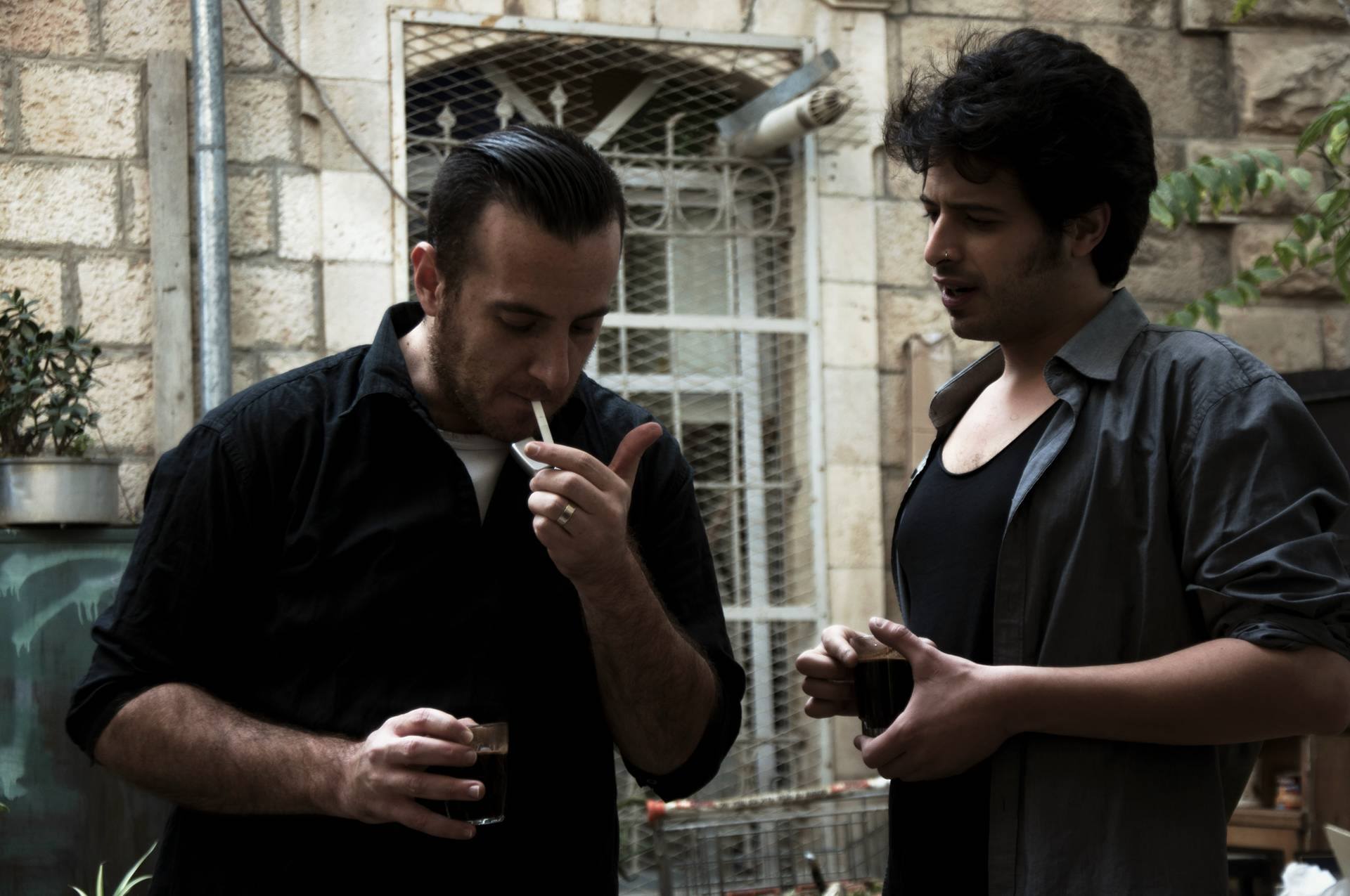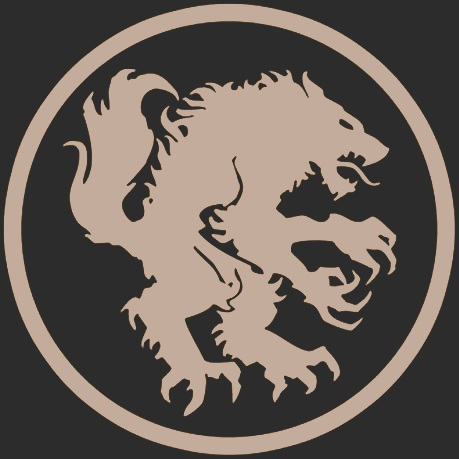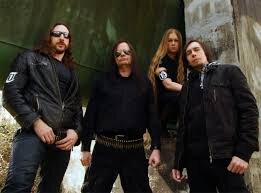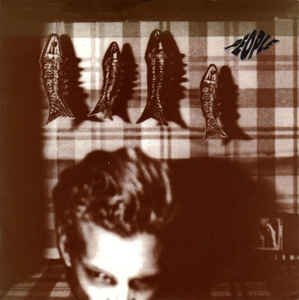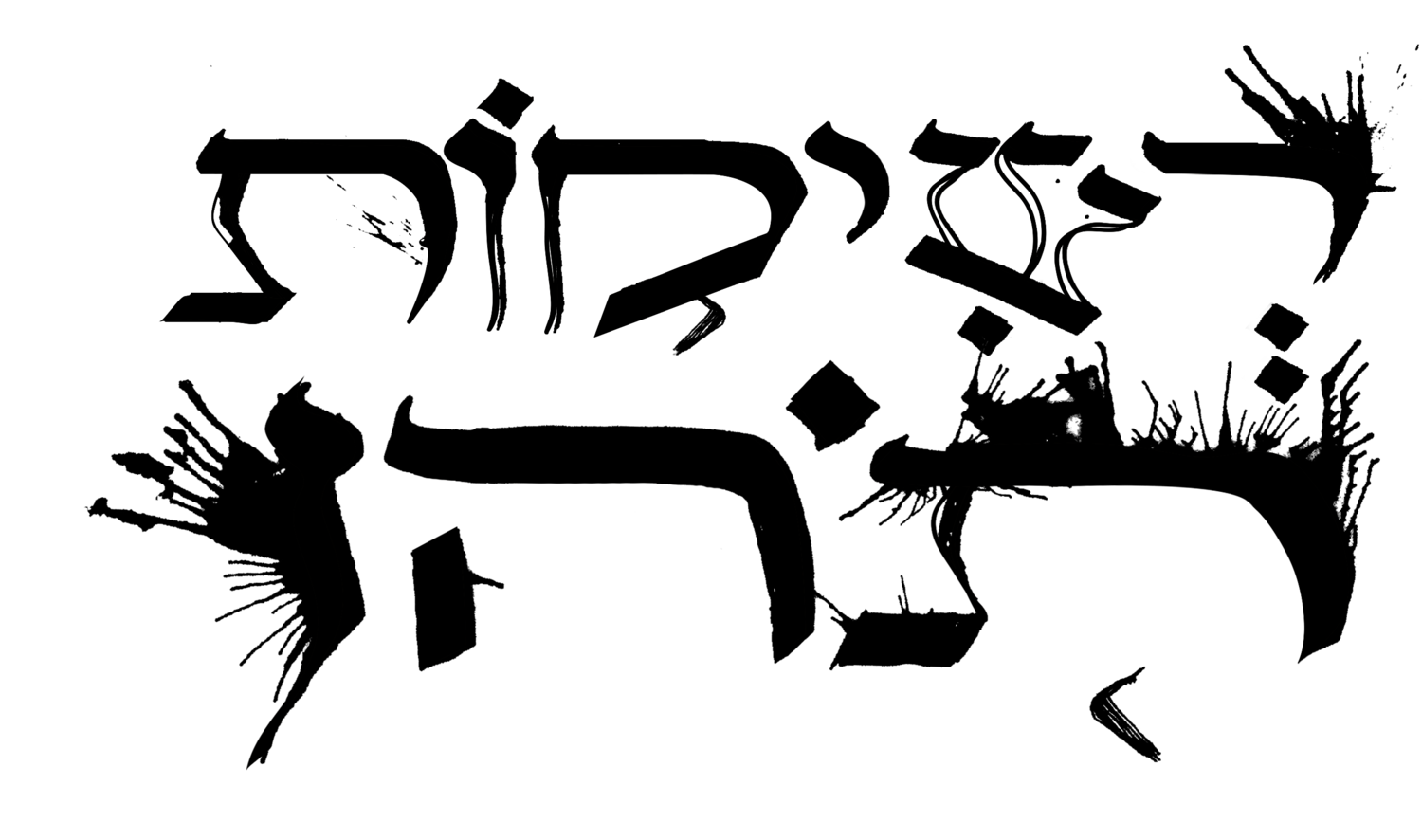והיא אמרה ידעתי אז; לכל בית יש נפש
והיא אמרה ידעתי אז; לכל בית יש נפש
רְשִׁימ֥וֹת־תֹּ֖הוּ | ראיון עם הסופרת מעין רוגל
מאת: יוסף בן עוז
2-3-16
זכור לי היטב רגע ההחלטה. הייתה זו הכותרת שתפסה אותי: "על האימה ועל העונג".
מה? אני רואה נכון? הרצאה על כיצד כותבים אימה? על המנגנונים שלה? כל חיישני האופל והמנגינות השחורות מהאזורים היותר מעורפלים של הנפש נדלקו לי. אמנם הצצתי עוד ברשימת הכותבים והנושאים אבל האמת שההרצאה הזו הכריעה את הכף.
"ושתדעי לך שמה שבסוף באמת שכנע אותי הייתה התמונה שלך. באמת. אמרתי לעצמי שהיא נראית כמו בחורה דיי אפלולית. זאת מישהי שמבינה באימה ויש לה מה לומר. אז שתדעי שבזכותך החלטתי להגיע לכנס הכותבים של 2015".
התוודיתי.
מעין הודתה לי בחיוך והביעה הערכה על הרושם שהצליחה ליצור מבלי ידיעתה. באמת שמבחינתי זו קצת סגירת מעגל הראיון הזה שאתם קוראים כעת עם הסופרת, המנחה, התסריטאית ובעיקר המנטורית שאימצתי לי בנושאי אימה ובכלל, מעין רוגל.
מעין היא בעיקר סופרת אבל לא רק. בין היתר היא גם מנחת סנדאות כתיבה ואף מלווה אישית של סופרים בתחילת דרכם. ילידת ירושלים, בוגרת בית הספר של סם-שפיגל לקולנוע וטלביזיה וכותבת פורה במיוחד. מנקודות הציון שכבר התפרסמו מהרקורד שלה אפשר לציין גם השתתפות בכמה וכמה מסגרות של כתיבה כולל תחרויות, כשמאחוריה כבר ספר ביכורים באורך מלא 'היינו יכולות לנסוע' (ירושלים : כרמל, תשע"א 2011).
בימים אלו ממש יוצא לדפוס ספרה השני של מעין 'יער'. ו'יער' הוא... הוא מעשה חושב, מן הצד האפל של הקיום. אפשר לומר עליו שהוא ניסיונה של מעין ללכוד את התמצית של מה שבמבט ראשון שלה חשבה שנכון לקרוא לו 'אימה', בתוך דפיו של ספר. סוגה שהיא אגב לא נפוצה כ"כ בשפה העברית לדבריה (התלבטנו יחד האם הוא יחידי או שמא בין המעטים. האפשרות השניה כנראה סבירה יותר). האמת יש לומר: במחשבה לאחור מעין ביקשה ממני לתקן ולומר שלמעשה 'יער' אינו באמת ספר אימה אלא יותר משהו שהיא הייתה מגדירה אותו: "מעשיה אפלה למבוגרים". כך או כך נדמה שהתמה של הפחד שזורה בו ככל הנראה.
אז... ספרי קצת על 'יער'.
אני הולכת לחשוף בפניך את הסוד של 'יער'.
הקדימה, ושהתה לרגע.
'יער' הוא ספר שעוסק למעשה בפחדים הכי עמוקים ואישיים שלי. בילדותי התגוררו סבי וסבתי בקריית היובל בירושלים. היה להם בית עצום ממדים. עלי כילדה, הבית הזה השאיר רושם עז. היו להם בבית המון חדרים שלחלקם אסור היה לי להיכנס. החדרים האסורים הללו סקרנו אותי. עם הזמן הם הלכו והכילו את כל הסודות שלי, את כל הפחדים. כשסבא רבא שלי נפטר, הייתי קטנה מדי כדי שיקחו אותי ללוויה שלו. הייתי רגילה לראות אותו שם, בפינה הקבועה שלו באחד החדרים, ופתאום הוא איננו. בדמיון הילדה שלי ניסיתי להסביר לעצמי לאן הוא נעלם ומה בדיוק קרה אחרי מותו, והמסקנה המעט עקומה שלי היתה שהוא ככל הנראה נקבר בקיר החדר שהיה שלו. לבית התווסף מבחינתי עוד נדבך של פחד.
למעשה אני חושבת שכבר אז הבנתי שבית איננו רק לבנים וחדרים. בית הוא נפש של ממש. יש לו חיים משלו. יש למקום נפש משלו. לכל מקום יש נפש בעצם.
בשלב הזה אני תמה ובין עצמי היכן ה'יער' מתחבא פה.
סבתי מהצד השני, אמה של אמי, היא ניצולת שואה. המשפחה שלהם ברחה מפולין ברכבת של שבויים מזרחה, אל חיקה של המדינה הסובייטית. בדרכם מזרחה חלקה משפחתה של סבתי את קרון הרכבת ביחד עם משפחה של חברים: אמא, אבא, ילד וילדה. את הסיפור שלהם בין סיפורים נוספים שכמוסים היו מאיתנו שמענו מסבתא רק במהלכה של נסיעת רכבת אחת במסגרת טיול שורשים משפחתי שלנו באזור ההוא של פולין. בנסיעה ההיא, הארוכה יחסית, סבתא החליטה לראשונה אי פעם לפתוח בפנינו את סגור ליבה. האזנתי היטב אז לאישה הזו שהערצתי כ"כ. היא סיפרה הכל שם. למעשה הייתה זו הפעם הראשונה שהיא דיברה על כל מה שקרה לה בכלל בימי המלחמה ההיא. הרכבת בה נסעו, כך סיפרה, הייתה עוצרת עצירות מזדמנות במהלך הנסיעה הארוכה של אז בסמוך לאזורים מרוחקים מיישוב כדי לאפשר לנוסעים לעשות את צרכיהם. באחת העצירות על מפתנו של יער גדול ממדים, הילד של משפחת החברים של סבתי פשוט לא הספיק לעלות על הרכבת. למרות תחנוניהם החיילים סירבו לאפשר להם לחפשו, הכריחו אותם לעלות על הרכבת והיא פשוט נסעה משם, כשהוא נותר מאחור. וכך, בהינד עפעף של החיים – אבד לה למשפחה הזו ילד בן שלוש אולי ארבע. אבד ולא נותר ממנו כל סימן חיים שהוא עוד שנים ארוכות מאוחר יותר ולמעשה המשפחה לא שמעה ממנו או עליו מאומה עד היום.
קשה להניח בצד סיפור מקפיא כזה, חשבתי לעצמי. לדברי מעין ואם ממשיכים את חוט הנפש הנמתח מההיסטוריה שגוללה בפני בהקדמה נראה שבעצם 'יער' עוסק בסיפורו ההאינטימי של היער עצמו ולא בילד. היער הזה שיש לו נפש משלו מבקש להשיב אליו את מה שאבד לו. את הילד שעזב אותו. זהו סיפורו של היער המבקש את מה שאוהב הוא וששייך לו.
הכיוון הזה הוא מעניין והוא מוביל להבנה טובה יותר של מה שנהוג לכנות אימה. כלומר אותה סוגה המקפיאה את הדם ומייצרת בך את התחושה המזוקקת והממכרת ההיא של הפחד, שעימו נפגשים בספרים או סרטים מסוג כזה. מדוע? משום שאימה למרבה ההפתעה אינה מתחוללת בנו מתוך הפרדה טהרנית של רגשות. דווקא חמלה ואהבה גדולה ביכולתן לחולל אותה במציאות. אבל עוד נגיע לכך בהמשך.
למעשה אני זוכר שדיברת כבר בהרצאה שלך על ההבחנה ההיא בין אימה לבין gore. שתי הסוגות אינן עוסקות באותו הדבר למעשה.
נכון. ה-gore או מה שבטעות נוהגים לכנות אצלנו "אימה" איננו אימה בעצם. אני לא מסוגלת לצפות או לקרוא gore. אני מחפשת יותר את אותם הטקסטים או הסרטים שמקפיאים את הדם, שמחוללים את תחושת הפחד העוצמתית ההיא. את מה שנכון יותר לכנות בשם Terror. זה באמת כמו הטרור שאנחנו מכירים. כי הרי מה זה טרור? טרור הוא זריעת הפחד הזו בנפש. התחושה שאין לי וודאות, שאני עלול להיות הקורבן הבא או שמשהו איום ונורא יקרה לי ואינני יודע מהו ואינני שולט בזה. למעשה ה-gore אינו מפחיד במובן הקלאסי של המילה, הוא פשוט מגעיל או מרתיע. האימה או ה-terror לעומתו, מפחידה ממש וההפחדה האמיתית פועלת עלינו דרך האהבה.
קצת כמו היער, שאוהב את הילד?
כן.
מעין מסבירה כי האימה הזו מתחוללת דרך מנגנון של אהבה. במקרה של 'יער', היער מבקש להשיב את האהוב לו מכל. אלא שההשבה הזו היא היא המחזיק האותנטי של האימה שבסיפור.
זו בעצם הסיבה שאימה טובה נכתבת בחמלה. כשאתה כותב אימה אתה חייב לחשוב על הקורא שלך כל הזמן. אתה צריך לראות אותו ולחמול עליו. לחוש אותו ואת ההתפעמות שלו. איך הוא איתך בסיפור כרגע? האם לא חצית את הקו יתר על המידה? הזרימה העלילתית חייבת להיות הפחדה השזורה בחמלה ובהשבה של הקורא אליך מיד לאחריה. ב-gore אין בעצם שום חמלה ולכן הוא לא מפחיד כמו שאפשר היה אולי לצפות. במובן מסויים זו אכן טרגדיה אכזרית או דבר מה נוראי ומטריף דעת, אבל שמתרחש על מישהו אחר. לא עלינו. בסיפור אימה לעומת זאת, הפחד מופיע משום שיש הזדהות כנה עם הרוע. קשה שלא להזדהות עם הכמיהה של אהוב להשיב אליו את מי שהוא אוהב. ולכן הפחד הוא כי אנחנו חלק מהעניין הזה. זו חווייה הפועלת במישרין על הקורא.
האם לדעתך האימה היא סוגה מוטית תרבותית? כלומר האם מישהו שכותב אימה – נניח בסעודיה או בבחריין – יכתוב אותה באותה הצורה כמו מישהו מנורבגיה או מצ'כיה?
מעין מהרהרת מעט אבל אצלה המעמקים מונחים היטב כמו משנת חיים המוסתרת מאחורי עיניים. רגעים אח"כ היא ממשיכה:
אני חושבת שכן. שבסופו של דבר, כן: אימה היא עניין כלל אנושי, אוניברסלי. ייתכן שהתפאורה הסיפורית תשתנה אבל המרכיבים הבסיסיים שמחוללים את האימה הם אותם שני הפחדים האנושיים הקמאיים ביותר המונחים בלב: הפחד מכיליון והפחד מאובדן. אלו הם הפחדים שמחוללת בנו האהבה.
השיחה שלנו על האימה גולשת עוד. הסיפור הזה של מנגנון האימה שמונע מאהבה בעצם מערבב יסודות. המחשבה הראשונית הייתה אולי יכולה להיות מחשבה של הפרדה. שמה שמפחיד שונה ממה שאהוב, אבל מתברר שדווקא החיבור הלא שגרתי יוצר תחושות עזות. זה נשמע לי מאוד הרמוני ומובן עכשיו שאני חושב על זה עד שקשה לי לראות כיצד חשבתי אחרת מלכתחילה. אולי כי לא העמקתי בזה מעולם ועכשיו ככותב שמתוודע לעצמו, אני מסתקרן.
בין השיטין אנחנו מעלים הרהורים על כתיבה ועל דוגמאות של אימה. על דוגמה אחת, 'רקוויאם לחלום' בו היא צפתה לפני שנים, מספרת מעין שהיא שינתה משהו מהותי אצלה בנפש.
אחרי 'רקוויאם לחלום', לא יכולתי עוד להסתכל על בני אדם באותה הצורה. לקח לי הרבה מאוד זמן עד שזה החלים אצלי למעשה. אימה של ממש יודעת להשפיע עליך ככה לאורך זמן.
היא מעידה על עצמה שנחשפה לכמויות אדירות של חומר מהסוגה הזו שמלווה אותה מאז גיל 6, בו צפתה בסרט האימה הראשון בחייה. היא אמנם פחדה אז מאוד ולא הצליחה לסיים את הצפייה אבל התחושה הממכרת הזו מלווה אותה מאז בדרכה בחיים.
דיברת קודם על הזדהות עם הרוע. מה דעתך על האמירה החינוכית (כן או לא?) לגבי ההשפעה הרעה של תוכן כזה בנפש שלנו? את בעצמך מספרת ש'רקוויאם לחלום' למשל לא הותיר אותך אותו אדם. האם נכון להיחשף כך לאימה בעצם?
אני לא חושבת שנכון לסנן תוכן כזה מאיתנו. האמנות במובנים רבים היא ההשתקפות של מי שאנחנו. זו המראה הרגשית שלנו. הרבה פעמים כשכותבים לוקחים חומרים מהחיים שלנו ומעצימים אותם.
המפגש של מעין עם האימה היה מפגש מכונן שבעקבותיו היא עשתה דרך ארוכה שכללה בין היתר ירידה מבררת למעמקיו של המנגנון העלילתי הזה כפי שתיארה קצת ממנו בראיון הזה. ביננו היא מודה שאכן למפגש כזה עם חומרים של אימה יש מחירים והוא לא פשוט. תוך כדי הראיון אני חושב לעצמי שנראה שאימה היא סוגה מרתקת בעיקר משום שהיא מעמתת אותנו עם פנים שלא קל להכיל באהבות שיש לנו בחיינו. היכולת של אהבה להתפתח למשהו קר ומנוכר, להיות מקפיאת דם כל כך ולפעול בנו רשמים כה עזים גם מצד כזה של הסרגל שלא היינו חושבים עליו במבט ראשון, היא מגנט לנפש.
השיחה שלנו צמחה כעץ משופע ענפים. שוחחנו על אימה ושוחחנו על כתיבה ומחסומיה. אפילו שוחחנו על איזו גחמת כתיבה כמוסה שיש לי, אני הקטן, ושעודנה מוסתרת במגירה. ואי אפשר לכתוב כאן הכל.
שאלה אחרונה קצת מוזרה אולי.
אני מנסה לסכם.
האם יש מקומות שאת אישית לא היית הולכת אליהם לעולם בכתיבה של אימה? האם יש דברים שהם גבול בעיניך?
אני חושבת –
היא אומרת לי במתינות כמנסה לארגן אמירה מדודה
שלא נכון להגביל יצירה. לא הייתי שמה גבולות ליצירה שלי כי בעיני היצירה היא המובילה את התהליך שמתחולל בכתיבה אצלי. יכול להיות שהייתי משמיטה קטעים פה ושם אבל לא משיקולים של גבול או אסור ומותר כיוון ששיקולים כאלו פוגעים בשלמותה של היצירה בעיני. כן הייתי משמיטה דברים שאינם תואמים לרוח הסיפור. מה שעושים בעריכה בעצם. עם זאת, ייתכן גם שדברים מסויימים שקשה לי מאוד להכיל בנפש לא הייתי כותבת עליהם. דברים כמו אונס למשל. אבל זו בעיקר עצירה עקב מגבלה ולא מתוך שימת גבול.
יצאתי משם מהורהר. המשיכה שלנו כבני אדם אל המקומות הלא צפויים היא עניין מעשיר ומרתק. אנחנו תרים קצת אחר החווייה המורכבת כי קשה לנו להאמין למשהו פשוט מידי. להאמין, שהכל נפרד וברור. כי הרי אנחנו יודעים על עצמנו כמה אנחנו מעורבבים כל כך.
אולי.

שברי כלים מהתהו ואנשי סוף הכרם
שברי כלים מהתהו ואנשי סוף הכרם
רְשִׁימ֥וֹת־תֹּ֖הוּ | ראיון עם האמן אברהם גיא
מאת: יוסף בן עוז
31-3-16
"אולי אנחנו צריכים לצאת למסע הסבר ולימוד לכל המטאליסטים ששואלים את עצמם למה הם בעצם נמשכים לאופל. מה יש שם שכל כך מעניין, עם הרבה חן... מה יש שם?"
המילים הכתובות הסתכלו בי בחזרה. קראתי אותן כמה פעמים באותו ערב. אמנם לא בדיוק זה מה שהיה לי בראש אבל יש משהו בכיוון הזה של לפתוח קצת אלומה רחבה יותר של מטאל בארץ. לי בעצמי יש איזה מן דגדוג כזה בקצה הלב בעניין הזה. לא פעם אני מוצא עצמי משתעשע עם מחשבות על סימפוזיומים בעברית על "מטאל ומחשבה" ממש כמו אלו שמידי פעם מתקיימים באירופה או בארה"ב (ולא מעט אגב), והמילים האלו שלו לקחו אותי פעם נוספת לחזון החבוי שלי.
הנחתי ברוגע את חצי המקופלת שלי (אני צריך בוסט של סוכר לשעות הקטנות של הכתיבה, אין מה לעשות) ופלטתי בקול רם שאולי יש משהו בזה. ומצד שני, יש גם את הצד השני שלי. החזון שלו ושלי אולי לא ממש מתלכדים וגם ככה אני מתוסבך עד השמים ועד התהום אך לפחות עכשיו אני פוגש עוד נפש שמגיעה ממערבולות. מעניין מאוד יהיה לשמוע מה יש לו לומר: על החיים, על המטאל ועל בכלל.
אחרי כמה דקות שהמחשבות הללו מפעפעות בי, חזרתי למקלדת שלי וכתבתי לאברהם:
לא מן הנמנע ידידי. לא מן הנמנע.
לא רציתי להלאות. לא חשבתי שנכון יהיה לשרוף את כל השיחה המרתקת שלנו על צ'אט דהוי. בתקשורת של מקלדות, בתיווך של מסכים. אז הבטחנו זה לזה שניפגש והוא כתב מייד:
דרך אגב אני גר בבניין שיש בו בית כנסת אפשר לארגן שיעורים בנושא.
פתאום קלטתי שאני הולך לעשות משהו שמעולם לא דמיינתי שאעשה, מן עולמות נפגשים: אני הולך לדבר עם אמן אלטרנטיבי, שכמעט כל יצירותיו מלאות בכל טוב של אפלה ושריטות מפה ועד העולמות של התוהו, בתוך בית כנסת. הולך לדבר על בלאק מטאל בבית כנסת, מלמלתי לעצמי קצת בקול אבל רק כי המחשבה שעשעה אותי. מעניין יהיה לעשות כזה דבר כי הרי גם לי יש ריקוד משלי עם הבלאק והמטאל ועם בית-הכנסת.
צללים ואורות; צללים ואורות
אברהם גיא הוא איש מורכב שלא יהיה פשוט להגדיר אותו. כלומר, אני שונא להגדיר אנשים כי הגדרה היא סוג של גדר (אפילו לא רק לשונית) אבל הבנתם אותי. אז אספר רק מעט ממה שלמדתי ממנו ועליו: אמן אלטרנטיבי, בן 40 גר בתל אביב, מטאליסט בעברו (איך לא) וגם קצת בהווה שלו. עדיין. "אמנם לא כמו פעם" הוא אומר לי בחיוך מתחת לזקן שחור וכיפה שחורה גדולה, תוספות שבחר כבר לפני שנים להפוך לחלק מחייו, וממשיך בעיניים בורקות לספר שעדיין קצת כן. במיוחד Amorphis הוא אומר ומחייך אלי. בגיל 22 חזר בתשובה ומאז בתהליך מתמשך הוא מנסה למצב את עצמו בחזרה בעולם היצירה שממנו בא ושבו הוא מרגיש בבית.
נפגשנו בביתו שבפלורנטין. בית מיוחד שבעליית הגג שלו אכן יש בית כנסת שנראה כמו מקום תפילה קצת נטוש, קצת מתפקד וקצת בשיפוצים ושמידי פעם נערכים בו גם שיעורים ותפילות. פרט לחזרה בתשובה אברהם הספיק כבר להתחתן והוא וזוגתו הורים לשבעה(!) ילדים.
כשהגעתי החלפנו בתחילה כמה מילים על הורות וילדים, לקחנו תה צמחים (הכי סחי) ועלינו למעלה, אל עליית הגג של בית הכנסת.
היצירה שלך מאוד לא שגרתית. היא מאוד מסקרנת כי נראה שהיא מעורבת ומכילה קצוות קוטביים ועולמות שונים מאוד של תוכן. מתורת הנסתר ועד בלאק מטאל. איך אתה מסביר את החיבור הזה?
החיבור הזה הוא החיבור של היסודות שבנו כבני אדם.
הוא מסביר.
כשהתחלתי להיכנס לעומק של תורת הסוד התחוור לי שהאדם הוא טיפוס מורכב. אנחנו בנויים מיסודות הלקוחים מבחינה רוחנית מכל העולמות, עולמות שהקבלה מכנה בשם: אבי"ע[1]. האור העליון של הבורא אינו מגיע פנימה אל תוך החומר העכור. הוא לא נכנס משום שהכלי עצמו אינו בנוי להכילו. ולכן האור הזה חוזר למקורו. אבל ההגעה שלו אל הכלי משאירה בנו רושם. הרושם הזה נותר גם בחומר העכור הזה והוא החיות שלו. המורכבות של האדם באה לביטוי בחלקי הנפש שלו (חמישה), וזה אומר גם מהחלקים היותר נמוכים ועכורים. היסודות העכורים האלו הם חלק מאיתנו, הם חלק ממי שאנחנו. לכן הנפש שלנו באופן טבעי נמשכת לשם, כלומר גם למקומות הנמוכים של הקיום.
האיזכור הזה של התהו לוקח אותי לתחילת הדרך שלי במגזין שבה חיפשתי גם אני להביע את הרושם העז של העולמות האפלים יותר בחוויות חיי האישיים. אולי גם מתוך רצוני לתת ביטוי למורכבות מסויימת, לחיים שאינם בנאליים ולא מתאימים לשום שטאנצים ושבלונות וגם לאיך שאני תופס את אותה מורכבות גם במוזיקה שאני אוהב, ובכלל.
כשאברהם מדבר על קבלה עיניו בורקות. מזה זמן שהוא שקוע רובוככולו בלימודי קבלה, בעיקר קבלת האר"י[2], והוא כמו מבקש להעביר אלי את חיוניותה של החוויה הקבלית. בכלל אברהם נשמע כמבשר בשורה כשהוא מדבר. ואולי כך גם יצירותיו – עוד נגיע אליהן בהמשך. האמת היא שבימינו הרועשים רק להיכנס לשיחות על קבלה או אמונה לא תמיד נגמר טוב. יש הרבה דם רע בשיח שלנו בחברה על עניינים כאלו ולא חסר איפה להתנגח. לפעמים התחושה היא שהמפגשים היחידים שנשמעים בין "דתיים" ו"חילוניים" (המירכאות הם כי כבר אמרתי שאני שונא להגדיר אנשים) במדינה הם התנגחויות וכסאח – אבל אני לא פה כדי בשביל המדורה המשעממת הזו. אני פה כמו החתול הסקרן שמבקש להתבונן איך מורכבות רעיונית ורגשית פועלת בתוך נפש של אמן.
מקומות נמוכים... כמו התוהו?
שאלתי מנסה להחזיר את עצמי לעומק השיחה.
כן בהחלט. זה הרושם שנותר. אגב, השם של המגזין שלך 'רשימות-תהו' לכד אותי קצת... אבל אתה כבר יודע זאת. דיברנו על זה כבר בצ'אט.
אברהם, אני סקרן: האם נכון לדעתך לומר שלא פעם אמן שמגיע מהדת הוא בבעיה כי הוא מכפיף את עצמו מראש למגבלות שלא קשורות ליצירה (למשל ההלכה) ושכביכול עוצרות אותו מלהביע את מלוא היצירה שלו רק כדי לשמור על המסגרת? איך אתה רואה את עצמך בדילמה הזו?
שאלה טובה. תראה, אני אומר לך... אספר לך סיפור: תמיד עסקתי באמנות. ואני זוכר משהו שעבר עלי בתקופה שקדמה לחזרה שלי בתשובה. מתישהו, התחילה אצלי תופעה מוזרה: הייתי יושב לעבוד ולא הולך לי. הייתי מוצא את עצמי לא אחת עומד מול קנבס ריק ולא מצליח ליצור כלום, פשוט כלום. לא היו לי שום מגבלות ויכולתי ליצור מה שאני רוצה אבל ה"חופש" הזה חנק אותי. כשהכל היה מותר שום דבר כבר לא היה בעל משמעות עבורי. מאוחר יותר קצת אחרי החזרה בתשובה, הגעתי לנקודה שבה החלטתי שאני רוצה לעסוק רק בתורה. ובאמת זה מה שעשיתי: ארבע שנים. ארבע שנים רק למדתי. אחרי ארבע השנים הללו שבהן השתקתי לחלוטין את כל מה שהיה לי פעם – את המוזיקה והיצירה והכל בעצם – הרגשתי שאני לא יכול להמשיך ככה כי הרצון שלי ליצור בוער בתוכי עדיין אז לאט לאט התחלתי לחזור ליצור. כשחזרתי היה לי ברור שאני צריך לשמור על המגבלות של ההלכה כמובן אבל להפתעתי דווקא המגבלות שלי עזרו לי. היו לי אנרגיות חדשות ליצור כי הצמצום הזה נתן לי אזור שאני יכול להתרכז בו ולהתבטא שם. מבחינתי האישית? דווקא החומות והכללים עוררו בי התלהבות יתר ליצירה. אני חושב שהצלחתי ליצור והרבה דווקא כי יכולתי לתעל את האנרגיה לשם במקום לבהות בבד ריק ולחפש משמעות בכל חוסר המשמעות שהרגשתי קודם.
הערב שבו שוחחתי עם אברהם היה עמוס עבורי. רק שעה לפניו קיימתי ראיון נוסף עם הסופרת מעין רוגל לקראת צאת ספרה השני 'יער' (שהועלה זה מכבר במגזין שלנו). אני מזכיר אותו כי את מעין שאלתי שאלה דומה, שאלה על גבולות היצירה. מעניין היה לראות את נקודות מבטיהם הכה שונות של שני יוצרים מוכשרים (כל אחד/ת בתחומו/ה). מעין ענתה לי שמבחינתה מגבלות אינן שיקול ביצירה שלה כי לא מקובל עליה למעשה כיוצרת לערב שיקולים זרים למהות היצירה, בעוד שאברהם רואה במגבלות הללו תמריץ ליצירה מכוונת וממוקדת. ייתכן שהשאלה על גבולות ומגבלות איננה בהכרח שאלה תאורטית של אג'נדה, למרות מה שלא יטענו לא מעט אנשים ואפילו היוצרים עצמם. ברמה האישית וברמה של היצירה עצמה כל יוצר לוקח מהעולם את מה שמטפח אותו ובונה אותו כאדם עשיר וכאמן. נדמה לי שאם נניח לרגע את האג'נדות בצד אז זו המנגינה העמוקה יותר בסיפור הזה: העניין האישי. כלומר, אפשר להתמקד עד אינסוף בויכוח תיאורטי ולהתפלפל על קונספטים, אלא שמה שמעניין יותר הוא אנשים. בטח בהקשר של אמנות. כי המכחול והקולמוס בונים חוויות מתוך הלב, לא מתוך אג'נדה.
מבין ממך שלא הצלחת לשרוד בחיים של תורה בלבד. איך זה היה עבורך? ניקוי אורוות?
משהו כזה, כן. למשך ארבע שנים לא שמעתי מטאל ולא ציירתי ולא כלום. אחרי תקופה ארוכה שבה לא שמעתי כלום חזרתי לזה לאט לאט.
בשיחות מאוחרות יותר שקיימנו אברהם ואנוכי, היה הוא הולך ומגלה אלי עוד טפח או טפחיים מסודות חייו. לאט התבהרה אצלי יותר הדינמיקה של חייו כיוצר וכמאמין והתחדד אצלי התמריץ שהוביל אותו לשוב במלא התשוקה אל יצירתו:
במידה לא מבוטלת זו המוסיקה שהשיבה אותי, או אם לדייק יותר: השילוב הזה שבין המוזיקה המטאלית שאני אוהב לבין מה שגיליתי בעולם הקבלה שאותו אני לומד.
הוא הקדים, ואז הוסיף:
עוד דבר יש לי לומר ואני חושב שדיברנו עליו בפגישה לפני שאשכח ושחשוב לי לומר: אנשים בוודאי חושבים שההתעסקות בקבלה זה ההתעסקות ב"אור" או ב"טוב". גם בשבילי זה היה חידוש גדול כששמעתי שעיקר כתבי האריז"ל מתעסקים בלהכיר דווקא את עולם התוהו, את המקור לרע בעולם ואת התיקון של התוהו. זה בעצם מה שהחזיר אותי חזרה לשמוע מטאל. הרגשתי שהקבלה נתנה לי את הפתח לשוב אל העולם אותו עזבתי, ונתנה לי פרספקטיבה חדשה לראות את העבר שבו גדלתי.
שמע יוסי, אולי אלו באמת דברים חדשים שלא דיברנו בפגישה אבל הם הם החשובים לי באמת. אני רוצה שאנשים יכירו את הצד הזה שבמטאל. שהרי, זה הפוך מהסברא ההגיונית: שאדם מאמין ישמע חומרים של חושך ושל אתיאיזם ושל עבודה זרה...? אבל כשיש לך תמונה רחבה של בריאת העולם, של מי שאמר והיה העולם – יש לך כלים גם להתמודד עם זה. כי הרי "מלא כל הארץ כבודו" וגם את החושך הוא ברא.
מוכרח להודות שהשיחות המאוחרות הוסיפו אצלי נדבך על אישיותו של אברהם המאמין והאמן. לא בכדי אברהם לוקח חלק פעיל בהתארגנות "60-ריבוא", שהיא התארגנות של יוצרי שוליים בישראל שהמשותף להם הוא שכולם שבו בתשובה בצורה זו או אחרת אלא שעולמות היצירה שבליבותיהם לא פסו מהם והם עודם שם: יוצרים, מתלהטים, צובעים בגוונים מרתקים של מורכבות רבה גם ובעיקר תכנים הלקוחים מעומקה של התרבות ישראל הקמאית. אולי עוד נשוב אליהם 60-ריבוא ואולי פעם נעשה אייטם גם עליהם.
אז איך בעצם חזרת ליצור? מה קרה שם?
חזרתי, כי הרגשתי שעם החשיפה שלי לספר הזוהר דברים מסויימים מתחילים להסתדר לי בראש. הדברים שאליהם נחשפתי בזוהר הציתו אצלי את הדמיון והלב שלי התחיל לעבוד שעות נוספות. הרגשתי שאני רוצה לחזור ליצירה וניסיתי לעשות זאת בצורה שתתאים לי ולדרך שבה בחרתי. פה ושם התחלתי לשוב ליצירה, בעיקר קומיקס וציורים.
מה הכי משפיע או מעורר אותך ליצירה היום?
אברהם כמעט ולא מהסס (וכמה לא מפתיע):
ספר הזוהר. זו ההשפעה הכי גדולה שלי. הכתבים של הזוהר והאר"י והמהרח"ו[3] נותנים לי עולמות תוכן עמוסים ליצור מהם ולצייר אותם.
בספרו הראשון, "הצלם" (בהוצאת אמנות לעם, 2005), יצר אברהם עולם שלם המסופר דרך קומיקס עם עם גוון אפלולי. הקומיקס עצמו הוא סיפור המוגש כרומן גרפי והנובע כולו מקטע קצר הלקוח מתורת האר"י. הקטע עצמו מופיע בדפוס כציטוט בלשון המקור והוא מדבר על הפער השרוי בין עולם הקווים ועולם העיגולים. בעולם של קווים נולד ילד שמתחיל לתהות על עולמות אחרים. הילד הזה רואה מה שאין האחרים, ה"קוויים" כל כך בטבעם, רואים. והוא מתחיל לחפש אחר מה שהוא רואה ומושך אותו.
היצירה הזו, כמו רוב יצירותיו של גיא, היא סוג של אמירה. מבחינתו השיבה שלו אל היהדות קנתה לו ראיית עומק שלא הייתה אצלו לפני כן. לא מן הנמנע שהוא הוא הילד הזה, שחי בעולם של נימוסים והיגיון ומבקש לתת מקום גם למה שהאחרים 'אינם רואים'. במידה רבה יש פה העמדה אפלולית של המציאות והפער. ואולי מחביאה האמירה הזו גם תחושה עמומה של עצב בעיניו של אברהם. עצב על מקומה התמוה של הרוחניות בחיינו כפרטים וכחברה. אותה היכולת האנושית להתחבר למשהו שהיקפו רחב מהקיום החומרי הפשוט. אפרופו עקיצתנו לעניין וכחנות הסרק – זה לחלוטין מתכתב עם כל האווירה הרועשת סביב השיח הדתי-חילוני וסביב ההתנגשויות הכעוסות שהוא מייצר, וזוהי התבוננותו כאדם שחי את אמונתו בעוצמה ומצטער על העדרה בעולם שמסביבו. אדם, שרגישותו הרבה לאינטואיציות אנושיות ניכרת היטב ביצירתו בד בבד עם הרצון להביע אמירה כמעט הייתי אומר "מחנכת" דרך ויזואליות.
כמטאליסט שלא כבתה הגחלת שלו – ניכר שהמטאל הוא ללא ספק סוג של חוט השני השוזר את עולמו של גיא. אבל מה שמסקרן פה הוא שאולי המטאל אצלו מהווה גם סוג של מדיום מתווך בין עולמות התוכן שלו: היצירה והרגש מחד והרצון להעביר אמירה מאידך. לדעתי במטאל זה ניתן להיעשות ואף בצורה יפה כיוון שהמטאל הוא במה שמצליחה (בסוגות מסוימות שלה) להעביר היטב תכנים שהם מיזוג של יסודות סותרים במן הרמוניה עוצמתית.
השיחה שלנו קולחת לכל המחוזות האפשריים כמעט. אני אוחז בתה הצמחים שלי ומוצא את עצמי מדבר עם אברהם על הכל. אפילו חידודי תורה יצא לנו להחליף.
ספר קצת על המטאל בחיים שלך. אילו להקות אתה אוהב? מה מזה משפיע עליך יצירתית אם בכלל?
במטאל תמיד נמשכתי לסגנונות שיש בהן דמיון רב. עדין אוהב ושומע את Amorphis, ובמיוחד את Tales from the Thousand Lakes. אני אוהב יצירות מלאות בדמיון ואני לוקח את הדמיון הזה ועושה ממנו ציורים.
כשאני שומע את ההעדפות של אברהם אני חושב לעצמי שהנטיה הספציפית שלו לאלבום הזה של אמורפיס דווקא מסתדרת לי טוב. אמנות היא שימוש עז בדמיון ובאלבום הספציפי הזה יש עולם שלם שמצויר בצלילים ובתמונות שגם מעיד על הנטייה הסיפורית החזקה אצלו. כמו כן לא מן הנמנע שהעולם הפגאני על העושר הסיפורי שלו, כי הרי אין כמו הפגאניזם לחולל רוחניות מכל פיסת טבע אפשרית, מותיר רושם בנפש של אמן. ואולי באמת כשנפשות רגישות כמו נפשות אמנים היוצרים מתוך השראה נפגשות בחומרים המוזיקליים האלה, הן יודעות לדלות חומרי גלם לעבודה שלהן.
אחדות או פירוד?
בעומק שלו המטאל הוא גבול.
גבול?
אני שואל, ומתפלא.
לדעתי הוא גבול. הוא גם מנוגן כמו גבול (אברהם מסמן לי תנועות חדות ביד כדי להמחיז קצת את המהלך המוזיקלי של הדת' מטאל).
ומה עם בלאק מטאל? אתה יודע שהוא מנוגן בצורה פתוחה ולא סגורה. הסאונד של הגיטרות הרבה יותר פלואידי ולא חתוך כמו דת' מטאל למשל. מה איתו?
אבל עדיין זה סגנון נגינה שבמהות שלו הוא גבול. גם הסאונד הקיצוני והכבד וגם הצרחות. כל החוויה היא חוויה של גבול ושל קצה. זו לא מוזיקה של מורכבות.
אנחנו לא מסכימים כל כך, אני חושב לעצמי בלב. לפחות לא בנוגע למטאל. החוויה שלו את המטאל שונה למדי ממה שאני אישית חווה. שוחחנו על כך מעט והגענו למסקנה משותפת ששתי ההתבוננויות מעניינות אף כי לא שכנענו איש את רעהו כלל.
בתחושתי – אמרתי לו – ההסתכלות שאתה מציג הן לגבי המטאל והן לגבי האמנות בכלל היא כמו התבוננות מבחוץ: זה להתייחס לחומר כאל תכלית הרוע ואל הרוח כאל תכלית הטוב. לעניות דעתי החוויה הזו מורגשת היטב גם ביצירה שלך עצמה: יש הרגשה שהאמירה היא אמירה של אבסולוטים. למשל בתמונה של האנשים המהלכים על האדמה ופניהם אור המשוך למעלה; במעבה הקרקע הנדרכת חבויה דמות דיוקן של משהו שנראה כמו שטן. כאילו אמרת שהחומר העכור הוא למטה והוא מושך אל הרוע ואילו פני האור של האנשים, כשהאור מטשטש את פניהם לחלוטין למעשה עד שתוויי פנים אין בהם - מעין אנשים כלליים נטולי אישיות או זהות אישית ייחודית – נמשך למעלה, אל מקור האור.
מסכימים או לא – ההתבוננות שלו מעניינת. בתחושה שלי, מעבר להיותה עמידה מבחוץ כמו שהסברתי היא נתפסת אצלי מעט מנוכרת. אולי באמת קשה להכיל בכנות חומרים כה מושחרים בנפש של מי שמבקש תיקון העולם בעצם.
כתבתי כאן פעם על החווייה האישית שלי מהמטאל והיא איננה חווייה של פירוד. בעיני יש פה ריקוד של ניגודים. אני זוכר שכאשר שוחחנו אברהם ואני בשיחות שעקבו לראיון הזה עלה הנושא הזה שוב. הוא מנה באוזני דוגמאות ללהקות מטאל מהעולם הרחב העושות שימוש בתכנים ישראליים "יסודניים" והביע פליאתו באוזניי. טענתי שוב את מה שאני חש בכל עורקיי: אני סבור שהמוזיקה הזו והמנעד שהיא נותנת בנפש הוא רחב מאוד. אני יכול לתת דוגמאות רבות לכמה צימאון יש בקרב בני האדם כולם (מישראל ומהעולם) לשובן של אמת ומשמעות או מה שחלקנו יקראו לו 'אלוהות ונבואה', לחיינו. כמה עצב ושבר יש מאובדן שני אלו באנושות כולה. ואני קצת חולק על כך שההתבוננות במוזיקה הזו צריכה לעבור דרך פריזמה של רע-טוב, שחור-לבן.
לא בדיוק רע-טוב / שחור-לבן.
הוא מסביר, ומבקש להבהיר:
חשוב לי שתבין שאני מעריך מאד את מוזיקת המטאל. למעשה, אני חושב שרק היא או מוזיקה קלאסית יכולים לדבר בעניינים שעומדים ברומו של עולם; עיניינים של סיבה ותכלית. תדע לך שזה מפליא אותי ומדהים אותי כל פעם מחדש כשאני שומע מטאל ובמיוחד בלאק מטאל – אני שומע שם ממש עבודת השם מעבר למוזיקה גרידא.
רגע רגע. עבודת השם בבלאק מטאל?! אני כבר בניתי תיאוריה שלמה על התיאור של אברהם את התכנים במטאל כסוג של עמידה מבחוץ, ועכשיו הוא אומר לי הפוך?
למה אתה מתכוון? תרחיב קצת...
תראה,
הוא ממשיך-
המטאל והקבלה הן עבורי שני עולמות שיש בהם מכנה משותף: שניהם מתעסקים ברפש, בגועל ובתוהו; שניהם מאד ברורים למתבונן-מטאליסט-מקובל; בשניהם עוסקים בשעות הלילה המאוחרות. זה מדהים ההקבלה הזו ביניהם. לימוד הקבלה פשוט נתן לי תשובות לנפש שלי: למה כל חיי מהיותי קטן בן שש נמשכתי לאופל. למה? עכשיו אני יודע.
מתברר שהתיאור המפריד הוא אצלו האיחוד. שההתנסחות המתרחקת היא אצלו תובנה של שורשים. העיסוק במטאל ובאופל הוא העיסוק ביסודות של נפשו.
הבנתי שייתכן שמיהרתי. התחושה הראשונית ההיא המשיכה להפוך מורכבת כשעיינתי מעט בספריו. אמנם, לא מצאתי שם את ההיתוך שאני כה מחפש, אבל מצאתי שם משהו אחר מעניין ומסקרן לא פחות.
לצייר חידות: כמו לנגן בכינור
"לנו, כמובן, אין עסק בנסתרות.
עסק אין לנו אבל התפעלות יש לנו. כשנחשפתי לאגדות חז"ל ולסיפורי הקבלה, נחרט בנפשי רושם עז ודחף אותי להוציא את אותה הבערה הפנימית. וכמי שעדיין לא זכה לכלי העיון בפרדס הקבלה, תירגמתי את הלהבה לחווייה חושית – למעשה אמנות."
(מתוך ההקדמה ל"מעשה בראשית", מאת: אברהם גיא, הוצאת מפה – 2006)
הנה, בתמצית מה שדיברנו ביננו.
הספר "מעשה בראשית", הוא סיפור מאוייר של התפתחות אפית – כמעט אבסטרקטית אפילו הייתי אומר – בסגנון שלה, המביאה אל הקורא את הרושם העז שנותר במי שלומד את המסביב של "סוד מעשה בראשית" בקבלה. הספר רווי באיורים הלוקחים רעיונות נסתרים ומלבישים אותם חליפות מאויירות המערבות אורות וצללים ברגישות מומפלאה. בתור חובב אמנות ויזואלית, במיוחד כזו מהצד השרוט של הסקאלה, אני בהחלט יכול להמליץ על כמה וכמה מהאיורים שם ובעיני רוחי אפילו ראיתי איך חלקם מתנוססים על אלבומי מטאל שעוד לא נוצרו. ומי יודע. הספר עצמו אף הוא כמו "הצלם", שזור בקומיקס.
החוברת האחרונה שעיינתי בה מאת אברהם גיא – "יצורי שבע ארצות" יצאה בהוצאת '60-ריבוא' שהוא כאמור ההתארגנות ההיא של כמה חברים ששבו אל חיק היהדות ועדיין עוסקים באמנות מהצד השרוט של המפה. בחוברת הזו יש איורים של יצורים מ'שבע ארצות' המלווים בתיאורים המעוצבים הן בסגנון הלשוני והן בתוכן ובעיצוב – כאילו לקוחים מדפי הגמרא. אני מודה שהשילוב עצמו מסקרן בהחלט וכמנהגו של אברהם – הכל כאן מצויר ומנוסח עם המון מחשבה מאחורי הדברים.
אנשי סוף הכרם
יוסי, שמע פלא: הקבלה נוספת מדהימה מצאתי בין קבלה למטאל: כתוב באדרא רבא[4] שאלו העוסקים בתורת הסוד הם נחשבים לסוף הכרם: אנשים מזלזלים בהם. גם תחום המטאל תשאל אנשים שאינם מטאליסטיים – זה יישמע להם כמו משהו ילדותי, עניין של ילדים. כשהיינו ילדים שמענו מטאל אבל אצל מבוגרים לכאורה לא שייך כל הסיפור הזה, ולכן המבוגרים מזלזלים בזה. וזהו טיבו של הסוד ושל תורת הסוד: כיוון שאלו הם הדברים העומדים ברומו של עולם, אנשים נוטים לזלזל בהם.
אברהם מתכוון לדעתם של חכמי הסוד שרוב בני האדם נוטים לזלזל בדברים רמי המשמעות. בהקשר של תורת הסוד הזילזול ברור: הדברים נדמים כפשוטים וחסרי ערך מעשי, אלא שחבויה בתוכם אמת נסתרת (סוד) ומפאת חוסר ההפנמה של מהותם הגדולה הנסתרת הזו – מגיעה הנטיה הטבעית לזלזל בהם.
סתם כדוגמה, מביא אברהם את הגראולינג בהקשר של סודות נפש (שזה בעיני קטע מדהים – היכולת שלו לחבר תובנות מפנימיות התורה על עניינים שבאינטואיציה ראשונה נדמה שאינם קשורים אליה בכלל, והופה. הוא מפתיע אותי לחלוטין):
אתה יודע מה עניין הקול הצווחני – המקור של הגרואלינג? אז דע כי יש מעין "זיווג" (התחברות של המהות בלשון החכמים נקראת "זיווג" – י.ב.ע) בפה האנושי בין החיך והגרון: החיך הוא בחינת החכמה והגרון הוא בחינת הבינה (בחינה בלשון הזו משמעותה שיש משהו בחכמה שאפשר להמשיל אותו לחי - במקרה שלנו למשל - י.ב.ע). כאשר האדם מדבר או שר בסגנון רגיל, מוציא קול מפיו על ידי הלשון המזווגת את שניהם ואז יוצא הדיבור במה שנקרא "ייחוד שלם". אבל, כאשר אדם מוציא מפיו קול רק על ידי הגרון שהוא הבינה ועליה נאמר "דמינה דינין מתערין"[5] (הגראולינג, למשל, המהווה שירה מעומק הסרעפת) אז הוא לבדו פועל ומפעיל על כן רק את מידת הגבורה, בלי הייחוד (=ההתאחדות) עם החכמה. זהו הקול של הגראולינג שהוא מבטא מציאות של פירוד חוסר זיווג שנאה וגבורות.
ובתוכו של הגראולינג הזה? (אני שואל כמצפה למורכבות שעוד לא נאמרה לי):
אפשר גם לראות אותו כסוג של בקשה ותפילה לייחוד המיוחל הזה בין הבינה לחוכמה.
והאמת שזה נשמע לי. זה נשמע לי מאוד. כי בבדידות הזועמת יש בטח גם זעקה להתחברות. ואולי זו הזעקה וזו משמעותה הנסתרת של הצרחה. אני מוכרח להודות שנושא המשמעות הפנימית מתחיל לחלחל היטב אצלי ואני די אוהב את העניין הזה שדברים אינם תמיד סתם כמו שהם נראים וזהו. אוהב ללמוד את הרובד היותר מוסתר.
יש לך שורת סיכום יא אברהם? תן משהו גדול ומלכד. תן.
הייתי אומר שמוזיקת המטאל ובפרט הבלאק מטאל מזכירה לי ומקשרת אותי לזמנים של בריאת עולם התוהו (עולם החושך) שהוא העולם שקדם לבריאת עולם התיקון (עולם האור). אני חש שזה בא להזכיר לי מאין מגיע כל העולם הזה, מניין הוא נברא. כי עולם התיקון נברא מתוך שברי כלים של עולם התוהו וצריך לזכור את זה.
*
בסדקים שקטים של המציאות הרועשת אפשר למצוא נשמות גדולות החיות את החיים בעוצמה. לא תמיד מבינים אותן והן בעצמן אינן תמיד מבינות את החיים הרגילים האלה, אבל מה שהמכחול או כלי הנגינה שלהם מציירים או משמיעים – הוא סיפור מרתק מאין כמוהו שאפשר לשקוע איתו לתוך הלילה ללא כל ספק.
לכו וחפשו את אברהם בפייסבוק (Avraham Guy Barchil).
יש על מה.
[1] לפי תורת הסוד אלו ארבעה עולמות שברא האלוה: אצילות, בריאה, יצירה, עשיה. מעין רמות תודעה שונות.
[2] האר"י – רבי יצחק לוריא אשכנזי. אחד מגדולי המקובלים של חכמי ישראל שחי לפני כ-450 שנה בצפת ופעל בה בסה"כ כשנתיים וחצי עד לפטירתו בגיל צעיר למדי (38). חלק גדול מלימוד תורת הסוד המאוחרת יותר מתבסס על כתביו.
[3] המהרח"ו – רבי חיים ויטאל. תלמידו המובהק ביותר של האר"י ובן דורו. היה זה שערך והוציא את כתבי האר"י למעשה.
[4] "האידרא-רבא" היא ההתאספות הגדולה בעבברית: זהו מאמר מספר הזוהר, המתאר את התאספות חבורתו של רבי שמעון בר יוחאי, לשם גילויים של סודות קבלה שלא התגלו עד אז. המאמר מופיע בספר הזהר בתוך פרשת נשא (ספר הזוהר עצמו בנוי כפירוש על התורה שבכתב והוא כתוב לפי הסדר של הפרשות שבה).
[5] בתרגום לעברית: הבינה – שממנה הדינים (כלומר העניינים השליליים והתקיפים שיש בעולם) מתעוררים.

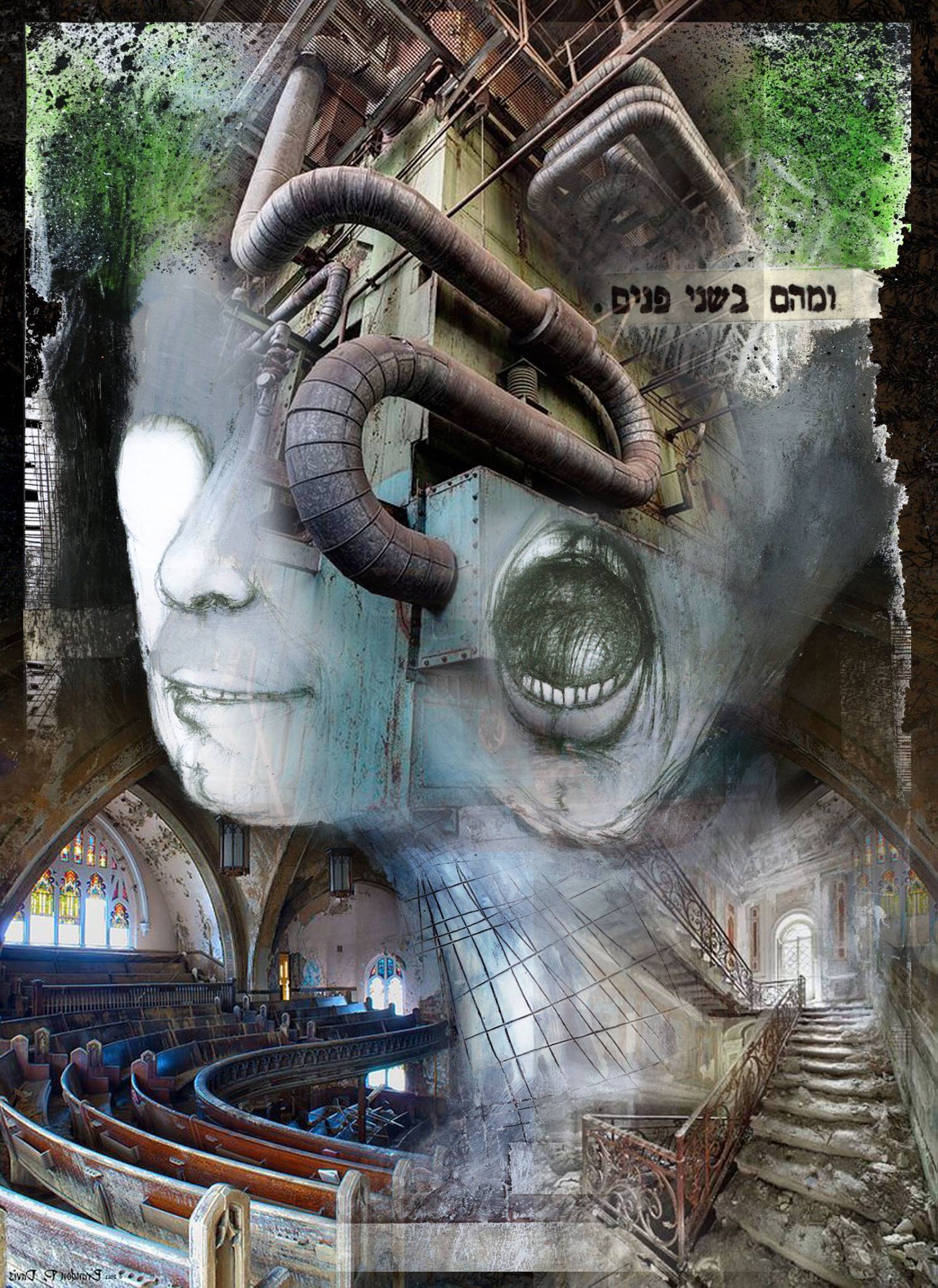

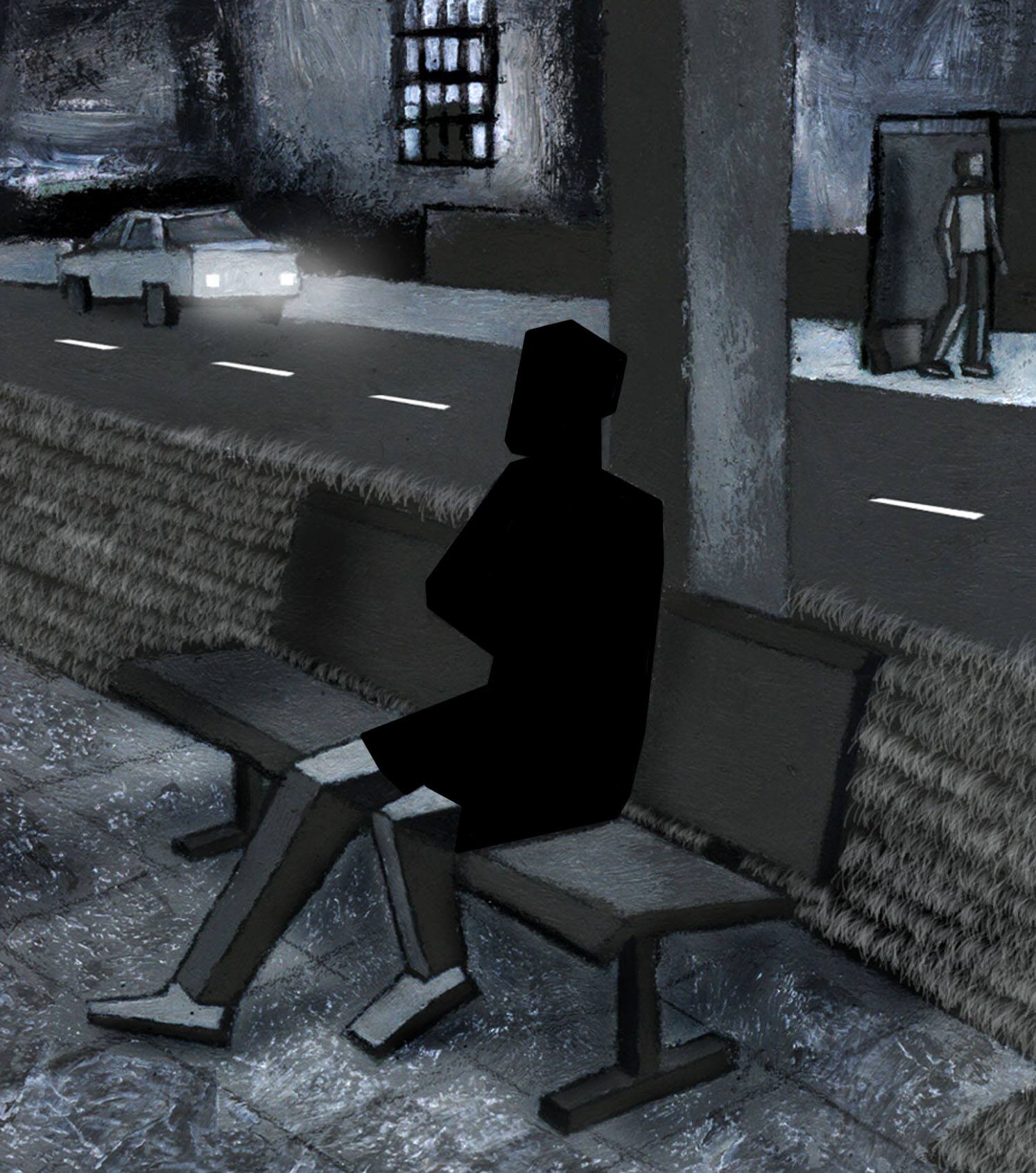
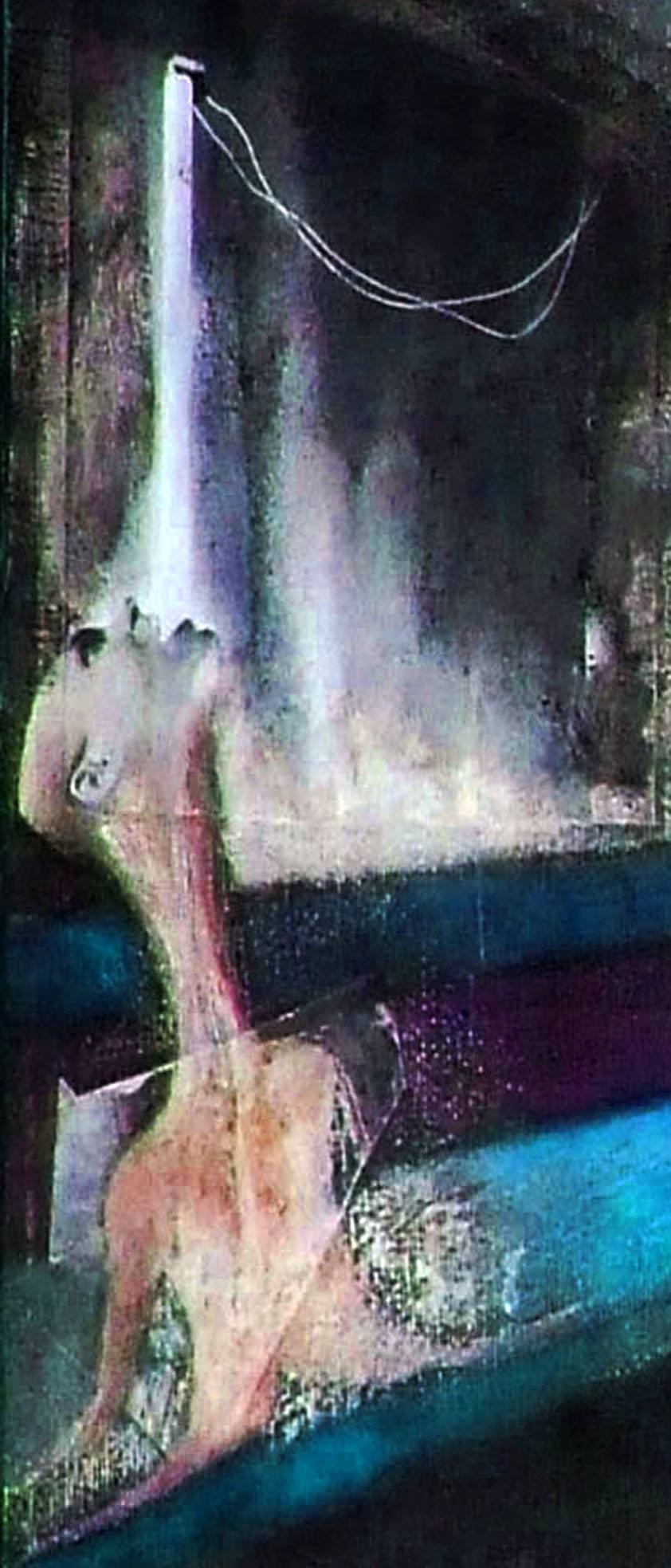
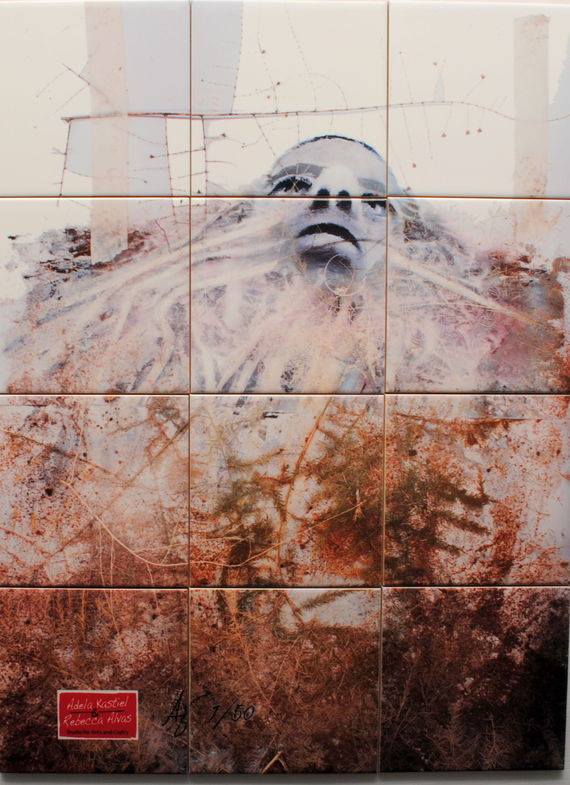

התעוררותה של הנשמה המלוכלכת
התעוררותה של הנשמה המלוכלכת
רְשִׁימ֥וֹת־תֹּ֖הוּ | Morgue ודת' מטאל בלתי שבלוני
מאת: יוסף בן עוז
22-4-16
טכנוקרטיה של גראולינג
לא מעט מהמטאל החדש אינו יכול לדבר אלי, עד שאני עצוב מזה לפעמים. הרכבים רבים הצצים חדשות לבקרים נוטים לאמץ מה שאני קורא לו 'טכנוקרטיה של גראולינג'. המוזיקה מאוד טכנית ומאוד גבוהה, אתה לא יכול לומר שאינם מנגנים היטב. אלא שכמו בספר טוב: להטוטנות הלשון לבדה אינה יכולה להאחוז עלילה מפעימת לב.
למעשה זה יותר פרובלמטי מזה: הזכרון העמום של יצירות פשוטות ביותר שפירקו ועודן מפרקות לך את הלב לחתיכות, אינן מאפשרות לך למחול על העדרה של התשוקה. "אחד רכב אל מפרץ אסא" One rode to Asa bay – סתם למשל – הוא שיר פשוט כזה. השיר הזה אינו מרפה ממך שעה שאתה מאזין להרכבי מטאל אולטרה טכניים הממלאים לך את ההנפש בפירוטכניקה ססגונית שאינך יכול שלא לחוש חמיצות הלב למול ההמתנה הלא נגמרת שלך שהמיצג הזה כבר ילהיב אותך.
ואני יודע שהתחושה העמומה שפעם היה פה טוב יותר היא כנראה לא יותר מאשר רומנטיקה ילדותית של אחד שאינו מודע לזה שהנפשות שוכחות את הרע וזוכרות בד"כ רק את הטוב. אלא שמשהו מהותי יותר מזה כן מתרחש. כלומר, מעבר ל-Placebo הרוחני של רובנו שלוחש לנו שפעם הכל היה יותר Trve יש כאן באמת מציאות בימינו שבה המטאל נמדד לפי כמה מתוסבכת היצירה שלו מבחינה טכנית.
מי שלא תרצו: Deicide, Morbid Angel, Behemoth (מביהמות' – הכוונה היא בעיקר לאלבומים האמצעיים שלהם. האחרון "שטניסט" הרבה יותר מוצלח מהבחינה הנשמתית שעליה אני מדבר כאן וכנראה שגם הבא בתור לפי מה שהבליח לאוזני), Darkthrone, Mayhem. בקיצור name your band. רבים עצומים וטובים הולכים אל האזור האולטרה טכני.
יש שעושים אולטרה טכני מעניין, אלא שמבחינתי האישית טכניקה מהוללת היא מחשידה מראש. לא שהאיכות הנשמתית של היצירה (הנה, המצאתי הרגע) נמדדת רק בסקאלה של מה יותר וירטואוזי וטכני או פחות, אלא שפעם הטכניקה הייתה תבלין ונדמה קצת שהיום היא עיקר התבשיל. כאילו בעקיפין אתה מרגיש שיצירה יותר מידי מתוסבכת מבחינה טכנית מפצה על חוסר בנשמה כי היא עושה לך שימוש בכלים נלוזים קצת של שואו-טוב כמעט כמו בריאליטי. טוב, לא צריך להיסחף – אבל זו התחושה.
כמו עשב ירוק על אדמה חרוכה
בצידם של דיבורים מנמיכי קומה ומפנצ'רי גלגלים על דעיכת הרוח העזה של המטאל בארץ, צומחת לה בשקט התעוררות מרעננת. שנות התשעים שנחשבות למהוללות במובן המטאליסטי של המילה (ויש על מה להתווכח אגב), הניבו כאן כמה וכמה פרוייקטים שעשו פה פעם מטאל שאם ניקח את המדד שהמצאתי פה למעלה – איכות נשמתית של היצירה – הם על העשירון העליון. דברים שעושים רעד ברצפת האגן כשאתה נחשף אליהם.
הפעם הראשונה ששמעתי על ואת Morgue הייתה דווקא בשנים האחרונות. בניגוד לטיטאנים קדמוניים אחרים שנחשפתי אליהם בתקופת נעורי, Morgue לא היו חלק מנוף ילדותי. אבל כששמעתי את "הביאה השניה" שלהם, אני מוכרח להודות שהרגשתי שוב כמו הילד המחוצ'קן בן ה-17 ההוא שמדפדף בין דיסקים הזויים על מדפים צדדיים בג'אנק של קרית ביאליק (כן, אני בן השבט הצפוני של המטאליסטים. לנו הייתה קהילת לוחמים משלנו עם מניירות משלנו ומועדוני מטאל עלובים וכייפיים משלנו. סיפור ארוך – אולי בפעם אחרת).
בפעם הראשונה שנודע לי שחדר המתים המטאליסטי חוכך בדעתו להוציא EP חדש, החלטתי שאני מוכרח לתפוס איתם שיחה.
כמו כל דבר מפעים, גם חזרתם לחיים של חברי Morgue הייתה מקרה מקרי בהחלט. ארוחה קלה ושיחה מזדמנת הובילה לשמיעה של חומרים ישנים מהתקופה הנושנת של שנות התשעים בהם היה ההרכב פעיל. שאלה שעלתה אל האוויר הציתה ברק מסוים בעיניים ומשם, הדרך הארוכה נראתה פתאום קצרה יותר.
באנו להביא יותר mind-spirit –
אומר לי סמי בראיון שעשיתי עימם.
'אנחנו לא נותנים דגש על החברה, אבל יותר שרים על התמודדותו של האדם עם הנפש שלו. יותר הלכנו לכיוון האישי.'
הדת' הישן – הם מספרים לי – היה יותר Doomy. החומרים החדשים שלנו הרבה יותר קצביים ונותנים בראש, אבל העבודה החדשה מכילה גם כמה הפתעות. בין היתר אפשר לשמוע בה את קובי פרחי כפרה עליו מבצע קטעי גראולינג כמו בימים המהוללים של בראשית Orphaned-Land; ביצוע של קטעי שירה בסגנון טורקי עסלי שמבצע אחיו של סמי בכר ואפילו כנרית המלווה את האלבום ומעניקה לו את הנופך הגותי-דומי שלא ניתן ליצור בלעדיו כשאתה בא מהאזור האפל של המציאות בליבך ובנשמתך.
בשיחות עם ההלקה החלטנו יחד שביום הראיון מנגנים חזרה שלמה. התרגשתי, פייר. היתה זו עבורי הפעם הראשונה שנחשפתי לחומרים החדשים של הלהקה בעצם בניגון מלא של כל ההרכב ובמופע בלעדי למגזין שלנו רְשִׁימ֥וֹת־תֹּ֖הוּ. החומרים החדשים הם השילוב המאוזן הזה בעיני בין טכניקה חיובית ולא מעמיסה, מהירות המלהיטה להבה של עוצמה בלב שלך כשאתה שומע אותה לבין אווירת גותי-דום כללית שכזו שאינה עוזבת את הלהקה. נדמה שהנטיה לכיוון האפלולי היא מובנית בז'אנר הזה והיא כמו תשתית שעליה בונים דת' מטאל טוב. ההליכה לכיוון המהיר יותר מאפשרת ללהקה להתבטא באותם האזורים בהם עוצמה נקראת אל האדם.
כשסיימתי את יום החזרות חשבתי לעצמי שמה ששמעתי עכשיו הוא חזרה לחיים במובן מסוים. בעיני Morgue לחלוטין לא ניסו לייצר פה העתקה אחד לאחד של ימי התהילה הנושנים כדי לסחוט את רגשותיהם של מעריצים רגשניים המתגעגעים לימים של פעם (כאלו כמוני, שקצת אולי עומדים מרחוק לפעמים אל מול הרכבים לא מעטים שכולם עפים עליהם אבל חושקים בעוצמה שפעם הייתה פשוטה וחזקה יותר), אלא משהו אחר קורה פה: הם הלכו על חדשנות במובן מסוים. לדעתי הם השכילו להביא מתוכם את החיבור הנכון הזה בין הטכניקה לבין הנשמתיות.
עד שהתחלתי כמעט להתאכזב שהכל ניהיה לי קישוטים של טכניקה והנה פתאום אלו באים אלי. ביאה שניה ללא ספק. והאמת שאם נביט לצדדים נראה שיש תכונה בעדר. להקת Morgue אינה היחידה בזה. ואולי זו הרוח שמתעוררת בתוכנו ומבקשת משהו רענן יותר.
ואולי... אני קצת מגזים.
שיפטו בעצמכם.
הנה, הם נחשפים כאן לפניכם, כמו עשב ירוק על פניה של אדמה חרוכה.
Morgue – The 2nd Coming. Again.
חשבתם שזהו? אז ממש לא.
כנסו לקישור הזה – לראיונות ולמוזיקה בשלושה חלקים.
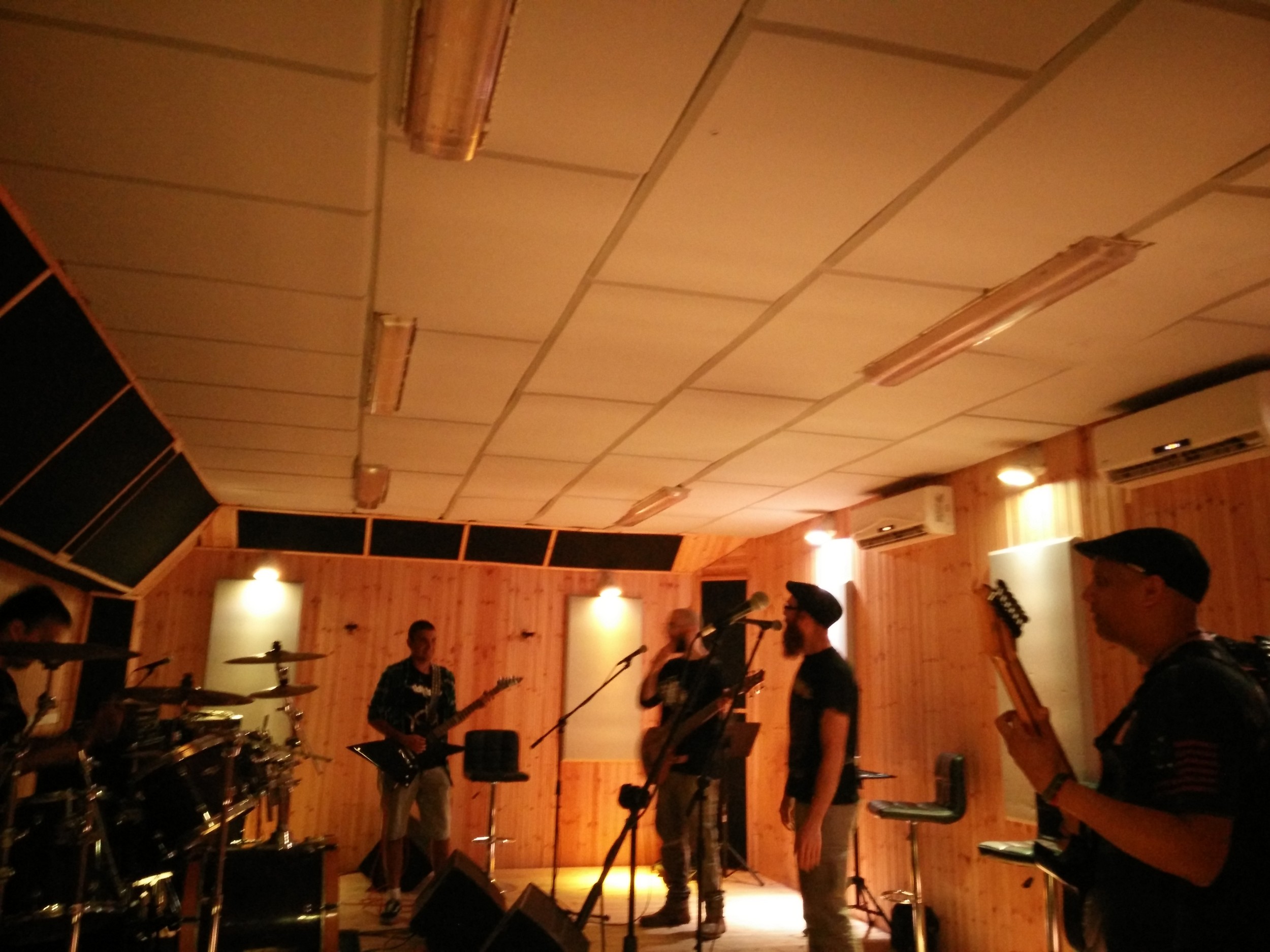

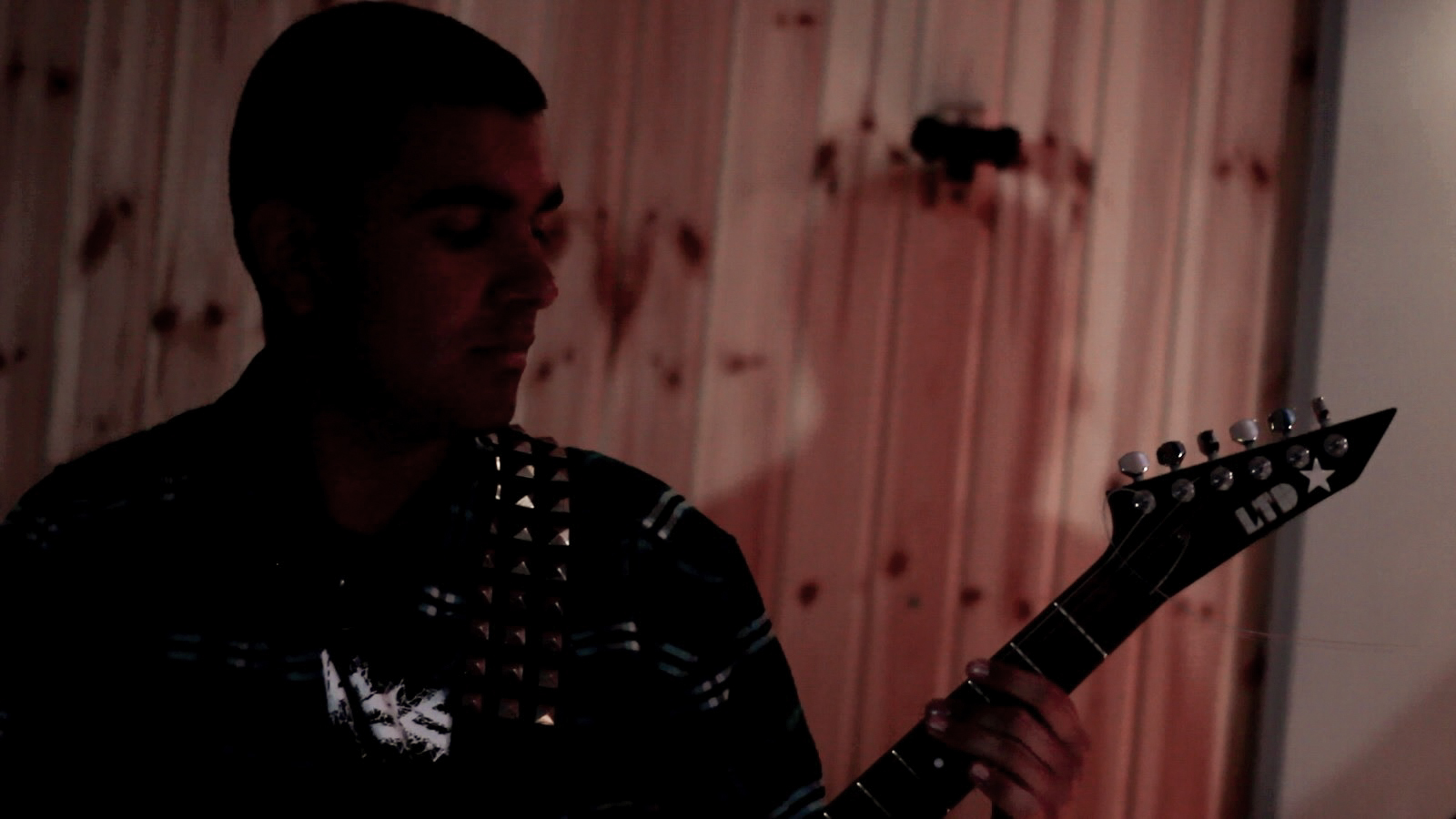
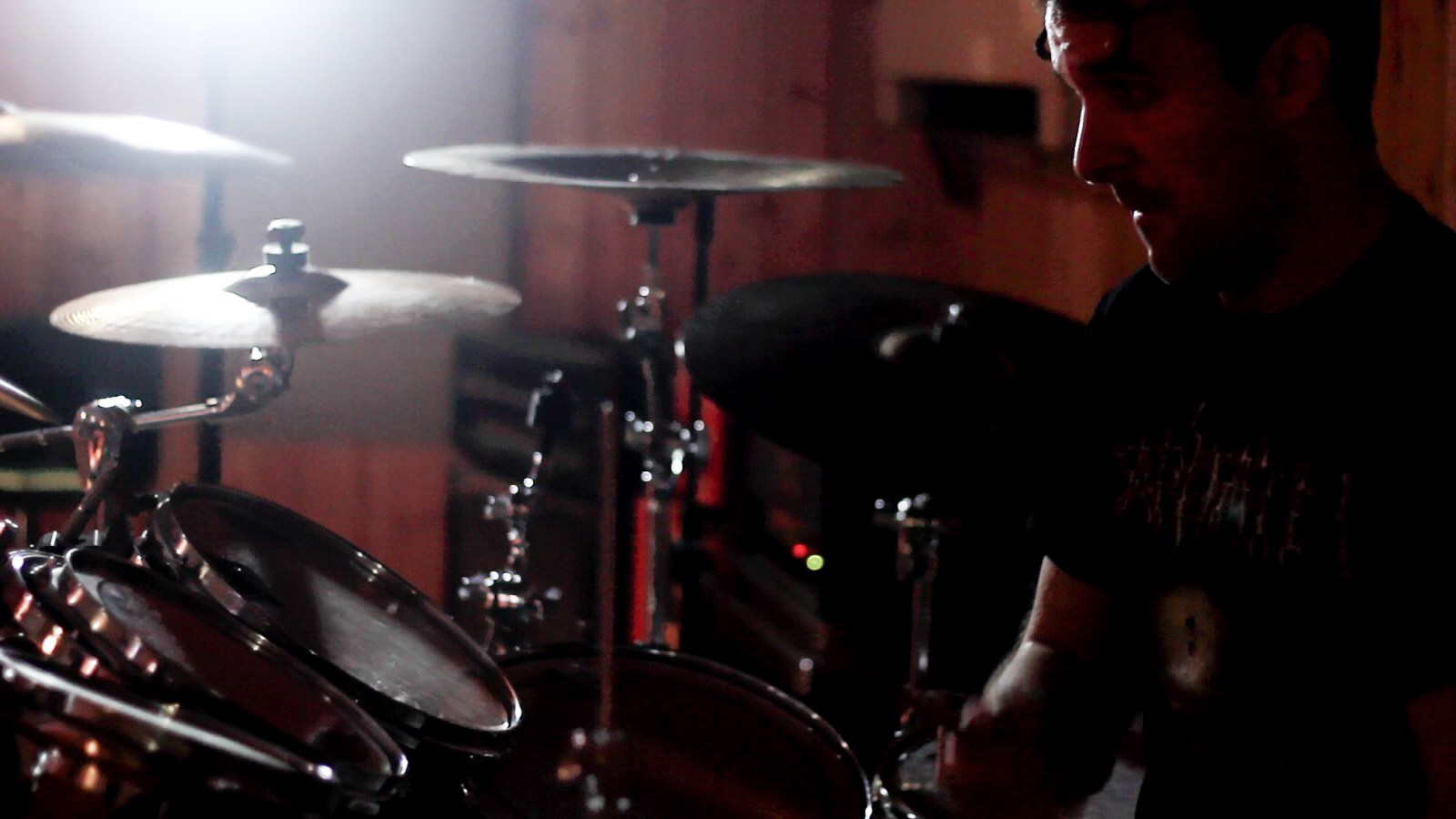
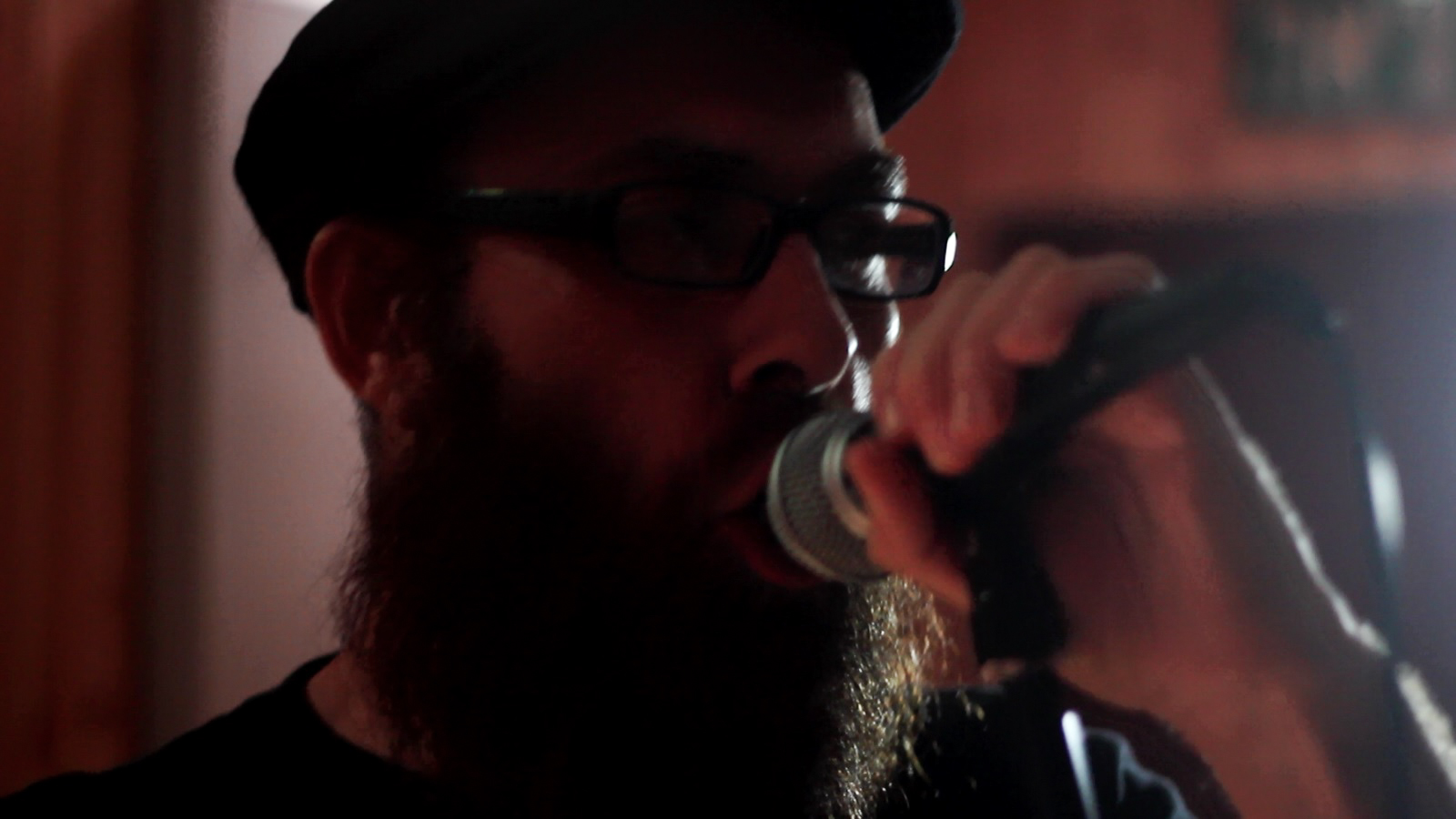
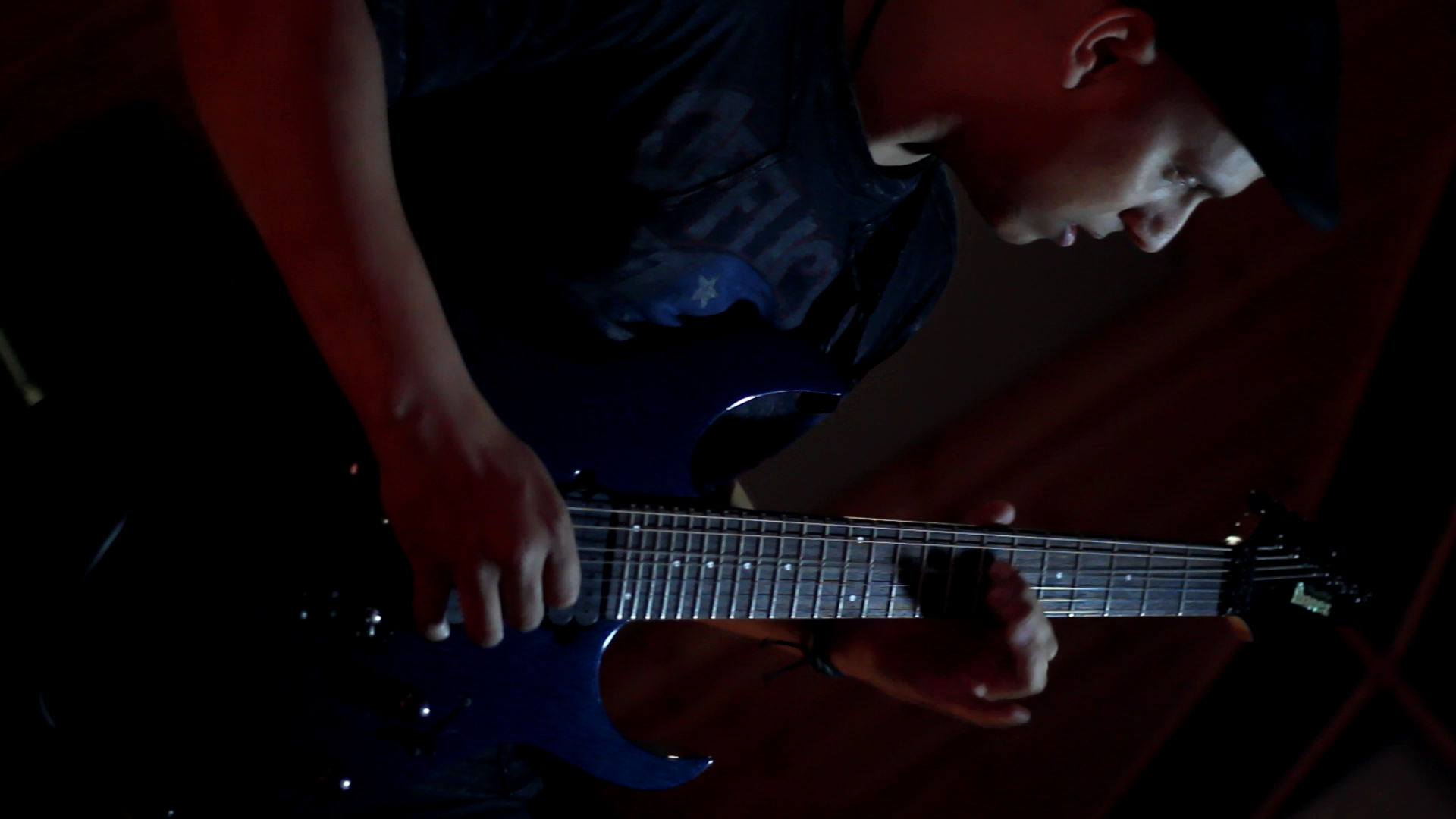

Black, Black Heart…לב שחור הוא לב שלם
לב שחור הוא לב שלם...Black, Black Heart
רְשִׁימ֥וֹת־תֹּ֖הוּ | BlackHearts - Pt. 1 the interview
By: Noa Artzi
9-29-16
Black Metal in the face of peril
Black metal is a subgenre to which almost no man can stay indifferent. You're either horribly repelled by any or all of its aspects, or you may, as in my case helplessly, as by a spell fall prey to its wonderfully dark embrace only to find that years may pass, and life's circumstances may change, but you're still as miserably and hopelessly in love as you've been on the very first day you've listened to Emperor's Anthems To The Welkin At dusk. If any of the above two hasn't occurred you, than you may have either, unfortunately been born without a soul, or that you've failed to fully grasp the whole meaning behind this whole deal called Black Metal. Because as I see it, Black Metal is the kind of thing that cannot leave you unmoved.
Indeed, much of the fear that the genre has created around itself in its early days and much of its charm stems from that very same place. When something touches someone so deeply, his soul awakens, and compels him to take extreme measures in order to do as his soul bids him do.
Anything can touch a man's soul, but if that very same thing happens to be Black Metal, then a true Blackheart is born. In the film which bears this same title, Christian Falch follows 3 Blackhearts from 3 different parts of the world, who were willing to risk it all to do as their black hearts bid them do. We follow them as they pack up their musical instruments, and head off to the north, where they shall expose their art to the local underground, just like their musical godfathers did during the early 90s.
Indeed, great and different perils do await all three protagonists on their way:
Sina risked his life enough by breaking Iranian law in order to release his music for his one man band "From the Vastlands" while still living in Iran. But then he faces a greater dilemma when invited to play at a Black Metal festival in Norway, as the exposure brought by the festival could put Sina and his family in a life threatening situation. And if he goes, he may never be able to return to his homeland.
Kaiadas is a member of the Greek Parliament by day, where he represents the far right-wing party Golden Dawn. By night he sings and plays bass for the black metal band Naer Mataron. He and his band feel a strong emotional link to Norway and Norwegian history through their passion for black metal. Naer Mataron is given the opportunity to play at a Norwegian black metal festival, but just as they receive the news, Kaiadas gets locked up for alleged association with a criminal organization. If indicted, he faces 20 years in prison.
As a longtime fan of Naer Mataron and Hellenic Black Metal in general, personally I find most interest in his side of the story. I'm certainly looking forward to the chance of getting a sneak peek into his work with Naer Mataron and moreover into his fascinating "day job".
Regardless of that, I'd totally love to have a long conversation with this guy on Hellenic politics, his far-right stance and how if any at all he sees it connecting to his art of Black Metal, I'd like to hear how they've got through the economic crisis which took over Greece a few years ago, about the help provided by Golden Dawn through donations and how, regardless of all these hardships, are the Greek still capable of creating such great art.
And last but not least, there is Hector who is a devoted Satanist and a vocalist in the Columbian Black Metal band Luciferian. His unique beliefs and occupation do not earn him much respect, to say the least, among the village's highly Catholic majority.
Hector realizes they will have some difficulties fulfilling the visa application requirements towards Luciferian's gig in Norway. He seeks counsel from his satanic mentor, the “Black Pope” in his hometown of Pereira, Colombia. They decide to organize a satanic ritual – which involves Hector selling his soul to the Devil – in order to secure their visas. Will selling his soul to Satan help Hector fulfill his dream of playing his music on Norwegian soil?
I had the honor to talk to Sina Winter and Christian Falch through e-mail. I used the opportunity to ask them a few questions about the movie and about Black Metal in general. We talked about Black Metal in Norway, Iranian history and identity and the album which changed Sina's life, which was surprisingly similar to mine, the uncanny influence of which is clearly heard on his band's debut release.
So without further ado, here's what they had to say:
Sina Winter – a voice from the Vastlands
1. Hello Sina, how the hell did you find out about the existence of Black Metal in your secluded country?
Hehe…Wait! Iran isn’t a secluded country, is it? We have our own friends, right?…but anyway, I am talking here as a musician not a politician…You know, it is a long story but to make it short I can say that I grew up in a family where my parents were fan of rock music. So, I was familiar with Rock music and later when I was a teenager I became fan of Metal music but I remember that was about more than 15 years ago. I was fan of Death and thrash Metal music in that time. And I had a friend who was living in Austria back then in that time and when he came to Iran for his vacation, he gave me a copy CD of "Burzum - Filosofem" album..! And that was the first time also the time when everything changed, you know!
Of course I know! This was the exact same album that changed my life and prompted me to write, record and overall live and breathe Black Metal as well! Incidentally enough a few months ago I've done a review of this same album for the zine.
2. I know it was a hard and dangerous decision to start making and recording music while in Iran. What made you finally do that? What was that thing that gave you the final push into the world of Black Metal?
I just want to mention that in Iran it is really complicated when it comes to metal music. The thing is if you play or record metal music just for yourself and do not try to promote your music, release it or make a show then it is not a problem (or should not be! But in some cases it was, unfortunately). Since there is no specific law about metal music, so, it makes it really confusing to know where the red lines are…Well, I remember when I listened to “Filosofem” album for the first time I found it very strange (the atmosphere of the music was so dark, unknown and mysterious for me and I remember that I listened to the whole album 5 times in a row) but it also gave me really good new feelings, something indescribable...that was the magic moment...Indeed that was the music that I found it very close to my inner feelings and I started to discover and know more about BM. It was in my dream of many years ago to start making/playing metal music but then I realized that this is my kind of music, that this is what I want to do... and I started playing guitar. then my first band in 2003 and later another project and finally "From The Vastland".
3. What were your sources of inspiration for your music? What bands, if any at all, inspired your music? How did you get hold of these bands' releases? What other things inspired your music?
Well, there are a lot of bands that inspired me but to mention a few I can say Darkthrone, Gorgoroth, Mayhem, Immortal, Enslaved, Emperor...You know, generally all the early 90's Norwegian old school BM albums! But also some other bands like Marduk, Dark Funeral, Enthroned, Belenos, Behemoth... It was not easy to find the albums at that time. You know, no internet, no record shop, no CD’s... All you could find was some copy tapes and they were mostly carried by the passengers when they were going to other countries. And since there were not many Metalheads so, you can imagine how it was hard to find…
And beside the music during the years there was a lot of books that inspired me. Mostly about history and mythology because I am always interested in that kind of books and I always read about history, myths, legends and epic stories etc.
4. How did you find the people in Iran and Ukraine that helped you to make all that happen?
Well, back then in Iran when I started my first band, I was just working with my cousin and we just knew there are 2-3 other bands that started almost at the same time (They are not active anymore, as I know) but we were not in contact. So, I started to contact label companies outside the country to release my albums officially and until that time when the Ukrainian label company released the first “From the Vastland” album, I already had released all of my previous band’s albums by some other label companies all over the world, during the years. So, I was already in contact with label companies and they knew me and my project, you know.
5. I understand you've managed to release an album before through a label in Ukraine. How did you manage to do all the recordings and distribution under the tight regime of your country?
Yeah, I had released several albums from my previous band as I said. Well, when it comes to recording the albums I should say that was not easy, you know. There was no recording studio for metal music (just some underground rehearsal places) and I had to do everything in my home. And you have to keep everything almost silent like a really personal thing, you know, just to make sure that you don’t get any trouble. Better not let other people know what you are doing etc. You can imagine how it was hard to make things happen without any help or access to basic needs to record an album.
And then after all of that, when I had an album ready then the next step was releasing it. I had to contact label companies and you know, slow internet connections, some of the websites were filtered by the government, and I had to be careful about my email (the account that I was using) and a lot of other things…you know, it was also kind of risky.
6. How did the idea of travelling to Norway come to your mind? What made you make the final decision to do it, despite all the possible consequences?
Well, you know I am a black metal musician, black metal is my passion and we all know about BM and Norway. It is like a heaven for BM musician. So, from many years ago I had this dream to go to Norway. To get the chance to work in the scene or even just for a visit. So, when I got the chance I didn’t think twice, there was no doubt and I just wanted to make it happen.
7. How did you get in touch with the people from Norway?
It was in 2007 when I released one of my albums and then I got an offer from a Norwegian label company to release the album on Vinyl here in Norway. So, it was the first time when I got in touch with Norwegian people in the scene and actually that was the beginning of all that happened afterwards.
8. How did your family and closest ones react? Did anybody else in your family know about your secret and forbidden passion, and your plans as a musician?
My family and close friends were always my supporters, honestly. As I said my parents were fan of rock music and they always supported me in this way. From the beginning until now. Still it is the first thing that they ask me whenever we talk is how things are going with my music etc. So, it was not a secret for them but of course I was not like shouting about my plan everywhere. I was really careful about it.
9. Did you ever go back to Iran after travelling to the Inferno festival in Norway?
Yeah, I had to go back because I just had a visa for 2 weeks and of course I didn’t want to stay here illegally, you know.
10. If you haven't returned to Iran since that day, do you feel like there's something you've left behind you forever in Iran that you're missing?
Well, it was in January 2014 when I could manage to go back to Norway and since then I haven’t returned to Iran, you know. What I am missing the most is my family and friends, you know. And of course my homeland, Iran… It is like there is a part of me left behind, if you know what I mean. I have my roots there.
11. Weren't you worried that your trip to the Inferno festival in Norway and your subsequent participation in this film might turn the authorities against your family? How did you all handle these concerns?
Yeah, I was really worried about those things. It was a really stressful time, you know. Because I knew that it could make problems for me or even for my family if they find out about the festival and the film. There were some cases that a band went just for a show in another country and when they returned to Iran they got some problems. It is always confusing when you don’t know where the red lines are, as I said. But you know, I didn’t want to miss this chance and fulfill one of my biggest dreams in life, to play my music on stage, in a real show, in a big festival like Inferno with known Norwegian BM musicians. So, there was no doubt about it and my family were also encouraging me.
12. I've seen your music revolves around ancient Iranian history and myth. Do you see all these as part of your identity? Would you like to see your country revive its ancient glory?
Yeah true, all of the lyrics are about/related the Persian history, mythology, legends and ancient Persian stories. You know, Iran was one of the biggest empires in the world, a real vast land. And we have lots of stories in our mythology that are full of battles between gods and devils, lights and darkness etc. And in the first place when I wanted to start my project, I felt that all of these stories are really proper for Black metal lyrics, epic stories, unique and mysterious… Well, I think as an Iranian it is part of my identity…
13. What is your connection to your home country Iran? What part does Iran take in your identity?
I am an Iranian (Persian). That is all I need to say, I think. It is the most important part of my identity. I might look or think a bit different than the majority of people in my country but you know, still I am from that land. I was born there and my background comes from Iran. Iran is full of different ethnicities (from Lurs and Talyshs to Kurds, Turks and Baluchs and more) but they are all Iranian. It is their identity, you know…I am talking about the land, the people, culture, civilization and identity, all are twisted together, you know.
Christian Falch – the man who made it happen
1. Tell us about the film.
Blackhearts is a feature documentary that deals with black metal from a contemporary angle. It is not about the history of the genre or a traditional music documentary per se, but follows different people from around the world and gets a glimpse into the minds of black metal fans that have gone to extremes to follow their passion for this music genre. The people we meet are very different from each other and come from different religious, political and cultural backgrounds – but they have one thing in common: they all dream about playing live with their bands in Norway. A reviewer called the film “surprisingly funny and slightly morbid”. I think that sums it up really well.
2. In a world now flooded with Black Metal documentaries, what makes this specific film so special?
Our starting point for this film, and what I believe we have accomplished is to make a documentary about black metal for a wide range of audience. We did not make this film for the fans in particular. We wanted to make a film consisting of personal stories in a black metal setting, but to focus on more universal topics like passion, dreams, set-backs, spirituality, illusions and more. At the same time we wanted to take the audience to places they have rarely seen before as the inner chambers of Golden Dawn, satanic rituals in Colombia, the Iranian underground black metal scene and of course – the real inside of Norway´s black metal environment. We do not use traditional interview methods, but we follow the protagonists in our film with our camera as their story evolves. And yes, the film also includes some moments that will make you laugh – not often seen in other black metal documentaries.
3. What gave you the idea on doing a film about so called Blackhearts?
I really thought that there was about time that someone made a film about black metal that is not necessarily only about what happened in the early 90´s or focusing on the mythology that is a big part of the genre. And as we all know, the Norwegian and international black metal scene consists of a lot of very interesting people and personalities. The point of view in most documentaries related to black metal does not focus on the hard core fans and the genuine impact the genre has on many people's lives all around the world. And as I said: most films are made by and for fans. With Blackhearts, this is not necessarily the case.
4. Why did you choose the name Blackhearts as the title of the film (and as I understood) to describe the three protagonists?
The film is about dreams and intense passion for black metal, so I do think the title makes perfect sense in that matter. There is a link to the infamous Mayhem bootleg album “Dawn of the Black Hearts”.
5. What is your connection to Black Metal? Are you a fan of the music?
Being Norwegian and growing up in the 90´s as a rock and metal fan, my connection to black metal as a music genre and the mythology surrounding it is pretty strong. I have remotely followed the development from black metal being something scary and provocative and turning into an important part of our cultural common heritage. Today black metal is no longer as scary or provocative as it used to be in Norway and this is something that we emphasized on in the film as well. We wanted to show the contrast. And yes, I´m a fan of black metal, but not by far as the people we meet in the film. I listen to all kinds of rock and metal related music too, but the fascination for black metal and the phenomena surrounding it has always been with me.
6. How did you first encounter Black Metal?
As with most people my age, I encountered it through the media attention that some people connected to certain Norwegian bands attracted. This of course caught my attention immediately and I started listening to some of the bands. I liked what I heard of course, but it did not change my musical preferences. It rather spiced up my record collection. By the time I turned 18 I was able to go to black metal shows and I remember seeing Mayhem live the weekend I turned 18. This experience is something I will remember for the rest of my life. Seeing a band with a stage performance like that was truly different from just listening to the albums every now and then. It is safe to say that my personal interest for the music became stronger after that show. This autumn I will see Mayhem live again at the same venue 16 years later. Looking forward to it of course.
7. Where and how did you find these three people that you've chosen for your movie, and why did you settle on this specific trio? Did you get to know these people through their music first, or through their personal stories?
We did about a year of research talking to all kinds of people before we chose to go for Sina, Hector and Kaiadas. We used the good ol´ internet for the research of course, but also our extensive international network of friends, colleagues and families to find the protagonists. Most information about them was of course related to their bands, so this was our starting point. From there we got to know more about their personalities and their current lives as well. In the case of these three – all the elements we were preliminary looking for were in place and we decided to start shooting. But bottom line is that we had to follow our instinct and gut feeling as documentary makers. Our ambition was to follow our protagonists with our camera as their story unfolded, so we had basically no idea what would happen when we started shooting. Fortunately, we encountered a fair share of drama, ups and downs, and everything that a good documentary should consist of.
8. How was working with the BlackHearts? Any interesting stories from behind the scenes?
This film is the result of 5 years of work. We have travelled around the world and met a lot of interesting people, made good friends, seen some bizarre stuff and of course had a lot of fun. At the same time it goes without saying that it has also been stressful. The film is sponsored by several important film financiers so we also had the pressure of living up to their expectations when it comes to good film making. This ain´t always easy. When making documentaries about real life people you encounter a lot of situations that´s out of your control as a filmmaker. My job is to make the best out of every situation and implementing this into the film. The stories from behind the scenes are too many to go into detail on here, but after watching the film itself, people can use their imagination to get a glimpse of what the people behind the camera have experienced. And yeah, there is a lot of stuff and situations that did not make it into the completed film as well. It has been quite an adventure I must say…..
9. As I understand from the trailer, the film will revolve mainly around Sina, but can you tell us about the other two? What makes the other two qualify for the theme of the film?
Yes, Sina from Iran is the main character in our film. This is because (believe it or not) our access to him with our cameras was simpler than with the two others. Sina´s story is in many ways also more dramatic since playing black metal music in Iran is illegal. His personal risk is great and his passion is simply something unique. For various reasons it is easy for the audience to connect with his story on an emotional level and this is something we always look for when making documentaries about real life stories.
The two other protagonists in Blackhearts are also quite exceptional. And I do think they represent two important aspects of the non-musical inspiration that some fans find in the black metal universe: Satanism and politics.
Kaiadas from the band Naer Mataron is also a parliament member for the ultra-right political party Golden Dawn in Greece. How often have you seen politicians that are deeply into black metal? This is a very fascinating angle to have a closer look at in my opinion. He also states that black metal is more important to him than a career in the parliament. In the film we try to understand where his deep passion comes from and if there is any link between this and his political views.
When making a film about the worldwide impact of black metal, one cannot ignore Satanism either. Goes without saying I guess. I have shot films in Colombia before and seen some black metal shows there as well. Therefore it was natural for me to look for some Colombian black metal Satanists as I knew they were in general very, very passionate about the music and the dark spiritual aspects of it. I was fortunate enough to come across Hector from the band Luciferian. He had everything we could dream of when it came to dedication to the music and a true belief in the forces of evil.
With these three main protagonists and the appearance of several other interesting people connected to the Norwegian and international black metal scene, I do feel that we have achieved to make a film about this phenomenon that sees it from various angles and perspectives. Black metal fans are not as homogeneous as many people think, that´s for sure.
10. I understand the movie already premiered in different places around the world. How was it received by the crowd and movie critics so far? How did people outside the Metal scene react?
Yes, since April this year the film have travelled quite a lot and we have had screenings at festivals and special events in Sydney, Bogotá, Chicago, Cape Town, Lisbon, Transylvania and of course Norway among many others. Many of the screenings have been done for a non-metal related audience and the response have been better than expected. We are very pleased to see that all kinds of people find our film entertaining, enlightening and thought provoking. The much dreaded movie critiques have been treating us nice so far as well. I´m pretty sure this has something to do with the surprise element that the film has. It is really not quite what people expect and this gives them a positive experience. We were actually prepared to take a lot of heat from the black metal scene, but so far we have only received praise.
11. Would you recommend this film to non-Black Metallers, or even people outside the metal scene? If so, how would you describe it to anyone outside the metal scene?
For sure I would recommend it for people with no interest or background knowledge of black metal – after all, they are the ones we made the film for! Black metal is just the framework of the film, the driving force is the development of the personal stories that unfolds during the film and the excitement to see some very unusual locations, people and settings. For an outsider I would describe the film as an entertaining, emotional, a bit freaky and sometimes funny road trip from Iran, Colombia and Greece to the unholy frostbitten woodlands of Norway.
12. What aspects of your film might appeal to people outside the Black Metal scene and Metal scene in general?
My answer above goes for the non-metal fans. As for the fans I do think that the film is first of all a refreshing new look at a scene and a genre that they all know in detail from before. Even though the people we meet in the film are pretty extreme and extravagant at times, most metal fans will also relate to their passion for the music. In addition, Blackhearts features glimpses and scenes with people from bands like Darkthrone, Gorgoroth, Immortal, 1349, Myrkskog, Keep of Kalessin and more. It also provides a pretty different look at the contemporary black metal scene in Norway, something that might be pretty new to some.
13. Will there be a chance of seeing this film at one of the film festivals in Israel?
Not sure about festivals in Israel, but an Israeli TV broadcaster have bought the edited version of the film (52 minutes). I don´t know the broadcast date yet, but we will for sure post the information in social media when we know.
A few closing words
This is but a sampler of the true strength and gallantry of these 3 fellows. True greatness does not arise when one is afraid to listen to his own heart. The ultimate success of our three protagonists shall be a lesson to all not to silence a heart which yearns deeply, against all odds, again and again and again…
For more info
· Blackhearts Official Website
*
Noa Artzi 9/29/2016

One of the documentarys banners

The trinity of black hearts: the Father, the Son andthe Unholy Ghost
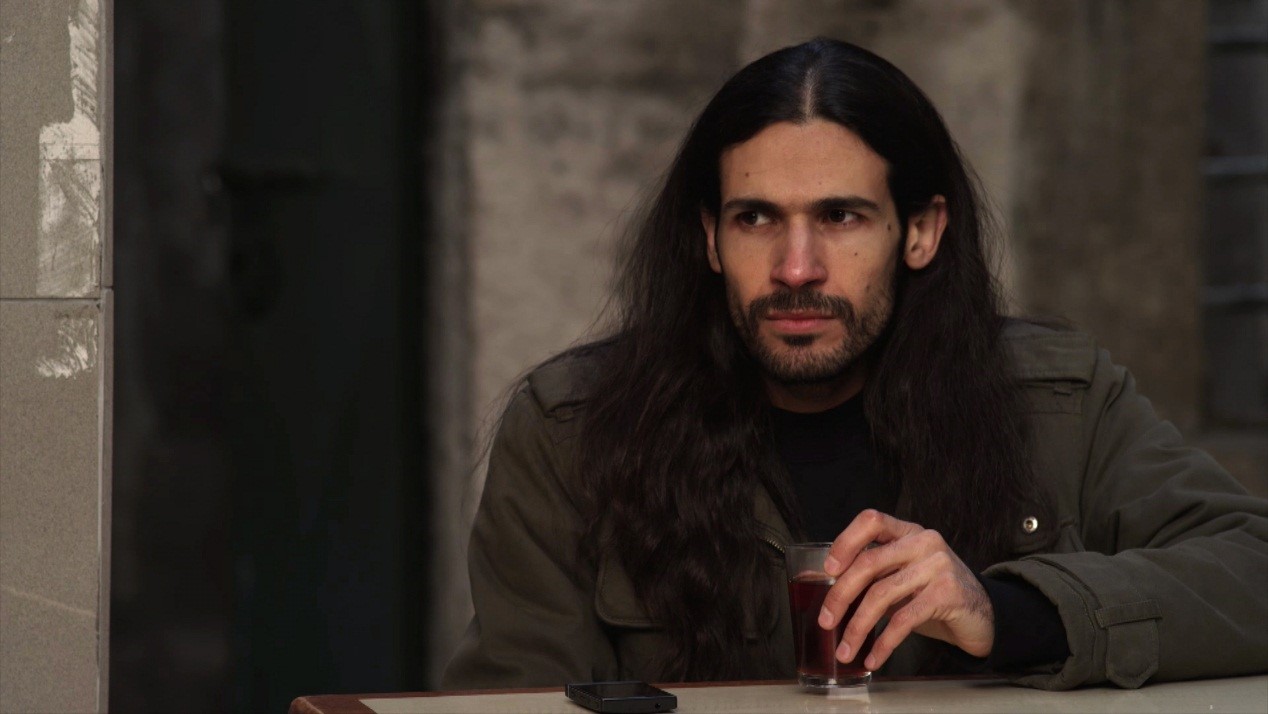
Sina, One of the few Black Metal Musicians in Iran
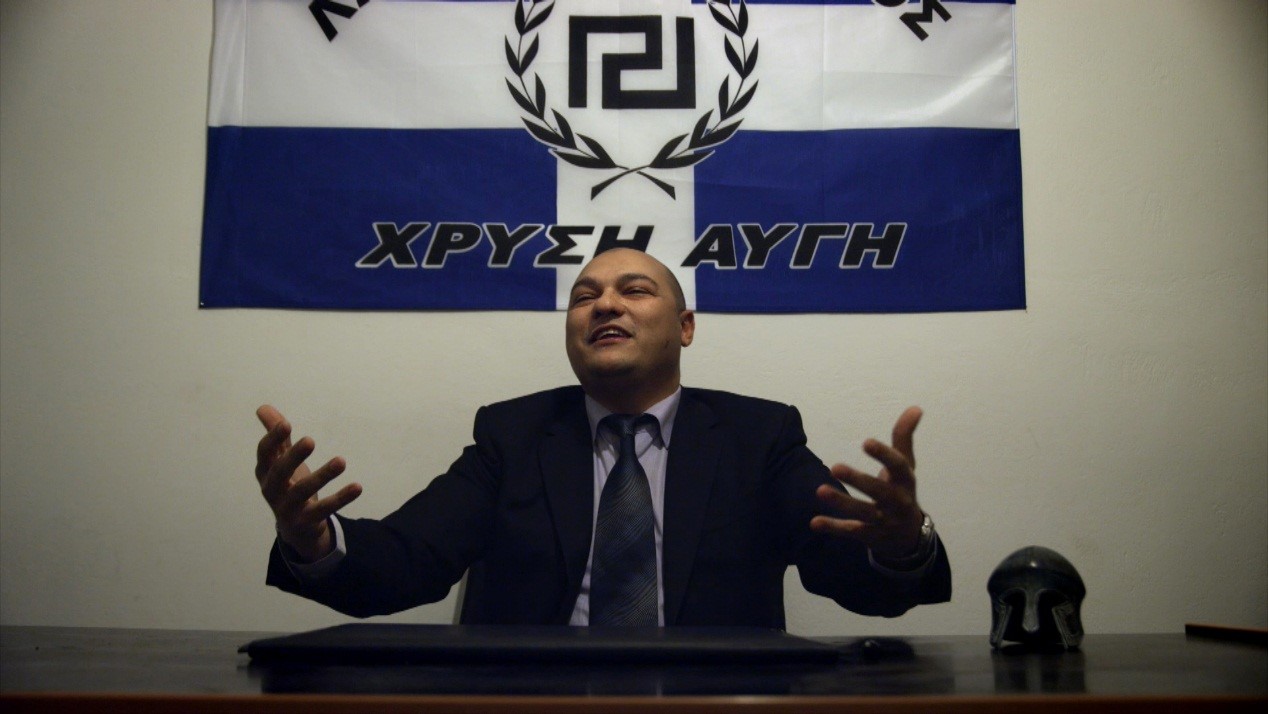
Kaiadas and "golden-dawn"

Hector makes the deal of a lifetime

Tell me: how far would you go for what you love?

"It feels surreal to be here in Norway" | Hector
(עברית) Black, Black Heart…לב שחור הוא לב שלם
לב שחור הוא לב שלם...Black, Black Heart (עברית)
רְשִׁימ֥וֹת־תֹּ֖הוּ | BlackHearts - חלק א': הראיון
מאת: נועה ארצי
8-11-16
בלאק מטאל בעין הסערה
אין אדם בעולם אשר יכול להישאר אדיש בפני הבלאק מטאל. הרבה פעמים אחת מבין שלל פניו האפלות של הז'אנר מרתיעה אותך אנושות, או שבכלל כל המכלול השחור הזה גורם לך לנוס על נפשך. אבל ישנם גם מקרים בהם כבדרך הכישוף, אתה הולך מהופנט היישר אל זרועותיו הכה אפלות אך נהדרות. מאותו הרגע יכולות לחלוף השנים ונסיבות חייך עשויות להשתנות מן הקצה אל הקצה, אבל בכל פעם שמישהו שם את Anthems To The Welkin At Dusk של Emperor, אתה לא יכול שלא לחוש את אותה הצמרמורת, בדיוק כמו בפעם הראשונה שהצלילים הללו שבו את לבך. אם טרם לא נסת על נפשך או שותקת מחמת הצמרמורות, אז או שלרוע מזלך נולדת ללא נשמה, או שבמקרה הסביר יותר לא הצלחת להפנים עד הסוף את כל העסק הזה שנקרא בלאק מטאל. כי כמו שאני רואה את הדברים, בלאק מטאל זה משהו שלא יכול לחלוף על פניך מבלי להשפיע.
ואכן, שלל הקסם והפחד שהז'אנר יצר סביבו לאורך השנים צומח בדיוק מאותו המקום. כשמשהו מצליח לגעת במקום כל כך עמוק שבתוכך, נשמתך מתעוררת ודוחקת אותך לעשות כמצוותה בכל מחיר.
כל דבר יכול לגעת בנשמתך, אך אם אותו הדבר מזדמן במקרה להיות בלאק מאטל, אז אתה בחברה טובה עם שאר הלבבות השחורים שבכל קצוות תבל, כי לב שחור הוא לב שלם. בסרט "הלבבות השחורים" (Blackhearts) עוקב כריסטיאן פאלץ' אחר 3 לבבות שחורים מ-3 קצוות שונים בעולם אשר מוכנים לקחת סיכונים אדירים בחייהם רק כדי לספק את רחשי ליבם. הסרט עוקב אחר השלושה בעודם אורזים את כלי הנגינה שלהם ועושים את דרכם הרחק אל הצפון, בכוונה לחשוף את אומנותם למחתרת המקומית, בדיוק כפי שאבותיהם הרוחניים מעולם המוזיקה עשו בשנות ה-90 המוקדמות.
אכן סכנות גדולות ומגוונות אורבות לשלושת הגיבורים שלנו בדרכם להגשים את חלום חייהם.
סינה מאיראן סיכן את חייו בכך שהפר את חוקי מדינתו כדי להפיץ את המוזיקה שהקליט עם פרויקט היחיד שלו From The Vastlands ("מארצות המרחבים") בעודו חי באיראן. אבל אז הוא ניצב בפני דילמה קשה אף יותר כשפסטיבל מוזיקה נורווגי מזמין אותו להופיע שם עם להקתו. החשיפה לה יזכה במסגרת הפסטיבל עלולה לשים את חייו ואת חיי משפחתו בסכנה ולמנוע את חזרתו לארץ מולדתו.
קאיאדס הוא חבר פרלמנט יווני, שם הוא מייצג את מפלגת השחר הזהוב מהימין הקיצוני. בלילות הוא שר ומנגן באס בלהקת Naer Mataron, אשר עם השנים הפכה לשם דבר במחתרת הבלאק העולמית. לו וללהקתו קשר רגשי עמוק לנורבגיה ולהיסטוריה הנורבגית דרך אהבתם העמוקה לבלאק מטאל. להקתו מוזמנת לנגן בפסטיבל בלאק מטאל בנורבגיה, אך ברגע שהחדשות המשמחות מגיעות לידיו, הוא נכנס למאסר בחשד למעורבות בארגון פשע. אם אכן יורשע, הוא עומד בפני עונש מאסר של 20 שנה בכלא.
בתור מישהי שעוקבת אחר הלהקה מזה כמה שנים ובתור מעריצה לא קטנה של סצנת הבלאק היוונית, חלקו של קאיאדס בכל הסיפור הזה הכי מסקרן אותי. אני בהחלט מחכה בקוצר רוח לקבל הצצה אל מאחורי הקלעים של Naer Mataron ויותר מזאת אל מקום העבודה המרתק והבלתי רגיל של סולנה.
ובכלל, אני חושבת שהייתי נהנית לנהל שיחה ארוכה עם הבחור הזה על הפוליטיקה ביוון והקשר, אם בכלל קיים שבין עמדתו הפוליטית לבין המוזיקה שהוא יוצר עם להקתו. הייתי רוצה לשמוע איך הם עברו את המשבר הכלכלי אשר החל לפני כמה שנים ביוון ועל העזרה שמפלגת השחר הזהוב הושיטה לאזרחים דרך איסוף תרומות, אך יותר מכול מסקרן אותי לשמוע כיצד, על אף כל הקשיים הכלכליים יוון עדיין מצליחה להוות מצע גידול כל כך פורה לאומנות באמת יוצאת מן הכלל.
אחרון חביב הוא בחור בשם הקטור, שטניסט מושבע וסולן בלהקת הבלאק מטאל הקולומביאנית Luciferian. דרכו הרוחנית ועיסוקיו הבלתי רגילים אינם מזכים אותו בכבוד רב, בלשון ההמעטה, מצד הרוב הקתולי המתגורר בשכונתו.
כשהקטור מבין שעומדים בפניו מספר קשיים בהשגת הוויזה הנחוצה בכדי להופיע עם להקתו בפסטיבל בנורבגיה, הוא שואל לעצת מורו הרוחני, הריהו "הכומר השחור" מעיר מולדתו פרירה שבקולומביה. הם מחליטים לארגן טקס פולחן, שבמהלכו ימכור הקטור את נשמתו לשטן בכדי להבטיח את קבלת הוויזה שבלעדיה לא יוכל להגשים את חלומו הגדול. האם העסקה הבלתי שגרתית הזו תביא את הקטור ואת להקתו אל מחוז חפצו?
היה לי את הכבוד לדבר עם סינה ועם כריסטיאן פאלץ' דרך המייל. ניצלתי את ההזדמנות המיוחדת כדי לשאול אותם כמה שאלות על הסרט וגם כמה שאלות כלליות בכל הנוגע בבלאק מטאל. דיברנו על סצנת הבלאק בנורווגיה, על ההיסטוריה והזהות האיראנית ועל האלבום ששינה את חייו של סינה, אשר באופן מפתיע היה גם אחד הדברים שהשפיעו לא מעט על חיי, ושהשפעתו ניכרת באופן מובהק באלבום הבכורה של להקתו.
אז מבלי להכביר במילים, הנה מה שהיה להם לאומר:
סינה ווינטר – הקול מארצות המרחבים
1. שלום סינה, איך לעזאזל נודע לך על קיומו של הבלאק מטאל במדינה כל כך מבודדת כמו איראן?
(צוחק) רגע, ממתי איראן נחשבת למדינה מבודדת? יש לנו את החברים שלנו, נכון? בכל אופן, אני מדבר כאן כמוזיקאי ולא כפוליטיקאי, את יודעת. זה סיפור ארוך אבל בשורה התחתונה אני יכול לאומר שגדלתי במשפחה בה הוריי האזינו למוזיקת רוק כך שמוזיקת הרוק הייתה מוכרת לי. מאוחר יותר בגיל העשרה התחלתי לאהוב גם מטאל אבל זה קרה לפני מעל 15 שנה. באותם הימים אהבתי דת' ות'ראש מטאל. ואז הכרתי חבר שגר באותה התקופה באוסטריה וכשהוא הגיע לחופשה באיראן, הוא הביא לי עותק של האלבום Filosofem של Burzum...! וזאת הייתה, את יודעת, גם הפעם הראשונה שהכול אצלי השתנה!
בטח שאני יודעת, זהו גם בדיוק אותו האלבום ששינה את חיי ושנתן לי את הדחיפה האחרונה לה הייתי זקוקה כדי להתחיל לכתוב, להקליט ובגדול לחיות ולנשום בלאק מטאל! בצירוף מקרים גמור, בדיוק גם סקרתי את האלבום במסגרת המגזין לפני כמה חודשים.
2. אני יודעת שההחלטה להתחיל ליצור ולהקליט מוזיקה בעודך גר באיראן הייתה קשה ומסוכנת. מה גרם לך בסופו של דבר ללכת על זה? מה היה הדבר שנתן לך את אותה הדחיפה האחרונה אל תוך עולם הבלאק מטאל?
אני רק רוצה לאומר שהמדיניות של איראן באמת מסובכת כשזה מגיע למוזיקת מטאל. העניין הוא שאם אתה מנגן או מקליט מוזיקת מטאל רק בשביל עצמך מבלי לנסות ולהפיץ, לשחרר או להופיע עם המוזיקה שלך, אז הדבר אינו מהווה בעיה (או שהוא לפחות לא אמור! אבל במקרים מסוימים לצערי זה היה בעייתי). מאחר ואין חוק ברור בנוגע למוזיקת מטאל, אז זה ממש הופך את העניין למבלבל כשאתה מנסה להבין היכן הקווים האדומים...ובכן אני זוכר את הפעם הראשונה שהקשבתי ל-Filosofem של Burzum וזה הרגיש לי כל כך מוזר (האווירה הייתה כל כך אפלה, מעורפלת ומסתורית עבורי ואני זוכר שהקשבתי לאלבום 5 פעמים ברצף), אבל באותו הזמן זה מילא אותי בהמון רגשות טובים וחדשים, משהו שאני לא יודע איך לתאר...זה היה רגע קסום עבורי...אכן זאת הייתה המוזיקה שהרגשתי קרבה רגשית הכי גדולה כלפיה ומשם התחלתי לגלות עוד ועוד דברים על הבלאק מטאל. במשך שנים רבות זה היה החלום שלי להתחיל לנגן מוזיקת מטאל, אבל אז הגעתי למסקנה שזהו סוג המוזיקה שלי ושזה מה שאני רוצה לעשות...ואז התחלתי לנגן בגיטרה. הקמתי את הלהקה הראשונה שלי ב-2003 ואחר כך פרויקט אחר שאחריו בסופו של דבר הגיע הפרויקט הנוכחי שלי, From The Vastlands ("מארצות המרחב").
3. מהם מקורות ההשראה למוזיקה שלך? אילו להקות, אם בכלל, השפיעו על המוזיקה שלך? איך הייתה לך גישה לחומרים של הלהקות הללו? אילו דברים נוספים היוו מקור השראה למוזיקה שלך?
ובכן ישנן המון להקות שהשפיעו עלי. לשם הדוגמה אני יכול למנות ביניהן את דארקת'רון, גורגורות', מייהם, אימורטל, אנסלייבד, אמפרור...את יודעת, באופן כללי אני מדבר על כל הוצאות האולדסקול הנורבגיות משנות ה-90 המוקדמות! אבל גם ללא ספק להקות כמו מארדוק, דארק פיונרל, אנת'רונד, בלנוס (Belenos), בהמות'...לא היה קל להשיג את האלבומים הללו באותו הזמן. את יודעת, לא היה לנו אינטרנט, חנויות תקליטים או תקליטורים...כל מה שיכולתי למצוא זה עותקים על קלטות שהביאו עמם אנשים שהגיעו מארצות אחרות. ומאחר וגם לא היו הרבה מטאליסטים אז, את יכולה לדמיין עד כמה קשה היה למצוא את כל זה...
4. אני מבינה שהצלחת לשחרר אלבום דרך לייבל אוקראיני. איך הצלחת לעשות את כל ההקלטות וההפצה תחת עיני המשטר האיראני המחמיר?
ובכן כפי שכבר אמרתי, כבר הספקתי לשחרר מספר אלבומים של הלהקות הקודמות שלי. אבל כשזה מגיע להקלטות אני רק אומר שזה לא היה קל, את יודעת. לא היה לנו אולפן הקלטות ייעודי למטאל (רק כמה חדרי חזרות מחתרתיים) והייתי צריך לעשות את הכול בביתי. והייתי צריך לשמור את הכול בסוד כאילו זה משהו ממש אישי, את יודעת, רק כדי לא להסתבך. הרגשתי שעדיף לא ליידע אנשים אחרים על מה שאני עושה וכאלה. את יכולה לתאר לעצמך כמה קשה היה לגרום לכל הדברים האלו לקרות מבלי לקבל שום עזרה ובלי שום גישה לאמצעים בסיסיים הנחוצים להקלטת האלבום.
ואז אחרי כל זה, כשהאלבום שלי היה כבר מוכן, הצעד הבא היה לשחרר אותו. הייתי צריך ליצור קשר עם לייבלים ואת יודעת, חיבור האינטרנט היה איטי וכמה מהאתרים נחסמו על ידי השלטון, והייתי צריך להיות מאוד זהיר עם המיילים שלי (חשבון המשתמש דרכו התכתבתי) ועם עוד הרבה דברים אחרים...את יודעת, זה היה גם די מסוכן.
5. איך מצאת את האנשים באיראן ובאוקראינה שעזרו לך לגרום לכל זה לקרות?
ובכן באותה התקופה באיראן כשהקמתי את הלהקה הראשונה שלי, עבדתי רק עם הבן דוד שלי ואנחנו היינו מודעים לקיומן של רק עוד 2-3 להקות אחרות שהחלו את פעילותן בערך באותו הזמן (כיום הן אינן פעילות יותר, ככל שהדבר ידוע לי) אבל אנחנו לא היינו בקשר. אז התחלתי ליצור קשר עם לייבלים מחו"ל בחיפוש אחר מישהו שישחרר את האלבום שלי באופן רשמי, ולפני שהספקתי להוציא את האלבום הראשון של From The Vastland דרך החברה האוקראינית, כבר הספקתי באותן השנים להוציא את כל האלבומים של הלהקות הקודמות שלי דרך כל מיני לייבלים מכל מיני ארצות בעולם. אז הייתי כבר בקשר עם לייבלים והם הכירו אותי ואת הפרויקט, את יודעת.
6. איך עלה בדעתך הרעיון לנסוע לנורבגיה? מה גרם לך לקבל את ההחלטה הסופית לעשות זאת, על אף כל ההשלכות האפשריות?
ובכן, את יודעת שאני מוזיקאי שעושה בלאק מטאל. בלאק מטאל זו התשוקה שלי וכולנו הרי מכירים את הקשר שבין נורבגיה לבלאק מטאל. נורבגיה היא כמו גן עדן עבור מוזיקאי שעושה בלאק מטאל. אז היה לי את החלום הזה להגיע לנורבגיה כבר הרבה שנים, לזכות בהזדמנות לעבוד במסגרת הסצנה או רק לשם ביקור. אז כשניתנה לי ההזדמנות לא חשבתי על זה פעמיים, לא היה ספק בנוגע לכך שרק רציתי שזה יקרה.
7. איך נוצר הקשר בינך לבין האנשים בנורבגיה?
כששחררתי את אחד האלבומים שלי ב-2007 קיבלתי הצעה מלייבל בנורבגיה לשחרר את האלבום על תקליט כאן בנורבגיה. אז זאת הייתה הפעם הראשונה שבאמת נוצר קשר ביני לבין מישהו מהסצנה הנורבגית וזה למעשה התחיל את כל מה שקרה אחר כך.
8. איך המשפחה והאנשים הקרובים אליך הגיבו לכל זה? האם מישהו אחר במשפחה הכיר את תשוקתך הסודית והאסורה ועל תכניותיך כמוזיקאי?
משפחתי וחבריי הקרובים תמיד תמכו בי, באמת. כפי שכבר אמרתי הוריי אוהבים מוזיקת רוק והם תמיד תמכו בי בכל הנוגע לזה, מהרגע הראשון ועד עכשיו. הדבר הראשון שהם תמיד שואלים אותי לגביו בכל פעם שאנחנו מדברים זה איך הולך לי עם המוזיקה שלי וכאלה. אז זה לא היה סוד ביני לבינם אבל כמובן שלא סיפרתי על תכניותיי לכל אחד. הייתי מאוד זהיר בנוגע לזה.
9. האם יצא לך לחזור לאיראן אחרי שנסעת להופיע בפסטיבל אינפרנו בנורבגיה?
כן, הייתי חייב לחזור בגלל שהייתה לי ויזה רק לשבועיים ומן הסתם לא רציתי להישאר כאן באופן בלתי חוקי, את יודעת.
10. אם לא חזרת לאיראן מאז אותו היום, האם אתה מרגיש שיש משהו שנותר מאחוריך בארץ מולדתך שתמיד תתגעגע אליו?
ובכן בינואר 2014 הצלחתי לחזור שוב לנורבגיה אבל מאז לא חזרתי לאיראן. הדבר לו אני הכי מתגעגע הוא משפחתי וחבריי, את יודעת. וכמובן שאני גם מתגעגע לארץ מולדתי איראן...אני מרגיש כאילו יש חלק בי שנשאר מאחורי, אם את מבינה מה אני אומר. השורשים שלי נמצאים שם.
11. לא היית מודאג מהאפשרות שהופעתך בפסטיבל אינפרנו בנורבגיה והשתתפותך בסרט זה עלולים לגרום לרשויות לצאת כנגד משפחתך? כיצד התמודדת עם זה?
כן, הייתי מאוד מודאג מהאפשרות הזאת. אלו היו זמנים באמת מלחיצים, את יודעת, בגלל שידעתי שאם הם יגלו על הופעתי בפסטיבל ובסרט, זה עלול להכניס אותי ואת משפחתי לצרות. היו כמה מקרים בהם להקה יצאה רק כדי להופיע במדינה אחרת ואז כשהם חזרו לאיראן הם נכנסו לצרות. זה תמיד מבלבל כשאתה לא יודע היכן הקווים האדומים, כפי שאמרתי. אבל את יודעת, לא רציתי לפספס את ההזדמנות להגשים את אחד החלומות הגדולים ביותר בחיי והוא לנגן את המוזיקה שלי על הבמה, בהופעה אמתית בפסטיבל גדול כמו אינפרנו, לצד אומני בלאק מטאל נורבגיים מפורסמים. אז לא היה ספק לגבי זה וגם משפחתי עודדה אותי לעשות זאת.
12. שמתי לב שהמוזיקה שלך סובבת סביב ההיסטוריה והמיתולוגיה של פרס הקדומה. האם אתה רואה בנושאים אלו חלק מזהותך? האם היית רוצה לחזות בתחיית תפארתה הקדומה של ארצך?
אני רואה עצמי כאיראני (פרסי). זה כל מה שיש לי לאומר. אני חושב שזהו החלק הכי חשוב בזהות שלי. ייתכן שאני נראה או חושב בצורה קצת שונה מרוב האנשים בארצי אבל את יודעת, אני עדיין בא מהארץ הזאת. נולדתי שם והרקע שלי מגיע מאיראן. איראן מלאה בקבוצות אתניות שונות: יש לנו כורדים, טורקים, טלישים, לורים ועוד, אבל כולם אירניים. זוהי הזהות שלהם, את יודעת...אני מתכוון לארץ, לאנשים, לתרבות, לציוויליזציה ולזהות, כל אלו שזורים יחדיו, את יודעת.
כריסטיאן פאלץ' – האיש שמאחורי הסרט
1. שלום כריסטיאן, האם תוכל לספר לנו קצת על הסרט?
"הלבבות השחורים" הוא סרט תיעודי באורך מלא העוסק בבלאק מטאל מנקודת מבט עכשווית. הוא לא נועד לעסוק בהיסטוריה של הז'אנר או להיות סרט תיעודי על המוזיקה כשלעצמו. במקום זאת הוא עוקב אחר אנשים שונים ממקומות שונים בעולם ונותן הצצה אל תוך ראשם של חובבי בלאק מטאל אשר הלכו בעקבות תשוקתם לז'אנר חרף כל הסכנות אשר נקרו בדרכם. האנשים שתפגשו בסרט מאוד שונים זה מזה ומגיעים מרקעים דתיים, פוליטיים ותרבותיים שונים. עם זאת לשלושתם דבר אחד משותף והוא חלומם לנגן בהופעה חיה עם להקתם בנורבגיה. אחת הסקירות הגדירה את הסרט כ-"קצת מורבידי אך מצחיק באופן מפתיע". אני חושב שמילים אלו מגדירות אותו בצורה לא רעה.
2. מהו הדבר ההופך את הסרט הזה לכל כך מיוחד בעולם הקולנוע של היום המוצף בסרטים תיעודיים העוסקים בבלאק מטאל?
נקודת המוצא של הסרט הזה ומה שאני מאמין שהצלחנו להשיג כאן זה שהצלחנו ליצור סרט תיעודי בנושא אשר פונה אל קהל רחב של צופים. לא יצרנו את הסרט הזה רק למען חובבי הז'אנר. רצינו שסרט זה יורכב מסיפורים אישיים על רקע הבלאק מטאל, אך להתמקד יותר בנושאים אוניברסליים כמו חלומות, תשוקות, רוחניות, אשליות, קשיים ועוד. בזמנו רצינו לקחת את הקהל למקומות שלא ראו מעודם כמו חדרוניה הפנימיים של מפלגת "השחר הזהוב", טקסי פולחן שטניים בקולומביה, מחתרת הבלאק מטאל האיראנית וכמובן מבט על איך באמת נראית אוכלוסיית הבלאק מטאל בנורבגיה. איננו עושים שימוש בשיטות ראיון מסורתיות. במקום זאת בסרטנו אנו עוקבים עם המצלמה אחר גיבורינו בזמן שסיפורם האישי מתפתח. וכן, יש בסרט גם כמה רגעים מצחיקים –משהו שלא תמיד רואים בסרטים תיעודיים העוסקים בבלאק מטאל.
3. מה נתן לך את הרעיון לעשות סרט כזה העוסק סביב אותם "לבבות שחורים"?
אני באמת חשבתי שהגיע הזמן שמישהו יעשה סרט על בלאק מטאל שאינו עוסק בהכרח במה שקרה בשנות ה-90 המוקדמות או שאינו בהכרח מתמקד במיתולוגיה של אז המהווה חלק גדול מהז'אנר. כפי שאתם יודעים, סצנת הבלאק מטאל הנורבגית והעולמית מורכבת מהמון אנשים ואישיויות מעניינות. נקודת המבט ברוב הסרטים התיעודיים העוסקים בבלאק מטאל אינה מתמקדת במעריצים השרופים ובהשפעה האמתית שיש לז'אנר על חייהם של אנשים ברחבי העולם. וכפי שכבר אמרתי, רוב הסרטים נעשים על ידי חובבי הז'אנר למען חובבי הז'אנר. עם "הלבבות השחורים" זהו לא בהכרח המצב.
4. מדוע בחרת לכנות את סרטך ולמיטב הבנתי גם את גיבוריו בשם "הלבבות השחורים" (Blackhearts)?
הסרט עוסק בחלומות ובתשוקה עזה כלפי הבלאק מטאל, כך שחשבתי שהשם הזה הולם והגיוני. השם גם יוצר אסוציאציה לאלבום הבוטלג הידוע לשמצה "Dawn of the Black Hearts" של מייהם.
5. מהו הקשר שלך לבלאק מטאל? האם אתה מחובבי הז'אנר?
מעצם היותי נורבגי חובב רוק ומטאל שגדל בשנות ה-90, היה לי קשר די חזק לבלאק מטאל כז'אנר מוזיקלי ולכל המיתוסים שסבבו אותו. עקבתי מרחוק אחר הפיכת הבלאק מטאל ממשהו מפחיד ופרובוקטיבי אל משהו שהוא חלק חשוב מהמורשת התרבותית המשותפת שלנו. הבלאק מטאל כיום בנורבגיה כבר איננו אותו הדבר המפחיד והפרובוקטיבי שהיה בימים עברו וזהו עוד משהו ששמנו עליו את הדגש בסרט שלנו. רצינו להבליט את הניגודיות הזאת. וכן, אני אוהב בלאק מטאל, אבל לא כמו כל האנשים שאתם תפגשו בסרט. אני גם מקשיב לכל מיני סוגים של מוזיקה הקשורים לרוק ולמטאל, אבל העניין שלי כלפי הבלאק מטאל וכלפי כל התופעות הסובבות אותו תמיד ליווה אותי.
6. כיצד התוודית לראשונה לבלאק מטאל?
כמו כל האנשים בני גילי, התוודיתי כלפי זה לראשונה דרך כל העניין התקשורתי שנוצר סביב אנשים מסוימים שניגנו בכל מיני להקות נורבגיות. זה היה הדבר שישר לכד את תשומת ליבי ומיד התחלתי להקשיב לכמה מהלהקות. אין ספק שהתאהבתי במה ששמעתי, אבל זה לא שינה את העדפותיי המוזיקליות אלא יותר תיבל את אוסף התקליטים שלי. כשהגעתי לגיל 18 יכולתי סוף סוף ללכת להופעות בלאק מטאל ואני זוכר את הפעם הראשונה שראיתי את מייהם בהופעה חיה בסוף השבוע של יום ההולדת ה-18 שלי. זו הייתה חוויה שאזכור במשך כל שארית חיי. לראות הופעה חיה של להקה שנותנת כזאת הופעה על הבמה הייתה חוויה אחרת לגמרי מזו שבסתם להקשיב לאלבומים מפעם לפעם. אני יכול לאומר בוודאות שהעניין האישי שלי במוזיקה התחזק לאחר שצפיתי בהופעה הזאת. אני הולך לראות שוב את מייהם בהופעה חיה בסתיו הקרוב באותו המקום בו ראיתי אותם לפני 16 שנה. אין ספק שאני ממש מצפה לזה.
7. היכן מצאת את כל האנשים הללו שבחרת להציג בסרטך ומדוע דווקא החלטת לבחור בשלושת הגיבורים הללו? האם הכרת קודם את האנשים האלו דרך המוזיקה שהם עושים, או דרך הסיפור האישי שלהם?
עשינו מחקר של כשנה בו דיברנו עם כל מיני אנשים לפני שהחלטנו ללכת על סינה, הקטור וקאיאדס. כמובן שהשתמשנו באינטרנט הישן והטוב לשם המחקר אך גם השתמשנו בכל הקשרים החברתיים והמשפחתיים הבינלאומית שלנו כדי למצוא את הגיבורים שלנו. רוב המידע שמצאנו אודותיהם היה מן הסתם קשור ללהקותיהם ולכן זאת הייתה נקודת הפתיחה שלנו. משם החלה ההיכרות שלנו עם האישיויות ועם חייהם האישיים של גיבורינו. אנחנו מצאנו את כל האלמנטים שחיפשנו בשלושת הגיבורים שלנו אז התחלנו בצילומים. אבל בשורה התחתונה היינו צריכים ללכת בעקבות האינסטינקטים ותחושות הבטן שלנו כיוצרי סרטים דוקומנטריים. השאיפה שלנו הייתה לעקוב אחר גיבורינו עם המצלמה בעוד שסיפורם האישי מתפתח ולכן עקרונית לא היה לנו מושג מה עומד לקרות כשהתחלנו בצילומים. למזלנו, נתקלנו במנה טובה של דרמה, עליות, מורדות וכל מה שצריך להיות בסרט דוקומנטרי מוצלח.
8. איך הייתה העבודה עם הלבבות השחורים? האם יש לך סיפורים מעניינים מאחורי הקלעים?
הסרט הוא תוצר של 5 שנות עבודה. טיילנו בכל רחבי העולם, פגשנו המון אנשים מעניינים, היכרנו חברים טובים, ראינו כמה דברים מוזרים ומן הסתם נהנינו מאוד. אין ספק שהיו גם פעמים שזה היה מאוד מלחיץ. הסרט ממומן על ידי כמה בעלי הון חשובים ולכן היינו גם נתונים ללחץ הנוצר על ידי הצורך לעמוד בציפיות שלהם ליצירת סרט איכותי. זה לא תמיד קל. כשאתה יוצר סרט תיעודי על אנשים בחיים האמתיים אתה נתקל בהמון מצבים אשר נמצאים מחוץ לשליטתך כיוצר הסרט. עבודתי הייתה להפיק את המיטב מכל סיטואציה ובליישם את זה אל תוך הסרט. הסיפורים מאחורי הקלעים רבים מכדי שאכנס כאן לכל הפרטים, אך לאחר הצפייה בסרט אנשים יכולים לדמיין מה עבר על האנשים שמאחורי המצלמה. וכן, היו גם המון מצבים ודברים שלא מצאו את דרכם אל הסרט הגמור. אבל אני חייב לאומר שזאת הייתה חתיכת הרפתקה...
9. כפי שהבנתי מצפייה בטריילר הסרט נסוב ברובו סביב סינה, אך האם תוכל גם לספר לנו על שני הגיבורים האחרים? מה הופך את השניים האחרים למועמדים ראויים לנושא הסרט?
כן, סינה מאירן הוא הגיבור המרכזי בסרט שלנו. הסיבה לכך הייתה, תאמיני או לא, שהיייתה לנו גישה הרבה יותר קלה אליו עם המצלמות מהשניים האחרים. הסיפור של סינה הוא גם מהרבה בחינות הרבה יותר דרמטי מאחר ונגינת בלאק מטאל היא דבר לא חוקי באיראן. הסיכון האישי שלו היה עצום ותשוקתו אל הז'אנר הייתה דבר פשוט מיוחד. מסיבות שונות יהיה לקהל גם הרבה יותר קל להתחבר לסיפור שלו ברמה הרגשית וזהו משהו שאנחנו תמיד מחפשים להשיג כשאנחנו יוצרים סרטים תיעודיים על סיפורי חיים אמתיים.
שני הגיבורים האחרים בסרט גם הם דבר די יוצא מן הכלל. אני חושב שהם מייצגים 2 פנים חשובות למקורות ההשראה הלא מוזיקליים לחלק מחובבי הבלאק מטאל בעולם, הריהם פוליטיקה ופולחן השטן.
קאיאדס מלהקת Naer Mataron הוא חבר פרלמנט המייצג את מפלגת "השחר הזהוב" המשתייכת לימין הקיצוני של יוון. כמה פעמים כבר יצא לכם לפגוש פוליטיקאים בעלי חיבה עמוקה לבלאק מטאל? לדעתי זוהי זווית מרתקת להתבוננות מקרוב. הוא גם אומר שהבלאק מטאל חשוב לו הרבה יותר מהקריירה שלו בפרלמנט. בסרט אנחנו מנסים להבין מאיפה מגיעה תשוקתו האדירה לז'אנר והאם יש איזשהו קשר בינה לבין פניו הפוליטית.
כשיוצרים סרט העוסק בהשפעה העולמית של הבלאק מטאל, מן הסתם אי אפשר להתעלם גם מהפן העוסק בפולחן השטן. לכן היה טבעי עבורי לחפש כמה שטניסטים בקולומביה, מאחר וידעתי כי באופן כללי יש להם תשוקה עמוקה כלפי המוזיקה וכלפי פניה הרוחניים והאפלים. היה לי את המזל להיתקל בהקטור מלהקת Luciferian. היה בו את כל מה שרק רציתי מבחינת מסירותו למוזיקה ואמונתו הכנה בכוחות הרשע.
עם שלושת הגיבורים הראשיים הללו ועם כמה אנשים מעניינים אחרים מסצנת הבלאק מטאל הנורווגית והעולמית, אני חושב שהצלחנו ליצור סרט המתבונן בתופעה הזאת מכמה זוויות ונקודות מבט. מה שבטוח הוא שקהל חובבי הבלאק מטאל אינו דבר הומוגני בניגוד למה שהרבה אנשים נוטים לחשוב.
10. אני מבינה שהסרט כבר זכה להקרנת בכורה בכמה מקומות שונים בעולם. כיצד הוא התקבל על ידי הקהל ועל ידי מבקרי הסרטים עד כה? מה היו התגובות של אנשים מחוץ לסצנת המטאל?
כן, מאז אפריל האחרון הסרט נדד לא מעט והיו לנו הקרנות במסגרת פסטיבלים ואירועים מיוחדים בסידני, בוגוטה, שיקאגו, קייפ טאון, ליסבון, טרנסילבניה וכמובן בנורבגיה בין כל השאר. רוב ההקרנות בוצעו עבור קהל שאין לו קשר למטאל והתגובות היו טובות משציפיתי. אנחנו מאוד מרוצים לראות שהרבה אנשים חושבים שהסרט שלנו מבדר, מעורר מחשבה ומאיר עיניים. גם מבקרי הסרטים שמהם מאוד חששנו התייחסו אלינו יפה עד כה. אני לא בטוח אם יש לזה קשר לאלמנט ההפתעה שיש בסרט הזה. הוא לא באמת מה שאנשים מצפים לראות וזה תורם לחוויה החיובית שלהם. למעשה אנחנו הכנו את עצמנו להמון תגובות נזעמות מאנשים בסצנת הבלאק מטאל, אך עד כה זכינו רק לשבחים.
11. האם היית ממליץ לאנשים שאינם חובבי בלאק מטאל, או שאינם חובבי מטאל בכללי לצפות בסרט? אם כן, כיצד היית מתאר את הסרט לכל מי שמחוץ לסצנת המטאל?
בוודאי שהייתי ממליץ על הסרט לאנשים ללא עניין, רקע או ידע בבלאק מטאל. אחרי הכול, זהו הקהל שעבורו יצרנו את הסרט! בלאק מטאל הוא רק סיפור המסגרת של הסרט, הכוח המניע הוא התפתחות הסיפורים האישיים הנפרשים במהלך הסרט וההתרגשות סביב ההצצה שהוא נותן על אנשים, מקומות וסביבות לא שגרתיות. למישהו מבחוץ הייתי מתאר את הסרט כמסע מבדר, טעון רגשית, קצת מפחיד ולפעמים מצחיק בין איראן, קולומביה ויוון אל היערות הבלתי מקודשים ומוכי הכפור של נורבגיה.
12. אילו היבטים בסרט עשויים לדבר לאנשים שמחוץ לסצנת הבלאק מטאל והמטאל באופן כללי?
התשובה שנתתי לשאלתך הקודמת מתייחסת לאנשים שאינם חובבי מטאל. עבור חובבי הז'אנר אני חושב שהסרט נותן מבט חדש ומרענן על סצנה ועל ז'אנר שיש להם ידע קודם מפורט אודותיו. על אף שהאנשים שאנחנו פוגשים בסרט הם לעתים קיצוניים ואקסטרווגנטיים, רוב חובבי המטאל יתחברו לתשוקתם העמוקה אל המוזיקה. בנוסף לכך, הסרט כולל סצנות קצרות עם אנשים מלהקות כמו Darkthrone, Gorgoroth, Immortal, 1349, Myrkskog, Keep of Kalessin ועוד. הוא גם נותן נקודת מבט די שונה על סצנת הבלאק מטאל העכשווית בנורבגיה, משהו שעשוי להיות די חדש עבור אחדים מאתנו.
13. האם יש סיכוי לראות את הסרט באחד מפסטיבלי הסרטים בישראל?
אני לא בטוח בנוגע לפסטיבלי סרטים בישראל, אבל ספקית טלוויזיה ישראלית קנתה את הגרסה הערוכה של הסרט (52 דקות). תאריך השידור טרם ידוע לי, אבל אנחנו בהחלט נפרסם את המידע במדיה החברתית ברגע שנדע.
כמה מילים לסיום
זוהי אך טעימה מהאומץ והתעוזה של שלושת החברים הללו. גדולה אמתית איננה צומחת ממקום בו אדם מסרב להקשיב לרחשי ליבו. לו ייתן והצלחת שלושת גיבורינו במסעם תהא שיעור לחיים עבור כל אדם, פן ישקיט את כמיהות הלב אשר כנגד כל אילוצי המציאות קורא לו שוב ושוב...
למידע נוסף
· האתר הרשמי של הסרט Blackhearts
*
נעה ארצי 30 לאוקטובר 2016

אחד מהבאנרים של הסרט התיעודי

השילוש של ה-Blackhearts: האב, הבן והרוח הבלתי קדושה

אחד ממוזקאיי הבלאק מטאל המעטים באירן

קאיאדס ו"השחר הזהוב"

הקטור מבצע את העסקה של חייו

אמור לי: כמה רחוק תהיה מוכן ללכת בעבור מה שאתה אוהב?

"זה מרגיש סוריאליסטי להיות בנורבגיה" | הקטור
Prepare for the Coming of the Eternal Masters
Prepare for the Coming of the Eternal Masters
רְשִׁימ֥וֹת־תֹּ֖הוּ | Preemptive Strike 0.1 - Pt. 1 the interview
By: Noa Artzi
11-12-16
Preemptive What?
PES 0.1 can easily be listed among my top 10 musical crushes of 2015. Although originally they do not come from the dark realms of Black Metal, which as many of you know, is my comfortable natural habitat, you still cannot deny the connection between PES and Black Metal, as imminent from their latest effort, Eternal Masters.
In fact, my first and fateful encounter with this band happened through my constant musical pursuit within this wonderfully dark subgenre. I was looking around for additional projects in which members of Ad Hominem, another musical crush from the same year, took part in.
And by sheer chance I stumbled upon this project called Punishment Systems. After getting totally blown away by their music, I went on to research the twisted minds behind that thing, only to find out that the other previously unknown member of the team was a guy called Jim The Blaster, that comes from a band called Preemptive Strike 0.1 that plays EBM. So far, it didn't sound that much appealing to me but I was rather bored so I googled their name.
The first thing I clicked on simply dropped my jaw to the ground.
It was a video clip for a song called The Death of Talos, which was taken from their then latest effort, Epos V. Flashes of what seemed like sped up clippings from an old school Sci-Fi film were woven among scenes of the band jamming against a backdrop of ancient ruins. But what caught my eyes and ears most in all this was the band's powerful stage presence and music.
The music was unlike any modern day EBM I've heard before. Powerful, aggressive, masculine but at the same time very melodic, catchy and at times even epic. It was surprisingly subtle, complex and interesting compared to anything that has come out by any band in the genre that emerged after all the technological advances which enabled almost anybody to produce music on their home computer. Perhaps it was all so due to the fact that the band has been around for a while and has had the experience of producing music using actual hardware instead of VSTs. The vocals were harsh, aggressive and angry and could have easily found themselves at home in a Black or Dark Metal song. The heavy, punishing beats were spiced up by riffs played on traditional Greek instruments which came and went as a brief Mediterranean ocean breeze among the ruins.
The visuals accompanying the song were equally captivating. The vocalist, an average sized, albeit amazingly muscular man in military attire and protective goggles conquered the stage by shaking his fists, barking at the viewer, smashing stuff and drumming on empty oil barrels while his shoulder length hair flew all over the place. The other two band members backed him up in an equally intense manner, jamming on their keyboards and occasionally coming up to the front to do their own share of yelling.
I was expecting a rather bland, predictable, uninteresting piece of EBM, that compensates its lack of musical taste with crazy stage attire, but as it is probably known by many, expectations may sometimes go wrong, for better or for worse, and I'm glad my expectations were totally wrong this time.
It is useless to say I immediately started following them on social media, only to find out that the band was planning to go on hiatus for an undetermined period of time. Fortunately, these plans ended up not being carried out and the band soon spoke of their desire to tour several countries, one of them being Israel. Eager to expose the local crowd to my newfound discovery, I contacted the band and connected them with a few local producers, but the fact that the band's Israeli fan base was so limited and the lack of a local production company that specialized in this kind of music prevented it all from happening.
Fast forward to the not so distant year 2016, I've managed to sample almost all of PES's discography to find out that the Kosmokrator was one the band's better releases. 2016 was also the year I started writing for reshimotohu.com, so when I discovered that a Metal oriented MCD was on the way, and that the said release will include a collaboration with the infamous Polish Black Metallers Iperyt, I couldn't have been happier and more excited to sample their latest output and share my thoughts on this musical discovery with the rest of the world.
I contacted the band for the second time asking them for a promo copy only to find out that back then promos were still unavailable. In the meantime we've agreed to do this interview, so that the local crowd can also benefit from a brief introduction with PES0.1. I used the fortunate opportunity to ask them everything I've ever wanted to know about the band and they've come up with a few interesting behind the scenes stories that may hopefully pique some local interest in their music. So without further ado, I give you Jim and George of PES0.1.
Epic, Metallic Electro
1. Describe PES's music in your own words for the local audience who doesn't know you, from your own point of view.
George: We started PES0.1 in 2003 as a side-project of another band we were involved in at the time named Transmitted Terrorpulse. This band was guitar-driven Industrial so the purpose of PES0.1 was to be purely electronic. I would describe it as Dark Electro in those days. Later we started adding elements from other electronic genres and Eastern sounds. This is very obvious in our last 2 albums – T.A.L.O.S. and Epos V, which also focus heavily on Greek mythology. At the same time though we also created tracks with Metal influences and eventually released two EPs of Industrial Metal, Pierce Their Husk and the newly released Eternal Masters in collaboration with bands from the Metal scene. So really I can’t put a clear label on our music as a whole since it’s a real mix of genres and styles.
2. Any background in other musical genres? If so, what got you into these other genres?
George: As I mentioned above originally we both came from a Metal background before being involved with Electro/Industrial. And we are still fans of Metal which is what creates the clash of styles in our own stuff.
JIM: I have a Metal background, as George said, up until 1993 (I have been a drummer in many Metal bands). Then I got into industrial music and from 1995-2011 I listened only that (and never played real drums again). But I came back to Metal approximately in early 2011, and I am currently into 65% industrial 35% metal with regard to my cd/vinyl purchases.
3. What got you finally into making music? What got you into creating/becoming a fan of the whole dark electronic genre and why?
George: I became a fan of the genre after hearing some Industrial-influenced bands like Fear Factory and becoming curious about it. I guess the album that ‘converted’ me was Front Line Assembly’s Millennium. The way I got into making this kind of music was basically Jim saying: “You want to start a band?". Simple as that!
JIM: The first industrial minded album that I got was MINISTRY: ΚΕΦΑΛΗΞΘ back in 1992 but I got into the sound with FRONT LINE ASSEMBLY: MILLENIUM in 1994. As I have said many times I believe that this album was made by aliens and not by humans! It is incredible how this record was made with the technology of 1993/94! But finally the record that convinced me that industrial music was the harsher/heavier and sickest music of all genres was NUMB’s DEATH ON INSTALMENT PLAN in the summer of 1995.Then I said industrial is the only music that I want to hear! And I kept my oath until 2011. But never say never…!
4. Being a musician myself, albeit in a different genre, I'm interested in the process in which PES's music is created. What is the process of writing and recording a PES song?
George: I pretty much start with a simple idea for a melody and start evolving and building on and around that. I wish there was some great secret to reveal concerning the process but it really is just that. So I put together a basic version of a track and then the other guys work on it adding their own parts and eventually it comes back to me for finalization. It goes the other way too. One of the others starts a new track and we bounce it back and forth till it’s done.
5. What kind of atmosphere would you like to convey to your listeners with your music? What would you want them to feel?
George: My favorite musical genre is actually Melodic Death Metal so I try to convey the same feeling I get when I listen to my favorite albums and songs. Dark, melodic, powerful but also uplifting in a sense is what I’m trying to achieve.
JIM: On the contrary I want to add epicness to the track that I contribute and that is obvious in EPOS V, the album that I contributed 100% to and I planned from the beginning to sound: EPIC!
6. One of the things that got me into PES is your Death of Talos video clip. Are you planning to shoot a video for Eternal Masters' material? Any interesting stories from the filming process of The Death of Talos?
JIM: No it is impossible to shoot a video from this material as the members of the Metal bands that gave us their parts live in different countries so far away from Greece. But be sure that we will shoot one from our forthcoming stuff. And surely I have some interesting stories to share with you from the filming process of DEATH OF TALOS. First of all, do you know that the shore where we shot some scenes is the original one from the myth of the Argonauts that came to Crete and kill this Bronze Giant?!!! It is located 80 km from our base near the town that Yiannis DSEQ lives in and 5 km from the factory (Yiannis is the owner so he is in fact an ‘’Industrialist’’!!) where we did the most of the shooting. So we went to this place on 12/8/2014 in 35C heat and personally I had a very hard body building training session early in the morning in my town in order to be very muscular/fit for the shooting (with a combination of a hard diet without carbohydrates). So 10 minutes after our departure I had a hypoglycemia crisis and I had to find something sweet with carbs to eat! Then the heat exhausted us and if you look carefully this can be seen on our faces! Finally, the area was full of cats (over 30!) that were wandering around and our video director needed to erase them from the final montage!
7. Do you think video clips are important nowadays? If so, why?
George: Video clips are, in theory, a great way to promote a strong track or an album especially if they manage to capture the song in a visual format. However, they are expensive to produce and it’s hard to quantify how successful they actually are in producing a result in sales for example. Personally, I don’t care too much for video clips but as you say the ‘Death of Talos’ clip reached you and sparked your interest so I guess it worked!
8. What’s up with these huge protective goggles that are part of Jim's stage attire? Is there a story behind these? Where did you even get these?
JIM: Well from the beginning of PS0.1 I wanted to not show the whole of my face and I didn’t want to be easily recognizable. So I have also worn sunglasses, jokey hats, protection masks, even an alien mask that you will see in our new shootings! These glasses are my favorite ones and a part of my scene image and it is a pair of authentic military protection glasses that soldiers wear when they operate in the desert. I got them from a store that sells military equipment.
9. Speaking of stage attire, one of the things I admire about you guys is that you keep it rather simple compared to other modern EBM bands. Is it a deliberate move as to let the music speak for itself?
George: I don’t believe in having a ‘stage persona’. I’m just a guy that likes making this kind of music so that’s what I put my energy into, not cultivating some kind of image. What you see is what you get. I’m not against it especially if it works within the context of the music but it just isn’t for me.
JIM: I would say that my persona in the scene is to have a military and angry look but I dress in scene quite closely to how I dress in my normal life. I am always wearing band t-shirts. What I hate is when the bands of the scene have an ‘androgynous’ look in their lives. This is far away of my tastes and attitude. Back in the 90’s I learned that dark electro/industrial was music for real men not for sissies!!
1. In the summer of 2015, you guys almost put the band on hiatus, but fortunately you've decided to resume your activities. This means that you've got a very strong drive that helps you overcome all adversaries and keeps you going as musicians. What is that which keeps you going?
George: Well, it’s no secret I put myself on a sort of hiatus. 2013 and 2104 were rather difficult years for me personally so I didn’t have the drive to keep going at a steady pace. For many months I didn’t work on any new music. I still helped out with some tracks and I also assisted my friend Fredrik with Cynical Existence but involvement with minimal really, especially on Epos V. After Epos came out I had to think whether I would give up completely or not. I decided I still had music I wanted to make, it’s a hard habit to break I guess! Even now that we have finished the upcoming album I still have ideas for new tracks. I decided that if I’m even going to stop it will be because I no longer have it in me to produce something new and not because of external circumstances.
JIM: I felt very bad for very different reasons than George. I was expecting much more success with Epos V – as it was ‘’my album, my child’’ especially with the cover of Sabaton’s Coat of Arms. This success never came and I think that it happened due to bad promotion from our label and the terrible economic situation that Greece was in in July of 2015. How was it possible for the German audience to listen and dance to our tracks and for the DJs to spin them and put us on the charts when my Greek compatriots were blaming Germany for our economic crisis and memorandum? Then I thought: I did my best I gave to the fans something totally different, something that had been played for the first time in this genre and we gained nothing. Could we offer something more? At the end of July, I decided to stop my activities. But after some serious conversations with George and the motivation of my wife, friends and anonymous fans we both decided on August 3 to continue the band removing, all the traditional and mythological elements and to turning back to our roots.
Eternal Masters
Jim, I knew you've always wanted to do Metal, and that you've done some collaborations with mainly Black Metal artists, but what made you want to finally cross over to Metal with PES0.1?
JIM: Let me disagree as what happened was exactly the opposite. At the time when PS0.1 was established (2002) my relationship with Metal was very bad - I just listened to 4-5 Metal bands. Then after 9-10 years I came back to Metal and I made PUNISHMENT SYSTEMS2 with Kaiser of AD HOMINEM and the remix MCD with them, etc. It was a matter of time, I like to explore new territories and not to stick in the same genre. But nobody knows what our next step will be. There is a possibility to write a 100% dark electro album and then back to collaborations and Metal…It depends how I feel. Time will tell…
Speaking of which, of all Metal subgenres out there, what is it that you find so appealing in Black Metal that makes you want to collaborate and create within this genre?
JIM: It is not only Black Metal bands but Death Metal ones as well. If we add Dark Metal with electronics we have the 3 genres whose fans and the bands themselves, at a percentage of 10%, like electronics or at least don’t ‘hate’ these experiments. I would never ask a Power/Epic Metal, Classic Metal. Thrash Metal band, etc... I know that they are purists and consider all this as shitty techno music. I made some efforts without success to approach Viking Black Metal bands as I love this style of music even if I know that there was very little possibility they would accept. Finally, I would like to inform all your readers that I hate whatever sounds ‘rock’ such as vintage rock/occult rock, progressive rock, stoner, post, sludge and also whatever sounds ‘core’ such as Death/Metal/Math core, so this is my relationship with Metal.
Why did you choose to collaborate with these specific bands for eternal masters? Are these bands you regularly listen to?
JIM: I searched for months to find those bands. I was close to booking bigger names or bands that belongs to my favorites such as RED HARVEST, RAUBTIER, DIABOLICUM but after some coincidence and misunderstandings this didn’t happen. Then I had many negative or no answers at all from many bands. But finally I managed to book these 6 bands. I have original CDs and vinyl from all these bands so yes, I listen to them even if they are not my favorite ones.
How did you work on the songs together with all these bands from abroad, and how did you get in touch with all these bands in the first place?
JIM: Regarding the recording process I only met Tuomas Saukkonen from WOLFHEART personally and we talked about the collaboration face to face. I think that he accepted mostly due to the fact we are both passionate about hard bodybuilding than his taste in electronic music. Also, I knew the guy from BORGNE as we both have our projects (mine is PUNISHMENT SYSTEMS2) on THOSE OPPOSED RECORDS. IPERYT were recommended to me by the label boss of ODIUM /SONIC HELL. After George and I wrote the basic form of a track I sent detailed instructions to all about where to add vocals and where to record the guitars or the synths except IPERYT who I let free and you will realize why when you hear the results! Then when they all sent back their parts we refined the tracks and finally our producer went to work on them and gave us this excellent result!
What are your personal impressions from working with these people? Would you like to collaborate with them again?
JIM: I have the best impressions even if I was forced to push them to complete their parts. The most easy and fast collaboration was the one with EIBON LA FURIES and the most difficult and slow one the one with WOLFHEART as they are the biggest name and the busiest one. With regards to collaborating again sure, why not? Even though it would be better to find new collaborators.
What are the lyrical themes in Eternal Masters? Is there some kind of message you would like to convey with these?
JIM: No we don’t want to convey any message but only our love for pure sci-fi films. So the plot of ETERNAL MASTERS refers to the film MASTERS OF THE UNIVERSE, MERCILLESS TYRANT to the FLASH GORDON series (the tyrant is Emperor Ming!) and PLANET ERADICATED to the cult 1953 B-movie THE MAGNETIC MONSTER.
What are your sources of inspiration for the music and lyrics of Eternal Masters?
JIM: I gave the answer above about the lyrics and we took samples from the movies that I mentioned and as regards the music surely we have images from these movies in our minds at the time of composing and especially me as I was singing MERCILESS TYRANT. I had the morbid face of Emperor Ming in my mind as he was laughing, planning to destroy humankind!
Are you planning to play these songs in gigs? If so, the whole format of the gig is going to be more like a Metal gig. How do you feel about that? Is this something you've always wanted to do?
George: Although we would love to be able to perform the new songs live, truly live, it will be logistically very difficult. We would have to get a guitarist and drummer to be able to do that and that would drive the cost of performing live way up. Honestly, I don’t see it happening at the moment.
JIM: We could play these tracks plus the ones from PIERCE THEIR HUSK with prerecorded guitars but do you think that a metal audience would ever accepted this?
You've recently moved to a new label due to the different style of latest album. Does that mean the next albums will also lean toward the Industrial Metal side of things?
George: The label we were on, Infacted Recordings, is mostly an electro/Synthpop label. There were a few bands with a harsher sound there for a time but now it is mostly focused on that sound again. At the same time our sound has gotten heavier and heavier so it was a decision made purely on that basis. It makes more sense to be on a label that is promoting that particular sound so we moved to DWA whose label boss Jamie we have been friends for a few years now anyway. As for the future and what it holds for us…I’m not ruling anything out but I’m not confirming anything either…
Beyond PES 0.1
What are your top 5 Industrial Black Metal albums and why?
George: I suck at list personally. Can I give you my favorite Metal albums of the last couple of years? They aren’t Industrial Black Metal but I’m sure Jim will provide those. Anyway, here they are in no particular order: Insomnium – Shadows Of The Dying Sun, At The Gates – At War With Reality, Behemoth – The Satanist, Sulphur Aeon – Gateway To The Antisphere, Amorphis – Under The Red Cloud, Vektor – Terminal Redux and Be’lakor – Vessels. They aren’t 5 either…told you I suck at this!
JIM: I can’t tell you which my 5 industrial black metal albums are as the term limited me but I can give you a list with my 5 industrial/death/symphonic black metal albums so:
I) SAMAEL: SOLAR SOUL
II) RAUBTIER: BESTIA BOREALIS
III) THE BROWNING: ISOLATION
IV) RED HARVEST: INTERNAL PUNISHMENT SYSTEMS
V) FEAR FACTORY: MECHANIZED
The SAMAEL one is the best metal record I have ever listened to in my life! And the others I can’t believe how mechanical and inhuman they are. If you have to give you my best pure industrial black metal album it is MYSTICUM’S PLANET SATAN.
Do you have any active side projects/collaborations outside PES0.1?
George: I mentioned earlier that I am involved in Cynical Existence. We are nearly finished with that album (its title is ‘Dying Light’) too as it’s currently in the final production/mastering phase. It’s also Metal-infused Electro but much different to what I’ve done with PES0.1. It’s less heavy, more melodic, mid-tempo stuff. Check out the latest single ‘Through My Eyes’ if you are interested.
JIM: Yes, I have PUNISHMENT SYSTEMS but we are on hold-see details below- I was very excited with this and it was the first time that I earned enough money not only to pay for the recordings… Yiannis has DEGENERATED SEQUENCES and as far I know he will continue the band.
Speaking of PES members' side projects, I'm totally in love with Punishment Systems and Degenerated Sequences. So much as I'd want to do a separate interview on these two. Will we be seeing another Punishment Systems album? What's going on with DSeq's latest release?
JIM: other Punishment systems? Better ask Kaiser of AD HOMINEM! I would love to do it but he is the basic composer (guitar, bass and vocals) and I follow with my drums and the electronics. I think he is very busy with his main project as he had a tremendous success with his last album ANTITHEIST due the moving to a big label (OSMOSE MUSIC).
With DEGENERATED SEQUENCES Yiannis did at last find a label (ADVOXYA) to release his stuff but I think - and I don’t know for what reason - the label f**ked him. Zero promotion on the contrary to the rest of its roster. No reviews, interviews, nothing! Even I think that DS style is unique!
George: I asked Yiannis about Degenerated Sequences and this is what he said: “The release was not promoted much. It mostly had old-school appeal and got few but very good reviews due to its traditional European Dark Electro sound which is missing from the scene nowadays.”
What do you guys enjoy doing besides music?
George: I do a lot of sports when I can, mostly basketball and tennis and working out at the gym. I also enjoy listening to music obviously, love going to the cinema, reading, cooking and of course spending time with my wife and little girl (by the way, she says my music is “nice but noisy”!).
JIM: My hobbies haven’t been changed for the last 20 years even if I have a family now and I spend a lot of time with them and are: Hard bodybuilding (as far as I can as the years have passed…) that is why I have the nickname JIM THE BLASTER, playing football but mostly watching as I am fanatic with the team that I support, watching movies at the cinema and most of all buying tons of vinyl and CDs and listening to music.
Thanks for your cooperation. I hope I didn't get carried away with the number of questions I've thrown at you here. As a longtime fan, I couldn't resist the opportunity. J
George: Thank you too. This was a fun interview!
And What Have We Learned Today?
The moral of this whole tale is if you're a musician, you should collaborate, as it definitely spreads your music like a plague. Oh, and you should make sure your most awesome shit pops up first on google. Otherwise you lose.
By the way, I've written most of this during a train ride while blasting Extinction Reprogrammed, one of the earlier releases by PES0.1 on my headphones. I was just another passenger typing away on the phone, my mind fully detached from the world outside and hooked on the small screen which was in turn hooked on tight to the train's power grid. Modern technology at its finest. An unsuspecting visitor from another world would have thought that the machines have finally taken over, and would have turned his ships back given the lack of a living species to conquer and enslave. I wonder what the guys in PES would have thought about this theory of mine, as I didn't get a chance to ask them about that in this interview, mostly because it's a rather stupid and irrelevant theory I've made up on the fly.
So until the next time, open your minds but not too much, and watch out for evil aliens, or machines, or whatever.
Peace,
*
Noa Kushnir October 201
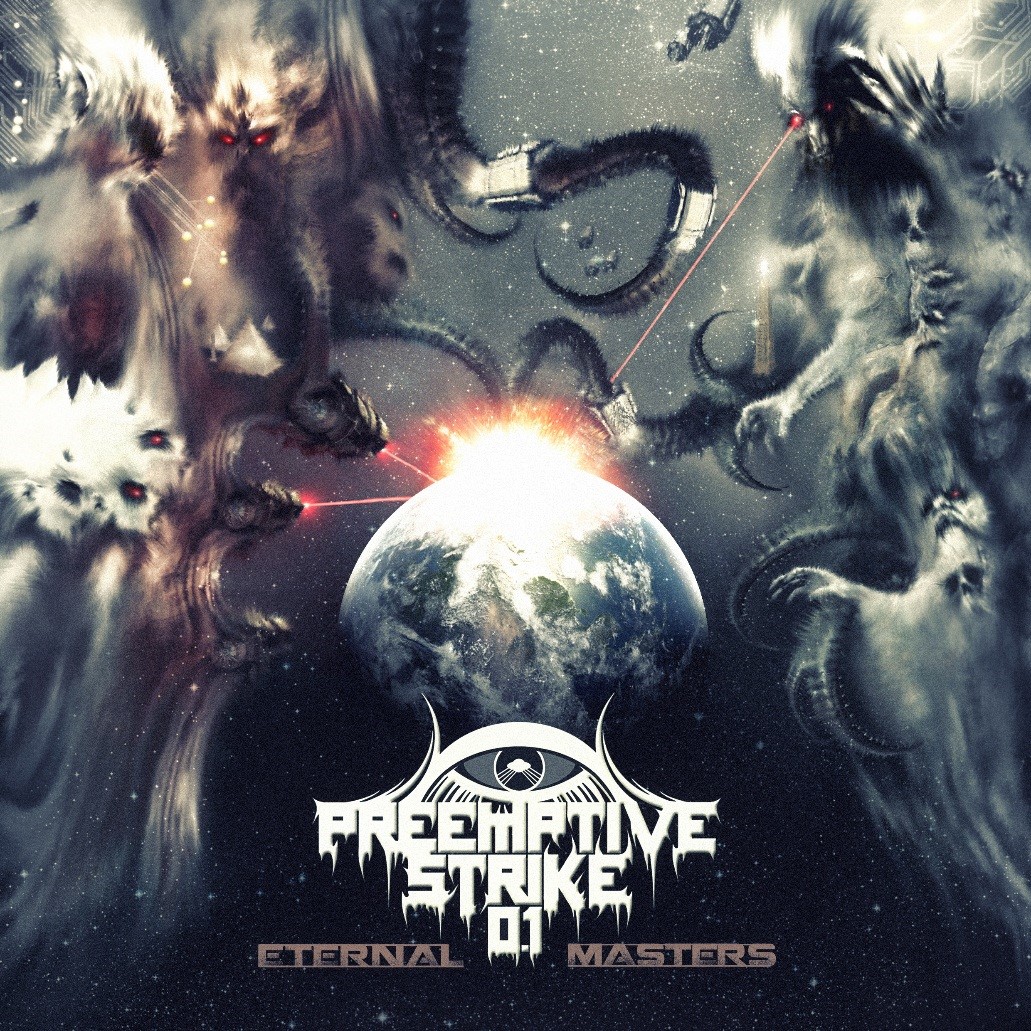
Planet eradicated. The cover artwork for PES0.1's latest release.
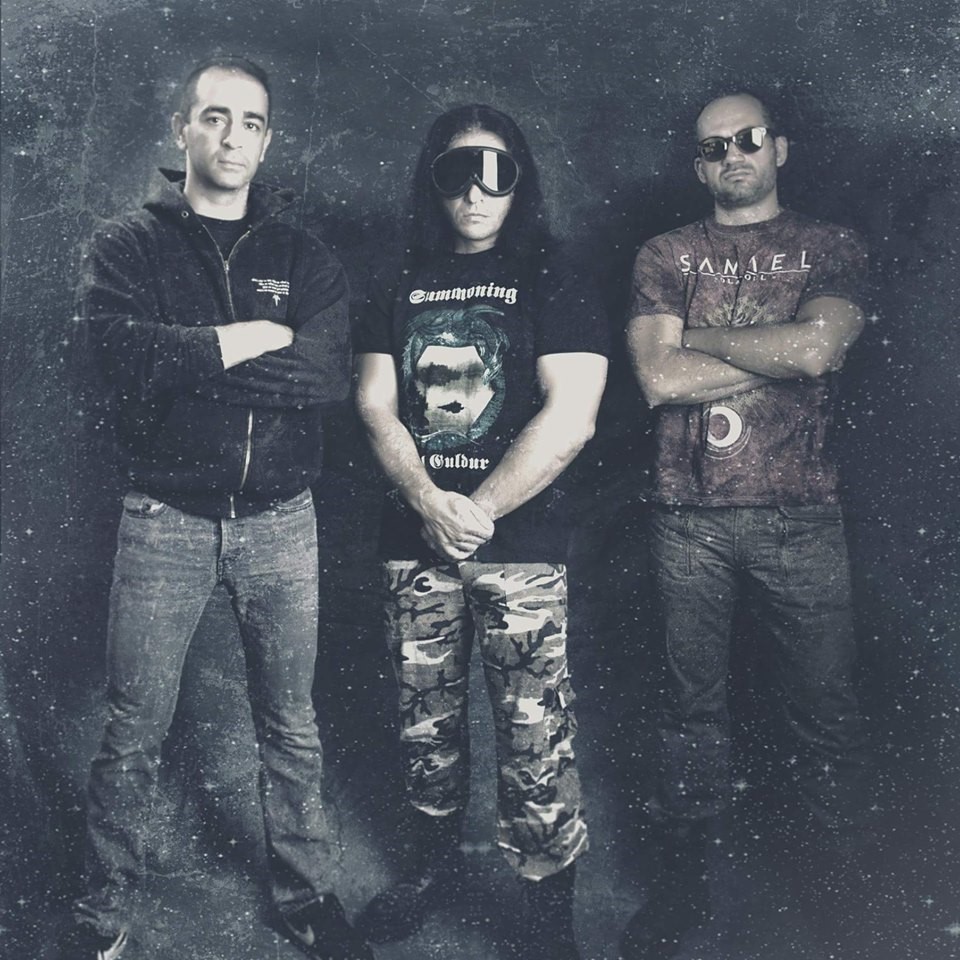
Music for real men, not for sissies.
היכונו לבוא אדוני הנצח
היכונו לביאת אדוני הנצח
רְשִׁימ֥וֹת־תֹּ֖הוּ | חלק א - ראיון עם Preemptive Strike 0.1
מאת: נועה ארצי
22-11-16
Preemptive מה?
את Preemptive Strike 0.1 (להלן PES0.1) ניתן למנות בקלת בין 10 התגליות המוזיקליות הטובות ביותר שהיו לי בשנת 2015. על אף שבמקור הם אינם מגיעים ממחוזותיה האפלים של הבלאק מטאל, אשר כפי שרבים מכם כבר יודעים, הפכו למרחב מחייתי הטבעי והנוח, אי אפשר להתכחש לקשר שבין PES לבלאק מטאל, כפי שניתן גם לשמוע בהוצאתם האחרונה העונה לשם Eternal Masters (אדוני הנצח).
למעשה המפגש הראשון והגורלי שלי עם ההרכב הזה התרחש בעקבות חיפושיי המוזיקליים האינסופיים בנבכי תת הז'אנר האפל והמדהים הזה. זה החל בחיפושיי אחר פרויקטים נוספים בהם השתתפו חברי להקת Ad Hominem – עוד תגלית מוזיקלית נוספת ומדהימה לא פחות מאותה השנה.
במקריות מוחלטת נתקלתי בפרויקט ההוא ששמו Punishment Systems. אחרי שהמוזיקה שלהם העיפה אותי לגמרי, החלטתי לברר מיהם המוחות המעוותים שמאחורי הדבר הזה רק כדי לגלות שחבר הצוות השני הוא בחור העונה לשם Jim The Blaster שמגיע מהרכב בשם Preemptive Strike 0.1 שבכלל מנגנת EBM. עד כה זה לא נשמע לי כל כך מזמין אבל הייתי די משועממת אז החלטתי לחפש אותם בגוגל.
הדבר הראשון שהקלקתי עליו פשוט שמט את הלסת שלי לרצפה.
זה היה קליפ לשיר בשם The Death of Talos, אשר נלקח מאלבומם האחרון דאז, Epos V. הבזקים ממה שנראה כמו מקטעים מואצים מסרט מדע בדיוני ישן נארגו בין סצנות בהן נראית הלהקה מנגנת בנוף של חורבות עתיקות. אבל מה שבאמת לכד את העיניים ואת האוזניים שלי בכל זה הייתה המוזיקה ונוכחות הבמה החזקה של שלושת חברי הלהקה.
המוזיקה לא נשמעה כמו אף EBM מודרני שיצא לי לשמוע בעבר. היה להם סאונד עוצמתי, אגרסיבי, וגברי אך באותו הזמן גם מאוד מלודי, קליט ולעתים אף אפי. הסגנון שלהם היה מתוחכם, מורכב ומעניין בהשוואה לכל דבר שלהקות אחרות בז'אנר החלו לעשות אחר כל ההתפתחות הטכנולוגית שאפשרה כמעט לכל אחד להפיק מוזיקה אלקטרונית על המחשב הביתי. אולי כל זאת הודות לכך שהלהקה כבר פועלת לא מעט זמן ושיש לה את הניסיון בהפקת מוזיקה תוך שימוש בחומרה מגוונת ולא רק במחשב. השירה הייתה צורמנית, אגרסיבית ועצבנית, ויכלה בקלות גם למצוא את עצמה באלבום בלאק או דארק מטאל. המקצב המכה בכבדות תובל בריפים שנוגנו על כלי נגינה יווניים מסורתיים אשר באו והלכו כמשבי בריזה ים תיכונית בין החורבות.
הפן הוויזואלי שליווה את הצלילים הללו גם הוא היה שובה לבבות לא פחות מהצלילים עצמם. הסולן, בחור בגובה ממוצע אך שרירי עד אימה, שלגופו מדי צבא ומשקפי מגן, כבש את הבמה והטיל את מוראו על המאזין בזעקות המלוות בנפנופי אגרופים, ניתוץ חפצים אקראיים ותיפוף על חביות נפט ריקות. שני חברי הלהקה האחרים גיבו אותו בנוכחותם האינטנסיבית לא פחות, בנגינתם על זוג מקלדות אשר נקטעה לפרקים לטובת עלייתם לקדמת הבמה בכדי לשפוך את מנת זעקותיהם אל עבר המאזין.
כשנתקלתי לראשונה בלהקה, ציפיתי לשמוע EBM די תפל, צפוי ולא מעניין, אשר מפצה בהופעת במה ובפירוטכניקה מצועצעת את אשר הוא לוקה בכישרון מוזיקלי. אבל כפי שבוודאי כולכם יודעים, ציפיות לעתים נוטות שלא להתגשם, לטובה ולרעה, ואני שמחה שהפעם התבדיתי.
יהיה מיותר לאומר שמיד התחלתי לעקוב אחר הלהקה במדיה החברתית, אך רק כדי לגלות שהלהקה מתכננת לקחת הפסקה למשך פרק זמן בלתי מוגדר. למזלי תכניות אלו לא הוצאו לפועל והלהקה החלה לדבר על תכניותיה לצאת לטור במספר מדינות וביניהן גם ישראל. בלהיטותי לשתף את הקהל המקומי בתגלית המוזיקלית החדשה, יצרתי קשר עם הלהקה וקישרתי בינם לבין כמה מפיקים מקומיים. אך בהיעדר חברת הפקה פעילה המתמחה בז'אנר ולאור עובדה שבסיס המעריצים המקומי של הלהקה היה כל כך מצומצם תכניתנו זו לא יצאה אל הפועל. אבל מי יודע, אולי כתבה זו תצליח ליצור מידה מספקת של עניין?
השנה היא שנת 2016 הלא כל כך רחוקה, ואני כבר הספקתי לדגום כמעט את כל הדיסקוגרפיה של הלהקה ולהגיע למסקנה ש-Kosmokrator הוא אחד האלבומים היותר טובים שהלהקה הוציאה. 2016 גם הייתה השנה שהתחלתי לכתוב ברשימות תהו, אז כשגיליתי שהלהקה עומדת להוציא מיני אלבום בעל אוריינטציה מטאלית ושאותו האלבום יכלול שיתוף פעולה עם Iperyt, להקת האינדסטריאל בלאק מטאל הידועה לשמצה מפולין, לא היה אדם מאושר ונרגש ממני לאור ההזדמנות לדגום את הוצאתם האחרונה ולשתף את שאר העולם בהרהוריי אודות תגליתי המוזיקלית.
יצרתי שנית קשר עם הלהקה וביקשתי שיישלחו לי עותק פרומו, רק כדי לגלות שבאותו הזמן הפרומואים עוד לא יצאו. בינתיים סיכמנו בינינו לערוך את הריאיון הזה, כדי שהקהל המקומי גם יוכל לזכות במבוא קצר למוזיקה של PES0.1. השתמשתי בהזדמנות פז זו בכדי לשאול אותם את כל מה שאי פעם רציתי לדעת על הלהקה, וקיבלתי כמה סיפורים מעניינים מאחורי הקלעים אשר בתקווה יעוררו קצת עניין מקומי במוזיקה שלהם. אז ללא עיכובים נוספים, אתן ל-Jim ו-George מלהקת PES0.1 לדבר.
אלקטרוניקה אפית ומטאלית
1. שלום חברים, האם תוכלו בבקשה לתאר את המוזיקה של PES מנקודת מבטכם עבור הקהל המקומי שאינו מכיר אתכם?
George: הקמנו את PES ב-2003 כפרויקט צד של להקה אחרת בשם Transmitted Terrorpulse עמה היינו באותו הזמן מעורבים. הלהקה ההיא ניגנה אינדסטריאל עתיר גיטרות ולכן תכלית PES0.1 הייתה לנגן מוזיקה אלקטרונית טהורה. באותם הימים תיארתי את המוזיקה של הלהקה כ-Dark Electro. עם הזמן התחלנו להוסיף אלמנטים מז'אנרים אלקטרוניים אחרים וצלילים מזרחיים. הדבר בולט ממש ב-2 האלבומים האחרונים שלנו – T.A.L.O.S ו-Epos V אשר גם מתמקדים בעיקר בנושאים מהמיתולוגיה היוונית. באותה התקופה יצרנו גם כמה רצועות בעלות השפעה מטאלית ובסופו של דבר שחררנו שני EP בסגנון אינדסטריאל מטאל, את Pierce Their Husk ולאחרונה גם את Eternal Masters הכולל שיתופי פעולה עם להקות שונות מסצנת המטאל. אז למען האמת אינני יכול להגדיר באופן ברור את המוזיקה שלנו כמכלול מאחר והיא ערבוביה אמתית של המון ז'אנרים וסגנונות.
2. האם יש לכם רקע בז'אנרים מוזיקליים אחרים? אם כן, כיצד הגעתם לכל אותם ז'אנרים אלו?
George: כפי שכבר אמרתי לשנינו במקור היה רקע במטאל לפני שהתחלנו לעסוק באינדסטריאל ובאלקטרוניקה. אנחנו עדיין אוהבים מטאל, מה שיוצר את ניגוד הסגנונות בחומרים שלנו.
JIM: כפי ש-George אמר, יש לי רקע במטאל ועד 1993 הייתי מתופף בהמון להקות מטאל. ואז נכנסתי לאינזסטריאל ומשנת 1995 ועד 2011 הקשבתי רק לזה (ומאז גם לא ניגנתי בתופים אמתיים). אבל אז חזרתי למטאל בערך בתחילת 2011. כיום אני מקשיב ל-65% אינדסטריאל ו-35% מטאל על פי אוסף התקליטים והתקליטורים שלי.
3. מה גרם לכם להתחיל להאזין ולרצות להפוך ליוצרים בתחום האלקטרוניקה האפלה ומדוע?
George: אני הפכתי לחובב הז'אנר אחרי שהמוזיקה של כמה להקות בעלות השפעות אינדסטריאל כמו Fear Factory עוררו את סקרנותי. אני מניח שהאלבום ש-"המיר" את העדפותי המוזיקליות היה Millenium של Front Line Assembly. התחלתי ליצור מוזיקה בסגנון הזה אחרי ש-Jim בא אליי יום אחד ושאל אותי, "רוצה להקים להקה?". פשוט ככה!
JIM: האלבום הראשון בעל השפעות האינדסטריאל שנפל לידיי היה MINISTRY: ΚΕΦΑΛΗΞΘ שהשגתי אי שם ב-1992 אבל מה שגרם לי להתחבר לסאונד הזה היה כשהקשבתי ל- Millenium של Front Line Assembly ב-1994. כפי שכבר הזדמן לי לאומר כמה פעמים, אני מאמין שהאלבום הזה לא הוקלט בידי בני אדם אלא בידי חייזרים! זה מדהים איך שהצליחו ליצור את האלבום הזה עם הטכנולוגיה של 1993/1994! אבל התקליט ששכנע אותי סופית שאינדסטריאל זאת המוזיקה הכי כבדה, צורמנית וחולנית בעולם היה Death on Installment Plan של Numb לו נחשפתי בקיץ 1994 (הערת עורך: זהו אכן אלבום מפחיד. תקשיבו לשיר Shithammer ותבינו...). מאותו היום נשבעתי שאינדסטריאל זאת המוזיקה היחידה שאני רוצה לשמוע! עמדתי במילותיי עד 2011. מה שאומר שלעולם אין לאומר "לעולם לא"...!
4. כאחת שאומנם יוצרת בז'אנר קצת שונה, תמיד עניין אותי התהלך בו אתם יוצרים את המוזיקה שלכם. מהו תהליך כתיבה והקלטת שיר של PES?
George: ברוב המקרים אני מתחיל עם רעיון פשוט למלודיה ומשם אני ממשיך לפתח ולבנות מסביב. הלוואי והיה לי איזשהו סוד גדול שיכולתי לחשוף בנוגע לתהליך אבל זה באמת פשוט ככה. אז אני מגבש גרסה בסיסית של שיר ואז החבר'ה האחרים עובדים עליו ומוסיפים עליו את החלקים שלהם ובסופו של דבר הוא חוזר אלי לצורך גימור. לפעמים זה גם קורה בצורה הפוכה. לפעמים אחד החברים האחרים מתחיל שיר חדש ואנחנו מקפיצים אותו קדימה אחורה בינינו עד שהשיר מגיע לגרסה מוגמרת.
5. איזו אווירה הייתם רוצים להעביר למאזין עם המוזיקה שלכם? מה הייתם רוצים שהוא ירגיש כשהוא מקשיב לכם?
George: ז'אנר המוזיקה האהוב עלי הוא דת' מטאל מלודי אז אני מנסה להעביר את אותן התחושות שעולות בי כשאני מקשיב לשירים ולאלבומים האהובים עלי. הייתי רוצה שהשירים שלי יעבירו תחושה אפלה, מלודית, עוצמתית אך באותו הזמן גם מרוממת במובן מסוים – זה בגדול מה שאני מנסה להשיג.
JIM: להיפך, הייתי רוצה להוסיף פן אפי לשירים שאני תורם להם וזה ברור מהאלבום Epos V, שהוא האלבום שתרמתי לו במאה אחוז ושאותו תכננתי מלכתחילה שיישמע אפי!
6. אחד הדברים שעוררו בי עניין במוזיקה של PES הוא הקליפ שצילמתם לשיר The Death of Talos. האם אתם מתכננים לצלם קליפ נוסף לחומר מ-Eternal Masters? האם יש לכם סיפורים מעניינים מתהליך צילום הקליפ?
JIM: לא, זה יהיה בלתי אפשרי לצלם קליפ מהחומרים של האלבום הזה מאחר וחברי להקות המטאל שתרמו את חלקם חיים במדינות שמאוד רחוקות מיוון. אבל תהיי בטוחה שאנחנו נצלם אחד לחומרים הבאים שלנו. ובוודאי שיש לי כמה סיפורים מעניינים מתהליך צילום הקליפ ל-The Death of Talos. קודם כל, האם את יודעת שהחוף שעליו צילמנו את חלק מהסצנות הוא אותו החוף מהמיתוס של הארגונאוטים שהגיעו לכרתים והרגו את ענק הברונזה טאלוס?!!! החוף נמצא במרחק 80 ק"מ מהבסיס שלנו ליד העיר בה Yiannis Dseq (הערת עורך: חבר הלהקה השלישי שלא השתתף בראיון) מתגורר ובמרחק 5 ק"מ מהמפעל (Yiannis הוא בעל המפעל ולכן הוא למעשה סוג של "אינדסטריאליסט"!!) בו ביצענו את רוב הצילומים. אז נסענו למקום הזה ב-12/8/2014 כשבחוץ היה חום של 35 מעלות צלזיוס ואני באופן אישי עברתי אימון כושר מאוד קשה מוקדם באותו הבוקר בעיר שלי כדי שאראה שרירי וחטוב לקראת הצילומים (בשילוב עם דיאטה קשה ללא פחמימות). אז 10 דקות אחרי שיצאנו התחלתי לסבול מהיפוגליקמיה והייתי חייב למצוא לי משהו מתוק עם פחמימות לאכול! בנוסף החום הכבד התיש אותנו ואם תסתכלי מקרוב אז אפשר לראות את זה על הפנים שלנו! ואחרון חביב, כל האזור היה מלא בחתולים (מעל 30!) שטיילו להם מסביב והבמאי שלנו היה צריך למחוק אותם מהתמונה אחר כך בעריכה!
7. האם לדעתכם קליפים הם עדיין דבר חשוב בימינו? אם כן, מדוע?
George: בתיאוריה קליפים הם דרך מצוינת לקדם שיר חזק או אלבום, בעיקר כשהם מצליחים ללכוד את מהות השיר בפורמט ויזואלי. אף על פי כן, מאוד יקר להפיק אותם ומאוד קשה להעריך עד כמה הם יצליחו לתת תוצאות שיבואו לידי ביטוי בעלייה במכירות האלבום. באופן אישי אני לא כל כך מתלהב מקליפים אבל לאור הסיפור שלך על איך שהקליפ ל-Death of Talos הגיע אלייך והצית בך עניין, אני מניח שזה עושה את העבודה!
8. מה הקטע של משקפי המגן הענקיות שג'ים מרכיב בהופעות? האם יש איזשהו סיפור מאחורי אלו? איפה בכלל השגתם אותם?
JIM: ובכן מאז הקמת הלהקה לא רציתי להראות לקהל את כל הפרצוף שלי ולא רציתי שיזהו אותי בקלות. אז הייתי מרכיב משקפי שמש, כובעים מצחיקים, מסיכות מגן ואפילו מסיכה של חייזר שאתם תראו בצילומים החדשים שלנו! משקפי המגן הללו הן הפריט האהוב עליי והם חלק מסימני ההיכר שלי בסצנה. אלו זוג משקפי מגן צבאיות מקוריות שחיילים מרכיבים במבצעים שנערכים בשטח מדברי. השגתי אותם מחנות שמוכרת ציוד צבאי.
9. ואם כבר מדברים על תלבושת במה, אחד הדברים שאני אוהבת אצלכם זה שאתם שומרים על הופעה די פשוטה בהשוואה ללהקות EBM מודרניות אחרות. האם הדבר נעשה במחשבה תחילה בכוונה לתת קודם כל למוזיקה לדבר?
George: אני לא מאמין ביצירת "פרסונת במה". אני פשוט בחור שאוהב ליצור את המוזיקה הזאת אז זה הדבר שאני משקיע בו את מירב האנרגיה, ולא ביצירת איזושהי תדמית לעצמי. מה שאת רואה זה גם מה שאת מקבלת. אני לא נגד כל הקטע הזה בעיקר אם זה עובד בהקשר המוזיקלי אבל זה פשוט לא בשבילי.
JIM: הייתי אומר שהתדמית שלי בסצנה היא של מישהו בעל חזות צבאית ועצבנית אבל אני מתלבש בסצנה בצורה די קרובה לאופן בו אני מתלבש בחיי היום יום שלי. אני תמיד לובש חולצות של להקות. מה שאני לא אוהב זה שלהקות בסצנה הולכות על לוק "אנדרוגיני" בהופעות החיות שלהם. זה מאוד רחוק מהטעם ומהיחס שלי כלפי המוזיקה הזאת. בזמנו בשנות ה-90 למדתי שדארק אלקטרו/אינדסטריאל היא מוזיקה לגברי אמתיים ולא לנקבות!!
10. בקיץ 2015 כמעט ועשיתם הפסקה בפעילות הלהקה, אך למזלנו החלטתם לחדש את פעילותכם. הדבר מצביע על כך שיש בכם כוח מניע מאוד חזק שעוזר לכם להתגבר על כל המכשולים ולהמשיך לפעול כמוזיקאים. מהו אותו הדבר שגורם לכם לרצות להמשיך?
George: ובכן זה לא סוד שלקחתי לעצמי סוג של הפסקה. 2013 ו-2014 היו שנים די קשות עבורי באופן אישי אז לא היה בי את הכוח הדרוש בכדי להמשיך בקצב יציב. במשך חודשים רבים לא עבדתי על מוזיקה חדשה. עדיין עזרתי לאחרים לכתוב כמה שירים וגם עזרתי לחבר שלי פרדריק עם Cynical Existance אבל המעורבות שלי הייתה באמת מינימלית, במיוחד ב-Epos V. אחרי ש-Epos יצא הייתי צריך להחליט אם אני מוותר סופית או לא. בסופו של דבר החלטתי שעדיין יש מוזיקה שהייתי רוצה ליצור. אני מניח שזה הרגל שקשה להיגמל ממנו! גם עכשיו לאחר שסיימנו את האלבום החדש עדיין יש לי כמה רעיונות לשירים חדשים. החלטתי שאם אי פעם אצטרך להפסיק אז זה יהיה בגלל שלא אוכל עוד ליצור שום דבר חדש ולא בגלל נסיבות חיצוניות.
JIM: הרגשתי ממש רע מסיבות שונות לחלוטין מאלו ש-George הזכיר. ציפיתי לקצור הצלחה הרבה יותר גדולה עם Epos V מאחר וזה היה "האלבום שלי" ו-"הילד שלי". בעיקר עם גרסת הכיסוי שעשינו ל-Coat of Arms של Sabaton (שאגב, נשמעת הרבה יותר טוב מהשיר המקורי – הערת עורך). ההצלחה לה ציפיתי מעולם לא הגיעה ואני חושב שזה קרה בגלל שהלייבל שלנו קידם אותנו בצורה גרועה ובגלל המצב הכלכלי האיום ששרר ביוון ביולי 2015. איך יכול היה הקהל הגרמני להאזין ולרקוד לצלילי השירים שלנו ולדי-ג'יי-ים המקומיים לנגן אותם ולדרג אותם במצעדים כשבני ארצי האשימו את גרמניה במשבר הכלכלי שלנו? ואז אני חשבתי לעצמי שעשיתי את הטוב ביותר כדי לתת למעריצים שלנו משהו שונה לגמרי, משהו שנעשה לראשונה במסגרת הז'אנר שלנו אך בכל זאת לא הרווחנו מזה דבר. האם נוכל להציע להם יותר מזה? בסוף יולי החלטתי להפסיק את פעילויותיי. אך לאחר כמה שיחות רציניות עם George והמוטיבציה שקיבלתי מאשתי, חבריי וממעריצים אנונימיים החלטנו שנינו ב-3 לאוגוסט לחדש את פעילות הלהקה, הפעם בלי האלמנטים היווניים המסורתיים והמיתולוגיים בכוונה לחזור בחזרה אל שורשינו המוזיקליים...
הערת עורך: לו הייתם יודעים עד כמה שהאלבום Epos V הצית בי עניין לא הייתם חושבים לרגע להפסיק...
אדוני הנצח
1. JIM, תמיד ידעתי שרצית לעשות מטאל ושעשית כמה שיתופי פעולה בעיקר עם אומני בלאק מטאל, אבל מה גרם לך בסופו של דבר לעבור לעשות מטאל עם PES0.1?
JIM: הרשי לי לא להסכים עם דברייך מאחר ומה שקרה היה בדיוק ההיפך ממה שתיארת. בזמנו כשהקמנו את PES0.1 (ב-2002), מערכת היחסים שלי עם המטאל הייתה ממש לא טובה. הקשבתי רק ל-4 או 5 להקות מטאל. ואז אחרי 9-10 שנים חזרתי למטאל והקמתי את Punishment Systems ביחד עם Kaiser מלהקת Ad Hominem ויצרתי גם מיני אלבום שכולו רימיקסים של שירי Ad Hominem (הערת עורך: שבאופן מפתיע עובדים בצורה מדהימה!). זה היה רק עניין של זמן. אני אוהב לחקור טריטוריות חדשות ולא לדבוק בז'אנר אחד. אי אפשר לדעת מה יהיה הצעד הבא שלנו. ייתכן שנכתוב אלבום שכולו דארק אלקטרו ואז נחזור לעשות שיתופי פעולה עם להקות מטאל...זה מאוד תלוי מה אני ארגיש באותו הרגע וזה רק עניין של זמן עד שנדע...
2. ואם כבר מדברים על זה, מכל תתי הז'אנר שבמטאל, מהו אותו הדבר שכל כך מושך אתכם בבלאק מטאל אשר גורם לכם לרצות לשתף פעולה עם אומנים מהז'אנר וליצור במסגרת הז'אנר?
JIM: זה לא רק קורה עם להקות בלאק מטאל אלא גם עם להקות דת' מטאל. אם נוסיף לכל זה את הדארק מטאל, אז נקבל 3 ז'אנרים ש-10 אחוז מקהל המאזינים להם והלהקות עצמן אוהבים מוזיקה אלקטרונית או שלפחות לא נרתעים מניסויים מהסוג הזה. מעולם לא הייתי מבקש לשתף פעולה עם אומני Power/Epic Metal, מטאל קלאסי, ת'ראש מטאל ודומיו...אני יודע שהם מאוד שמרנים ורואים את כל זה כמוזיקת טכנו גרועה. עשיתי מספר מאמצים לא מוצלחים לפנות ללהקות ויקינג בלאק מטאל מאחר ואני אוהב את סוג המוזיקה הזה למרות שידעתי שהיה סיכוי מאוד קלוש שהם ייענו לבקשתי. לסיכום, הייתי רוצה ליידע את כל הקוראים שאני שונא כל דבר שנשמע כמו "רוק" כמו רוק קלאסי/occult rock, רוק מתקדם, סטונר, פוסט רוק, סלאדג' וגם כל מה שנשמע כמו מוזיקת "קור" כמו Death/Metal/Math Core כך שזו מערכת היחסים שלי עם המטאל.
3. מדוע בחרתם לשתף פעולה דווקא עם להקות אלו באלבום Eternal Masters? האם אלו להקות שאתם מאזינים להן באופן קבוע?
JIM: חיפשתי במשך חודשים עד שמצאתי את הלהקות האלו. הייתי קרוב לעבוד עם שמות גדולים יותר או ללהקות שנמנות בין האהובות עלי כמו Red Harvest, Raubiter, Diabolicum אבל לאחר כמה צירופי מקרים ואי הבנות, הדבר בסופו של דבר לא יצא לפועל. אבל בסופו של דבר הצלחתי לעבוד עם 6 הלהקות הללו. יש לי דיסקים ותקליטים מקוריים של כל הלהקות האלו אז כן, אני מקשיב לכולן גם אם הן לא נמנות בין האהובות ביותר עלי.
4. כיצד עבדתם על השירים האלו ביחד עם כל הלהקות הללנו מחו"ל וכיצד בכלל יצרתם קשר עם כל האנשים האלו?
JIM: באשר לתהליך ההקלטה רק יצא לי לפגוש באופן אישי את Tuomas Saukkonen מ-Wolfheart ורק אתו דיברתי פנים מול פנים על שיתוף הפעולה. אני חושב שהוא נענה לבקשתי לא בגלל הטעם שלו במוזיקה אלקטרונית אלא בעיקר לאור העובדה ששנינו מאוד מתעניינים בפיתוח גוף. בנוסף לכך הכרתי בחור שמנגן ב-Borgne מאחר ולשנינו יש פרויקטים (לי יש את Punishment Systems) שחתומים ב-Those Opposed Records. על Iperyt המליץ לי מנכ"ל הלייבל Odium/Sonic Hell. אחרי ש-George ואני כתבנו את המבנה הבסיסי של כל שיר, שלחתי הוראות מפורטות לכל השותפים עם הוראות היכן להוסיף את השירה ואת הגיטרות או הסינתיסייזרים. Iperyt היו היחידים שנתנו להם יד חופשית ואתם אולי תבינו למה כשתשמעו את התוצאות! ואז אחרי שכולם שלחו אלינו את חלקם בהקלטה אנחנו שיפרנו את השירים ולבסוף המפיק שלנו עבד עליהם ונתן לנו את התוצאה המדהימה הזאת!
5. מהן הרשמים האישיים שלכם מעבודתכם אם אומנים אלו? האם הייתם רוצים לשתף איתם שוב פעולה?
JIM: התרשמתי לטובה מכולם גם אם הייתי חייב לדחוף אותם כדי שיסיימו את חלקם. שיתוף הפעולה שהלך הכי חלק וזריז היה זה שעשינו עם Eibon La Furies וזה שהלך הכי לאט ושהיה הכי קשה היה זה שעשינו עם Wolfheart מאחר והם האומנים הכי מפורסמים והכי עסוקים מבין כולם. באשר לשיתוף פעולה חוזר, ברור, למה לא? למרות שזה יהיה יותר טוב לנסות שותפים חדשים.
6. באילו נושאים עוסקים השירים ב-Eternal Masters? האם יש איזשהו מסר שהייתם רוצים להעביר בשירים אלו?
JIM: איננו רוצים להעביר שום מסר פרט לאהבתנו לסרטי מדע בדיוני. אז הסיפור שמאחורי Eternal Masters לקוח מהסרט Masters of The Universe, Merciless Tyrant מתייחס לדמות מסדרת סרטי Flash Gordon (הרודן הוא הקיסר מינג) ו-Planet Eradicated מתייחס לסרט הקאלט מ-1953, The Magnetic Monster.
7. מהם מקורות ההשראה למוזיקה ולמילים של Eternal Masters?
JIM: בנוגע למילים כבר נתתי את תשובתי והשתמשנו בסמפלים מסרטים שהזכרתי. באשר למוזיקה בוודאי שחשבנו על סצנות מהסרטים הללו כשכתבנו את המוזיקה. במקרה שלי זה היה ככה במיוחד כשהקלטתי את השירה ל-Merciless Tyrant. היה לי בראש את הפרצוף המורבידי של הקיסר מינג כשהוא צוחק בעודו עומד להשמיד את האנושות..!
8. האם אתם מתכננים לנגן את השירים הללו בהופעות? אם כן, כל הפורמט של ההופעה יהיה יותר כמו הופעת מטאל. מה דעתכם לעשות דבר כזה? האם זה משהו שתמיד רציתם לעשות?
George: למרות שהיינו מאוד רוצים לנגן את השירים האלו בהופעה חיה, אבל באמת חיה, זה יהיה מאוד קשה מבחינה לוגיסטית. אנחנו צריכים להשיג גיטריסט מעולה ומתופף על מנת שנוכל לעשות זאת וזה יעלה את מחיר ההופעה באופן משמעותי. למען האמת, נכון לעכשיו אני לא רואה את זה קורה.
JIM: אנחנו יכולים לנגן את השירים הללו בנוסף לשירים מ-Pierce Their Husk בליווי ההקלטה של הגיטרות אבל האם את חושבת שדבר כזה אי פעם יעבוד טוב עם קהל של מטאל?
9. לאחרונה עברתם ללייבל חדש בעקבות שינוי הסגנון באלבום האחרון. האם זה אומר שהאלבומים הבאים גם הם יהיו יותר בכיוון של אינדסטריאל מטאל?
George: Infacted recordings, שהוא הלייבל בו היינו הוא לייבל העוסק בעיקר באלקטרו ובסינתפופ. הייתה תקופה בה היו שם גם מספר להקות עם סאונד קצת יותר כבד אבל כיום הם בעיקר מתמקדים בסאונד מהסוג הזה. עם הזמן הסאונד שלנו נהייה כבד יותר ויותר ולכן זאת הייתה החלטה שקיבלנו נטו מהסיבה הזאת. יותר הגיוני להיות בלייבל שמקדם את הסאונד הספציפי הזה אז עברנו להיות ב-DWA שהמנכ"ל שלו ג'יימי הוא גם ככה חבר שלי מזה כמה שנים. באשר למה שייקרה בעתיד...אינני פוסל אף אפשרות אבל מצד שני אינני גם מאשר שום דבר...
וחוץ מ-PES0.1?
1. מהם חמשת אלבומי האינדסטריאל בלאק מטאל האהובים עליכם ומדוע?
George: באופן אישי אני ממש גרוע בלערוך רשימות. אני יכול לתת לך את אלבומי המטאל האהובים עלי מהשנים האחרונות? אלו אינם אלבומי אינדסטריאל בלאק מטאל אבל אני בטוח ש-JIM יידע לענות לך על השאלה כמו שצריך. בכל מקרה, הנה רשימת האלבומים שלי שאינם מסודרים לפי סדר מסוים. Insomnium – Shadows Of The Dying Sun, At The Gates – At War With Reality, Behemoth – The Satanist, Sulphur Aeon – Gateway To The Antisphere, Amorphis – Under The Red Cloud, Vektor – Terminal Redux ו-Be’lakor – Vessels. וגם יש פה יותר מחמישה...אמרתי לך שאני גרוע בזה!
JIM: אינני יכול לאומר לך מהם חמשת אלבומי האינדסטריאל בלאק מטאל האהובים עלי מאחר והז'אנר מגביל אותי, אבל אני יכול לתת לך רשימה של חמשת אלבומי האינדסטריאל בלאק הסימפוני/דת' האהובים עלי. אז ככה:
I) SAMAEL: SOLAR SOUL
II) RAUBTIER: BESTIA BOREALIS
III) THE BROWNING: ISOLATION
IV) RED HARVEST: INTERNAL PUNISHMENT SYSTEMS
V) FEAR FACTORY: MECHANIZED
האלבום של Samael הוא אלבום המטאל הכי טוב ששמעתי במשך כל ימי חיי! ובנוגע לאחרים, אני לא מאמין עד כמה שהם נשמעים מכניים ולא אנושיים. אם עלי לאומר לך את אלבום האינדסטריאל בלאק הטהור האהוב עלי אז אומר שזהו Planet Satan של Mysticum.
2. האם יש לכם פרוייקטי-צד ושיתופי פעולה פעילים מחוץ ל-PES0.1?
George: הזכרתי קודם שאני מעורב ב-Cynical Existence. אנחנו גם כמעט וסיימנו לעבוד על אלבום מלא (אשר שמו "The Dying Light") שנמצא כרגע בשלב ההפקה/מאסטרינג הסופי. גם שם אנחנו עושים אלקטרו המשולב עם מטאל אבל בצורה ממש שונה ממה שעשיתי עם PES0.1. אנחנו יוצרים שם חומר פחות כבד, יותר מלודי ומיד טמפו. אם זה מעניין אתכם תקשיבו לסינגל האחרון שלנו "Through My Eyes".
JIM: כן, יש לי את Punishment Systems אבל כרגע אנחנו בהפסקה, כפי שאפרט על כך בהמשך. מאוד התלהבתי מהפרויקט הזה וזאת הייתה הפעם הראשונה שהרווחתי מספיק ממכירת האלבום כדי לא רק לכסות את ההוצאות על ההקלטות...ל-Yiannis יש את Degenerated Sequences ועד כמה שידוע לי הוא מתכוון להמשיך את פעילות ההרכב.
3. אם כבר מדברים על פרוייקטי-צד של חברי להקת PES0.1, אני ממש אהבתי את החומר של Punishment Systems ו-Degenerated Sequences – עד כדי כך שהייתי רוצה לעשות ראיון נפרד על שני הפרויקטים הללו. האם צפוי לנו אלבום נוסף מבית היוצר של Punishment Systems? מה קורה עם האלבום האחרון של Degenerated Sequences?
JIM: אלבום נוסף של Punishment Systems? כדאי שתדברי על זה עם Kaiser מ-Ad Hominem! הייתי מת לעשות את זה אבל הוא הכותב העיקרי בפרויקט (גיטרה, באס ושירה) ואני פשוט עוקב אחריו עם התופים והאלקטרוניקה. אני חושב שהוא מאוד עסוק עם הפרויקט העיקרי שלו מאחר והוא קצר הצלחה מסחררת עם האלבום האחרון שלו Antitheist לאחר שעבר ללייבל גדול (Osmose Music).
בנוגע ל-Degenerated Sequences, Yannis בסופו של דבר מצא לעצמו לייבל (Advoxya) שדרכו הוא משחרר את החומרים שלו אבל אני חושב – ולא ברור לי גם למה – שהלייבל הזה דפק אותו. האלבום שלו זוכה לאפס קידום, בניגוד לשאר הלהקות שחתומות אצלם. הוא לא זוכה לשום ביקורות, ראיונות, כלום! (הערת עורך: זאת כנראה סיבה עוד יותר טובה לערוך ראיון נפרד על הפרויקט הזה...) למרות שאני חושב שהסגנון של Degenerated Sequences הוא מיוחד!
George: שאלתי את Yiannis בנוגע ל-Degenerated Sequences וזה מה שהוא אמר לי: "האלבום לא זכה לקידום רב. האלבום הוא בעל אופי אולדסקול-י ומעט הביקורות לו הוא זכה שיבחו אותו בזכות הסאונד שלו שמזכיר את הדארק אלקטרו האירופאי, שזה משהו שחסר בסצנה של ימינו"...
4. במה אתם נהנים לעסוק מלבד מוזיקה?
George: אני עוסק הרבה בספורט כשאני יכול, בעיקר כדורסל, טניס ואימונים בחדר כושר. אני גם מן הסתם נהנה להקשיב למוזיקה, לראות סרטים בקולנוע, לקרוא, לבשל וכמובן לבלות עם אשתי ועם הילדה שלי (שדרך אגב אומרת שהמוזיקה שלי "נחמדה אבל קצת רעשנית"!).
JIM: התחביבים שלי לא השתנו ב-20 השנה האחרונות גם אם כיום כבר הקמתי משפחה ואני מבלה איתם זמן רב. אני נהנה לעסוק בפיתוח גוף (עד כמה שאני מסוגל אחרי כל השנים הללו...) ובגלל זה זכיתי בכינוי Jim the Blaster, אני אוהב לשחק פוטבול אבל בעיקר לצפות במשחקים מאחר ואני פנאט של הקבוצה שאותה אני אוהד, אני אוהב לראות סרטים בקולנוע, אך יותר מכל אני אוהב לאסוף טונות של תקליטים ותקליטורים ולהקשיב למוזיקה.
תודה על שיתוף הפעולה. אני מקווה שלא נסחפתי קצת עם כמות השאלות שזרקתי לעברכם. כמישהי שמעריצה אתכם כבר לא מעט זמן, לא יכולתי שלא לקפוץ על ההזדמנות J
George: תודה רבה גם לך. זה היה ראיון כיפי!
ומה למדנו מכל זה, ילדים?
אז מוסר ההשכל מכל הסיפור הזה הוא שאם אתה מוזיקאי אז כדאי שתשתף פעולה, מאחר וזה בהחלט גורם למוזיקה שלך להתפשט כמו מגיפה. אה, וגם כדאי שתדאגו שהחומר הכי מטורף שלכם יקפוץ ראשון בגוגל. אחרת הפסדתם.
דרך אגב, כתבתי את רוב זה בזמן נסיעה ברכבת כשבאוזניות Extinction Reprogrammed, אחד האלבומים הראשונים של PES0.1 בווליום גבוה. הייתי רק עוד נוסע המקליד בקדחתנות על מסך הטלפון החכם, בעודי מנותקת לחלוטין מהמתרחש בעולם שסביבי ומרותקת למסך הקטן, שהוא עצמו מחובר באינפוזיה לרשת החשמל ברכבת. הטכנולוגיה המודרנית בהתגלמותה. מבקר שיגיע לכאן מחוץ לעולמנו עלול לחשוב שהמכונות כבר הספיקו להשתלט, ובהיעדר צורות חיים לכבוש ולשעבד, היה מפנה לאחור את רכב החלל שלו. אני תוהה מה היה לחבר'ה ב-PES לאומר על התיאוריה הזאת שלי, מאחר ולא הזדמן לי לשאול אותם על כך בראיון הזה, אבל זה בעיקר בגלל שזאת תיאוריה די מטופשת ולא רלוונטית שחשבתי עלייה ברגע זה.
אז עד הפעם הבאה, תפתחו את הראש אבל לא יותר מדי, ותיזהרו מחייזרים רעים, או מכונות, או מה שזה לא יהיה.
פיס,
*
נעה ארצי, אוקטובר 2016

העטיפה לאלבום האחרון של PES 0.1

מוזיקה לגברים אמתיים, לא לנקבות.
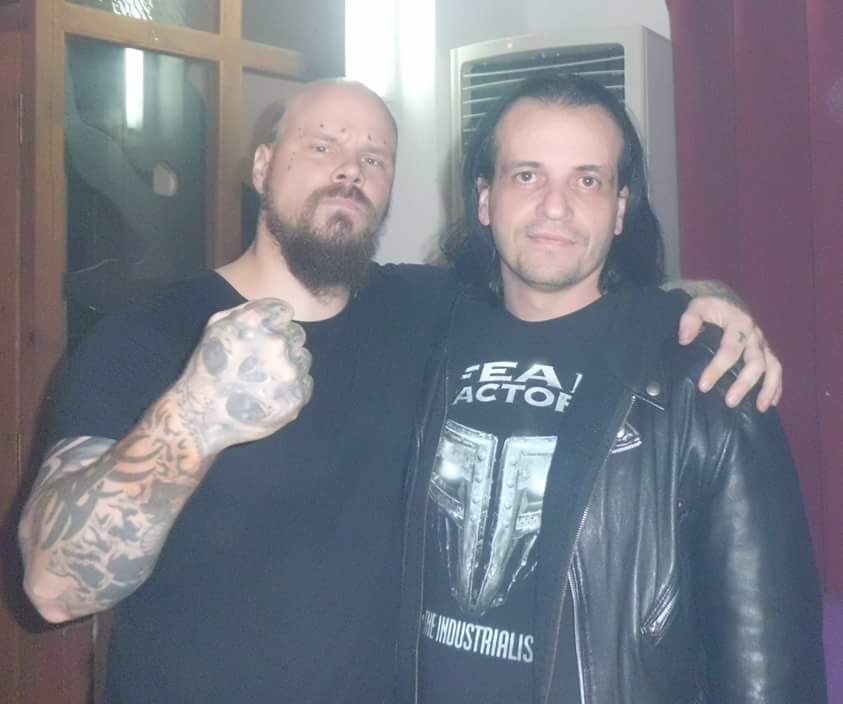
היוצרים Jim ו-Tuomas
אנסנזורד, אנקאט
אנסנזורד, אנקאט
רְשִׁימ֥וֹת־תֹּ֖הוּ | ראיון עם Strangeways
מאת: יוסף בן עוז
15-1-17
Uncensored, Uncut
בראשית נובמבר, בתום כמה סבבי האזנה ועיכול של היצירה המפתיעה והמיוחדת הזו – Rotting Under the La La Bombs, פגשתי את יוסי דרמון ואבי כספי: שני היוצרים (האנונימים לחלוטין עבורי עד בערך שבוע לפני המפגש הזה) העומדים מאחורי מה שהלך ונשמע לי כמו אחד האלבומים היותר מסקרנים שיצאו מישראל, בלי להגזים.
את הראיון קיימנו בלי גינוני טקס מיוחדים, על עוגה, קפה וסלט בבית קפה ירושלמי בלילה קריר על שולחן בחוץ עם רעש של אוטובוסים ומלל סועדים. אני זוכר שהגעתי לראיון מבסוט למדי, שכן הקילומטראז' שהספקתי כבר לגמוע מהאלבום הזה הותיר בי סקרנות נערית. זו עבודה מלאה ריפרורים (למי שטרם קרא – הנה ההתייחסות המלאה שלי פה בסקירה של האלבום) כולל לקטעים עבריים הן בשירה והן בסימפולים, וגם – מה שהכי מצא חן בעיני – האלבום עשיר במיוחד בניואנסים מפתיעים ולא סטנדרטיים בעליל שאתה צריך לעבוד קצת כדי לאתר אותם. ובכלל: עבודה מעיזה במיוחד. אז היו לי בכיס כ-10 שאלות מוכנות והראש היה מסודר. הרגשתי על הסוס. היוצרים נראו לי מסקרנים, האלבום פצצה, מה יכול אחד שכמוני לבקש יותר מזה?
אלא שהתברר לי שנכונו לי הפתעות.
"הפתעות" הפך לשם המשחק בכל מה שקשור לאלבום הפנדוראי הזה, שהקצף הלבן של הסקרנות שהוא מצליח לעורר למי שמקשיב לו יפה, הוא רק קצות הגלים. מתחת לגלים שוכנים זרמי מעמקים שלא הכרתי. הראיון חשף בפני היסטוריה ואמירות נוקבות לא מעטות: תחשות עזות כלפי הסצינה בישראל וכלפי הדלילות והבינוניות של חלק לא מבוטל של הסצינה בארץ לדעת היוצרים; גיליתי גם הפתעות בצד המוזיקלי: החל מהפוריות והיצירתיות החריגה של ההרכב וכלה בשיטת העבודה מהייחודיות שידעתי.
אבל בעיקר התרשמתי שיש כאן שתי נפשות מהמקוריות והמעניינות ששוחחתי עימן ב"סצינה" המקומית וגם יצאתי עם פליאה לא פתורה בלב על הפער המטריד הזה בין היכולות והאיכויות של הרכב כזה לבין ההד שנוצר לעבודה הזו. או שמא מוטב אם נאמר: העדר ההד והעדר התפוצה של העבודה הזו. מפליא? לא יודע. בעיקר מרתיח.
נסעתי הביתה בסוף השיחה, והרבה התרוצץ לי בלב. את הסקירה שכבר כתבתי לאלבום ההוא, עוד בטרם ראיינתי את היוצרים, הותרתי כמות שהיא אחרי התלבטות קלה. נדמה היה לי שהיא כיסתה את כל ההיבט המוזיקלי והחווייתי והיה לי חשוב לבוא נקי שם. לאחר מחשבה החלטתי שאת הראיון אני מעלה כמו שהוא, כאן, במלואו. כדי לתת מבט אחר על מוזיקה ועל יצירה, ועל מקוריות ועל הפער הזה בין המסחרי לבין הפחות מסחרי. לא כפצצת סירחון, אלא יותר כחומר למחשבה.
אהה וטיפ אחרון והמלצה: הראיון פה גדוש מידע ויש מלא קישורים בתוך הטקסט עצמו, אז תשימו לב.
אז הנה הראיון שלנו: "אנקאט, אנסנזורד."
*
הימים הראשונים
יוסף בן עוז: אז איך למעשה הכרתם? אני מבין שאתם הרכב שפעיל מ-2013 אבל אישית לא שמעתי עליכם מעולם; זה EP יחיד, אין כלום עוד. אין דמו ושום דבר.
יוסי דרמון: איך הכרנו? דרך הסצינה של ירושלים סוף שנות ה-90 תחילת ה-2000. התגבש פה אז מן גרעין מלוכד כזה של חבר'ה קצת יותר בוגרים כשאני הייתי קצת יותר צעיר. פה במסיבות [מטאל] בירושלים הכרנו לראשונה האחד את השני.
צריך להבין שבירושלים היו כמה גלים של מטאל: חלוצי הגל הראשון היו Leviticus[1] שהיו בערך הראשונים בעיר. "בדור" שאחריהם הגיעו Melechesh שהיוו למעשה כבר את הגל השני של המטאל בירושלים. בתקופה הזו בערך יצא האוסף הירושלמי demons of Jerusalem שם השתתפה גם הלהקה הראשונה שלי. אני זוכר שהשיחה הראשונה שלנו באמת הייתה בימי הדמו של Bartholomeous Night. הקשר שלנו התחזק ממש בשנת 2000, אבל עוד נחזור לזה בהמשך. בימים ההם תקלטתי במועדון האנדרגראונד בירושלים כשלכל תקלוט שלי הייתי מכין אוסף פיראטי ומחלק. באחת הפעמים אבי נכח בערב תקלוט שלי וניגש לשוחח איתי בעקבות שיר ששמתי:Ion Storm מהאלבום 666 international ומהאוסף של Moofog 2000[2] פשוט כי חשב שזה שיר מעניין, ומשם התחילה השיחה ביננו להתפתח. וזהו. לא, אבי?
אבי כספי: שם בעצם גילינו שאנחנו יכולים לדבר על דברים עמוקים. פתאום קלטת שיש פה מישהו שנוגע בדברים שאף אחד אחר לא נוגע בהם ונראה לי שגם יוסי קלט שאני מאוד מתרגש מדברים שלשאר האנשים פשוט עברו ליד האוזן. גילינו שהיה שם איזה מן טירוף מוזיקלי ששנינו שותפים אליו.
יוסי דרמון: זה הרבה יותר ממכנה משותף זה היה סוג של הבנה עמוקה שיש בינינו מן כזה טירוף בצורה בה אנחנו רואים את הדברים.
אבי כספי: פשוט הבננו שאנחנו גם רואים את אותם דברים. כאילו החיפוש האינדיבידואלי שלנו התעצם ביחד וזה עבר סוג של כיול. בימים ההם ניגנתי תקופה ב-Arallu: אני, מוטי ובן פישר. מכיוון שהיינו רק שלושה חשבנו להוסיך עוד גיטריסט ואחרי שניסינו כמה גיטריסטים, יוסי הצטרף.
סוג אחר של חושך: חיבורים מפתיעים
יוסף בן עוז: זה מעניין כי Arallu מאוד שונים ממה שאתם עושים או עשיתם.
אבי כספי: יצא לי לכתוב כמה ריפים ל-Arallu אבל החיבור שלי אליהם היה יותר לאנרגיה, פחות החיבור היצירתי.
יוסי דרמון: אתה היית פעם בהופעות של Arallu מההתחלה?
יוסף בן עוז: לא. אני מודה שאני ל-Arallu פחות התחברתי כמעט מ-day one.
יוסי דרמון: תראה, מבחינה מוזיקלית לא אני ולא אבי מסתכלים על Arallu כעל משהו שחשוב לנו אלא יותר כעל אנרגיה. אבל ההופעות של Arallu... שמע: פעם הייתה הופעה שלהם פה במועדון הפרגוד שזכורה לי 1:1... זה היה גיהינום עלי אדמות. גיהינום. פשוט הכי מטאל שחוויתי בחיים. מוטי היה עולה עם כדים עם דם... הייתה אנרגיה.
אבי כספי: אנשים היו עולים לבמה לוקחים את הכד מתחילים להעביר אותו אחד לשני, היה מטורף פשוט.
יוסי דרמון: צריך להבין שמאוד מהר בתוך כל המערכת שלי ושל אבי מטאל הפך להיות הדבר השולי. אני חושב ששנינו הרגשנו גם נוח לצאת מהארון המוזיקלי כי מטאליסטים, במיוחד בתקופה ההיא, אם אתה לא שומע רק מטאל זה מביך. אתה לא מספר לאחר מה אתה עוד שומע בעוד שלנו היה מאוד נוח לבוא ולחלוק את הדברים. זה מה שמאוד קירב ביננו. אם לא היינו יוצאים מהארון מוזקלית לגמרי האחד עם השני אז לא הייתה יוצאת מזה בסוף מוזיקה.
יוסף בן עוז: מעניין. אני חוזר רגע לאלבום: האלבום שלכם הוא באוריינטציה מאוד ישראלית. הכל נוגע בקיום פה ואני תמה: מה התחולל לכם בלב כשיצרתם את זה? האם יש אמירה פה ואם כן מה היא? אני מודע לזה שלא כולם אוהבים לדבר על משמעות.
יוסי דרמון: תראה את האלבום הזה לקח המון שנים לעשות. הוא התחיל במקום שאני הייתי פוליטית ימין קיצוני כמעט לחלוטין, אבל לאו דווקא מדינית. כלומר דיברתי יותר על הארץ והאדמה. כדוגמה – קצת לפני Strangeways שיר שלי מהרכב שנקראsatanic metal fucking hell [3] נכלל באוסף from the gates of Jerusalem to the gates of hell: suicide by sea shore, שם דובר על התאגדות יהודית לעשות פיגועים בחופי עזה.
יוסף בן עוז: אז... אקזיסטנציאליזם? בעצם?
יוסי דרמון: כן.
יוסף בן עוז: מזכיר בקצת את שבתאי בן דב. הקמת הממלכה הישראלית[4] וכו'.
יוסי דרמון: כן אבל יותר בקטע שנמאס לי מהמציאות. תוסיף לזה את הפֵטִיש שלי ללהקות צבאיות והכל מתתחבר. אני חושב שאם לא הייתי אוהב את המוזיקה הזאת לא הייתי מתחבר בכלל לבלאק מטאל בהמשך.
יוסף בן עוז: וואללה. זה אתה צריך להסביר לי.
יוסי דרמון: מוזיקה ארץ ישראלית ישנה מבוססת על שירי עם רוסיים ואירופאיים ובלאק מטאל היא מוזיקה אירוצנטרית מאוד.
יוסף בן עוז: בהקשר נורדי-נשיונאליסטי?
יוסי דרמון: אולי לא נורדי אבל אירופאי כן וכהקשר הגיוני. אתה גדל במדינה שמלמדים אותך למשל את השיר של גבעת התחמושת כשבעצם אין שום דבר שונה בין הטקסטים האלו לטקסטים הכי חולניים של קניבל קורפס. פחות בהיבט ה-gore אלא יותר טקסטואלית. העין שלי רואה באותה צורה בנאדם שמזיז גופות וחיילים שמזיזים את מי שנפל בשביל לעבור.
יוסף בן עוז: כל התרבות שלנו מלאה בתכנים שהם לחלוטין בלאק מטאל. קח בגיא ההריגה כדוגמה.
אבי כספי: קניבל קורפס למשל עושים סוג של פנטזיה אז התיאורים הפואטיים הם גם הרבה יותר קיצוניים; אבל הרעיון עצמו אצלנו הוא הרבה פחות תיאורטי כי אצלנו זו חוויית החיים. אתה חי את הסיפורים האלה ורואה חיילים מתעופפים באוויר וחלקי גופות ואנשים שרצים בתעלות. כלומר אתה לא צריך את התיאור הזה, זה כבר מושרש בך.
יוסף בן עוז: כל מי שלומד תנ"ך יודע את זה. למשל כשישראל לכדו את אדוניבזק המלך וכרתו בהונות רגליו[5].
אבי כספי: בדיוק. אתה רק צריך איזו רמיזה קטנה על התנועה שם, על הרגע הזה.
ימי האוספים
יוסי דרמון: מאז שאבי התגייס פיתחנו מנהג של "לעשות לנו ערב": היינו קונים כמה בקבוקי וודקה ורדבולים וכל אחד היה מכין אוסף לערב והיינו שותים ומקשיבים, לא מדברים.
האוספים היו בנויים מ-Darkthrone, חווה אלברשטיין, ניק קייב, קייט בוש, Emperor, Morbid Angel, דני רובס – הכל באותו אוסף. כמובן שאם שמתי חווה אלברשטיין אחרי Darkthrone זה אמור להיות בהקשר הגיוני. עם הזמן לא היה צריך להסביר האחד לשני את ההקשר, זה היה מתחבר אוטומטית. למדנו פתאום ש-Darkthrone ו- 'לילה ראשון בלי אמא' מתחבר. משהו קורה. אפילו קטעים קלאסיים שילבנו בזכות אבי.
יוסף בן עוז: קלאסי – מה למשל?
אבי כספי: בוא נגיד שהחיבור הטריוויאלי בין המטאל לקלאסית זה למשל פולחן האביב שזה אגרסיבי ומדבר על קורבן אדם.
יוסף בן עוז: או וואגנר... אגב גם בארוק. אני למשל הגעתי לשם מ-Summoning.
אבי כספי: גם. אבל אני חיפשתי את האמצעים ה'לא כשרים' לגעת במטאל למשל Chopin[6], או רגעים אמורפיים של Bartók [7], שהוא קצת כמו MESHUGGAH. מבחינתי זה היה לנסות להגיע "דרך" כלומר לפנות אל ההיסטוריה היצירתית ולחבר. אחרי מספיק אוספים נוצרה ביננו שפה שיצרנו [איתה] הקשרים מאוד רחוקים בין השירים ברמה של Darkthrone - ז'אק ברל - ציז'בטרון - פראנק סינטרה. העברנו רעיונות שצריך מסה כדי לחברם.
יוסף בן עוז: נשמעת לי כמו תקופה של בנייה עצמית. חיבור מאוד מעניין.
יוסי דרמון (ואבי כספי): בדיעבד, אלו היו החזרות שלנו למעשה עוד לפני שהייתה להקה.
אבי כספי: במשך שלוש שנים לא הוצאנו כלום. רק אח"כ התחלנו לנגן ביחד.
יוסף בן עוז: זה מאוד נשמע לי כמו האלבום הזה. כל הקטעי חיבור של הנויז והפסנתר והרגוע והקטעים בעברית והעיבוד הזה של שלכת. הכל.
חיקויים של "טרו" וריפים בדיבור
אבי כספי: זה לא בא רק מהסטייט אוף מיינד (הימני) הזה אלא גם מההבנה של מה שקורה בארץ עם סצינת המטאל. הסתכלת על המטאל בארץ וראית להקות כמו Winterhorde. עכשיו, כאילו: איזה Winter?! WTF?!
יוסי דרמון: פאקין נובמבר ויש שרב! כאילו... מה?!
אבי כספי: הם חיברו את עצמם לפנטזיה האירופאית ובאופן כזה שיחזרו אותה.
יוסף בן עוז: אתה מדבר על חיקוי נפלא, מדויק ומדהים רק של משהו שהוא לא פה?
אבי כספי: פוליטי או לא פוליטי הבנו שכמו שהנורווגים הושפעו מהשלגים והיערות ויצרו מתוך זה יצירה אותנטית ושיש בה את האנרגיה הזו אז ככה בדיוק אם אתה לא מאמין לעצמך אז האנרגיה הזאת היא סרק. והבננו שהמציאות שלנו היא המשאב שלנו. גם בגלל שהכל כל כך מלא בהסחות דעת וחיקויים. מהכותרות בעיתון והמדיה והכל. במקום שנייה לצאת מזה ולפנטז על דברים מטורפים.
יוסי דרמון: עכשיו שאני חושב על זה אחורה יש כל כך הרבה באלבום הזה, אתה יודע אברהם?
אבי כספי: כן, עכשיו אנחנו פתאום קולטים בדיעבד.
יוסי דרמון: מאוחר יותר אני הלכתי ללמוד אומנות ועסקתי בצילום ועריכת וידאו. והלימודים השפיעו.
יוסף בן עוז: ואתה אבי למדת ניצוח, נכון?
יוסי דרמון: אבי למד אומנות בתיכון והיום הוא מנצח. היו לנו שיחות על למשל איך לפרש תמונה פוסטמודרנית ע"י מוזיקה קלאסית.
אבי כספי: איך למשל אתה לוקח מראה, מנפץ אותה ומנסה להלחין את השברים שלה?
יוסף בן עוז: תסביר לי את זה בבקשה, איך זה בדיוק עובד? זה גם נראה לי מרפרר יפה לז'אק ברל בעצמו כתב שהשיר הוא עבורו כמו צבעים. מה זה בעצם אומר 'לנגן צבעים'?
אבי כספי: זה מאוד קשה כי הדבר הראשון שאתה עושה כדי "לנגן" מראה מנופצת זה לקחת שברי קו ועושה מזה תרגום ראשוני של הליין; אבל הרעיון הוא לרדת מתחת לדבר הזה ולנסות לתאר את זה ולאו דווקא לתאר את ההרגשה של זה.
יוסף בן עוז: אני חושב ששומעים את זה. למשל השיר השני blood red art, הוא כאילו נפתח "רגיל" ואז נכנס לתוך רעש אולפן. יש משהו בשבירה שהוא אחר למשל השילוב של היס התקליטים.
יוסי דרמון: זה החיבור בין האנלוגי והדיגיטלי.
יוסף בן עוז: בעיני האלבום הזה לא מאכיל את המאזין בכפית. שזה פנטסטי. גורם למאזין להתאמץ.
יוסי דרמון: כבר בשלב הכתיבה הרבה פעמים מה שאהבנו זה שאנחנו לא מתחשבים בקהל. רוב החומר הישראלי זה חיקויים של חיקויים כי לכולם איכפת מהקהל.
אבי כספי: היית רואה בלאקרים מקומיים הולכים עם [שרשרת] אנטי קרייסט. אם אתה כבר הולך על שטניזם אז יש לך את היהדות, יש לך את הקבלה, יש לך את הדלק האמיתי ואתה הולך לי עם אנטי קרייסט ולשיר לי על החורף?
יוסף בן עוז: בעיני כל הסיפור השטיניסטי הוא בנאלי ואני חושב שהראשון שהבין את זה ועשה עם זה משהו היה Burzum. הוא קלט שזה המשחק של ה-Dogma הנוצרית וברח לניהיליזם טהור.
יוסי דרמון: גם אנו באים מניהיליזם זה בטוח. בעיני הציבור מטומטם, נקודה. ואתה יכול לצטט אותי גם. מי שעושה מוזיקה לקהל אז הוא לא עושה מוזיקה לפי דעתי גם אם זה מצויין.
אבי כספי: יחד עם זאת אני חושב שהשחיקה של הקונפורמה נחוצה בשביל אותם יחידי סגולה שייפרצו. צריך שיהיה העדר של המלחינים שיעתיקו את Chopin כדי שמישהו יפסיק את זה ויעשה משהו אחר.
יוסף בן עוז: כן, זה המנגנון: מישהו יחיד ששם דגל ואז כולם מחקים אותו ואז נמאס וחוזר חלילה. קצת כמו הדיאלקטיקה של הגל.
יוסי דרמון: בהקשר הזה גם לנו היו פחדים. למשל להכניס קטעים שעוברים בקאט, כלומר לא עוברים לריף הבא אלא חותכים אליו. אבל התגברנו עליהם. ובארץ זה נורא מפחיד.
יוסף בן עוז: מה זה מפחיד? זה פשוט אומר שאתה לא תתפרנס מזה.
יוסי דרמון: שמע האלבום הזה יצא לפני הרבה זמן! לאנשים קשה לאכול את זה.
יוסף בן עוז: למרות שיש מלא אנשים שמתחברים לזה לגמרי. כל מי שאני מדבר איתו כמעט אומר לי: 'בונה ואו! זה אחד הדברים הכי טובים שעשו פה'.
אבי כספי: זה אלבום שמגיע ליוצרים ולוותיקים אבל לא מצליח להגיע לקהל הגדול. גם מיטיבי הלכת של היום לא מצליחים כי אנשים היום לא עוברים את התהליך שאנחנו עברנו כדי להגיע לתוצאה הזאת.
להיות אנטי-אינסטנט
יוסי דרמון: כי היום הכל אינסטנט, הכל מהיר. אז אם זה לא מיידי זה לא מדבר אליך.
יוסף בן עוז: אתכם צריך לשמוע עם ה-sleeve ביד לדעתי. כמו פעם, לפני האינטרנט.
יוסף בן עוז: אני גם ראיתי את המניפסט. לפרק את ה"אמת" וה"נכון"?
יוסי דרמון: ה"טרו" הוא ה"אמת" של הסצינה. זה תמיד נורא הצחיק אותי שאבי ואני יכולים לשים Beherit הראשון ולהיות באיזה מקום פסיכוטי ואז אנשים ישמעו את האלבום ויגידו שאנחנו היפסטרים. כאילו מה זה טרו? זה שאתם הולכים עם חולצה של Behexen זה טרו? פעם בערב תיקלוט שלי בא מישהו עם חולצה כזאת של Darkthrone – Transilvanian Hunger... אמרתי לעצמי: כבוד – ניתן לו! שמתי. באמצע השיר הוא עולה אלי: "אחי, אתה יכול לשים Darkthrone?" מה זה טרו? מי אתם? האלבום הזה הוא ככה לסצינה (מחווה עם היד סימן של ז*ן). גם התמונות הם ככה: מצולמות הכי לא אפל באיזה פאב עם תמונות של מדונה ברקע. מי אתם שתגידו לנו טרו לא טרו? אנחנו עבדנו בשביל להגיע לפה. (אומר לאבי:) יצאתי מה זה מתנשא אתה זוכר אמרתי לך, שאני אצא מתנשא?
פצצות ה-לה-לה
יוסף בן עוז: אז מה זה La La Bombs?
יוסי דרמון: Rotting Under the La La Bombs זה שם של האוסף הראשון.
יוסף בן עוז: ואני לקחתי את עצמי לכיוונים של – לה לה זה כאילו השירה הסטנדרטית-בנאלית ואנחנו פה בשביל לפוצץ את זה... אבל אולי הלכתי כאילו קצת רחוק מידי...
יוסי דרמון: זה בסדר דווקא הלכת די קרוב: RUTLLB זה אכן על פה. אם זה בישראל וכל החרא שעוברים פה; ואם זה אומנותי של כל הלה לה והחרטא והזבל.
אבי כספי: וגם לה לה לנד זה כתמימות עיוורת ומצב תודעתי מאוד נמוך.
יוסף בן עוז: אגב, אי אפשר היה שלא להתלהב מהשורה של Emperor שכתבתם ב"שיר לזכור": "For once I wish to see the entity behind the voice[8]". האמנם טוב היה לראות את הישות מאחורי הקול? מאחורי המשמעות? מה זה בשבילכם The Entity behind the voice?
אבי כספי: ווייס זה הקול. עם השנים הולך ומתבהר לי שתמיד יש אצלי איזה שהוא משהו. כמו מן ישות פנימית או higher self שמנסה להנכיח את עצמו דרכי ואיננו מתפשר. אם לא ייצא הכי גאה בעצמו, אז הוא פשוט לא ייצא.
יוסף בן עוז: מאוד תובעני: או הכל או כלום.
אבי כספי: כן, בדיוק. ואניט תמיד חש ש... I wish to see the entity. אם אני אצליח לראות את זה אז זה אומר ש... עשיתי את זה. זה מי שאני. עצם ההיכרות עם זה ולראות אותו בערוץ פתוח ולא בפלירטים מאפשר לך להרגיש את זה. כלומר היינו מבינים במקום לתאר בסתמיות.
יוסף בן עוז: היינו מבינים הכל? במקום לתאר את המלפפון היינו דופקים בו ביס ומבינים מה זה.
אבי כספי: נכון, בדיוק.
יוסף בן עוז: כשקראתי את הטקסט הייתה לי תחושה שהדברים הנאמרים לא מובנים לי בכלל. כאילו חתום, 'רק תדעו שיש לי משהו לזעוק'.
אבי כספי: נכון. זה כמו מישהו או משהו מכתיב לך את האינפורמציה אבל אתה לא מבין מה הוא מוציא לך. יש כמו ניתוק הזה או החוסר הזה זה הדיאלוג. יכול להיות... אולי זה הסוד.
יוסי דרמון: אגב הטקסט הזה הוא נורא אנחנו והוא מאוד כאוב. אחד הטקסטים היותר קשים שכתבתי. כמו זעקה שחושפת אותך, שאנשים ייראו אותך ערום והרבה מהכעס הזה על פוזת הטרו.
אבי כספי: אתה יודע בסוף הדברים הולכים לשם. אנחנו עוד הולכים עד הכלא הזה (ה-Strangeways[9]) דרך כל זה: דרך הקליפ, דרך השם דרך, הכל. פיתחו את הכלובים ונעלו אותנו בפנים.
יוסף בן עוז: האלבום גדוש בכל מיני סימפולים. והאמת היא שזה עורר בי קצת עצב. כי בזמן האחרון אני פוגש הרבה עבודות באזור האקספרינמטלי. ואז אני שואל את עצמי אבל פעם היה לנו אולדסקול שנגע בפשטות (שירים כמו Killers, For Whom the Bell Tolls ועוד הרבה) בלי אובר פלפול ואולטרה טכניקה מרהיבה, ואני שואל את עצמי אם יהיה עוד פעם דבר כזה? האם זה יחזור? לפעמים נראה לי שזה כבר לא ניתן להיעשות. אני משתף אתכם בתחושות שלי בעצם.
אבי כספי: אולי לא במטאל. זה [קורה] הרבה מאוד לדעתי זה באסכולת טכנו היום. הטכנו היותר מחתרתי. זו קבוצה הרבה יותר מעודנת והרבה יותר מופשטת וקשה יותר להכיל עליה דעות קדומות בנוסח 'אהה זה האלה עם השיער הארוך' וכו'
יוסף בן עוז: מבין. גם אני התחלתי ללכת לפשטויות אחרות, למשל לניאו פולק. גם בטראנס ניתן לשמוע רגש. אתה פשוט מרגיש מה שהרגשת כשהיית שומע סלייר.
יוסי דרמון: אבל מה הפריע לך בסימפולים?
יוסף בן עוז: אני לא חושב ש"הפריע" זה המילה שלי. זה גרם לי לתמוה אם יש בכלל מצב שבעתיד נוכל לשמוע עוד פשטות. כמו ש-Morgue עושים למשל. הם בעיני החזירו את האולדסקול לדת'. כמו Black Sabbath-Black Sabbath או One Rode to Asa Bay, שזה שיר הכי פשוט אבל כל פעם כשאני שומע אותו אני מתברווז.
יוסי דרמון: אה אוקי. אם זה מה שאתה מדבר עליו אז אענה לך. הסימפולים שיש פה זה sources. הרוב זה מהקלטות מקוריות מהרדיו. למשל ב-Wagner Is Power הכל קטעי יוטיוב של מלחמות ופיגועים מהארץ: בעיקר ממלחמת ששת הימים. למשל הילד ששומע אזעקה ואומר עליה "איזו מנגינה יפה..."; הכל למעשה. אז ההוא שם רוכב על סוס ומדבר על Asa Bay[10] ואני דורך על טיפות דם של חיילים – איטס דה סיים שיט. ואגב סימפולים: אני לא יודע אם שמת לב אבל יש שם שיר שנפתח עם סימפול מהסרט אישה יפה: "סליפרי ליטל סאקרס". פשוט החלטנו לשבור את הבנאליות של 'סימפולי המטאל' הדביליים האלה ואני חושב שזה עובד.
יוסף בן עוז: מה עם לא לסמפל?
יוסי דרמון: אין לי בעיה. גם אופציה. אבל זה כיוון אצלנו. באלבום החדש הולכים להיות הרבה מאוד קטעים אלקטרוניים, אלבום שממש לא הולך להישמע כמו הנוכחי.
אבי כספי: אנחנו כאילו חופרים לעצמנו את הקבר כי אם נגיד 'אלקטרוני' אנשים מראש יגידו: 'אההה... זה לא ישמע טוב'. כך גם קצת קרה באלבום הקודם.
יוסי דרמון: חשבו שהוא ישמע כמו Solefald...
יוסף בן עוז: כשכתבתי את הסקירה שלכם קראתי למה שאתם עושים: 'הפוגות טרופות דעת שתופרות קטעים של כאוס'. זה נשמע לי כמו בלאסט ביט של בלאק אבל אולדסקול ואז באה לי ההפוגה. והיא יותר טרופת דעת מהבלאסט ביט. שם הכל חוזר אליך ואתה מתחיל לעכל.
אבי כספי: זה כמו להיות בים סוער אלא מתחת לגלים הים דומם. הסערה היא רק על פני השטח. אתה נכנס מתחת ואז ההפוגה נשמעת... אבל עכשיו כל הכרישים באים.
יוסף בן עוז: משהו כזה. זה סוג של הבנה שיש פה משהו חזק. זה קרה וזה הולך לקרות עוד פעם.
אבי כספי: אז אתה כבר עף החוצה ואתה כבר מעדיף את הסערה... כאילו זה כל הדיאלוג, אין מנוס.
יוסף בן עוז: אכן. אחרי שכתבתי כך הקשבתיל-Anthems. התגעגעתי אליו.
יוסי דרמון: זה מצחיק שאתה קורא לזה הפוגות.
יוסף בן עוז: הפוגות טרופות דעת..
אבי כספי: אני דווקא חושב שלומר הפוגה טרופת דעת אתה יוצר את אותו רעיון.
השראה, השפעה, הפתעה
יוסף בן עוז: יש לי פה שאלה הזויה: מה שיתוף הפעולה הכי מטורלל שאתם יכולים להעלות על דעתכם שהייתם שמחים לעשות? פיתחו אונה רחבה. מכל ההסיטוריה האנושית... מה שבא לכם.
יוסי דרמון: (חושב) זה יהיה קשה ל... הממ.
יוסף בן עוז: תרחיב את היריעה....
יוסי דרמון: כי שוב זה גם תלוי המון ברגעים. (חושב) היית בדף שלנו בפייסבוק? כי כשפתחתי את הדף הזה שמתי קטע של דאלי. דאלי אומר שם איזה משפט מרתק. אילו הוא היה איתנו בחזרות זה היה נהדר:
The only difference between one crazy man and Dali is very simple: Dali is not crazy. At all!
זה משפט שנורא סיכם את מה שאני מרגיש על עצמי ואת כל מה שאנו עושים גם בSW.
יוסף בן עוז: קצת כמו שאימה טובה היא משהו שעושים עם חמלה. וזו הסיבה שהיא מקפיאה את הדם כי החמלה מפחידה יותר. זה קצת מזכיר את מה שאמרת עם סלבדור דאלי שהוא לא משוגע באמת.
אבי כספי: כאילו אתה ברכבת הרים לפני הנפילה ואתה תקוע שם...
יוסף בן עוז: משהו כזה. מעניין תסביר לי אבל איך? נגיד שאתה וסלבדור דאלי עכשיו באותו החדר בזמן שאתם יוצרים, איך הוא תורם בדיוק לאלבום? מה? הוא מעשיר אותך בנוכחותו?
יוסי דרמון: שמע, רוב הריפים שלנו נכתבו בדיבור. כאילו לא ב – תה נה נה נה נה – אלא במילים. אנחנו פשוט עובדים אחרת. אז הדיבור של סלבדור היה משתלב נהדר.
אבי כספי: זה לא שאנחנו יושבים ומנגנים ומפתחים ריפים. אבל לפעמים זה קורה פשוט מזה שאנחנו יוצרים את הדיאלוג המוזיקלי בהבנה האחד של השני ולא כהתהליך יצירתי קלאסי שמנגנים ומאלתרים ביחד. בגלל שהתקשורת ביננו אמיתית אז גם השפה המוזיקלית שמצטרפת אליה מבטאת את זה.
יוסף בן עוז: כלומר אתם אוהבים לעבוד בתהליך שמפתיע אתכם.
יוסי דרמון: אפשר לומר. כן לגמרי. זה כל הכיף, לא?
יוסף בן עוז: מאוד. אני מבין אתכם. אני למשל כותב אז לפעמים אני אוהב לכתוב משהו שמאוד מפחיד אותי. המקומות שמפחידים אותי הם המקומות שלרוב אני מזהה בהם את עצמי.
אבי כספי: אני חושב שבתכלס מה שמסקרן? מה שמחפשים? כלומר לא בהכרח ה"תשובות". עצם התעוזה להתמודד עם שאלה מסויימת היא הדבר החשוב. יש משפט של ניטשה שאומר השאלה היא לא מה האמת אלא כמה מהאמת אתה יכול לשאת. ונראה לי שזה מתחבר לאיזה שאלות אתה שואל את עצמך אומנותית.
יוסף בן עוז: נדמה לי שמה שעשיתם באלבום הראשון היה כל כך ארוך כי כי עברתם תהליך של הבשלה.
אבי כספי: תראה אני למשל סיימתי את כל התואר הזה וזה גרם שכבר יש דברים שאני רואה אותם כמכשול; החלטות מוזיקליות שרוב הדברים כבר לא מרגשים אותי ואיפהשהו קצת חבל לי. אני כבר לא נותן לדרור הכאוטי הזה להשתלט.
יוסף בן עוז: They've house broke you…
אבי כספי: לדעתי זו גם אחת הסיבות שכבר הרבה זמן לא יצא אלבום.
יוסף בן עוז: יש שיקראו לזה בגרות אתה יודע.
אבי כספי: לא לא, אני שונא את זה. לדוגמה אני מסתכל על Emperor ואני לא חושב ש-Ihsahn התבגר. אני חושב שהוא [הכוונה לפרוייקט הסולו שלו – י.ב.ע]. זה ההבדל בין Progression ו- Succession כלומר או שזו עליה או שזו התקדמות. Emperor מהדמו ועד פרומיתאוס היו ב- Progressionאבל מאז שהתפרקו ו- Ihsahn התחיל לעבוד לבד זה כבר נהיה Succession: כבר אין מטרה.
יוסף בן עוז: אני מודה שמעולם לא נתתי לו הזדמנות פיירית ל- Ihsahnעד עכשיו, כלומר, לעבודות הסולו שלו.
אבי כספי: אני נתתי לו הרבה ואני חש שהוא פשוט מבדר את עצמו.
יוסף בן עוז: לי היה קשה כבר עם פרומיתאוס... כי אני חושב שבאיזה שהוא מקום חיפשתי עדיין את Anthems. במיוחד בשירים הרביעי והשישי... אני מרגיש שפיזית אני עף ויוצא החוצה מהגוף. גורם לי לכתוב שירה בתכלס. הבעיה עם דברים כאלו היא שאלו פנינים בחול. קשה למצוא את זה. זה אולי הטרו האמיתי כשאתה יוצר... תארו לעצמכם למשל שהייתם מפוצצים עכשיו את Wacken, איפה זה היה שם אתכם כיוצרים? יכול להיות שזה היה גומר את הכל. שפתאום זה היה נחלת הכלל. יש איזה שהוא רצון אנדרגראונדי כזה להישאר כמו כלב לבד.
יוסי דרמון: אני לא חושב שזה בעיה בכלל. אני אוהב את זה שזה פנינים בחול.
אבי כספי: הייתי מוכן להופיע מול כזאת כמות של אנשים אבל לא עם המרחק הזה של ה-20 מטר.
יוסף בן עוז: זה לא היה מייבש אותך? כשהייתי בהופעה של Enslaved הסולן פתאום זרק לאוויר: we've been doing this for 20 years. ואז קלטתי שזה נכון: שיכול להיות שהוא כבר נמצא בעמדה בנאלית כלפי היצירה שלו. ושזה לא מקום טוב ליוצר להיות בו. ייתכן שזו הסיבה ש-Emperor כבר לא יכלו עוד להמשיך לעבוד.
אבי כספי: Emperor זה היה לדעתי אחד ההרכבים הכי כנים. אולי גם Darkthrone ו-Mayhem מגרדים את זה.
יוסף בן עוז: לגבי Emperor ו-Burzum אני באמת מרגיש ככה.
יוסי דרמון: אני חושב שגם אם הייתי מופיע עם חומרים של SW מול כמות קהל כזו אז כל עוד אתה מאמין במה שאתה עושה ולא מוותר לעצמך אתה לא אמור ליפול.
אבי כספי: בטהובן למשל היה חירש ועדיין כתב מוזיקה. הוא היה מנצח על המוזיקה וממשיך לנצח גם כשהמוזיקה נגמרה כי הוא לא היה מסונכרן עם התזמורת...
החיבור ל-Solefald
יוסף בן עוז: אגב מעניין החיבור שלכם ל-Solefald.
יוסי דרמון: בפעם הראשונה ששמעתי את The Linear Scaffold חשבתי שזה הדבר הכי טוב במוזיקה אי פעם.
יוסף בן עוז: זה אלבום שלקח אותי לגמרי בסערה. יש שם קטעים שלא האמנתי שאני מתחבר אליהם שמשתלבים נפלא בתוך המטאל רק במחשבה שנייה.
יוסי דרמון: אלבום מושלם לפי דעתי. בזכותו הבנתי שיהיה לי מאוד טוב לנגן רק עם עוד בנאדם אחד. הרגשתי מ- Solefald שהרכב זה חיבור של שני אנשים ושזה המודל האולטימטיבי עבורי. אז כתבתי לאימייל של Geocities והוא (קורנליוס) ענה. ולאט לאט הקשר ממש התחזק עד שהוא החליט להגיע לארץ ולהקליט את הפרוייקט שלו Sturmgeist פה. אז אמרתי לו שיבוא והצעתי שלא ייקח מלון ויבוא אלי. היה ביננו חיבור ממש ממש טוב וניגנתי איתו באלבום הזה שאגב עדיין לא יצא לצערי. עם הזמן גם הכיר אותנו (כהרכב) וניהיה קשר מאוד טוב. העובדה שאני מאוד אוהב אותם מתבטאת גם במוזיקה שאני כותב.
יוסף בן עוז: אני רוצה להודות לכם על הראיון המיוחד והמעניין הזה.
יוסי ואבי: תודה רבה לך ובהצלחה עם המגזין.
*
יוסף בן עוז, נובמבר 2016;
>עלה בינואר 2017
[1] הרכב ירושלמי שהיה פעיל בין השנים 1988-1991 ומנה ארבעה חברים (ירון פרץ, שלומי קנדל [גיטרות], אסף רוזוב [שירה], דני טל [תופים]). מהחלוצים של המטאל הירושלמי. ההרכב ניגן סוג של הבי-דום עם קצת השפעות ת'ראש והיה אולדסקול במהותו, עוד בימים שהאולדסקול היה הסקול היחיד.
[2] הכוונה היא לשיר Ion Storm מתוך האלבום Dødheimsgard – 666 International (Moonfog Prod., 1999) שהוכנס לאוסף הנורבגי Moonfog 2000. אוסף ייחודי שהכיל שירי בלאק עם השפעות חזקות של אינדאסטריאל ואלקטרוני למכביר.
[3] הכוונה היא לאוסף מטאל שיצא ב-2008 ב-Raven Music תחת השם "Various" והכולל 29 שירי Death-Metal ו-Black Metal מ-29 הרכבים שונים שפעלו אז בארץ.
[4] שבתאי בן דב (1924-1978) היה לוחם בלח"י והוגה דעות. כבר מגיל 18 נכנס לבתי כלא שונים של המנדט הבריטי והחל ללמוד משפטים ופילוסופיה באוניברסיטה העברית בירושלים. בשנות ה-50 חל מִפנה עמוק באישיותו והוא עבר לעסוק באינטנסיביות בהגיון ובשיטה המשפטית של תורת ישראל. כתב מעל 30 חיבורים בנושאי מלכות, ציונות וגאולה שונים.
[5] סיפור המלחמה בעיר בזק לקוח מספר שופטים פרק א, בין תיאורי המלחמות של ישראל בכנענים לאחר מות יהושוע.
[6] Frédéric Chopin (1810-1849): מלחין ופסנתרן פולני מהתקופה הרומנטית. יצרותיו נחשבות לאושיות מוזיקליות של התקופה.
[7] Béla Bartók (1881-1945): מלחין ופסנתרן הונגרי הנחשב לאחד מגדולי המלחינים של המאה העשרים. נחשב לממציאה של המוסיקולוגיה ההשוואתית והוא וליזסט נחשבים לגדולי מלחיניה של הונגריה.
[8] אחת משורות המחץ הלקוחות מתוך השיר With Strength I Burn, מהאלבום האלמותיAnthems to the Welkin at Dusk של Emperor.
[9] הלהקה קרויה על שמו של אחד מהאלבומים המכוננים של ה-Smiths (שנת 1987): Strangeways, Here We Come, שבעצמו קרוי על שמו של כלא שמור בבריטניה שבו נכלאו פושעים מהסוג של ה-Criminally Insane.
[10] המונח Asa Bay המציין את שמו של הכפר עליו נכתב השיר המיתולוגי של Bathory. השיר מתאר את התנצרותו הכפויה של הכפר כמיקרוקוסמוס של התנצרותה של סקנדינביה כולה, תהליך שמבחינה היסטורית היה רווי דם ובמידה רבה נכפה על תושבי סקנדינביה. השם עצמו הינו מחווה של Qourthon לידידו סופר הפנטזיה – C. Dean Andersson שהשתמש בשם הספרותי – Asa Drake, שם ש-Qourthon שינה מעט ושיבץ בשיר.
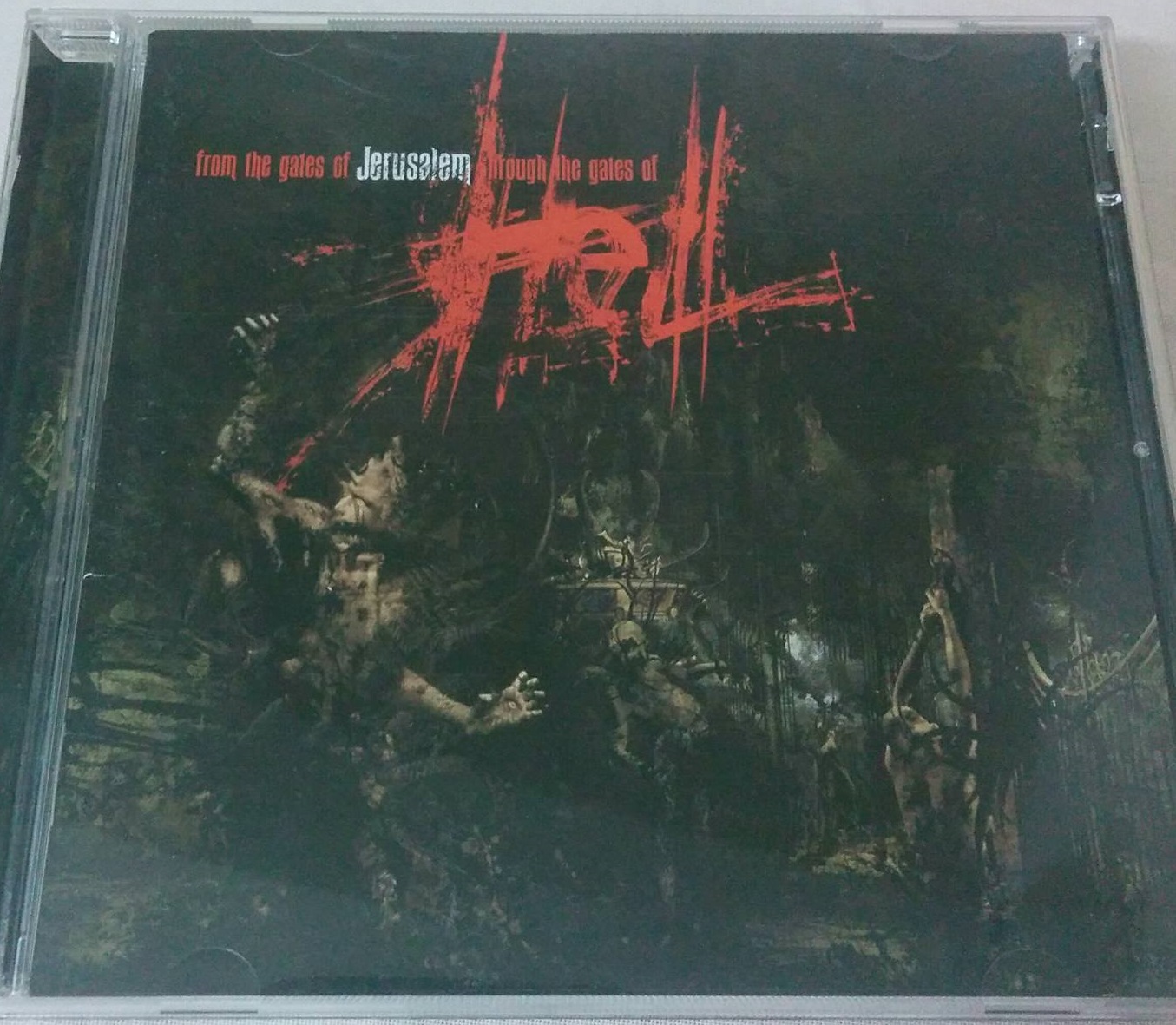
Satanic Metal Fucking Hell -
אחד הגלגולים הקדומים שלפני 'דרכימוזרות' באוסף הירושלמי הוותיק.

מעתיקות הסצנה הירושלמית. אוסף.

מתרחקים מהטרו האופנתי. האם זה עלה להם ביוקר?
How to say: "Black Metal" in Avestan?
How to say: "Black Metal" in Avestan?
רְשִׁימ֥וֹת־תֹּ֖הוּ | interview with Akvan/اکوان
By: Yossi Ben Oz
8-1-17
Here is a Facebook Interview, conducted at December 27th 2016 and completed at January 7th 2017 with the leader of the Persian-Black-Metal act "Akvan" – Lord Vizaresa.
*
Lord Vizaresa is the man behind the Persian Black Metal act Akvan/اکوان. We caught up with him for a conversation about his music and much more, now that Akvam came out with new material (demo): میراث.
1. Hello Lord Vizaresa. 1st of all – thank you for this kind interview, this is truly a unique experience for the both of us I am sure.
Hails Yossi, it definitely is, given current circumstances and the state of the world we're living in. Thank you for giving me this opportunity.
2. My pleasure of course. How have you been lately? I understand you are now staying in the Middle East?
Busy. Between work, life, and trying to squeeze in time to write music...busy. I am currently working as a behavior psychologist, which unfortunately, leaves very little time to don the corpse paint.
3. Recent days have been intense around the globe: The elections in the USA, the deadly terror act in Berlin, the totally insane civil war going on in Syria… A question I have been curios to ask you for a while: Has any of these impacted your heart & work? Do you wish it so?
Whether we like it or not, the world we live in, which has definitely shrunk due to the internet and the information age, impacts almost every aspect of our lives. I would be lying if I said that current affairs have little to no effect on my personal life and emotions, which are reflected in my art. Although I am a natural born American citizen and have lived there for most of my life ( I recently moved to the middle east to obtain a better understanding of traditional Iranian musical systems), I will openly say that I hold great disdain towards American foreign policy and what is considered mainstream culture in America. The election of Donald Trump and the nomination of Hillary Clinton as the democratic presidential candidate are a testament to the failing education system and cultural decay of the United States. The president of the United States is supposed to be a leader and role model the whole world can look up to, not a petty criminal, which is exactly what Trump and Clinton are-criminals. The horrifying conflict in Syria is a direct result of the United States government attempting to remove a regime that does not fit into their agenda...just like they did in Iran in 1953 under Operation Ajax. I would not refer to it as a civil war, as that would be incorrect. As far as I understand the situation, it is the legitimate government of Syria fighting against terrorist groups which are heavily funded by foreign powers looking for political influence in the region. I doubt many Americans realize that their tax dollars are being given to groups like Al Nusra, a faction of Al Qaeda (you know, the same people who attacked them on September 11th, 2001), to take outAssad's regime. Unfortunately, the narrative of the situation has been heavily altered by US media outlets and most of my fellow countrymen as well as most of the world follow blindly...like sheep. They are led to believe that Muslims, Syrians, Iranians, Iraqis, etc., are all the same and that they are equivalent to barbarians. This false and disgusting notion that somehow my ancestral culture is deemed inferior or barbaric by the mainstream narrative is what has partially given rise to Akvan.
4. I want to talk a little about your texts. Your lyrics (as I understand) strongly emphasize the ancient Zoroastrian culture. How do the people in Iran react to this aspect in your work, what with it being their historical own culture in the pre-Islamic era?
Excellent question. Usually it is either black or white. They either love it or hate it. It definitely brings out the divide that is currently present amongst the Iranian people. I would say for the most part, the reaction I've received from younger individuals is much more positive – younger audiences.
Right now, Iran is not a positively depicted country on the world stage, as it hasn't been since the 1970s. Which is a shame and quite unfair and I think this aspect speaks to Iranian fans on a level that is not comprehensible to others. Unfortunately, filthy politics has taken that from them. I grew up in the states and according to their media, which is very prominent in the world, Iran is a desert that has nothing positive to contribute to the world. It's a shithole basically, at least that is how it is advertised… which is consummately false: It is one of the most eco-diverse locations in the world
Iran is an ancient country. It is amongst the oldest, if not the oldest, civilizations in the world. And the Iranian people know this and are damn proud of it; the food is delicious, the women are beautiful and outspoken, the culture and art is infinitely rich, and the history...
Which sadly, is overlooked throughout the world due to politics, so i think when young Iranian fans are introduced to Akvan, a blend of western and traditional Iranian music that celebrates their culture, art, and history, it gives them a sense of pride
It strengthens their sense of pride, which is to my delight.
(Yossi Ben Oz): This sounds amazing. Here in Israel only few Israeli metal acts take the time to address their own vast and ancient culture in their music. I wish many more would.
I think all cultures should.
(Yossi Ben Oz): Totally agree on that.
It provides a new means of education. I am definitely a fan of bands like Melechesh. And one of the things I love about metal is that regardless of religion, ethnicity, culture, etc., it creates a sense of brotherhood amongst fellow metalheads. We can all benefit from each other, so why the hell not?
(Yossi Ben Oz): They are deep in their textual approach, though they too don't address Israeli ancient content. Not as I would wish for.
5. Your music is pretty minimalistic in its approach, I mean fusion wise: you play only Persian scale based Black Metal. Do you ever get curios about fusing some other cultural elements in your work?
I certainly do! I love many different genres of music and have played in other bands that have nothing to do with mideast scales or influence. However, Akvan is more of a personal project for me, and I am actually new to the dastgah system of Iran. There are a wide variety of scales and sounds within the Iranian system which I still have to master and learn about. It has taken me a while to melodically fuse the traditional notes of the Iranian scales, namely the Sori and Koron, which are half flats and half sharps. Without it sounding terrible. So I still have a ways to go before I can establish a sound that encompasses the full Iranian musical system. I am definitely open to working with different sounds and genres of music, but I would like to keep Akvan strictly Iranian. If I produce work outside of these boundaries, It would probably be under a different title.
(Yossi Ben Oz): I can really relate to that :)
6. It is a known fact that Black Metal artists from the Scandinavians feel strongly about their glorious past. I sense that you feel the same about yours. It almost seems as if Black Metal naturally attracts Reactionaries (I have mentioned that in my review of your work earlier this year). What is your take on this subject?
That is quite the loaded question....haha. I would definitely have to agree with you on the appeal to reactionaries. And I could probably get in a lot of trouble for giving you an honest answer, but I'll do my best.
The similarities between Akvan and the black metal scene established in the early 90s are quite obvious. Both musically and philosophically. As any scholar of history would know, Islam is not the original religion of Iran. Just like Christianity in Norway, Islam was forced on the Zoroastrian population through conquest and war. And as a result, our original culture faded...sort of. Although Islam was adopted, the Iranian culture largely survived. Which is why I feel that culturally, Iranians are quite different from our Arab neighbors. And as you asked earlier, about how Iranians react to my work – that is the divide I'm talking about. Due to restrictions in the country, some Iranians do not hold an accurate view of their own history. I was one of them. I didn't really know much about Iran's past until I got a hold of a copy of Ferdowsi's Shahnameh. But when I did learn more and more about the true history of the country, my personal views changed, and well....now we have Akvan. Although I do not deliberately go out of my way to blaspheme or insult anyone's beliefs, I do try to invoke a sense of return to the original culture or Iran which was a culture based on tolerance, as depicted by one of the most important figure in Iranian and world history Cyrus the Great.
Musically speaking, Iranian music is inherently dark and full of emotion. Treble picking of stringed instruments is quite dominant as it is in black metal. Lots of dissonance and drones.
(Yossi Ben Oz): It's interesting: you seem to hold a rather adversary view to current culture but not a militant one. This differs from the Scandinavian point of view definitely, though I tend to question this equation because Scandinavians have no restrictions in their homelands. they can be as atheist or anti-Christian as they please and no one can say a word whereas in Iran things are more risky by far. Which makes you a pretty brave guy...
I wouldn't say I'm brave. Sensible, I'd say. Although I can see the appeal in blaspheming and insulting, especially amongst youth, I believe there are more intellectual avenues to go down to open up discussion. I also personally have no problem with Islam or religion. I just believe that people have the right to make up their own minds about their purpose in life and which path they wish to take.
That is for sure.
7. Tell us a little about your new album. BTW Do you plan to have physical copies made for sale? I love a physical copy but maybe I'm just old J
It's been quite difficult given the nature of my professional career...it's very time-consuming, which has caused several delays in producing material. I am definitely working on incorporating more traditional instruments, such as the tar and Setar (not to be confused with the Indian sitar). Lyrically, I believe this may be the most diverse release as it will cover a range of topics. As for physical copies, I would love to have some available for fans, but it hasn't been a focus for me, but I will definitely try to get some for you.
The reason being is that I am not a very business-oriented person. Akvan is a labor of love and music I create for myself. If other people listen to it and enjoy it, I'm delighted, but I certainly am not looking to make profit off of it. Which is probably why I never really put much effort in merchandise. However, some of my previous material is available on cassette tape through Tetraktys media, which is a music label run by an old band mate and friend. Otherwise, all my work is free for download via bandcamp.
8. If I was to say to you choose 1 specific artist with whom you may collaborate in a new piece, who would you chose and why?
This has probably been one of the most difficult interviews I've taken part in (laughs) and this is by far the most difficult question for me to answer. For Akvan specifically, I would choose maestro Shahram Nazeri, as he is one of the most important figures in traditional Iranian music and a huge influence on me. For me, he is the master of Iranian Sonati, and I believe he could provide knowledge and insight unmatched by anyone else. I believe it would help expand Akvan into something much more grandiose and epic.
9. For my last question… I am going to dare and ask this even though I am aware to how things might be complicated about it: If you were to be invited to perform here in Israel, would you be up for it? What might your thoughts be if such a thing was to occur?
I will be completely honest. If I have fans that want to see me perform live, then it is an honor and a privilege to do so for them, regardless of politics, religion, age, race, gender, sexual orientation, etc. It does not matter to me. I would have no problem fulfilling your proposition and I would do so with pride, regardless of whether or not it would land me in serious trouble. Even though I am openly opposed to the current the current Israeli government, I believe music is one of the very few outlets left for opening up critical dialogue and bringing people together. I believe if I, an Iranian-American black metaller, were to perform in Israel for Israeli fans, it would send a very powerful message to the rest of the world. A giant middle finger to the politicians, religious demagogues, and xenophobes that try to keep us all divided and full of hate. Imagine two presumed “enemies” engaging in celebration of each other's cultures, all in the name of blasphemy (laughs). I think it would piss off all the right people, and that's what it's all about: rebellion.
(Yossi Ben Oz): I want to deeply thank you for this great interview, lots of success with your new album & keep the flames of metal alive \m/
A very big thank you to you, brother, for opening your heart and mind to take the time to give me this opportunity. If more people like yourself could abandon their fear and prejudices to sit down and speak with each other, I believe the world would be a much better place. Thank you again, and may the Gods of Metal bless you. Hails \m/
*
Yossi Ben Oz
January 2017

Simorq has risen from the ashes of defeat and revived herself back to the glory

Glory of Persia
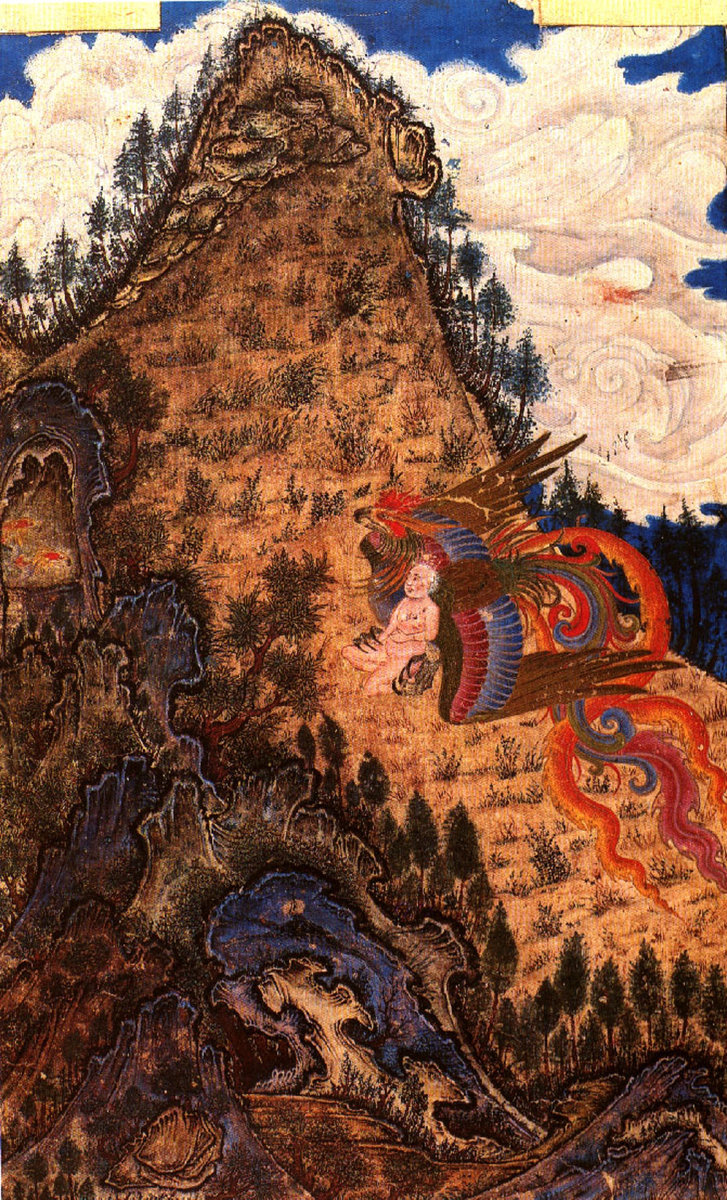
Lysergic Metal of Death
Lysergic Metal of Death
רְשִׁימ֥וֹת־תֹּ֖הוּ | interview with Grave Miasma
By: Yossi Ben Oz
3-2-17
Basically? I think it is the thick abundant overall guitar sound combined with the evolving riffs that make that undefined stomach feel that grasps you when encountered with the works of Grave Miasma.
Originating from the UK, these guys felt a bit of a pioneer group in their own country though they are most certainly not founders of their genre. They have been around since 2002 though under a different name (used to be called Goat Molestör when commenced – back in 2002, remaining so until 2006).
A relatively newcomer to the scene, the band doesn't aim to revolutionize Death/Black Metal. They play a sort of extreme & doomy-bass-filled type of Black-Death build upon a melodic structure that reminds me of the good old days of the founding fathers like Hypocrisy, Gorguts or Benediction. In a sense, these bands are what I seem to look for every time I hear what Grave Miasma are doing in their music. The modern times absence of a firm, non-compromising, thick-doomy like-bass-oriented sound in the Metal scene is a "romance" generator: Your heart is filled with sadness about your ever beloved spouse, gone now. And you cannot forget how your soul reacted to her when you've been with her at old times. But now she seems to have gone forever. Nowadays, all bands try different things, moving onwards to toy a little bit with the more experimental kind of post-metal materials whilst you are left to yearn for your lady to come back & re-flourish your heart.
Grave Miasma are taking you back to your loved one, if the above metaphor can be completed. This is, to my opinion, their strongest virtue.
With time, the band developed its own sound that I feel strayed only little from the initial backline.
In honor of their 1st time ever visit to the land of the divine intervention, we talked to the band asking them a few questions to discover some more layers within their music & writings.
The interview below was taken with Yoni Ben Haim – the guitarist & vocalist behind the British Black/Death Metal act – Grave-Miasma.
*
1. Hello Yoni. 1st of all – I'd like to thank you for this kind interview & hails for your visit to Israel! Personally I have longed for this to happen.
Likewise, it is a great honor for us to visit and play in Tel Aviv.
2. Can you please share with us how you all met in the 1st place & what stirred you up to get organized as a band & start playing?
Dani and I are biological brothers, and from a young age both harbored the dream of playing music. I met Ro in a Rock club and we became very good friends with a shared taste of underground Metal. Based on this the three of us had huge interest in playing a style of Black/Death Metal that was not common at that time - certainly less so in England.
3. Tell us a little about your last EP. The new material does not stray from your primal line of art, although changes have been made. Nowadays a lot of bands tend to reinvent themselves all the time, what's your stand about this? Will future material totally differ from your current stuff or do you tend to take a stronghold of your artistic directions?
There lies a paradox within Death Metal. We do not wish to stray beyond the narrow limits of the genre, however we feel that there is enough creative space for each recording to evolve with newer elements and influences without straying from the core principles of Death Metal; Those being, darkness, decay, obscurity, madness and so on.
Reinventing the band is not necessary as quite simply Death Metal will forever be our chosen form of expression.
4. You deal much with the Occult in your lyrical themes. Most of it from a Hindu origin. I must add that I have even found some lyrical themes taken from the ancient realms of the "Qabalah" (antique secret lore of the ancient Israeli nation). What is behind this use of ancient wisdoms?
In terms of approaching Qabalah as a system of equilibrium - be it from a mathematical or gematric viewpoint – there are clear secrets than can be illuminated. Artists Jesse Bramford and Daniel Martin Diaz have perfected a visual explanation of these principles far more worthy than any written attempt I could give, in how they relate to the fabric of space-time, consciousness, thought and matter.
Additionally, The Four Worlds (A’B’Y’A) are something that can be realized and experienced. What makes a mystic principle real and rather than merely theory is its tangibility. Even the Bhagavad-Gita contains the following quotation which has a very analogous connection: "And, O descendant of Bharata[1]! See wonders in numbers, unseen before. Within my body, O Gudâkesa! See to-day the whole universe, including everything movable and immovable, all in one."
5. As said above - you heavy intertwine of Hindu elements into your music. Both textual & musically BTW. Why the Hindu culture of all?
Obviously I claim no cultural lineage towards Hinduism or that part of the world. The relation and equilibrium between Kali and Shiva is one I find absolutely fascinating, and the mind becomes absolutely absorbed in this astonishing reality once digging deeper.
6. I want to talk about the music: I think what really appeals in your music is the thick overall sound that takes people back to the days when black & death metal were deep & bass filled genres. I'm curious what – if any – metal bands have influenced you in your work?
The list of bands who influence us will be too numerous to state, though to the initiated ear they are quite detectable and obvious. Since our formative years we believe that the influences have become less definitive to the point that we have our own style based on our musical capabilities (and subsequent limitations).
7. Back in 2002 you've changed your name to Grave Miasma. Before that you were "Goat Molestör". Has this change brought upon some more deep changes in your artistic work, besides just changing your image? What was the incentive behind this action?
All bands evolve, and we are no different.
8. If I was to ask you to describe in one sentence the very heart & soul of your metal in Grave Miasma – how would you've described it?
Lysergic Metal of Death darker than the other side of the moon, brighter than a thousand suns.
9. What are your plans for the future? Is there new material you are working on lately?
Currently we have numerous ideas and riffs recorded. The next full length is taking shape.
I want to thank you for this kind interview, & see you all in Israel. Hails \m/
Cheers! \m/
Yossi Ben Oz
January 2017
[1] In Hindu scriptures, Bharata (Sanskrit: भरत, Bharata i.e., "The cherished") is a legendary emperor and the founder of the Bhārata dynasty and thus an ancestor of the Pandavas and the Kauravas in the Sanskrit epic Mahabharata.

Seriously, doesn't this take you back to old Black-Death feelings?
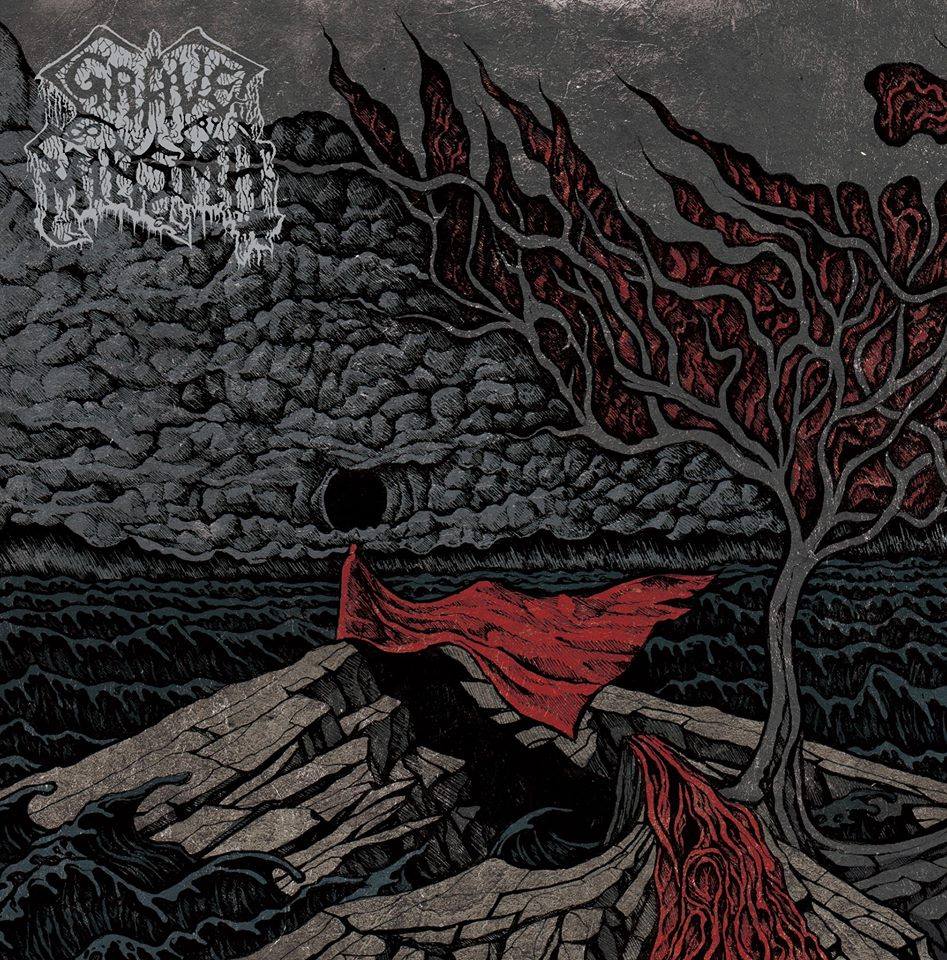

Black Mass Ritual, Dante's Highlight
קטיף דובדבנים אפל
קטיף דובדבנים אפל
רְשִׁימ֥וֹת־תֹּ֖הוּ | ראיון עם קארל סאנדרס מלהקת Nile
מאת: ירון שפונד
סייעו בהכנת הראיון:
גבריאלה ליצ'קו, נופר ברטשניידר-שטרצר, יוסי בן עוז
תרגום: נועה ארצי
08-8-17
תודה רבה לך קארל, על שהסכמת להשתתף בראיון זה.
1. אז קודם כל רצינו לברך אותך על כך שבאת להופיע כאן בישראל. האמת היא שאני די סקרן בנוגע למחשבות ולתחושות העולות בך לקראת אירוע זה, בהינתן ההיסטוריה הקדומה העשירה של האזור הזה ולאור העניין הרב שיש לך בכל הנוגע להיסטוריה של העת הקדומה.
תודה רבה לך אדוני. אנו אסירי תודה על ההזדמנות שניתנה לנו לבקר בישראל :-) עוד מימי ילדותי המוקדמת אני מכיר את כל הסיפורים מהתנ"ך, כך שממש להיות במקומות בהם כל האירועים האלו התחוללו, זה מרתק.
2. האם תוכל לספר לנו על היצירות המוזיקליות שהפכו אותך למוזיקאי והאדם שאתה היום? תוכל לשרטט מפה של היקום המוזיקלי שלך, במטאל ובכלל?
ובכן, כשהתחלתי לנגן, היו לנו רק את האגדות הקלאסיות מימיו המוקדמים של המטאל: Black-Sabbath, Led Zeppelin, Cream וכן הלאה. כך שאלו היו הדברים שניגנתי כשלמדתי לנגן על גיטרה, ע"י הקשבה לתקליטים האלה. ואז לאחר תקופה קצרה הופיעו גם Judas Priest, Iron Maiden, והלהקה האהובה עלי, ה-Scorpions. מאוד הושפעתי מסגנון הנגינה של Uli Roth על הגיטרה. ואז, לאחר שנים שבהן כבר הספקתי לנגן בלהקות, הצטרפו לעולם Metallica, Slayer וכל שאר להקות הת'ראש מטאל. זו הייתה חווייה פוקחת עיניים. להקות הדת' מטאל הראשונות – Carcass, Napalm Death, Morbid Angel, Suffocation, Immolation, Cannibal-Corpse, היו מאוד משפיעות מבחינת עיצוב הכיוון המוקדם של המוזיקה שלי.
3. כיום נדמה שהרבה להקות מטאל נוקטות גישה הרבה יותר "טכנית" למוזיקה שלהם (Meshuggah, Born of Osiris, Ring of Saturn וכדומה) - מהי עמדתה של Nile באשר לנטייה עכשווית זו?
אני אוהב נגינה טכנית. אני בעצמי מקפיד להתאמן כמה שעות ביום, כל יום, על מיומנויות גיטרה. ועם כל זאת, אינני נהנה מזה שמקיאים אלי בחזרה אינסוף סולמות וארפג'יו המחופשים ל-"מוזיקה". באוזניי זה כבר לא נשמע כמו מוזיקה, כשאני מקשיב ללהקות שפשוט מנגנות כל סולם וארפג'יו שהם יודעים לנגן, הכי מהר שהטכניקה שלהם רק מאפשרת להם לנגן; אני הרי ממילא הקשבתי לשעות של זה מידיי שלי שהרי התאמנתי כל היום. לזה במשך שעות באימונים שאני עושה במשך כל היום. כשאני מקשיב למוזיקה, אני רוצה לשמוע קצת מוזיקה. יש בסופו רך מעט להקות נבחרות שיודעות לקחת את כל הטכניקה הזו ולעשות משהו מעניין מוזיקלית מכל זה. אני חושב שעם טכניקה בלבד, מאוד קל "לשרוף" את האוזניים של המאזינים שלנו. מעבר לגבול מסוים, זה פשוט כבר לא משפיע באותה העוצמה על המאזין. אני מעדיף להקשיב ללהקות המצליחות לאזן בין הברוטאליות למוזיקליות, באופן שניתן יהיה להקשיב לזה.
4. ידוע כי אתם מגדירים את המוזיקה שלכם כ- "מטאל איטיפאלי[1]" – התוכל קצת לפרט בנוגע לזה?
פעם בימי שקדמו לעידן האינטרנט בתרבות המטאל המחתרתי, כולם היו מוסיפים איזשהו עלון או חומר פרסומי אחר כדי לקדם להקות שונות שעמן הם היו בקשר. המון להקות היו מנסות ליצור סביבן הייפ ייחודי, או להגדיר את תת הז'אנר שלהם תחת איזושהי קטגוריה. סלאם מטאל, גוֹר מטאל, מטאל שטני, מטאל ברוטאלי, ספיד מטאל, בלאק מטאל, גריינד מטאל, היו אינסוף ווריאציות שכאלו, והרבה פעמים הלהקות שהצליחו לתאר את עצמן בצורה הכי צבעונית, עם העטיפות הכי ערטילאיות, היו גם הלהקות שהצליחו ללכוד את מירב תשומת הלב. אז התחלנו להגדיר את עצמנו כלהקת מטאל אית'יפאלי, בעקבות המסורת המצרית הקדומה לבניית פסלי אלים עם זקפה בממדים מיתיים. לא בהכרח התייחסנו לכך ברצינות תהומית. כאילו, באמת. זה הרגיש לנו כמו דרך משעשעת לאומר "לכו תזדיינו", לכל 'ילדי הסצנה' שנטו לקפוץ על כל טרנד חדש, ולאליטיזם של כל הלהקות שלא חדלו מלפרסם את עצמן בימיה הקדומים של המחתרת. אך במשך הזמן המטאל האית'יפאלי די דבק בנו כהגדרה, ואנשים באמת הגדירו אותנו ככה. כשהגיע הזמן להוציא את האלבום החמישי שלנו, אמרנו לעצמנו שאנחנו חייבים כבר לכתוב שיר הנקרא "אית'יפאלי". כי כבר הגיע הזמן (צוחק). כך שכיום, בכל פעם שאני שומע אנשים שמגדירים אותנו כמטאל אית'יפאלי, זה גורם לי לחייך ולצחוק קצת. זה מעולם לא כיוון לקחת את עצמנו ברצינות יתירה מידי.
5. יש לך פרויקט צד הנושא את שמך. מבחינה תמטית, אין הבדל רב בינו לבין Nile, אך מבחינה מוזיקלית, הוא ההיפך הכמעט גמור. האם מדובר בהרחבה של החזון שמאחורי Nile? או שמא מדובר ברעיון משלים? כמוזיקאי, כיצד שני הפקרוייקטים הללו מתחברים בתוכך כמוזיקאי והאם פרויקט צד זה, מאחר והוא נושא את שמך, משקף איזושהי גישה אישית יותר שיש לך כלפי המוזיקה?
האמת היא שהקמתי את הפרויקט הזה רק בגלל שהעברתי חלק לא קטן מחיי בסיבובי הופעות דת' מטאל. כך שכל יום במהלך סיבובי ההופעות, כשבכל יום היו 5-6 להקות דת' מטאל שהיו אמורות לעלות לבמה - זה הגיע למצב ששמעתי הרבה יותר מדי דת' מטאל. הייתי זקוק קצת לשקט ולשלווה. אלבומי ה-Saurian היו עבורי רק דרך נוספת לעשות מוזיקה, מבלי לשמוע דת' מטאל 24/7 (צוחק).
6. תוכל להסביר את האסתטיקה שמאחורי פרויקט הסולו שלך ובכלל, על החזון האמנותי שלך?
ובכן זהו לרוב שילוב של אמביינט עם קטעים אקוסטיים ואקזוטיים, אבל זה עדיין אני (צוחק), כך שזה הולך להישמע אפל ולאבקרפטיאני, גם אם זה קצת יותר שקט ומדידטיבי. הוא נועד לגרום למחשבות שלך לנדוד ולשחרר את דמיון המאזין בזמן חווית ההאזנה.
7. ידוע שאצל המון יוצרי אקסטרים מטאל, עשיית הדברים בעצמך בראשית הדרך עוזרת לך לעצב את הזהות שלך ומאפשרת לך לבטא את הכנות מוזיקלית הכה חיונית ליצירת חומרים טובים. עם זאת, ידוע גם שהדברים עלולים להשתנות בצורה דרמטית, ברגע שאתה מתפרסם והופך לשם דבר. כיצד זה השפיע עליך באופן אישי וכיצד זה השפיע על הלהקה? האם הפרסום הקשה עליך להתחבר לאותו המקום הכן שבלבך ולשפוך אותו החוצה כרגש נקי וטהור?
מה שעוד יותר הקשה על העניין הזה היה שנאלצתי לסבול מכך שכמה מחברי בלהקה לא הצליחו להתמודד בצורה רציונלית עם הפופולאריות הגוברת. לפתע אתה מגלה שיש לך כמה בחורים בלהקה שחושבים, מאמינים ומתנהגים כאילו שהם היחידים שבזכותם הלהקה הזו הצליחה. זה מקשה על העבודה המשותפת וגם המוזיקה נפגעת.
8. המוזיקה שלכם אינטנסיבית אך בו זמנית היא גם מורכבת. יש הטוענים שהפירוטכניקה הטכנית לפעמים מעיבה על האינטנסיביות הקיימת במוזיקה הכתובה בפשטות, אך מקבלת ממד נוסף בעת הביצוע. אומר לך את דעתי הכנה - רוב להקות הדת' מטאל הטכני לא מצליחות לחדור ללבי, אך יש כמה שדווקא הצליחו. מהו לדעתך הסוד שמאחורי דת' מטאל טכני טוב ומשפיע?
הסוד הוא שפשוט צריך לכתוב כמה שירים אמתיים! (צוחק) קצת השקעה בשירים יכולה ליצור הבדל גדול באופן בו אנשים מתחברים למוזיקה.
9. הייתי רוצה להחזיר אותך לימיך ב-Morriah. האם אתה יכול להצביע על איזושהי התנסות משמעותית שהותירה בך חותם כאמן מאותה התקופה? מעניין אותי בעיקר לשמוע על תקופת סיבובי ההופעות הקצרה שהייתה לך עם Morbid Angel, שהיו אז בראשית דרכם. באותם הימים נדמה היה כי הם מסורים יותר מבחינה אידאולוגית לכל התמות הקשורות בפולחן השטן ובתורת הנסתר הקדומה (לפחות בעינינו המעריצים). האם יצא לכם לדבר על הנושאים האלו, לפחות מבחינה אומנותית?
הייתי אומר שהמפגש שלי עם Morbid Angel במשך אותן השנים המכוננות והמוקדמות שלהם היווה נקודת מפנה חשובה עבורי מבחינה מוזיקלית. בזכותם נפתחתי ליקום שלם של אפשרויות מוזיקליות חדשות. בנוגע לעניינים האידיאולוגיים - ראיתי זאת יותר כבחירה אישית - אם החבר'ה האלה מצליחים לעשות את מה שהם עושים – אז לבטח לפי החוקים הבסיסיים של היקום, איש לא יאמר לי על מה מותר לי ועל מה אסור לי לכתוב :-)
10. בנוגע לכתיבתך: מבחינה תרבותית, לכל התרבויות הקדומות הייתה תפיסה מאוד עשירה באשר לקיום, הן בפן הרוחני והן בפן הגשמי. אף על פי כן, במוזיקת המטאל ישנה נטייה חזקה לאמץ בעיקר את "הצד האפל". האם לדעתך המוזיקה והפן החזותי של Nile משקפת את הרבגוניות התרבותית הזו או שאתם נוטים יותר למעין בררנות תמטית אפלה ("קטיף דובדבנים אפל", אם יורשה לי להיות מעט חצוף)?
אני חושב שהגדרת זאת היטב. אנחנו אכן נוברים בהיסטוריה הקדומה בחיפוש אחר נושאים המתאימים לשירי דת' מטאל. אי אפשר לכתוב שיר דת' מטאל על כל דבר שכתוב בספרי ההיסטוריה.
11. האם יש חוט שני המקשר בין כל מקורות ההשראה הכתובים שהשפיעו עליך? כלומר: חקר מצרים הקדומה, תרבויות עתיקות, ה.פ. לאבקרפט – איך כל אלו השתלבו בתהליך היצירה שלך?
הכול משתלב שם באיזושהי צורה. המוח שלי הוא כמו חור שחור, הבולע את כל העצמים ביקום אל תוך קריסה גרעינית הרסנית אחת גדולה.
12. אני מניח שכילד שגדל בשנות ה-70, בתקופה שכל זה רק התחיל, הייתה לך הזדמנות לחזות במטאל בהתהוותו. איך קראו ללהקת המטאל הראשונה שלך ומיהו המוזיקאי שבסופו של דבר גרם לך לרצות לעשות מוזיקה?
ניגנתי בלהקת המטאל הראשונה שלי כשהייתי בתיכון. היינו שלושה אנשים בלהקה וקראו לנו “Blond Lebanese”. היינו אני ועוד 2 חברים לבנונים שלי, Louis Sijon ו-Peter Shaluly. בניגוד לאגדה הרווחת, לא חשבנו על השם הזה בזמן שעישנו ביחד חשיש... (צוחק) אני לא חושב שאני יכול לציין להקה מסוימת שבגללה החלטתי שזה מה שאני רוצה לעשות בחיים. אני חושב שתמיד הייתה בי את ההבנה שנועדתי לעשות את זה, ושזה יקרה בדרך כזו או אחרת.
13. אתה כיום בן 54. אני מבין שאתה גם אבא. יש לי תחושת בטן שהשאלה הבאה היא שאלה שמטרידה את כולנו: "האם אשאר מטאליסט לנצח?". היכן אתה רואה את עצמך נאמר, בעוד 5, 10 או 15 שנה מעכשיו? האם לדעתך תהייה לך מספיק אנרגיה כדי לנגן דת' מטאל קיצוני, נאמר, גם בעוד 10 שנה מעכשיו? או שמא לדעתך יש איזשהו גיל שבו אולי תשקול להוריד קצת את הקצב? איך המשפחה שלך מתייחסת לכל העניין הזה?
אני לא יודע מהו הגיל שבו אתה נחשב כזקן מדי. אני כבר עכשיו זקן יותר ממה שהייתי מצליח לקלוט כשהייתי בן 20. אני אסיר תודה על כך שאני עדיין זוכה לנגן מטאל. זהו הדבר האהוב עלי וזהו גם הדבר לו הקדשתי את חיי. אני מוכן להמשיך לעשות את זה כל עוד המעריצים שלנו מעריכים את מה שאנחנו עושים. אני יכול לאומר לך שכמוזיקאי מטאל, וגם כמישהו שמתאמן באומנויות לחימה: ככל שעוברות השנים, יש מחיר גבוה יותר לעיסוק במוזיקה קיצונית ובאומנויות לחימה. כשאתה בן 20 או 30, אתה יכול עוד לחזור לעצמך בקלות לאחר סיבוב הופעות או קרב התאבקות. אבל כשאתה בן 54, זה כבר לא כל כך קל. הכול ממשיך לכאוב להרבה יותר זמן ונדמה שזה מצריך כוח רצון רב יותר כדי לעשות את מה שבעבר הלך בקלות. התמיכה שאני מקבל מהמעריצים היא הדבר הגורם לי להמשיך. כשאתה עולה לבמה ומרגיש את האנרגיה שלהם, את ההתרגשות שלהם ואת אותה הרוח המנשבת בקהילת המטאל, אתה שוכח מכל החלקים שכואבים לך על בסיס יום יומי. כעת זה הזמן למטאל וכל שאר הדאגות נמצאות מיליון קילומטרים ממך :-).
14. Nile הייתה אחת מבין מעט הלהקות שהתעמתו עם נושא הטרור האיסלמי שטורד את העולם בימינו. השירים Kafir ו-Call to Destruction הם דוגמא מצוינת לכך. מה גרם לך לרצות לגעת בנושאים אלו?
האבסורדיות שבהונאה העצמית של האנושות. במטאל מאוד נפוץ להכפיש את הנוצרים וללעוג להם, אך תחושת החשיבות העצמית ואידאולוגיה שהלכה שולל בצורה טרגית אינם נחלתם הבלעדית של חסידי ישו.
15. כלהקה שאינה חוששת לכלול תכנים פוליטיים ברורים במוזיקה שהיא עושה: מה אתם חושבים על דעא"ש ועל כל המתרחש כיום במזרח התיכון? האם לדעתכם המטאל צריך לשחק תפקיד חשוב יותר במאבק נגד מעשי זוועה, שפיכת דמים, הרס אתרים היסטוריים וכדומה, בדיוק כפי שלהקות הת'ראש מטאל באמצע שנות ה-80 עשו, בביקורת הנוקבת שהביעו בשיריהם נגד ממשל ארה"ב, נגד מלחמות וזוועות אנושיות?
נהה. אני חושב שבסופו של דבר המטאל צריך להתמקד בערך הבידורי וזה עדיף כשלא משתמשים בו כבסבון להעלאת המודעות החברתית. זה בסדר כשזה נעשה במידה, מפעם לפעם, אבל כשלהקות שוכחות את תכליתן האמתית בתכנית הגדולה הזו, זה עלול להיגמר במוזיקה מאוד לא מהנה.
16. שאלה קצת מוזרה לסיכום: אם הייתי מבקש ממך לבחור דמות שהיית רוצה שתשתתף ביצירת האלבום הבא של Nile, כזו שהייתה יכולה לתרום איזשהו מגע ייחודי שייקח את היצירה למקום אחר לגמרי – במי היית בוחר? תחשוב מחוץ לקופסא: מוזיקה, סרטים, אומנות, מדע – הכול.
(צוחק) הייתי בוחר בניל דה-גראס טייסון. הבחור גאון. והוא גם מתאבק. כך שאנחנו יכולים גם ליהנות מקרבות היאבקות בין ההקלטות :-).
תודה רבה לך על הראיון האדיב שהענקת.
Reshimot-Tohu | רְשִׁימ֥וֹת־תֹּ֖הוּ
Underground Culture – Metal - Thought
[1] המונח הלועזי: Ithyphallic משמעו Erected Phallus (איבר זכרי מוזקף) ביוונית עתיקה.
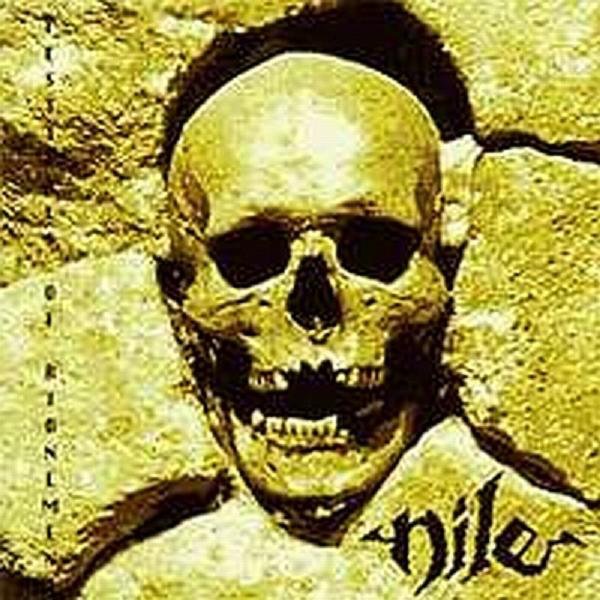
"המוח שלי הוא כמו חור שחור, הבולע את כל העצמים ביקום אל תוך קריסה גרעינית הרסנית אחת גדולה"
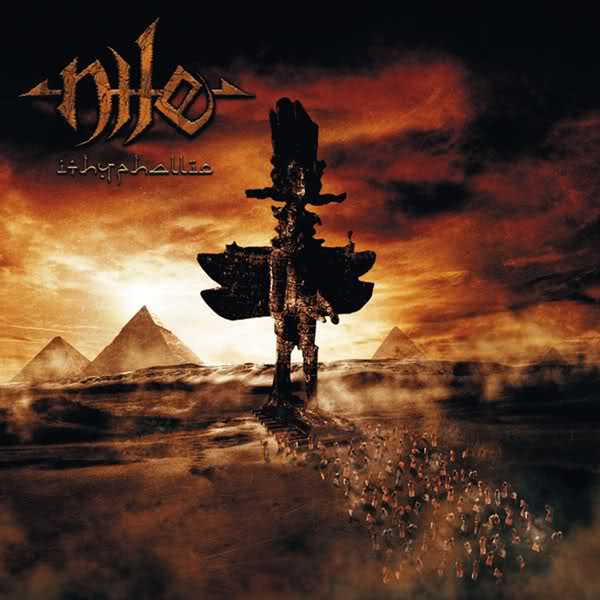
זה התחיל מבדיחה על סצנת אנדרגראונד שמפרסמת את עצמה לדעת. הקלות המבדחת שבה צצים תתי ז'אנרים מומצאים...
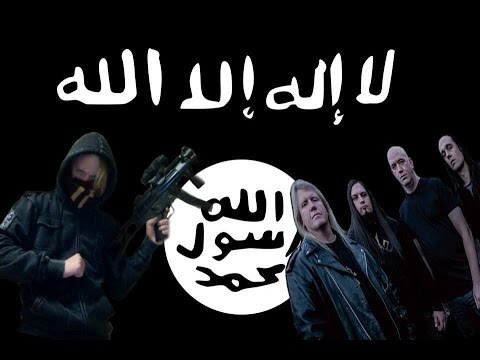
"האבסורדיות שבהונאה העצמית של האנושות"' - גם לחשיבות עצמית מנופחת מצד האיסלאם ראויה מנה של גנאי.

כשאתה עולה לבמה ומרגיש את האנרגיה שלהם... אתה שוכח מכל החלקים שכואבים לך; כעת זה הזמן למטאל וכל שאר הדאגות נמצאות מיליון קילומטרים ממך.
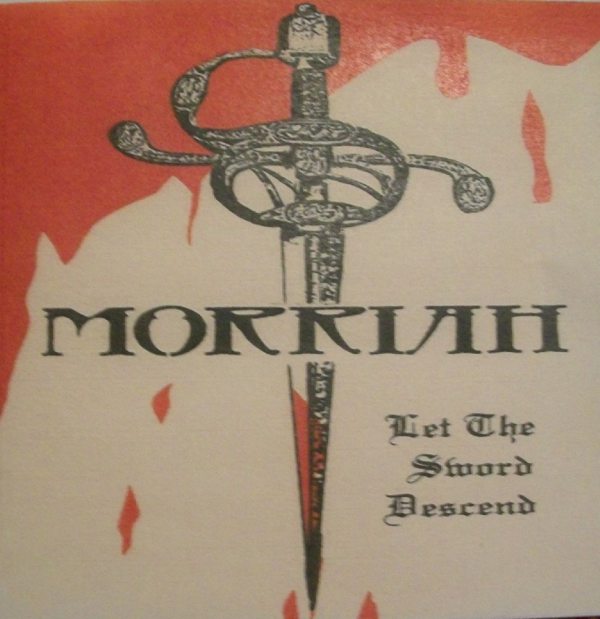
"הייתי אומר שהמפגש שלי עם Morbid Angel במשך אותן השנים המכוננות והמוקדמות שלהם היווה נקודת מפנה חשובה עבורי מבחינה מוזיקלית"
An Iron Spear in The Face of Hypocrisy
An Iron Spear in The Face of Hypocrisy
רְשִׁימ֥וֹת־תֹּ֖הוּ | An Interview with Antonio Corso
By: Noa Kushnir Artzi
12-14-17
Journey.
Following my quest for Futurism in Milan, which I have described in a previous item, I was blessed to have the opportunity to talk to the artist responsible for the album cover that prompted this whole journey. Here's my conversation with Mr. Antonio Corso, a Futurist artist and Metal musician who also runs a small label.
*
From my brief visit to Milan, I understand that Futurist art isn’t very widely displayed in local museums and probably gets the same, poor amount of exposure in academia. How did you get exposed to this style of art? Why Futurism, of all styles?
First of all, Hails and thank for your commitment. I think it went this way because when I was younger, I tried to rectify some family diaries and because geometry belonged to the places where I stayed many times and where my mind stayed very often. If we want to be honest Futurism is the ultimate apex among the great artistic movements of the Twentieth Century, it is the Iron Spear in the face of hypocrisy and densely represents a certain way of thinking. I choose what I justify and what I like. Futurism because it is the proper design-line with which I would furnish my own home. It has something to do with order and enthusiasm. Specific studies started to increase my curiosity when I perceived their hard imagination, and it progressively became a cult for my background.
Futurism doesn’t seem to get the deserved attention, especially in Italy where it originated. Why?
Futurism is a very complex movement together with other currents of the Nineteenth and the Twentieth century. It relates to the life and society of those times but can't be studied just on the internet with Wikipedia or through the usual limited books of history. It is a mood and an interpretation of life or to better say, a conception, a vast field as other European movements of those years and it is subject to simple reductions and readings. Probably there's even a generation or a slice of audience that encodes it with wrong combinations.
What are your opinions on other Futurist artforms and Futurist music in particular? Do you see any common conceptual and aesthetical characteristics between Extreme Metal and Futurist music? If so what are they? What’s your take on Futurist dinners? Do they allude to a more humorous side in Futurism? If so, what role does humor play in Futurism?
Yes, I think especially first and second futurism suits very well to my tastes. There's a relation between extreme metal and futurist music, same aesthetical characteristics as speed, velocity and bravery. Futurist music was born before, so it can be seen as an avant-garde pioneer. Father of many avantgardes? I must admit I am more classical and traditional on food. Yes, maybe humor is an important part of life, even for Black Metallers…Ahahg, but there was not only humor in those creations. They just anticipated the novel-cuisine. It goes step by step toward the conception of a tonic physicality/life and a Vitalist philosophy. An exaltation of upsurge and rush in efficiency.
Back to the music…Would you say there’s a specific kind of music that goes with your Futurist style? Or could you make a futurist album cover for any kind of music? If it’s exclusive to a specific kind of music, what would the characteristics of that kind of music be and why would this art go so well with the above-mentioned kind of music?
As for those who studied Futurism only by the books it can go together with industrial music, ambient music and may be sometimes with blues/jazz and probably even with fusion. But I have my own combination and reading. For me the closest plausible approach going with this style is a warlike thrash metal. Surely, on the other hand I could compose a futurist album cover for any kind of music, a reversed process of creation. It is because music is melody of notes and painting is a melody (of colors) as well. Nothing more mathematical than this, if you notice.
I personally think that a dystopian geometrical painting, a-la depressive Mario Sironi could beautifully complement an Industrial Black Metal album, but the perception of art as a melody of colors is truly refreshing. I should certainly keep that in mind.
I saw you’ve done some Black Metal/Metal album covers. I must say that this type of aesthetics goes surprisingly well with the music. I cannot imagine “Bulloni Granate Bastoni” or “Trincerocrazia” with a different cover. What are the common features between these 2 art forms that make them complement each other so well?
Thanks, but make attention please, the 'Bulloni Granate Bastoni' album cover is an image by Giuseppe Cominetti, a painter who was active during the late '800 and early '900. Check his works based on first-pointillism and in my opinion even draws a certain inspiration from particle acceleration. Prodigious. The art which I provided for this album recalls a typical Futur-Dadaistic practice, the 'Paroliberismo Futurista', also known as 'words in freedom'. The images on the paper and the images suggested by the sounds (in the album) complement each other because I had the opportunity to listen to the songs many times before I painted.
Speaking of which, Trincerocrazia’s cover is pretty obvious, but what’s the concept behind BGB’s cover? A certain historical event? An embodiment of an ideal?
As said, this magnificent re-visitation was originally painted by Giuseppe Cominetti and it is his depiction of agricultural life in '900. The name of this mythical painting is 'I Conquistatori Del Sole', from 1907. 291 x 290 centimeters of canvas. 'Conquerors of The Sun' is an apotheosis of work. The theme is work, as central guideline. It is a theme which I painted even as a mural/wall decoration near Novara.
How did your collaboration with Frangar happen?
It is old, old history. Let's say that this collaboration with the guys is a metaphor of friendship between me and the singer, Il Colonnello.
Given your experience playing Black Metal and collaborating with Frangar/Desaster, do you see any relation between Futurism and Black Metal? If so, what is it? Do you see Futurism as something that will become a prominent theme in the Genre? If so, how?
I collaborated with Frangar since they are friends and we have themes in common. I know Desaster personally but I've just drawn one engravement once, as a tribute to their albums. As for relation, certainly. Nothing could be more attached, and linked in chains. It is the way in which you imagine reality. For me Futurism and even other art-forms were prominent themes in the genre and still they are. The point is velocity in life, I feed this fire.
Collectives were a very common thing back in the day. I know it’s somewhat still common in Black Metal, but how’s the situation in visual art/poetry/multimedia and in artistic movements such as Futurism? Is there a decline? If so, why?
Yes, it goes down as an outbreak of industriousness in history. I tried to think of it this way. Maybe now there’s a decline and it’s not so usual if we refer to the common habits and the commercial initiatives. Visual collecting of consecutive images is very frequent in our lives. I am referring there to the 'Collezionismo Visivo' of modern futurism. You taste your own self even in your life. Life as quick strip of film. In Italian you find a term called 'Filmico'. Sequences and cuts of the filmmakers/playwrights. A painter is the 'cineasta' of these images.
I think these old school collectives, where artists meet up in person and create together have more potential for action and more lasting power than the loose commitment of whatever happens in social media “groups”. As a collaborating artist, do you have any idea how we can restore these? How can we get people out from behind the screens and into the cafes and art/music studios?
In my way, I always tried to be present and active in the approach or in the occasions. As for now, I continue to go to the maximum examples in those aesthetics: live events and gigs. Also, keeping up with these collaborations is a way to keep the flame burning.
--The ultimate radicalism
Futurism is a rather “outdated” form of contemporary art. Why be a reactionary? What does being an artistic reactionary mean to you? What are you paying homage to? Are you bringing in anything new?
It’s not necessarily reactionary but it can be when the situation asks for it. The great energy, I think this is reactionary if you/we want to compare with some forms of nowadays 'arts' which are not properly into my tastes. Even being reactionary or 'against the current' could be or could mean staying steadfast in a precise point, without moving. If we want to remark this important side of my cult for futurism, you can see that I don't want only to copy things from this movement. To proceed with my own personality and maybe to have my own contradictions, without seeking features from others. To decide by your own self, is the homage to you. To know what you like the most as your own self. Yes, this introspective activity put in act could be effectively the new thing. New life. In Electricity.
This brings to mind Yehuda Vizan’s words “conservativism is the ultimate radicalism” - great minds truly think alike. Timeless aesthetics are the ultimate, most elegant revolt in the face of “modern art” which has long lost its edge and power, and it seems like his employment of reactionary styles comes from a place of defiance rather than nostalgia.
But still, how do ancient timey elements, like that warrior’s helmet you took from Desaster’s “Tyrants of the Netherworld” artwork, blend into an artform that supposedly worships modernity and in its origins and was rather hostile towards the romanization of the past or any sensation of nostalgia. What is the meaning behind this unusual combination, if there is?
That image was originally created using chalcography, or 'calcografia' in Italian, as an artistic technique and intent. For me it was the right way to pay homage to a band which I followed for many years and I’m still following. Later on, I wanted to produce different versions and post-productions of that same piece with colors. The blending is done because if you have nostalgic thoughts you can't go forward, and especially onward! As teachers said, we don't want to copy properly and regarding this, I please call you once more to order: be more Futurist than Futurism itself! Yes, it is a combination of an ancient idea/image and an ancient technique, re-visited and re-executed.
How did the thematic shift in geometric/Futurist art happen from ultra-modern airplanes/bikes/trains to horses and armor? How was the concept of blending the two ever conceived? Is it through Novecento/Monumental art which gained equal popularity during the same years in which Futurism gained popularity in Italy? Somewhat of a blurring of boundaries between styles?
Don't understand your question properly. Take in consideration that a link exists, a long, long fil rouge which unites the artistic path travelled by painters. If you take for example, Paolo Uccello and others from the '400 and '500 you will find a breakthrough. It was called perspective. Until the early '900s you don't find a similar example of modernism or of a breaking of rules. I can even challenge you to find something like that. So there isn't a specific theme for which a movement could become popular. Even more so, because Futurism was unpopular and it’s probably still so and so it will remain, for a large part. Futurism is underground, even today. It is 'how' a thing is done that brings a real news. To my ears it sounds similar to a question that someone once asked me: 'What is the theme of your paintings?'. I used to answer this way: 'Painting, is the theme'. Maybe from here you have an explanation on what you asked.
--Thrashing war-noises and phantasms
Tell us a bit about Unità Sangiovanni. What is it?
Unità Sanguovanni is a forge. Not only a physical place where people unite, paint and compare between each other. It is a metaphysical place for reason. Every person with which I travelled or worked with, entered this space. I mean on purpose, it is not only an imaginary place because all of my activities refer to this foundation on which I grew up. It is not limited to a single purpose. It could be even a research of pure design and even a didactic scheme or base.
The 'Andamio Di Corsa' series of paintings brings to mind Boccioni’s famous States of Mind, albeit with a reactionary theme – a horse instead of a train. Is Boccioni a source of influence here? The original Futurists focused on the opacity of seemingly solid materials, attempting to depict things unseen by the naked eye or capture noise/motion. If I understood correctly, you seem to capture some kind of metaphysical concept in 'ANDIAMO DI CORSA II'. Some kind of state between life and the afterlife. Is that true? If not, what’s exactly going on there? What other Futurist artists/writers/musicians inspired your art?
Thanks very much for this comparison and as Boccioni is probably my favorite painter and artist I'm honored. Yes, you centered the target and what you said is surely correct. In this series I wanted to survey the theme of movement and the dynamics of little particles. Lucrezio spoke about this, centuries ago. Discovered Futurism hundreds and hundreds of years ago. The image that can be perceived as simulacrum (detachment from matter - the idea is similar to a phantasm, isn't it?). From this you can get that painting is chemical.
I like many painters and artists from the Italian Division. On a rigorous and more metallic version I can mention Fortunato Depero or Sironi on the dark side of industrial geometry but there are many minor unknown and unusual names in the old Italian underground scene. I'm aiming to study more and keep up with this.
What is your typical process of creation?
In the last projects I simply tried to satisfy the customer’s request. When I have the idea in mind which is suggested by the customer, I try to approach nearer and nearer to the result he is looking for. At the end of the day, he is the one who finances the work and above all, he is the originator of the concept, so I must respect his will and assure maximum professionality until the end.
I understand you’ve done a collaboration with 'A thousand aspects of the night' by Silvia Palmeroni from Rome. It’s not Futurist/geometrical but it’s still very interesting art featuring, among other things, portraits of underground musicians depicted as historical figures. Please tell us about the project and the concept behind it. What was your part in the collaboration? What did you create together?
The deal was very important to me because it had to do with a very nice artist and person. The agreement was based on a deal, a trade. She was moving to live in a house where she wanted to collect stuff from contemporary artists and friends, so I thought I should ship her some documentations. In particular my part of deal was composed of some post-productions. The main work/present I depicted properly on purpose was a scene of marble design, an assemblage of geometries. I like to re-edit stuff that could see new life. This time the exercise was to refresh a surface of an engravement in white (through oil painting) and to proceed differently. Adhering to the traditional scheme of oil painting (a practice where you must proceed veery prudently) just with straight lines of electric blue. The package also included a compendium of drafts, projects and little works.
You told me you’re about to work with 'Ad Unguem' from Sassari. I’ve scoured the internet but couldn’t find anything about this project. Please tell us about this project. I’ve seen you’ve done some geometric portraits. Can you please tell us about these?
Yes, you didn't as probably the shop doesn't have a site. The project for now is only a plan which is yet to become reality. 'Ad Unguem' is an activity in Sassari where exhibitions are being organized. The owner of the place/shop is Francesco Zolo with which I collaborated more times. The project will bring some works of mine and some samples from Unità Sangiovanni. At the same time, I scheduled a full week of activities to create movement inside there. Even in form of workshops. Everything will converge in the new exhibitions and publications.
If I may ask, what’s the story behind the 'SIMULTANEISMI DI SICULIANA' family portrait in Unita Sangiovanni’s FB page?
'Simultaneismi Di Siculiana' is a vision from another part of Italy, it is hot Sicily. My friend asked me to paint a family portrait from a photo, so I did. The theme is the full energy of colors and the permeation between them. At this stage you can see how the futuristic influences are more far and for this work they remain just influences. It is because I wanted to render the image more personal and the attention to the minute parts is more specific and detailed here. Sometimes I even painted with a single hair, a bristle.
I understand you’ve done artwork for the band Thrashicidio, in which you’re also a vocalist and a guitarist. I notice you have a Bullet belt on your artwork, and I also know about the original Futurists’s perspective on war. Is there any relation between Thrashicidio to Futurism that goes beyond the style of the artwork?
Thrashicidio is a combat line formed in 2007, after several years of assault. Yes, that is a formation built up for speed and to reproduce the altisonant reverbs of war and everything about the so called 'thrashing war-noises'. The front-cover is an oil painted heavy foil painting, titled the same as the album itself - 'Dawn of Nuclear Deathrash'. We gave various efforts for this project but energy is a long path which needs to be traveled. Yes, some or if you want many relations are there. Surely that pugnacious spirit and combative deportment/behavior of those illustrious/brilliant minds always alimented the brigade of 'Thrash Futurista'. I am referring to the minds and thoughts of the best Italian painters, poets, playwrights and so on. Even some foreign literature. We do not turn to an ethical or political thought but to a personal one. Some sort of freedom is sought, researched and found with music. Not without the martial touch of bravery. A militant battery of notes and iron-scale patterns.
Any other modern Futurist artists to check out in assorted artforms? (music/visual/other)
I would suggest yes, two magnificent and brilliant examples which I have now. Antonio Milleddu from whom you find a specific site titled 'Fra Cubismo E Futurismo', and another real Master for me is Baldo Savonari. I think their personalities are as good as the best that Italy has now to offer.
Well, looks like I found what I was looking for…
That’s all. As a fan of Futurist art and your works in general, I’ve been very excited to have this chance to talk to you. Thanks for your time and effort.
Thanks to you and All Hails the futurist Iron Heads. If you need any other info, please write to: capitanimpaler@hotmail.com
Senza Mai Fermarsi.
*
Noa Kushnir Artzi
December, 2017
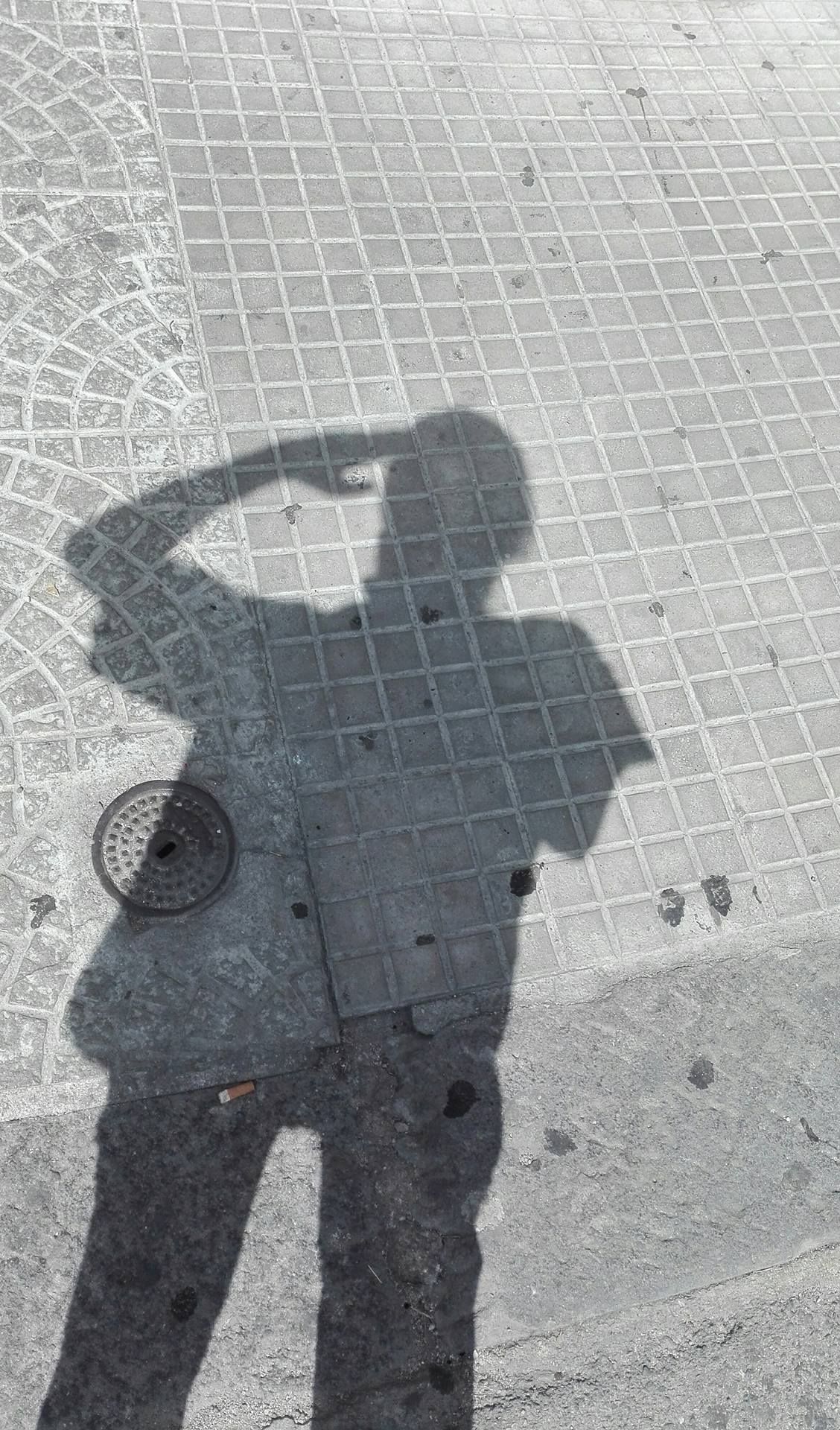
Future Selfie?
Antonio Corso aka CPT. IMPALER- modern Futurist painter and musician
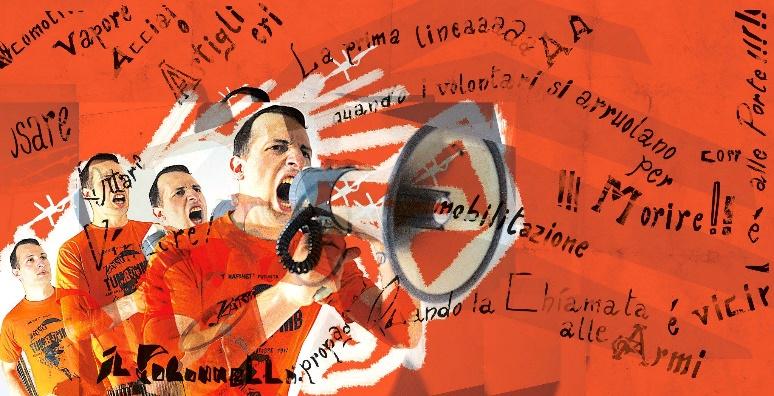
(BULLONI GRANATE BASTONI BOOKLET)
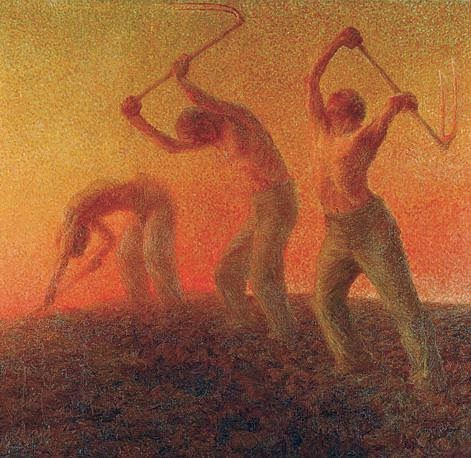
Original version by Giuseppe Cominetti
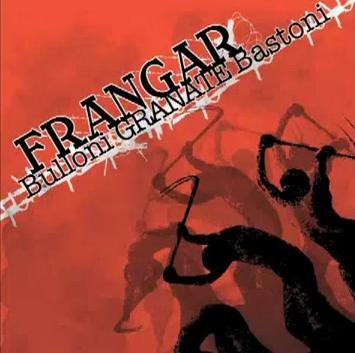
The same image revisited by Antonio Corso on a Frangar album cover
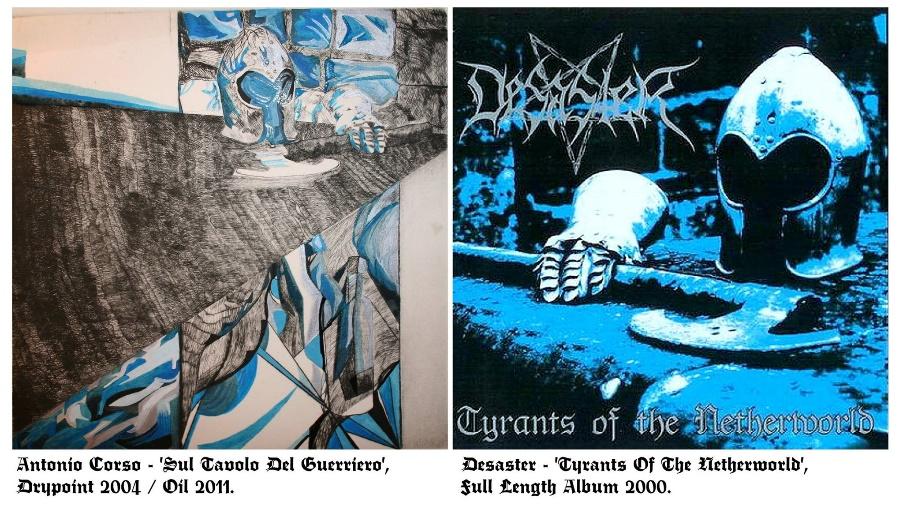
On The Warrior's Table by Antonio Corso and the Desaster album cover
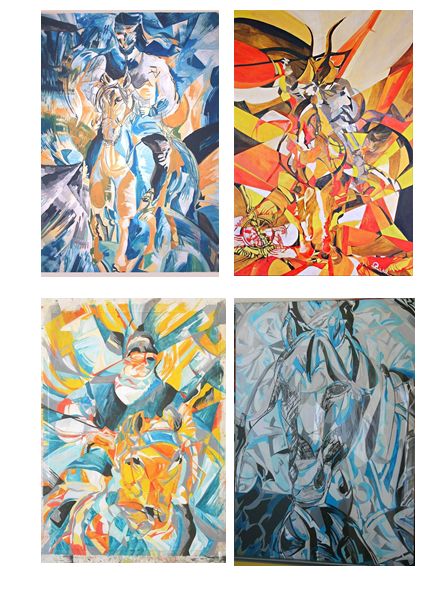
By Antonio Corso
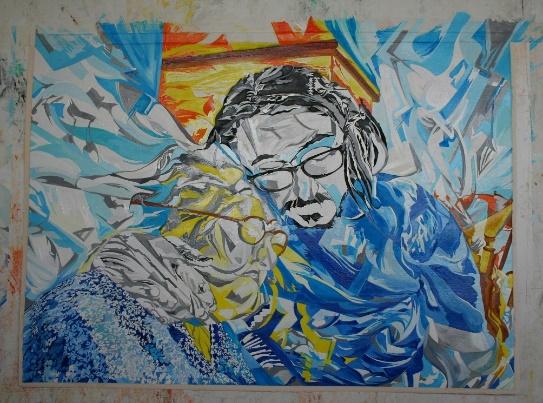
Geometrical portrait by Antonio Corso
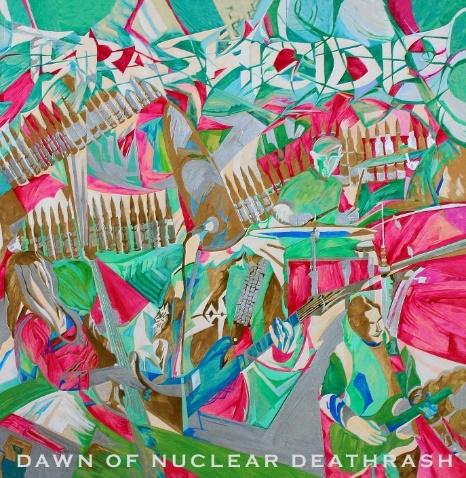
Album cover By Antonio Corso
צליינות בערה בתשוקה
צליינות בערה בתשוקה
רְשִׁימ֥וֹת־תֹּ֖הוּ | ראיון עם Andrew Oliver, האיש מאחורי הפרויקט Chaucerian Myth
08-8-17
כל מי שקצת מכיר Dungeon Synth, קרוב לוודאי שהאזין פעם ל-Chaucerian Myth - פרויקט של מוזיקאי מוכשר מצפון קרולינה העונה לשם Andrew Oliver, חובב מושבע של תרבות ימי הביניים וביתר שאת ליצירותיו של הסופר והמשורר Geoffrey Chaucer, מאבות הספרות האנגלית (מקור השם Chaucerian Myth).
אחת הדילמות הקשות שלי לגבי אמן זה היא מה האלבום האהוב עליי מבין יצירותיו. שלושתם ניכרים בקונספטים המוזיקליים הייחודיים שלהם, ובשילוב של תחכום טכני סוחף עם תשוקה מרגשת ואווירה מדהימה. מעבר לכך, ניכרת היטב גם השונות ביניהם למרות שתכליתם זהה: בכולם המוזיקה מבוססת על סיפורים שנכתבו בסוף ימי הביניים.
אחד האלבומים המוכרים בז'אנר, הוא אלבומו הראשון The Canterbury Tales שיצא ב-2016 ומיד התגלה כקלאסיקה. ביום חורפי מעורר השראה באותה העת, בעודי מעביר חולי קל, נתקלתי אף אני באלבום הזה והאזנתי לו: לכל 3 וחצי שעותיו. שם, נדמה לי, התאהבתי סופית ב-Dungeon Synth. האלבום, יצירה ניאו-קלאסית תזמורתית המשלבת פולק ימי ביניימי ומושפעת חזק מרוק מתקדם משנות ה-70, מבוססת על סיפורי קאנטנברי שהוא למעשה קובץ מעשיות מאת ג'ופרי צ'אוסר המתאר את עלילותיהן של קבוצת צליינים.
שני אלבומיו האחרים אף הם אינם קוטלי קנים: Troilus and Criseyde, שילוב חד של מוזיקת ימי ביניים עם ג'אז המתאר סיפור אהבה ביזרי ביותר בד בבד עם סיפור מלחמה אפי ודרמתי על רקע מלחמת טרויה (אף זה, מאת ג'ופרי צ'אוסר) והאלבום The Book of Margery Kempe, אלבומו האחרון והיותר אקספרימנטלי המושפע מהנויז והאזורים היותר אפלים בז'אנר. האלבום מבוסס על אוטו-ביוגרפיה של צליינית קדושה הסובלת מבעיות נפשיות ופיזיות עת הזיות שטניות מענות אותה בעת שמפיצה את טוב ליבה בארץ זרה.
Chaucerian Myth הוא פרויקט ה-Dungeon Synth האהוב עליי, ואנדרו עצמו הוא מוטיבציה גדולה. מדובר באמן הנאמן לתשוקותיו ונראה כי עוד נשמע ממנו בהמשך.
באמצע חודש נובמבר 2017, שוחחנו אנדרו ואנוכי על הכל כמעט: על עבודותיו, על ספרות, וכמובן על סצנת ה-Dungeon Synth. הנה הראיון כולו לפניכם.
א. קודם כל אני מודה לך על זמנך. איך היית מתאר Dungeon Synth מנקודת מבטך, למישהו שמעולם לא שמע עליו מעולם? ולפי זה, כיצד היית מתאר את העבודה שלך?
אין בעיה. אני תמיד מעריך את ההזדמנות להתראיין, ואת העובדה שאנשים עדיין מתעניינים במוזיקה שלי. מבחינת תיאור הז'אנר לאנשים שאינם מכירים אותו, זה תמיד נראה לי בעייתי במקצת מכיוון ש-Dungeon Synth הוא ז'אנר מאוד מגוון מבחינה מוזיקלית. יש כל כך הרבה סוגים עד שאינני יכול להתייחס אליו כאל מקשה אחת. בד"כ אני אומר שזה שילוב: אמביינט, ניאו-קלאסי, Drone, ובאופן כללי-Fantasy Synth. מבחינת המוזיקה שלי, אני חושב שהיא מייצגת בצורה טובה את המגוון הרחב שבז'אנר. אני מכוון לכך שהיא תביע את כל המנעד שיש לו להציע ואולי אפילו להתעלות מעליו, אם אני מסוגל לכך.
ב. הבה נדבר על האלבום המוכר ביותר שלך: תוכל לספר לנו על יצירת הספרות "עלילות קאנטרברי"? מה כ"כ מצא חן בעינייך ביצירה שגרם לך להקדיש את עצמך ליצירת האלבום המוכר, המורכב, והארוך שיצרת בהשראתה?
האלבום The Canterbury Tales הוא הפעם הראשונה בה הקלטתי מוזיקה ופרסמתי באופן פומבי. הייתי כותב ומלחין שירים שנים לפני כן, מטאל וג'אז בעיקר, אך היה זה מייאש דרך קבע למצוא נגנים שיקליטו איתי חומרים כאלה. עד שגיליתי מחדש את ה-Dungeon Synth, והוא שגרם לי להבין שמדובר במדיום המושלם עבורי לפרסם בו מוזיקה בכוחות עצמי. באותה העת גיליתי מחדש את "עלילות קאנטרברי" מאת ג'ופרי צ'אוסר שהוא הסופר האהוב עלי. זה היה כה מעורר השראה עד שהחלטתי להפוך את כל הסיפור לאלבום קונספט ולבסס את כל הפרויקט על עבודותיו ועל עבודות דומות לו. זהו אלבום מאוד מיוחד עבורי היות וחלק גדול ממני השתתף ביצירתו. הייתה זו מלאכת אהבה תזזיתית וקודחת לה הקדשתי שישה או שבעה שבועות בהם עבדתי כל יום, פעמים אף 8-10 שעות ברצף. אני נרגש שאנשים עדיין נהנים מהאלבום והגם שאינני סבור שהוא הטוב ביותר שיצרתי, או המורכב ביותר,הפופולריות שלו כלל לא טורדת אותי. אני אוהב אותו ותמיד ישמר לו מקום מיוחד בלבי.
כל פרט בעבודותיו של צ'אוסר מעוררות בי השראה. היכולת לקרוא את עלילות קנטרברי בשפה המקורית בה נכתב (אנגלית תיכונה) אין לה אח ורע: יופייה של השפה בה השתמש הוא נשגב עבורי ואני מוצא קריאה מלאת פלאים בשיריו המעוררים יצירתיות ותשוקה כל פעם שאני קורא אותם. וזה רק בנוגע לשפה בה הוא משתמש; תוכן המעשיות אף הוא מדהים. הוא מצייר דרך סיפוריו פורטרטים מדהימים של דמויות רבות ועלילותיהן, המייצגות פלגים שונים בחברה האנגלית בזמנו. הוא מעלה סוגיות הנוגעות ב[מה שניתן היום להתייחס אליו כ] דת מאורגנת, ממשלה, קומדיה, פמיניזם, ומעמד הפועלים, הכל תוך שמירה על טבעם השירי של עבודותיו. אני תמיד מתרגש כשאני חושב על כך, יש כר נרחב להשראה בעבודותיו אלו.
[יובל] נשמע כמו משהו ששווה לקרוא! דעתי היא שעל ספר להיקרא בשפתו המקורית ולקרוא יצירה בטקסט כ"כ ישן (אפשר לומר עתיק?) נשמע כמו חוויה מדהימה.
[אנדרו] בהחלט. ישנם כמה תרגומים לאנגלית מודרנית לזכותם של כמה מתרגמים מדהימים (שנעזרו כמובן בעובדה שיש די והותר דמיון בין אנגלית תיכונה לזו המודרנית), אך הקריאה בשפת המקור, כפי שאמרת, היא בהחלט הדבר האמתי.
ג. להרבה אנשים, Dungeon Synth זה בעיקר לקיחת הפסקה מענייני היום-יום ו"יציאה למסע פנימי ובטוח" - אסקפיזם. האלבום שלךThe Canterbury Tales עושה זאת בצורה מדהימה. האם היית מודע לכך בזמן שעבדת על האלבום?
זו שאלה קשה בשבילי מאחר ואני לא מעריץ גדול של "אסקפיזם" במובן הנוהג בז'אנר. אין לי בעיה שאחרים עושים את זה כמובן, אבל אני לא יכול לומר שזו היא עמדתי בעת שאני יוצר מוזיקה. אינני חווה מוזיקה כבריחה מהחוויות שלנו אלא אדרבה: העצמתם והכוונתם למקומות אחרים, שהרי ממילא אין בכוחנו לברוח מהחיים ומהמציאות. מסע פנימי ובטוח כפי שתיארת, אינו בריחה כלל לפי דעתי, אלא הזדמנות פילוסופית בה נוכל לבחון את המציאות באופן שונה דרך התבוננות פנימית.
המוזיקה שלי אינה בריחה בעבורי כי אם הבעת המציאות המושרשת במציאות, ולכן מושפעת מהסובב אותי. ובכל זאת, אני נושא 'מוזות' או פרשנויות גם מבלי הצורך להרגיש שעליי לברוח מן המציאות. אם אחרים מרגישים בדחף כזה איני מוצא בזה שום פגם; זו בהחלט דרך לצרוב זיכרונות גדולים וחוויות, ולהקנות יצירתיות גדולה אך אני לא נוהג כך.
ד. הבה נדבר על האלבוםThe Book of Margery Kempe: אחד הדברים האהובים עליי באלבום מלבד מקוריותו הוא העצמה שבה הוא מעביר סיפור של ממש דרך מוזיקה. הוא מכיל בתוכו מגוון מצבי רוח, ומאופיין בשימוש מקורי של נויז: הכל גורם לו להישמע באמת כמו מסע צליינות רוחני מלא בחוויות חולניות, גאולה, הרפתקאות ותחושות רבות נוספות בהקשר דומה. התוכל לחלוק עימנו מן הרעיונות המוזיקליים שהובילו אותך ביצירת האלבום המיוחד הזה? אולי לספר קצת על התפיסה האישית שלך את הסיפור עליו הוא מבוסס?
לעת עתה The Book of Margery Kempe הוא האלבום האהוב עלי מבין אלו שכבר פרסמתי, ומכמה טעמים:
ראשית - מבחינה מוזיקלית תמיד שאבתי השראה מאמני Dungeon Noise כמו Einhorn, Tyrannus ו-Ranseur, בין אחרים. זה זמן מה שרציתי לשלב נויז במוזיקה שלי אבל לא רציתי לכפות זאת היכן שאין זה מתאים; חפצתי שיימזג בהיגיון ושיהיה טבעי. כשהלחנתי את Deep Sickness, הרצועה הראשונה באלבום, זה בהחלט תיאר היטב את Margery בעת שנפלה לחולי נורא ואיבדה את שפיותה לאחר הולדת 14 ילדיה (מספיק כדי לשגע כל אחת, אני בטוח). מעבר לכך הושפעתי מהסאונד היותר קודר ונחוש בז'אנר כך שהשתמשתי ב-Soundfonts [1] במקום כלים ממוחשבים; רציתי להעביר חווית סאונד גולמית. גם הלחנים פחות מורכבים מהאלבום הקודם, Troilus and Criseyde, כך התאפשר לי להתמקד בפראזות חוזרות ובמלודיה מבלי לאבד את המורכבות שבתזמור עצמו.
מבחינה רגשית אני מאוד שקוע בסיפור של מארג'רי קאמפ. זה הספר האוטו-ביוגרפי הראשון שנכתב באנגלית והראשון שנכתב בידי אישה, כך שאנו מקבלים ממנו תובנות מעניינות מאוד לגבי חיי האנגלים בסוף ימי הביניים, במיוחד מאחר ומארג'רי לא נהנתה משפע בשום בחינה. מבחינה רגשית הסיפור הוא כה נהדר עבורי שזה לא ייאמן: מצאתי עצמי מעורב רגשית יותר ויותר עם כל קריאה נוספת של הספר במהלך ההכנות ליצירת האלבום. מארג'רי הייתה אישה קדושה. היא וויתרה על הכל כדי לעזור לחסרי כל בארץ זרה ונותרה לבדה בארץ שלא דוברת את שפתה. היא נאבקה דרך חזיונות נוראיים והזיות שייסרו אותה בייסורים נפשיים ופייסים. מלבד אותם מחוסרי כל, כולם נרתעו ממנה היכן שלא הגיעה. מדובר בדמות רוחנית במלא מובן המילה. כל מה שאני יכול לומר הוא שאני מאוד התחברתי למארג'רי בזמן שעבדתי על האלבום, והיא אישרה כל תו שאתה שומע.
[יובל] כל התיאור הזה גורם לי להבין מדוע בחרת ברעיונות האלה. בשמיעה חוזרת של האלבום, הכל מתחבר בצורה מאוד הגיונית.
[אנדרו] תודה. אני שמח שאתה חושב כך. זו בהחלט הייתה העבודה האישית ביותר שלי עד כה. הרגשתי בכנות כי עליי לעשות צדק לסיפור חייה של מארג'רי ורציתי לעשות זאת דרך המוזיקה.
[יובל] האם עסקת בנויז גם לפני הקלטת האלבום?
[אנדרו] מעט, רק כדי להרגיש נוח עם זה אך לא באופן משמעותי. תמיד נהניתי מנויז ונהניתי לעבוד איתו, כך שאני שמח שבסוף שיצא לי לשלב נויז ב-Chaucerian Myth.
ה. שניים מאלבומיך המתמקדים בצליינות. האם אתה מחשיב עצמך כאדם רוחני? האם שקלת פעם לבקר בירושלים, או באתרים קדושים באירופה?
אינני אדם רוחני במובן הרגיל של המילה. אני לא שייך לשום דת או אמונה רוחנית אבל אני מגלה שמוזיקה וחוויות דומות לה ממלאות בתוכי את המקום שהרוחניות ממלאת עבור אחרים. אני מאוד רוצה לבקר אתרי קדושה בכל העולם: ממכה לירושלים לקתדרלת קאנטרברי - לאו דווקא בגלל האמונות הקשורות באותם מקומות, יותר כדי לחלוק את החוויות הרוחניות שהן מפיצות. יהיה זה דבר יפה אפילו לזר. אני אוהב את הרעיון של הצליינות ומאמין שזה חשוב בין אם מבחינה רוחנית מסורתית ובין אם מבחינות אחרות.
ו. באלבום Troilus and Criseyde אתה משתמש בסגנון מעניין: מעין שילוב של ג'אז עם מוסיקת ימי הביניים, מאוגדים יחדיו לאלבום שהוא Dungeon Synth טהור. התוכל לחלוק עימנו כיצד הגעת לרעיון הזה ומדוע בחרת דווקא בשילוב הזה לספר את הסיפור של צ'אוסר שעליו האלבום מתבסס?
אם היה עליי לבחור אחד, ג'אז היה הז'אנר האהוב עליי. האזנתי המון לג'אז בזמן שעה שהלחנתי את Troilus and Criseyde. רציתי שזה יהיה אלבום שונה בצורה יוצאת דופן מ-The Canterbury Tales. מבחינת הקונספט, אני סבור שמוזיקת ג'אז דרך סינקופות, הרמוניות מסוחררות, וטבעו (הכאוטי לפרקים) מתאים לטבע הסיפור שבעצמו איננו יציב.
[יובל] אולי תוכל לספר לנו מעט על הסיפור כפי שאתה רואה אותו?
[אנדרו] הוא מעניין מאוד: בתחילה, לא היו טרוֹיִלוּס או קריִסֶייִד מעוניינים כלל זה בזו; ואולם משנורה על טרוילוס חיצו של קופידון, התאהב בקריסייד בהגזמה ובאובססיביות אף שעדיין לא הייתה מעוניינת בו. טרוילוס החל בטבעיות לנסות לכבוש את ליבה באמצעים מגוחכים להגזים, וקריסייד עלתה תוך כך על רעיון מבדר: שתשכב עימו בעת שבן דודו צופה בהם באותו החדר. בביזאריות זו צוחק צ'אוסר על האהבה האווילית בחצרות האצילים והאבירים של ימי הביניים. הסיפור הוא על רקע מלחמת טרויה. אנשים מתים, כולל מספר דמויות ראשיות. אלים ורוחות נקראים לעזרה ואף צ'אוסר עצמו הוא דמות. הסיפור מתאזן בדואליות שבין הצמדות משונה לקומדיה מגוחכת ושירה אפית ורצינית דוגמת הקלאסיקות של יוון העתיקה ורומא. מסיבה זו מדובר בספור מאוד מעניין שעורר בי השראה עזה.
ז. המוזיקה שלך מתמקדת בתרבות וספרות ימי ביניים, לרוב סיפורים מאת ג'ופרי צ'אוסר. האם שקלת פעם לשלב השפעות ספרותיות ותרבותיות אחרות? אולי תחת פרויקט נפרד?
ובכן, אני עובד על אלבום שמבוסס על "Goblin Market" מאת כריסטינה רוֹזֵטיִ. זו עבודה שהיא אחרי ימי הביניים, אם כי עדיין קדם-מודרנית והמתאימה לפרויקט מבחינה אסתטית כך שאני לא רואה צורך בפרויקט נוסף. עוד אין תכניות מוחלטות לקפוץ לפרויקט צד אבל חשבתי על זה קצת וייתכן שמתישהו בעתיד אעשה זאת, לכשיבשילו התנאים. ועם כל זאת כמה פרויקטים גדולים נמצאים כבר בדרכם החוצה העתידים להעמיק את מיתוס ה-Chaucerian Myth. אינני יכול לומר הרבה כעת אבל מעורבים כאן דברים גדולים יותר ממה שרגילים בו.
[יובל] טוב לשמוע, האלבומים שלך מאוד מגוונים מובחנים, תמיד מפתיעים מחדש עם הקונספטים המעניינים שלהם. נחמד שאתה נותן טיזר להפתעה הבאה שאתה מתכנן לנו!
[אנדרו] לגמרי! אני תמיד שואף ליצור אלבומים שונים במהותם ולאתגר את עצמי בגבולות חדשים. בינתיים, לא אזלו לי הדרכים לעשות זאת כך שצפה לעוד המון מוזיקה בקרוב!
ח. אני מכיר הרבה יוצרי Dungeon Synth שיצירותיהם מלוות בשירים וסיפורים המבוססים על עולמות שהם יצרו מפרי דמיונם. Erang [2], למשל, הוא מהמפורסמים ביניהם. האם שקלת פעם לעשות משהו דומה?
כפי שאמרתי, אינני יכול להרחיב כרגע אבל Chaucerian Myth עתיד לשלב בתוכו אלמנט של בניית עולם באופן שייאפשר לאלבומים קודמים ואמנים שהשפיעו על התהוותו להיכלל בו בטבעיות. אז אני מניח שאני יכול לענות לשאלתך ב'כן' :)
ט. תוכל לספר לנו על עברך כמוזיקאי והשפעותיך מהבלאק מטאל, Dungeon Synth, ובכלל?
בלאק מטאל היה חשוב מאוד להתפתחותי כמוזיקאי אולם בעת שהתחלתי ליצור Dungeon Synth התפתחתי מעבר לו. אני עדיין אוהב הרבה מוזיקה מהז'אנר, אבל אני לא ממש מאזין לו מלבד כמה אמנים בודדים. ההיחשפות הראשונה שלי ל-Dungeon Synth הוא האלבום Dauði Baldrs מאת Burzum, אותו שמעתי לפני המון זמן. מאוד נהינתי ממנו, אבל אני לא יכול לומר שממש הפנמתי אותו או ששאבתי ממנו השראה. מבחינת אמני Dungeon Synth שכן הושפעתי מהם זכורים לי כרגע: Lord Wolf, Lugburz, Jim Kirkwood, Lord Lovidicus ו-Taur Nu Fuin. הושפעתי מאוד מהאמנים אלו וכשהאזנתי להם שנים אחר כך, ידעתי שאני חייב ליצור מוזיקה כזו. בילדותי ובימי נעורי האזנתי בעיקר ללהקות כמו Celtic Frost, Electric Wizard, Anvil, Death, ואחרים, לפני שהתאהבתי ב-Rush, הלהקה האהובה עליי עד היום; כככלל - רוק מתקדם הוא ז'אנר שהשפיע רבות על עשייתי הנוכחית.
[יובל] באילו כלים אתה מנגן? שקלת פעם לנגן על כלים מסורתיים כגון לאוטה רנסנס? [3]
[אנדרו] אני מנגן בגיטרה, באס, תופים וקלידים, למרות שבאס זה הכלי שאני הכי טוב בו כרגע מאחר ועליו אני מתאמן הכי הרבה. מעניין אותי מאוד לנגן בכלי פולק מסורתיים וכנראה שגם אעשה זאת אם יהיה לי את הכסף לזה.
י. אחד הדברים שאני יותר מעריך באופי של ה-Dungeon Synth הוא שנראה שהז'אנר לא מאבד את עצמו לדעת. אני מאמין שככל שאנו מתבגרים קשה יותר לשמר את האותנטיות האישית, ולהלחם על להיות נאמן לתשוקותיך על פני ציפיותיה של החברה הסובבת, אולם ישנם הרבה אנשים שנשארים בסצנה גם לאחר שבגרו והפכו להורים. מעניינת אותי עמדתך בעניין.
אני בהחלט אוהב את זה. לי אין תכניות להביא ילדים (נקישה על העץ), אבל אני אוהב לראות הורים בסצנה כי אני מדמיין שהחוויה הזו משפיעה על המוזיקה לטובה. אחרי ככלות הכל, חוויות החיים הן שחשובות ביצירת מוזיקה. אני חש השראה תמידית מאווירת התשוקה האותנטית וההתעניינות בסצנה. כפי שאמרת, זה יכול להיות בעייתי להקדיש זמן למוזיקה כשלחברה תכניות אחרות עבורך אבל חשוב הסיפוק שלך כאמן מן היצירה שלך לאורך הזמן.
יא. היכן אתה רואה את סצנת ה-Dungeon Synth בעשור הבא? אילו שינויים אתה מצפה לראות, ואיך אתה חושב שתושפע מהם?
זו שאלה קשה. בכנות, אני לא בטוח. הז'אנר השתנה הרבה ואני לא בטוח לאן יפנה בעשור הבא. דבר אחד אני יכול לומר בביטחון כמעט מלא: אם כל שינוי יתבטא בכנות ולא יהיה שטחי אזי הוא לא ייכפה עלי או על אף אחד אחר בצורה מאולצת, לא ממקום ורצון אמתיים. אני דיי בטוח שאוכל להמשיך ולהתקדם מוזיקלית בדרכי שלי באין מפריע ושכל שינוי מהותי בסצנה ינבע מהאמנים עצמם ולא מבחוץ.
[יובל] אני תמיד מתרשם שהסצנה נוטה להיות פתוחה לאלמנטים חדשים והתנסויות. מהבחינה הזאת, אינני רואה שום שינוי זולת הגידול האינטנסיבי ודעתי מתהפכת בעניין זה.
[אנדרו] כן, אני חושב שאתה צודק. דיי בטוח שהסצנה רק הולכת וגדלה. באופן אישי אני לא חושב שזה דבר רע - זו אולי הדרך היחידה בה אוכל אי פעם להשיג דגני בוקר של Erang - ומרגש אותי לראות לאן נגיע עם זה. אני לא חושב שהז'אנר יהפך לנחלת הכלל אבל אני כן חושב שזה יהפוך אולי ל'פולחן' גדול יותר, דיי בוודאות.
יב. טיפים לאמני Dungeon Synth שאפתניים?
עצותיי הטובות ביותר הן: היו כנים מוזיקלית ולעולם אל תפסיקו ללמוד. עשו מה שעושה אתכם מאושרים. כמובן, שר הטבעות הוא פג תוקף כרגע, אבל אם זה הדבר היחיד עימו תוכל לשפוך את לבך ואת נשמתך, אז לך על זה. רעיונות נוספים יעקבו לבטח. ובכל זאת: אני חושב שהכרחי להמשיך להתחנך בתיאוריה מוזיקלית וגם בחיפוש המתמיד אחר חוויות חדשות להעצמת המוזיקה. תמיד להמשיך לגדול!
יג. הרבה אמני Dungeon Synth מעדיפים להישאר אנונימיים ברמה כזו או אחרת. אתה לעומתם, מצלם סרטונים של עצמך מדבר ומניח קישורים לפרופיל הפייסבוק הפרטי שלך. היש סיבה לזה? מה דעתך על החלטותיהם של אמנים אחרים והעדפתם להיוותר אנונימיים?
אם אמנים אחרים מעדיפים להיות אנונימיים זה בסדר גמור, ואני רואה הרבה סיבות טובות לעשות זאת - זה מוסיף ערך מיסטי וקסם. במקרה שלי, אני לא רואה סיבה להיות אנונימי. לפני שהתחלתי לעשות Dungeon Synth הסצנה לא הייתה כ"כ גדולה כמו היום (סביב שנת 2010 וקצת מוקדם יותר), וחשבתי שיהיה מעניין להיות באינטראקציה עם אמנים נוספים. עכשיו כשהסצנה גדלה ולכולנו ההזדמנויות שלנו, אני מניח שאני פשוט מעדיף להישאר אני.
יד. תודה לך שהתראיינת אנדרו! מילים אחרונות לקוראים?
אני מבקש להודות לך על הריאיון! זו הייתה הזדמנות נפלאה. אני גם רוצה להודות לכל מי שקורא את זה ולאלה שעדיין מתעניינים במוזיקה שלי. זה מחמיא מאוד לראות שאנשים עדיין מפיקים הנאה מיצירותיי. מעולם לא ציפיתי שכך יהיה אי אז כשפרסמתי את אלבומי הראשון. תודה לכולם, ויהיו עוד הרבה חומרים מ-Chaucerian Myth!
[1] בניגוד לתוכנות כלים וירטואלים, "Soundfonts" הם דגימות זולות ופשוטות של כל מיני כלים וצלילים.
[2] האמן - Erang (קישור לבנדקאמפ), אולי המוכר ביותר בז'אנר.
[3] לאוטה רנסנס התפתחה מהעוד שהגיע לאירופה מתורכיה, והייתה פופולרית מאוד בתקופת הרנסנס

להמחיז את ג'ופרי צ'אוסר בצלילים
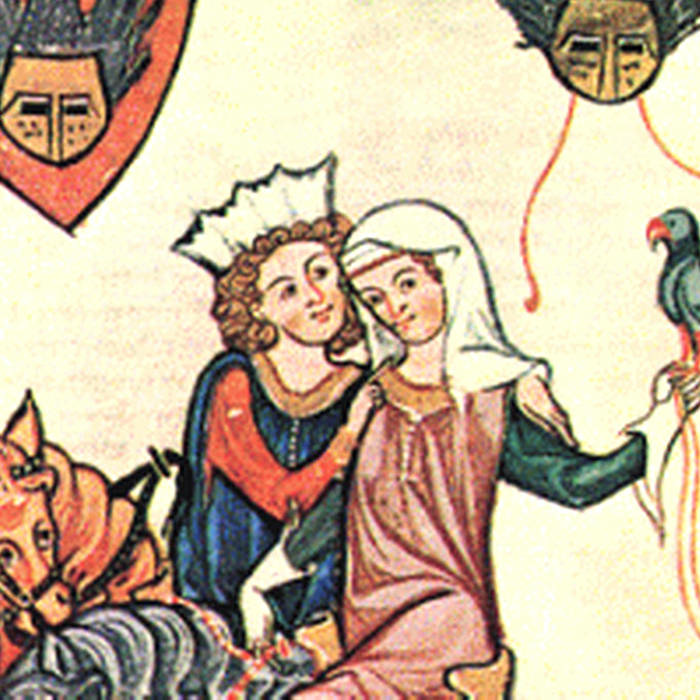
אמנון ותמר של ימי הביניים?
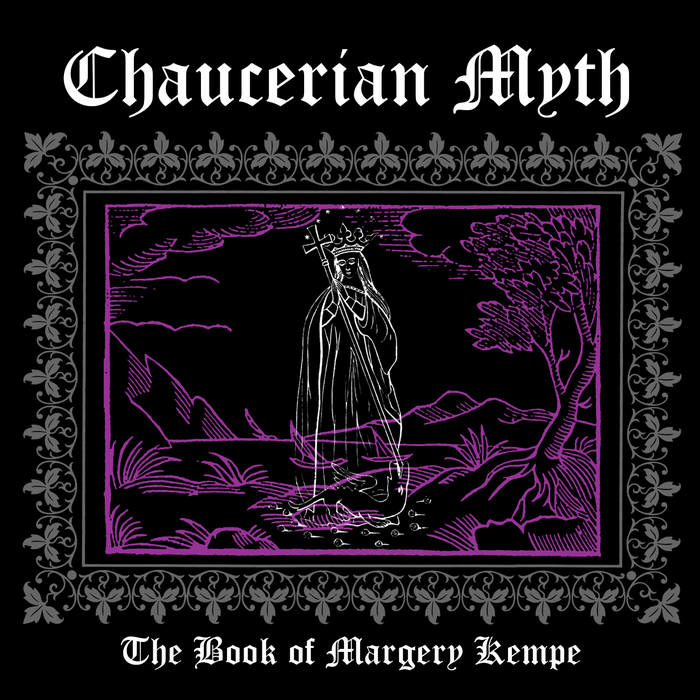
מסעותיה של מארג'ורי השפיעו מאוד על היצירה של אנדרו.
Pilgrimage Burnt with Passion
Pilgrimage Burnt with Passion (English)
רְשִׁימ֥וֹת־תֹּ֖הוּ | An Interview with Andrew Oliver (Chaucerian Myth)
By: Yuval Levi
1-22-18
Anyone who is familiar with Dungeon Synth has probably listened to Chaucerian Myth, a talented musician from North Carolina named Andrew Oliver, an avid enthusiast of medieval culture, and especially to the works of writer and poet Geoffrey Chaucer, one of the forefathers of the English literature (& the origin of the name Chaucerian Myth).
One of my most difficult dilemmas regarding Chaucerian Myth was deciding my favorite album out of his works. All three are evident in their unique musical concepts, combining delightful technical sophistication with exciting passion and an amazing atmosphere. Beyond that, the diversity between the albums is very prominent, although they all share a similar modus operandi: musically, they are all built upon stories written in the late Middle Ages (14th-15th century).
One of the genres' best-known albums in CM's first album, “The Canterbury Tales”, released in 2016, almost immediately recognized as a classic. One inspiring winter day, while I was still ill, I came across this album and decided to listen to it: all three and a half hours of it. It was right there that I think I finally fell in love with Dungeon Synth. The album, a neo-classical orchestral work that combines medieval folk and strongly influenced by 70s progressive rock, is based on “The Canterbury Tales”, a Geoffrey Chaucer's tales collection telling the stories of pilgrims in the middle ages.
His other two albums are also great: Troilus and Criseyde, a sharp fusion of medieval music with jazz, describes a bizarre love story as well as an epic and dramatic Trojan War tale (yet again – by G.C ) And the album The Book of Margery Kempe, his latest and most experimental album influenced by Noise and the darker areas of the Dungeon Synth genre. The album is based on an autobiography of a saintly pilgrim suffering a mental and physical situation while demonic visions torment her as she spreads her kindness in a foreign country.
Chaucerian Myth is my favorite Dungeon Synth project, and Andrew himself is a source of motivation. An artist faithful to his desires, one we will probably hear from him in the future.
In mid-November of 2017, Andrew and I talked about almost everything: his works, literature, and of course the Dungeon Synth scene. Here's the entire interview before you.
I. First of all I thank you for your time. How would you describe Dungeon Synth from your point of view to someone who has never heard of such a thing before? According to that, how would you describe your work?
No problem. I always appreciate the opportunity to be interviewed, and that people are still interested in my music. In describing Dungeon Synth to people who are unfamiliar, I always find it a little difficult because the genre is so musically diverse now. There are so many different kinds of Dungeon Synth, so I never really can pin it down as one thing. I usually say that it's a combination of things: ambient, neo-classical, drone, and general "Fantasy Synth." As far as my own music, I think it represents the diversity of the genre pretty well. I like my music to be expressed with sounds all across the genre, and even to transcend the genre itself if I can.
II. Let's talk about your best known album: Can you tell us about the literary work "The Canterbury Tales"? What did you like about the work that made you dedicate yourself into creating your familiar, complex and long album inspired from the work by Geoffery Chaucer?
The Canterbury Tales was the first music that I had ever recorded and released publicly. I had been writing and composing music for a few years prior to that, mostly Metal and Jazz music, but I was always discouraged by the difficulties of finding musicians and recording these kinds of music. Then, I was reintroduced to Dungeon Synth, and it made me realize that this was a perfect medium to actually release some music of my own. Around this time, I had also just re-read The Canterbury Tales by Geoffrey Chaucer, who is my favorite author. It was so inspiring that I decided to turn it into a grand concept album, and have my whole Dungeon Synth project rooted in his work, and the works of others like him. It's a very special album for me because it was my first, and because I poured so much of myself into it. It was a frantic and feverish labor of love which I worked on for about 6 or 7 weeks, working every single day, sometimes for 8 or 10 hours straight. I'm very happy that people still enjoy the album, and while I don't think it's my best or most complex album, I am not bothered at all by the fact that it's my most popular. I love it, and it will always hold a special place in my heart.
Everything about Chaucer's work is inspiring to me. Being able to read The Canterbury Tales in the original Middle English language is like nothing else in the world: the beauty of the language he uses is transcendent for me, and I find the poetry to be gorgeous to read, invoking creativity and passion whenever I read it. And that's just the language he uses; the actual content of The Tales is also amazing. He paints an amazing portrait of many different characters and their tales which represent so many different factions of English society at the time. He speaks on matters of [referred today as] organized religion, government, comedy, feminism, and the working class, all in ways that retain the high poetic nature of his work. I always get excited just thinking about it. There really is so much to be inspired by.
[Yuval] Sounds like something people should read! I believe that a book needs be read in its original language, and reading something in such an old (perhaps even ancient?) language sounds like an amazing experience.
[Andrew] It really is. There are a few very good modern English translations, to the credit of some really amazing translators (helped, of course by the fact that Middle and Modern English do share plenty of similarities), but reading it in the original language, as you said, really is the best way.
III. For many people, Dungeon Synth is mostly about taking a break from matters of “ordinary reality” and going out on a safe, inner journey - escapism. Your album, “The Canterbury Tales” does that in a truly amazing way. Were you aware of that while working on the album?
That's a really tough one for me, since I'm actually not really a big fan of "escapism" in the way it's usually used and talked about in the genre. I don't have a problem with other people doing so, of course, but I can't say that was on my mind while creating my music at all. I don't see music of any kind as a way to escape our experiences, but rather to amplify and modify them, since it really is impossible to escape life and reality, anyway. A safe inner journey, as you described it, is not really an escape from reality at all, in my opinion, but a philosophical and introspective opportunity in which one can examine reality differently.
My music isn't an escape for me as much as it's just another aspect of reality, grounded in reality, and therefore affected by the reality around me. I'm still just as much a subject to the powers of various 'muses' or inspirations without having to feel like I need to escape from reality. If others feel that urge, I don't think there's anything wrong with that, and surely it can make for very memorable experiences and great creativity on their part, but it's just not something I do.
IV. Let's talk about "The Book of Margery Kempe". Beside its originality, one of my favorite things about this album is its power to tell a story through music. It has many changing moods and features a creative usage of Noise, which makes it sound like a true spiritual pilgrimage, full of morbid experiences: Salvation, Adventures and many other elements that surround the concept. Can you share the musical ideas that led you to create this special album? Can you perhaps tell us a little bit more about your personal perspective on the story?
As of now, The Book of Margery Kempe is my favorite album that I've released for a few different reasons. Musically, I was really inspired by Dungeon Noise music by artists like Einhorn, Tyrannus and Ranseur, among others. For a while I had been looking for a way to integrate Noise into my music but I didn't want to force it. I wanted it to make sense and be natural. When I composed "Deep Sickness," the first track on the album, it really felt right as it details Margery's falling into illness and insanity after the births of her 14 children (enough to make anyone insane, I'm sure). I was also more inspired by more gritty sounds in general, hence why I used soundfonts rather than some more clean VST sounds to create the album. I wanted it to be a raw experience. I also made it less complex than Troilus and Criseyde, focusing, instead, on hooks and melodies without abandoning some of the complexity in orchestration. Emotionally, I'm very invested in the story of Margery Kempe. Her book is the first autobiography written in the English language, and the first book written by a woman so it gives us some very interesting insights into Middle English life, especially since she wasn't wealthy by any means. From an emotional standpoint, the story is incredible to me and I found myself becoming more emotionally immersed as I continued to read and re-read the book for the creation of this album. Margery was a holy woman who gave up everything she had to help the poor in foreign lands, leaving herself stranded in a country that didn't speak her language. She struggled through horrible visions and hallucinations which caused her physical and mental anguish. She was shunned by all but the poor wherever she went and she was a true spiritual figure in every sense of the word. All I can say is that I felt very connected to Margery during the making of this album and she informed every note that you hear when listening to it.
[Yuval] Your description makes me understand why you chose these musical ideas. Upon hearing the album again, everything connects very well.
[Andrew] Thank you. I'm glad you think so. It was definitely my most personal work to date. I really felt like I needed to do justice to Margery's life story and wanted to do so thoroughly through music.
[Yuval] Have you ever experimented with Noise before composing The Book of Margery Kempe?
[Andrew] A little bit, enough to be comfortable with it, but nothing too significant. I've always enjoyed it and have enjoyed working with it so I'm glad I finally got to use it in my work with Chaucerian Myth.
V. You have two albums conceptualized around pilgrimage. Are you a spiritual person? Have you ever thought of visiting Jerusalem or holy sites in Europe?
I am not a spiritual person in any usual sense of the word. I don't ascribe to any religion or spiritual beliefs, but I find that music and other such experiences fulfill what spirituality does for others. I would love to visit holy places all over the world, from Mecca to Jerusalem to the Canterbury Cathedral, not because I subscribe to any of the spiritual beliefs associated with those places but because being able to share in those spiritual experiences, even as an outsider, would be a very beautiful thing. I like the idea of pilgrimage, and I think it's important, whether one is traditionally spiritual or not.
VI. In your album “Troilus and Criseyde” you present an interesting concept: a combination of Jazz music with medieval music, all incorporated into a piece of pure Dungeon Synth. Can you tell us how this idea came to mind? Why did you choose to combine this artistic idea with this tale by Geoffrey Chaucer?
Jazz is my favorite genre of music, if I have to choose just one, and I had been listening to a lot of it as I was composing Troilus and Criseyde. I also wanted to make it different than The Canterbury Tales in a significant way. Thematically speaking, I also think that jazz music, in its syncopated rhythms, dizzying harmonies and occasionally chaotic nature, lent itself to the unstable nature of the story itself.
[Yuval] Perhaps you can tell us a little bit about your personal perspective of the story?
[Andrew] It's very interesting. At first, neither Troilus nor Criseyde are interested in one another. Then, Troilus gets shot by Cupid's arrow and is ridiculously and obsessively in love with Criseyde, who still has no interest in him. Naturally he tries to win her over through some truly ridiculous means and she eventually entertains the idea of having sex with him while his cousin watches in the same room. It's a really bizarre story in which Chaucer makes fun of the Courtly Love and Chivalry which were so prevalent in the Middle Ages, and often very silly. At the same time it is set to the back drop of the Trojan War. People die, including some main characters. There are gods and spirits invoked and Chaucer himself is a character in the story. It balances a weird juxtaposition of comedic silliness and serious, epic poetry the likes of the Greek and Roman classics. For this reason it's a very interesting read and was very inspiring to me as a narrative.
VII. Your music is pretty much exclusively focused around medieval culture and literature, mostly around the works of Geoffrey Chaucer. Have you ever thought about incorporating other cultural and literary influences in your work? Perhaps under a different project?
Well, I have an album in the works based on Goblin Market by Christina Rossetti. This is a work from after the Medieval era, but it's still pre-modern and fits the aesthetic very well, so I see no need to make it another project. There aren't any concrete plans to branch off into side projects yet but I have given it some thought and it might happen at some point in the future when the time is right. That being said, there are some very big projects coming up that will expand the Chaucerian Myth mythos greatly. I can't say much right now, but there is a bigger story here than one might think.
[Yuval] This is good to hear, your albums are very diverse and are always surprising with their interesting musical concepts. It is nice that you give us a teaser to the next surprise you're planning for us!
[Andrew] Definitely! I always strive to make my albums different, to challenge myself by doing new things. So far, I haven't run out of ways to do that, so you can expect plenty more music in the future!
VIII. I know that many Dungeon Synth projects are accompanied by poems and stories based on the lore of the artist's own imaginary world. Erang for example is the famous one among them. Have you ever considered doing something similar?
Like I said, I can't say much right now but part of the future of this project will have to do with world building in way that the previous Chaucerian Myth releases, and the authors from whom they were inspired, will all fit and make sense.
So, I guess I can answer 'yes' to your question (smiles).
IX. Can you tell us about your musical past and the artistic influences that you've drawn from Black Metal, Dungeon Synth and other styles of music?
Black Metal was very important to my musical past but by the time I started making Dungeon Synth I had mostly outgrown it. I still like a lot of music from the genre but I don't really listen to it that much anymore, and it doesn't influence me very much, with the exception of a few artists. My first exposure to Dungeon Synth was (Burzums') Dauði Baldrs, which I heard a long, long time ago. I enjoyed it a lot but I can't say I really internalized it nor did it inspire my music very much. In terms of other earlier Dungeon Synth inspirations I remember listening to Lord Wolf, Lugburz, Jim Kirkwood, Lord Lovidicus and Taur Nu Fuin from what I can remember off the top of my head. I was greatly inspired by these artists, and upon revisiting them a few years later, I knew I had to make this music myself. As for my adolescence and childhood, I mostly listened to Metal bands like Celtic Frost, Electric Wizard, Anvil, Death and others before falling in love with Rush, still my favorite band, and progressive rock in general – all of which have influenced my music today.
[Yuval] What Instruments do you play? Have you ever considered learning to play on traditional instruments such as the Renaissance Lute?
[Andrew] I play guitar, bass, drums, and keyboards, though the bass guitar is the instrument I'm best at right now since it's the one I'm practicing the most. I would absolutely love to play traditional folk instruments and I'll probably end up doing so eventually if I ever have the money to spare.
X. One of the things that I really appreciate about Dungeon Synth is that it never seems to lose its faith and honesty toward its own identity. As we grow up I believe it is difficult to maintain this authenticity and fight to stay true to your passions in spite of inhibitions imposed by society, but there are people who managed to stay in the Dungeon Synth scene even after they became parents. I'm curious to hear your opinion on the matter.
I absolutely love it. I don't really have any plans on having kids myself (knock on wood), but I love to see parents in the scene because I imagine that the experience of being a parent affects the musical experience nicely. Life experience is important in making music, after all. I'm constantly inspired by the sense of genuine passion and interest in the scene. Like you said, it can be difficult to devote time to music when society has other plans but it's important to devote one's time to artistic pursuits and to see it done in a niche.
XI. Where do you envision the Dungeon Synth scene for the upcoming decade? What kinds of changes are you expecting to see and how do you think you will be affected by them?
That's a tough one. I'm honestly not sure. The genre has changed a lot during its existence, and I'm not really certain about where it'll go next. However, I can say one thing with near certainty: whatever changes may happen they will be expressed genuinely and not superficially and as such, they will not force myself, nor anyone else, to change or conform to them unless they desire it. I feel comfortable saying that I will be able to continue to progress musically in the scene in my own way without interference and that any significant changes in the scene will most likely be a result of other artists doing the same.
[Yuval] I have the impression that scene is open minded and tend to welcome new ideas and experimenting. In this case I don't see any changes; the only big change I see is its intensive growth. I tend to change opinions on this matter quite a lot.
[Andrew] Yeah, I think you might be right. I certainly think the scene is only going to keep growing. Personally, I don't think it's a bad thing - it's the only way I'll ever be able to get Erang cereal - and I'm pretty excited to see where it's going to lead the genre to. I don't think it's ever going to get big to the point in which it's a household name but I do think it will become a larger cult phenomenon, for sure.
XII. Any tips for aspiring Dungeon Synth artists?
My biggest tips would be: to be musically honest and to never stop learning. Do what makes you happy. Sure, Lord of the Rings is outdated at this point but if that's the only thing you can really pour your heart and soul into at this moment, go for it. Other ideas will come later. That being said, I think it's also important to keep educating ourselves musically, both in a theoretical sense and in terms of seeking out new experiences which enhance our music. Always keep growing!
XIII. A lot of Dungeon Synth artists prefer to maintain a certain level of anonymity. You however, don’t mind shooting videos of yourself talking or putting up links to your personal Facebook profile. Is there any reason for that? What do you think of other artists' decision to maintain their anonymity?
If other artists choose to be anonymous, that's fine, and I see plenty of cool reasons to do so - it does add a certain mystique that can be alluring. As for me I see no reason to be anonymous. Before I started making my own Dungeon Synth music Dungeon Synth wasn't all that big (we're talking around 2010 and a little earlier) and I always thought it would be cool to interact with more of the musicians. Now, the scene has grown, and we all have that opportunity now so I just like to be myself, I suppose.
XIV. Thank you very much for interviewing Andrew! Closing words to our readers?
I would just like to thank you for the interview! It was a wonderful opportunity. I would also like to thank those who read this, and those who still listen to my music today. It humbles me greatly to see that people still get enjoyment from what I make. I never expected this to happen when I released my first album. Thank you all and there will be much more to come from Chaucerian Myth!
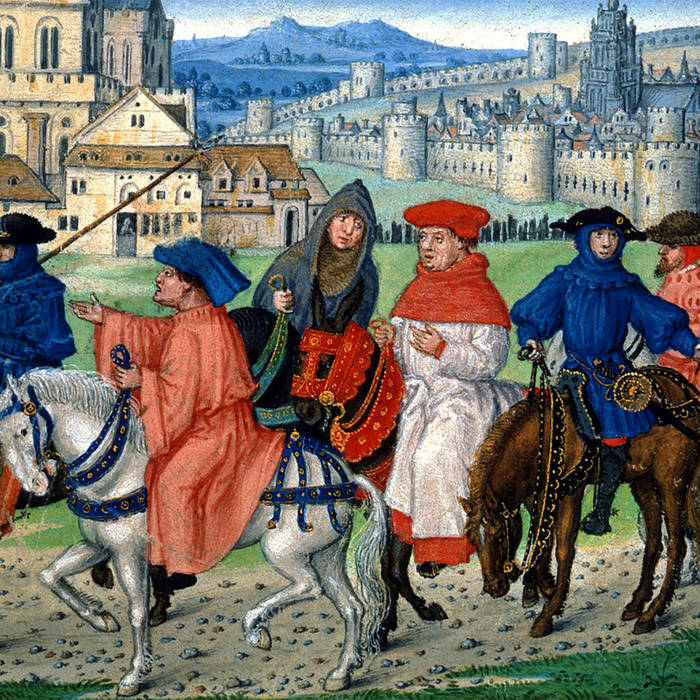
To dramatize Geoffrey Chaucer through sounds

Middle Ages' Amnon and Tamar?

Margery Kempes travels greatly influenced Andrew's work
Tales from The Frontier – Part 1
Tales from The Frontier – Part 1 >English
רְשִׁימ֥וֹת־תֹּ֖הוּ | An Interview with Diego Matejka >ATMF Records
By: Noa Artzi
10-5-18
Intro
A couple of months ago I revisited north Italy which, since my last visit in 2017 became a place of fond memories. During my visit, I had the pleasure to attend a local Black Metal evening featuring Veneto’s virtuosos NOVA, the works of which I have briefly reviewed in the first printed edition of our magazine. Knowing I will attend this gig, I packed two copies of the latter publication as gifts – one for a dear friend from the local scene and the other, for a prominent local figure I have mentioned in an article featured in that edition. I had doubts whether I’ll meet him there and therefore planned to deliver it through a friend.
I was informed about his attendance upon my arrival to the venue, shortly after which I was introduced to the man himself. Diego Matejka, founder and mind behind ATMF records, Frontiera dell’Essere and Absentia Lunae among others, appeared as a polite, smartly dressed man in a black button-up shirt and leather coat. He was accompanied by another creative mind behind Absentia Lunae, the talented multi-instrumentalist Climaxia, which appeared as a radiant, pink haired lady. I did not have the chance to talk much with the latter, but the conversation I had with Diego left me with an appetite for more. I was curious to know more about his ideas, broadcasted to the world through multiple channels, his sources of inspiration and his perspective on the state of our art, as well as the controversies and adversities faced by our scene, some of which also affected his very own label, ATMF.
I’ve had the chance to talk to quite a few musicians, but in terms of interest, the conversation presented below can easily be mentioned among the best. I am proud and excited to present these intelligent, inspiring words to our readers. I deem it won’t be much of an exaggeration to say that he represents the best of the best among us, who keep the flames burning even through the longest of nights.
*
ATMF
Label activities and vision
1. As you’ve also highlighted in your website, you’re “more than a label”. I understand ATMF stands for “Aeternitas Tenebrarum Musicae Fundamentum”. In other words, you’re somewhat of an artistic foundation. Can you describe the nature of this foundation? What are the causes it aims to serve? What is your vision as ATMF?
The foundation is a community of people that in different ways and forms gave birth, support and help to the prosperity of this mission.
When you make such a significant choice in your life you’re not simply doing a job or a hobby. When I started ATMF magazine I was ending my high school experience and getting into History studies. At that time my understanding of myself and the outer world was getting stronger, day after day.
With personal evolution and full consciousness of my inner self came grief because you feel yourself so much detached from the rest of the human beings. This gives you grief, but also a motivation to fulfill and manifest your difference. For this purpose, Black Metal is no doubt a very natural channel of expression, or at least it was my natural vocation. I felt a calling and BM was something really intriguing: it showed a juvenile strength but also a dark consciousness of strengths wider than the human being.
The dark community was too much connected to the emotional/social/sentimental and let’s say it was too much freaky for my attitude.
Today Black Metal is a musical genre like many others. Once you get so much detached from the manners and references of the people around you something strange happens: you can become an isolated and self-destructive essence or you can try to build something from the ashes. This is where ATMF started, first as a webzine, to investigate all aspects and motivations of the artists I loved, in its second stage as a mail-order and later as a musical label. Some interviews got me so much into the elitist concept, like the one with Dødheimsgard, for example, I remember others as being a bit disappointing, but they simply motivated me to create something more conscious.
Once I started the label, former Absentia Lunae bass player Michele also got into the project and we cooperated for many years. Right now, he’s not part of the organization anymore but he’s still helping the organization.
But we also have a street team of people that we deeply respect and trust, so that we consider them as our representatives on various territories that promote our concept and releases around the world. This is a foundation of spirits that are eager to work together and make this story grow throughout the years.
And, how could I have forgotten Francesco Gemelli, who shaped a lot of key artwork in the past and present history of our label, even in dark times on a friendly basis? I must say thanks to all of them. I’m just a representative of a dream called ATMF. At the time of foundation, I remember my dream was to take the legacy of labels like Misanthropy Records & Moonfog rec even further.
2. I understand Frontiera Dell'Essesre serves as your foundation’s cultural outlet. Can you tell us some more about this organization and its activities?
Frontiera dell’Essere is the Evolution of ATMF. The dream we were breeding at the time we changed our logo & name was very ambitious. I must be honest that this new project is something we still have to investigate and develop.
We started with the IANVA concert[1] at the Vittoriale Degli Italiani, a magical experience where we made this dream come true for the band and the fans, like us. That was an experience that will stay within our memory for our entire life. Frontiera dell’Essere (“The Frontier of the Being”) is an evolution of the Black Metal concept. In spite of being just a manifestation of our local roots or of the Black Metal tradition, we’re seeking for different venues and forms of expression other than the usual CD production.
ATMF also created the sublabels “De Tenebrarum Pricnipio” and “A Sad Sadness Song”. The Frontier is part of it. SSS investigated new forms of communication, taking the post metal waves into our stream of consciousness.
I must say that the connection with post metal is still a hard challenge, because sometimes we see too much distance between some of the political involvements and ideological confusion in this genre. BM before this contamination was an easier environment for us. We think this world has still some incredible intuitions but is taking back the beasts in the cage, an urban cage where every form of weakness is accepted. Therefore, in this point we still have to make some consideration about who deserves to be part of it and which cooperation we may end on a friendly basis.
3. I would like to hear more about "PRIMO VERE DEGLI ITALIANI" - the live IANVA performance you’ve mentioned. This specific event immediately caught my eye after a highly memorable visit to the Vittoriale Degli Italiani during my last trip to north Italy.
What was the importance of the location, in relation to IANVA’s music and the Frontiera’s vision? How did the evening go?
At the time when there was maximum hype around the Black Metal phenomenon there was still a lot of room for experimenting in the Ambient/Noise & Dark Folk field. In this regard Black Metal was a far more open minded musical genre. Therefore, we always messed with Cold Meat Industry and the Arditi/Triari/Death in June/Der Blutarsch stuff. IANVA was simply an amazing discovery for us, something the Italian scene should be proud of. After we listened to “Disobbedisco” it was natural for us to make some mad plans on having it performed in the very best place for such a lyrical concept.
D’Annunzio has the poetical aesthetic transcendence and a long-standing connection to our classic background. We believe it’s an example of how human beings should try to get rid of the jail of normality. Today you can be “everything” but ultimately you have to be nothing. On a more mature philosophical approach this can be true, but the basic assumption of the relativist culture “pensiero debole” (“weak thought” -Edit) draws to completely different assumptions and perspectives. We manifest our spite upon that miserable philosophical conclusion.
4. Your annual ATMF fest: I can imagine it's not "just another music festival". What distinguishes it from other European music festivals? What is its objective?
I don’t want to sound arrogant in any way, but I deem it’s a hard duty to figure out a way to organize a festival, so most of the choices we made were based on opportunity.
Of course, because we can’t and we don’t want to compete with the big festivals, we simply followed our own way. We invite most of our bands to play because they obviously represent the spirit of our label and the way in which we deem that we can contribute to a genre that involved our life in such a deep way.
The idea to make it an open air is soon to be explained. I was used to the usual concerts, and my will was to find a place within the mountains, in a wild and pure environment where I could make the small community meet and share the awareness outside the usual setting. Big festivals loose the atmosphere of being “open” and easily get overcrowded. A small fest is something that you can feel as yours, more than anything else.
Label releases
5. I would like to hear some background on your collaboration with NOVA. How did you get to work together?
I do recall you mentioning a strong coherence between NOVA’s music and your vision. What are the elements in their music that contribute to this coherence?
NOVA contacted us many years ago as fans of our label. They understood ATMF wasn’t just some people releasing music but mostly a front of opposition against the relativism of today’s hippy-hipster-music junk boxes that pollute what remains of the Black Metal scene.
Absentia Lunae is the art which represents this statement, as is Disiplin, so everyone who’s been in the scene for a while is well aware of what it means to be part of our roster.
After I got the chance to hear the material of the debut album, “Il Ritorno” with the attention it deserves I was immediately aware of the fact that both musically and later on conceptually the band came to the right place when proposing their art to us.
You can hear the anger and the fury, but also a glimpse of purity hidden between the lines in this masterpiece. In some ways it reminded me a bit to Spite Extreme Wing’s Kosmokrator and you know how this album has positively affected the Italian Scene.
But together with these references, I perceived the potential in their songwriting, already a solid and mature one for a debut. This is the kind of Black Metal that drives me mad, fury made with purity, nature goes to nature, blood for blood - everything shows and proves the ultimate truth in the end.
6. Another memorable project operating under the banner of ATMF, to which you’ve also introduced me during our meeting, is the mysterious Digir Gidim. A few words about them for our readers?
Digir Gidim is tightly linked to your interest in proto-Iranian\Mesopotamian culture and spirituality. What are the concepts belonging to that field which serve as artistic\intellectual inspiration for your work?
I think the discovery of this band was something crushing, as there weren’t many other projects that managed to move me recently. Everything was born with our Titaan[2] debut, which is also linked to the Mesopotamian cultural references.
What really impresses me about this project is the way in which, thorough a strong symbolic reference and links to the ancient tradition, the focus is placed on a yearning to the supreme will.
You do move from a strong reference and roots to gain a superior consciousness and knowledge of the essence of this tradition. Moving from the mask of appearance of this modern world to a mask of consciousness, where the supreme will breeds.
It’s pretty common in spiritual disciplines to detach from your corporal subjection to the fake expression of social belonging, even of the cultural heritage. Once transcended to the outer space, moving out of the social distortion you make the first steps in getting a superior consciousness. Tradition & heritage is key, not the superior awareness.
7. Any other memorable ATMF releases? What was their significance?
Undoubtedly VISTHIA – IN AETERNUM DELETI & FORGOTTEN WOODS – RACE OF CAIN.
Visthia’s comeback is one of the most innovative and daring merging of white noise, ambient & industrial music with a dramatically Ossianic Black Metal. This is worth a check for the most selective and ambitious fanbase. There’s something unique and personal about this album. Visthia released their debut via Solistitium Records (Horna, Perished & many others) moving from a form of epic Black Metal to an ambitious merging of metal & extra-metal influences. Once you listen to “In Aeternum Deleti” you can perceive the fragmented & defragmented pieces of tradition moving and taking form in your mind.
Forgotten Woods is the most provocative and conceptually anti-cultural milestone among the post 2000 Black metal outputs. Musically we can find this raw, primitive and arrogant approach on the band’s early stuff, but their ability to sound this way after many years and the added sharpness to the conceptual and visual genius make it absolutely above any standard. This is an album I’m proud to have under our banner.
Black Metal and “political matters”
8. I would like to talk to you about the incident surrounding Displin which prompted you to make your statement in an article entitled "who's afraid of the wolf".
There is a prevalence of similar incidents involving Black Metal and Neofolk artists and even professors in the academy, the accusations against which often border with the ridiculous, irrational and straight out absurd. Then there’s the same mindset that manifests itself in higher orders, when government officials support the tearing down of war monuments, and universities blatantly decide to omit essential philosophical works from their academic curriculum – as if promoting a collectivized ignorance and trivialization of once sacred human values.
Can you tell us about your label’s stand against incidents of this kind?
I think at that time, it was for us a sort of symbolic murder of our innocence. It happened already to a band like JANUS, which has absolutely nothing to do with extreme ideologies, but were discriminated by a notorious worldwide magazine. Of course, DISIPLIN was obviously a conceptually harsh attack to the common sense, and the music was perfectly in line with this mission.
I remember that to a certain extent part of our supporters was totally on our side, supporting our statement, while the other was simply in a mental state I used to call the “SS Charlemagne Syndrome”. It was like we’re hated by the vast majority, so why seek their approval? Why should we try to change their minds?
In some way I can understand their attitude, desiring to be perceived as “the enemy” at any price, waiting for their doomed fate to get them without making any sort or compromise or forming any strategy. When you’re young you want to be perceived as an enemy of reality, without doing any kind of reality check. Our strategy was always provocative and totally different from the “NS or HC point of view”.
The best way to uproot this phenomenon of censorship in the name of “protecting Democracy from potentially dangerous ideas” is to point out its contradictions. We want young people to become aware of the fact that there’s someone who believes they’re too stupid to be able to handle ideas and concepts by themselves.
We want to destroy the modern understanding of democracy, the fallacy and involution that this term suffered. I’m not against the term democracy itself but I think the significance placed upon the idea of democracy is nothing compared to the significance that should be placed on the leader’s ability to lead responsibly and competently. We’re not anti-democratic but we have a totally different understanding of its meaning.
9. In the same article mentioned above, you have rejected the label’s definition as an “NS label”. I understand this rejection does not stem from a desire to win the public’s favor or save a business from financial loss.
However, it brings me to something you mentioned in our conversation, on your goals of making a universal statement beyond narrow political definitions and a dichotomy of theism\atheism, right\left… What is this statement that you’re wishing to make?
Any label simply draws to a mind failure. First of all, we don’t want to be associated with any. Then if you ask me what National Socialist Black Metal means, would the answer be that you play Black Metal hoping to re-establish a National Socialist Government?
Many people into the NS scene, or at least those who believe themselves to be associated to it should be aware that in such a scenario they would end up like the Sturmabteilung, as a useful tool to be then crushed because they were morally not in the line with the collective understanding. So, I deem this label has been really unlucky.
I know personally many people that talk about the pride of having white skin, of being against races, socialist ideas, communist ideas and perceive themselves as part of this crowd. Some of them, few luckily, even use drugs, you know? Some of them criticize drug abuse but are living in a constant alcoholic distorted reality. Do they want a socialist system to be implemented? I’m just asking.
I deem everything connected to common sense makes this word boring and restrictive. ATMF made hundreds of releases, can it be limited to this label that we’ve never requested? I hope you can follow me, this is really unfair.
I see Black Metal as a juvenile liberation of primordial strengths, this can of course have many involvements but the label you mentioned is simply becoming a sort of jail into which antifa puts everything they dislike. We’re of course anti-antifa, no problem to state that, but the matter is quite more complex than simply being on a certain front or on another.
10. In an age where it seems as if every sacred value is trivialized and relativized to the point of no absolute point of reference, what can serve as a compass for individuals who can perceive of this collectivized madness yet still hold their sanity dear?
I do what I feel is in line with my inner communication, I don’t feel this sense of loss at least on this aspect.
This is why I’m telling people to increase their communication with their spiritual and inner part before they just point out how things are going bad compared, for instance, to a different time in history or to a different place.
I make you an example, if I’m walking into the night, I’m conscious that I’m doing something against the natural attitude of our being. You should sleep at night and follow the light of the sun while moving forward. But anyway, the reason behind my dark wandering is that I seek comfort in staying away from the confusion, but after that I start talking to myself and I get back the bonds and ties that lie under the ruins of our recent collective suicide.
If you feel this urge, it comes pretty naturally. It’s obviously not just listening to music or attending some concerts. It’s about starting to understand that we’re our own strength and are a small but powerful projection of an ancient awareness.
To be continued…
*
[1] A musical gathering; here's a take from IANVA's Facebook: "Born in 2003 in Genoa, Italy, IANVA is the result of the unification of nine musicians from different backgrounds (classical and conservatory studies, Goth, Prog, Black Metal, Dark Cabaret) united with the idea of resurrecting the music of older times, from the mood of film noir to the European cafe mood of the '20s, '30s and '40s. Like a dark cabaret, enchanting their audience not only with their music but also vital stories of Italy’s past."
[2] Side project of Digir Gidim vocalist.

Frontiera dell’Essere - “The Frontier of the Being”
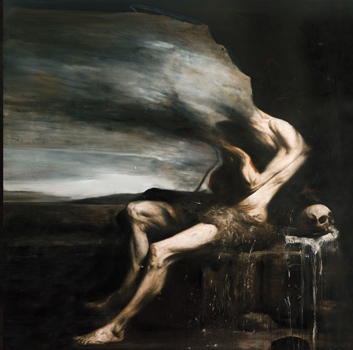
“one of the most innovative and daring merging of white noise, ambient & industrial music with a dramatically Ossianic Black Metal”
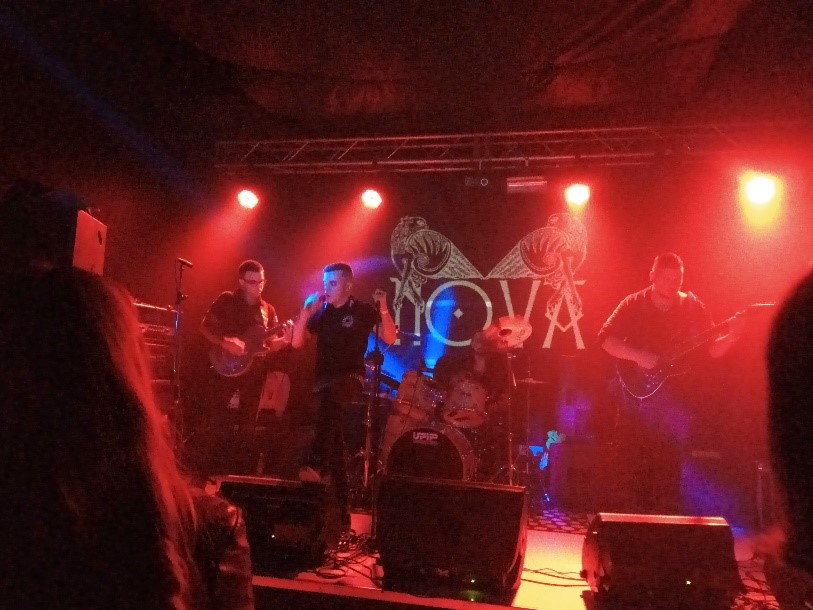
“You can hear the anger and the fury, but also a glimpse of purity hidden between the lines”
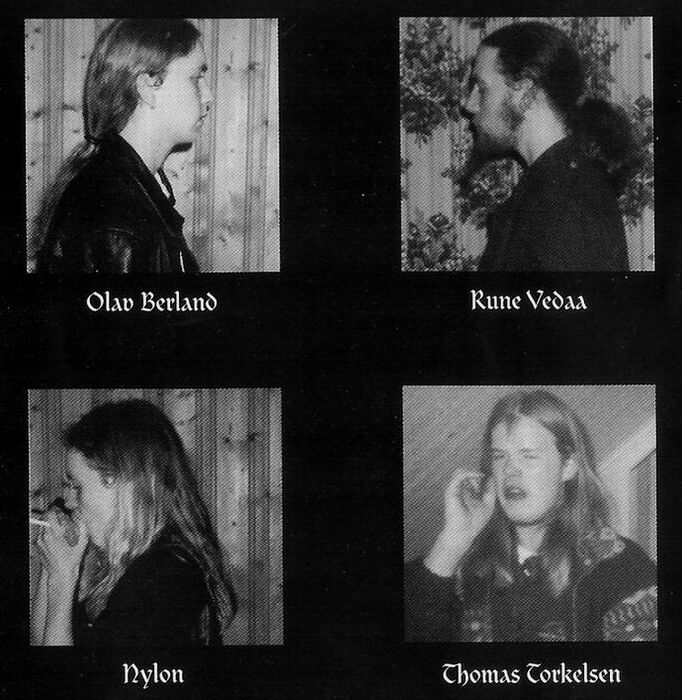
"the most provocative and conceptually anti-cultural milestone among the post 2000 Black metal outputs"
Born in 2003 in Genoa, Italy, IANVA is the result of the unification of nine musicians from different backgrounds (classical and conservatory studies, Goth, Prog, Black Metal, Dark Cabaret) united with the idea of resurrecting the music of older times, from the mood of film noir to the European cafe mood of the '20s, '30s and '40s.
(Taken from IANVA's Facebook page)
Tales from The Frontier – Part 2
Tales from The Frontier – Part 2 >English
רְשִׁימ֥וֹת־תֹּ֖הוּ | An Interview with Diego Matejka >ATMF Records
By: Noa Artzi
10-12-18
The intense correspondence with Diego Matejka continues. This time we delved into a deep conversation on a myriad of topics, ranging from musical gamechangers and the current state of our art and the underground, to Absentia Lunae, the initiative in which, among other talented minds, my interviewee Diego Matejka is creatively involved.
This initiative, as an embodiment of the words spoken so far by our respectable interviewee, exceeds the scope of a mere musical project and invites the listener to reexamine his being in this world, in these times. To some seekers, their offering may be akin to a lush oasis amid what seems to be a spiritual and some would say, a cultural desert.
The path of Burzum and the spiritual quest of Black Metal
5. In “who’s afraid of the wolf” you have also expressed your strong support of what you have called "the Burzum path". What do you perceive as this path’s characteristics and what is its significance to ATMF’s vision and to Black Metal in general?
If we look at Varg Vikernes’s recent Youtube activity, I deem we should close the answer there, but indeed the influence he had to some extent in the 90’s in forging the conceptual evolution of Black Metal cannot be denied.
I was a huge fan of all first 4 Burzum works, moving from the demos to Det Some Engang Var, Hvis Lyset Tar Oss, until the masterpiece Filosofem. That was a journey to a new dimension. On all those albums I see something moving towards a transcendent target. I don’t know how much of this was done consciously, but this guy was forging a new way to make extreme metal music, going beyond those borders, moving in the sub-audible and crushing the wall of the usual Metal mentality.
I never thought of myself as the typical metal-head, just listening to different kinds of Metal, asking himself if it was Metal enough. I have nothing against them but my expectations were far better. Maybe I faced a lot of disillusions during this Journey but it’s part of the game and I deem all bands dealing with ancient cults and mythology were at that time something to further investigate or to follow up more closely.
Hvis Lyset Tarr Oss was a sort of “Alea iacta est[1]” step to a wider dimension, the raw coldness of the guitars melted on a visionary and expansive projection of our soul. “Filosofem” has changed so much in the scene, bringing back the significance in the connection between the primeval wrath and the sources of knowledge of our European tradition, our spiritual heritage.
Of course, someone could mention Enslaved too and there are grounds for that, but there was a hateful projection on our daily life in the Burzum experience that made it even more “real” and powerful.
The scene has changed quite a lot at that time, and although we never got any direct influence with Absentia Lunae for example, where references were others, a lot of this connection manifested itself in ATMF/DTP/SSS releases over the years.
6. Would you say there’s a certain aspect of “riding the tiger” in all this, i.e. in using a "modernist" artistic medium which originally emerged as an expression of dead-end nihilism to initiate a spiritual quest?
This is of course an abused topic within some clans. We’re there of course and the fact that we don’t live like Spartans, many times doing some less remarkable things, may draw some people to associate some behaviors to the Evolian “ride the tiger[2]” motto.
I simply don’t relate to such topics and believe this is of course a very trendy way to enjoy life. I believe we can’t be way better than the age we’re living in but I don’t need to follow this specific topic to feel better or to grant philosophical support to decadence.
I can of course live with decadence, but I won’t stop perceiving the same as it is, as “a decadence”. Of course, this habit means to be in control, differently. I see control & loss of control both as interesting underlying themes in Black Metal, they may sound the opposite but are part of the liberation & personal improvement process. So, no, I deem to be quite far from this way of living.
The underground
7. In the age of dead gods and ideals, what is the importance of a strong underground and what can potentially serve as its stable foundations? What role can ATMF strive to serve to create a stronger, healthier underground?
We cannot be fully healthy, must say, but at least we can try to get something more from the distorted challenges we’re trying to impose on our daily life. I say distorted because we’re making many references to our vision of a certain age of mythological no-time, a far vision which we usually enrich with our understanding and our expectations.
Most probably we get what we are. There’s a philosophical point of reference that states “we that elect ourselves to be god” and in some way we must agree on this point. I deem ancient mythology shouldn’t dwell too far on the mystic side but perhaps should represent the will of the humans or better of a clan, a population like the German tradition was showing. The point is that the meaning of this religion was also applicable to the most evolved form of human being.
I love the pragmatism of the Roman way of understanding and manipulating mythological mysticism to a practical target. Depending of your awareness, this can lead of course to a slow process of these sources of inspiration becoming arid, but we don’t run the risk, I guess….
8. Your article on “Operation FUBAR” from 2012 paints, with its bitter sense of humor a truly pessimistic picture on the future state of our art. As someone both involved in music production and journalism, I laughed and cried bitterly while reading this, remembering all these moments of despair which tend to emerge while contemplating our place in this world. 6 years later, has anything changed in our front? Any luck in the trenches? Do you see a different course of action in the face of these adversities?
At that time, we were really, really scared about the way things were developing. The bitter taste of this age of disillusion is still a part of my personal experience in this field.
I look around on the human herd and I see the exact confused attitude. Most of them take everything for granted. Most of them think they deserve to have everything without the obligation to give something in return. Being doesn't mean right to live. From my point of view, you own nothing. Everything has to be protected, raised, developed as an expansive force. Once you miss contact with this face of reality you miss the point and become a weak creature, to feed the worms.
Speaking about the scene, year after year things are getting worse, less people, the new ones simply don’t relate deeply to the concept and those music freaks they call hipster, it seems they only experience Black Metal albums, or even NS stuff, like going to a cinema to watch a horror movie. It’s like they want to be scared without being fully part of it. They simply do not share the ideas behind the stuff they want to see and listen to… So yes, we’re going downhill…
[Noa Artzi:] On a personal note, I must say these words seem to further validate the concerns I have already expressed regarding the state of our art in my review of “Blackhearts”. Yet despair is our poison. In these days, a strong resistance front, as that formed around ATMF seems more vital than ever, and these words and actions should serve as a source of inspiration to any soul who still bears some faith in our art.
Absentia Lunae
9. Absentia Lunae too, is much more beyond music. It is somewhat of a Gesamtkunstwerk[3] which cannot be fully appreciated unless observed as the integrated product of music, words and visuals. How would you describe Absentia Lunae to someone who’s never heard about it – musically and beyond?
Thanks for having noticed one of the main focuses of our project. When we started AL we immediately determined that our musical creation, already having very ambitious goals deserved an equally significant visual and conceptual sharpness. Aggression and a vibe, visions of tragedies, a purifying mixture of dusk, dark shades of a bitter taste, anguish co-existing with a will to transcendence. The moon still can’t emerge from the shadow. This is Absentia Lunae.
Inspiration drawn from classical music and early 20th century art
10. I recognize influences of heroic Futurism, monumental classical art and music somehow elegantly embedded into an avant-garde, at times an industrial but always a unique strain of Black Metal. How does each of these sources of inspiration serve as a vehicle to convey Absentia Lunae’s message to the world?
I deem Serena / Climaxia would be a better source to go into detail with such a question but indeed you’re mostly right about all references mentioned. The topic of Futurism has to be clarified, also because there’s not a direct link, but more than everything because it is expressed by an aptitude to involve noise / industrial and post electro music in our creation. You can perceive it here and there in our songs, but it’s more of an idea on how to perform and create complex riffs and make the songwriting more personal, not merely related to Black Metal. We’re not simply creating post Black Metal. The guitar riffs have something that goes beyond those artistic boundaries. Personally, I was stunned when Mayhem took the daring path of making modern Black Metal, with a killer avant-garde-ish artistic direction.
Still, from my point of view DHG / Mayhem are key references.
11. I’ve noticed that monuments or visual manifestations of an ideal seem to be a reoccurring theme in your works. I can totally relate to this, after being awestruck by the war monument by Lago di Lecco during my first visit to north Italy – which I’ve also mentioned in my article on Italian Futurism. What special significance do these visual manifestations hold for you and for Absentia Lunae's art?
The futurism related theme is predominant on Vorwarts, but if we look into the details, there’s always a perseverance of classical elements with the dynamic strength of Futurism. Spite Extreme Wing were indeed the first to introduce the term Archeo-Futurism to the field of Black Metal and I deem this has been the most intelligent interpretation of a practicability to match these elements (of Archeo Futurism – N.A.). Black Metal, the sound coming from the woods and the stage of Nigredo, forged into a modern guise but recalling the vengeance of the past, the eternal return. To go forward to get back to the ancient truth.
The Lyrics have in fact the cohabitation of Indo-European references & modern dynamics. But more generally, I deem all past & present Absentia Lunae artwork fully represents our state of being at the precise time when we released these albums.
Our first album, “Marching Upon Forgotten Ashes” that will be soon repressed on cd takes this anguish and dramatic voice of a spirit that seeks a way out of the sewers of modernity, that died in a bunker and now raises questions and approaches its dramatic awareness from our everyday perception, by gathering all the pieces – like a continuous path of knowledge.
“In Umbrarum Imperii Gloria” manifests a glorious and forgotten golden age through the deforming black & white lens of the European kind: we can just try to perceive history but we are often influenced by our will to categorize things. This is why the European kind has its own understanding of history and past facts. We’re still living these human forms and we have to live with it. Still, the negative vibe is strongly present. The full weight of the lost glory and the bitter taste of tragedy have a prevalent role in the evolution of the album.
This obscure and Ossianic[4] strength is driven to an extreme catharsis on “Historia Nobis Assentietur” that drives our music to even more extreme territories. The artwork is perfectly in line with that state of our spirit.
Modern warfare and the metaphysics of war as sources of inspiration
12. Absentia Lunae can be characterized by its harsh sound and striking visuals which resemble old-school political propaganda and military aesthetics. It is all combined with lyrics that somehow deal with all this, but from a very symbolic perspective. It brings to mind concepts related to the metaphysics of war. Was this the original intention behind your art?
In modern European countries we’re missing contact with the basic meaning of every living being’s daily quest. This causes people to get addicted and to deform every kind of personal interest to a sort of pathology. The extreme topic, dealing with the connection between the soldier and his duties towards his family and country, even reaching transcendental projections of this experience was obviously a core topic for us. I do of course love peaceful naturalistic places and sometimes feel the urge to plan some free time in those wonderful environments, but I deem that life has to be a balance between these sides of a healthy human being. This is why, for example, I stay away from the masses but I still love to join my dojo for some practice and fighting. We must never become tools of the predominant fear of the many weak fellows that surround us. They would like to have anything pacified to feel sufficiently relaxed, but this is of course an illusion. In our equilibrium there are always creative & destructive forces in interaction and forever shall be.
13. There is an undeniable mutual relationship between art and war, particularly in Black Metal. What is the significance of this relationship to Absentia Lunae's art?
There has been a part of it in every Absentia Lunae artwork. Wherever a dead demon of war lies, like on the rotten bunker of our debut, or in the photos we took at Fort Hensel near Tarvisio, a place where Italian & Austrian soldiers struggled. “Historia Nobis…” has a full reference, a sense of liberation through tragedy, like a pustule exploding and dispersing its mess everywhere. Vorwarts is more related to a dynamic and aesthetic manifestation of this topic. We live under the banner of mythological vision. Of course, this scenario is part of us, but distorted by our everyday social lives. We can perceive a glimpse of the purest truth, but not fully get it.
14. I understand you also practice far Eastern martial arts. Is it somehow related to your interest in the metaphysical aspect of war? What is your personal perspective on the importance of metaphysical knowledge in combat?
Nowadays we see a predominance of self-defense courses. They want you to believe that you’ll be able to handle the mess once needed, but most of the time the people experiencing them don’t have any clue of what pain might be. They don’t take martial arts to a practical application. You have to feel the pain to get the full picture.
Of course if you do have a chance to practice on a military environment you come to the point where you experience the pain involved in actual face-to-face combat.
Of course, it is better to put yourself in a mindset of self-defense, as opposed to the “nerd doing nothing” mentality.
But I believe that giving and handling pain and improving discipline are more important, far more. This is why on my daily life I’m experiencing this art of full contact karate that developed from the corresponding traditional style, which is more inefficient.
Traditional karate has faced many developments through the ages. At the very beginning it was meant to be really useful, since it was constantly applied in a practical manner. After the 2nd world war, the Japanese were forced to submit the tradition to the sport environment, because the traditional use of this art was forbidden.
Therefore, karate became something which is too much related to a sportive activity than to a tool of practical efficiency. Full contact karate tries to take it back to the primordial truth. Kyokushinkai karate is also welcome. The "traditional" karate, what we call karate Shotokan, the one I experienced when I was young was like this, formally exemplary but not too efficient. The most decadent example of this art is to be recognized at the karate competition, where it has become like some kind of fencing tournament, trying to get points instead of seeking for something true and efficient.
There is of course all the metaphor of war flowing in the background, you got it.
[Noa Artzi:] Yes, I can understand. I actually grew up in Japan, so I have a certain affinity towards this country's traditional culture. Still, I have noticed that many Japanese people turned their backs to the deeper aspects of their tradition and spirituality following the war. Seems like the fate of Karate in Japan after WW2 was no different.
15. One can face many hurdles while attempting to acquire any sort of true metaphysical knowledge in the Kali Yuga. How would you advise one who wishes to overcome these?
Like I mentioned before, everything starts from having more time to relate to yourself. Do your utmost effort not to become an out-of-control instrument of the materialistic society. Make reference to the most natural needs and then try to grow your personal goals, step by step. There’s no winning formula, you simply have to listen for this call to move on this apparently uneven path.
16. The lyrics of “Memneso on” brings to mind a thousand and one things… It seems to reflect the highly relevant crisis of man in a world where god is dead and its dead-ended nihilistic aftermath… But I’ll let you do the talking. Tell me about the ideas behind this epic piece.
I deem that most people understand this reference in a different way than we do. I understand it as the death of the Christian connection with god, not the connection with a supernatural perception of our destiny. The silence is the key topic in amplifying this distance, but we go back to the primordial age, starting back from the silence and opening the womb to the return of the natural forces. What is dying there is the fake expectation for the Christian communication with god. But can be also perceived by the Christian retarded herd as the voice of Jesus claiming and shouting at Golgotha. Of course, it wasn’t my intention to involve this quote to fully represent the director’s ultimate message, but I found it very rich in its extensive understanding of the relationship between the human being and his supernatural meaning. We need this silence that we finally found to discover a new age, going back to the roots…
[Noa Artzi:] Yes, the peaks of the Transcendent have merely been hidden behind a cloud. Christianity has exhausted this link, merely through its own perception. Utilizing the silence hereby born as a chance to contemplate and reestablish the link with an absolute reality is a great way to “ride the tiger”. This is a brilliant example of how Black Metal can invite you to do that…
17. Any concluding words to our readers?
Aspire to do more in your daily life. We’re doing far too many irrelevant things, but to take a higher view of things is the key to grow more conscious and confident. We’re everything but mostly nothing, anyway we’re a part to play now, so why be ahead of our course of time? We haven’t yet become a pure spiritual form. We still have challenges to face, blood, sweat and tears to be shed. Let's face it at our best instead of just giving a superior meaning to any small part of it and becoming an instrument of this spiritual game. Let's pass through this dimension called life without becoming a guru but by being more modest. We still need those symbols.
*
[1] “the die is cast” in Latin, meaning that events have passed a point of no return - a critical turn of events.
[2] Julius Evola’s final major work, which examines the prototype of the human being who can give absolute meaning to his or her life in a world of dissolution (1st published in 1961).
[3] From German – translates as "total/ ideal/universal work of art" or as a "synthesis of the arts". Mainly meaning an artwork that makes use of all or many art forms or strives to do so (Wikipedia).
[4] Osian or Ossian was regarded in legend as the greatest poet of Ireland, and is a warrior of the fianna in the Ossianic or Fenian Cycle of Irish mythology. He is the son of Fionn mac Cumhaill and of Sadhbh (daughter of Bodb Dearg), and is the narrator of much of the cycle (Wikipedia).

Frontiera dell’Essere - "The Frontier of the Being"
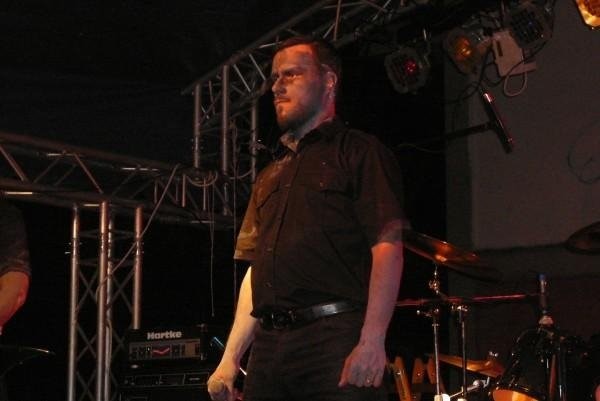
"Maybe I faced a lot of disillusions during this Journey but it’s part of the game"
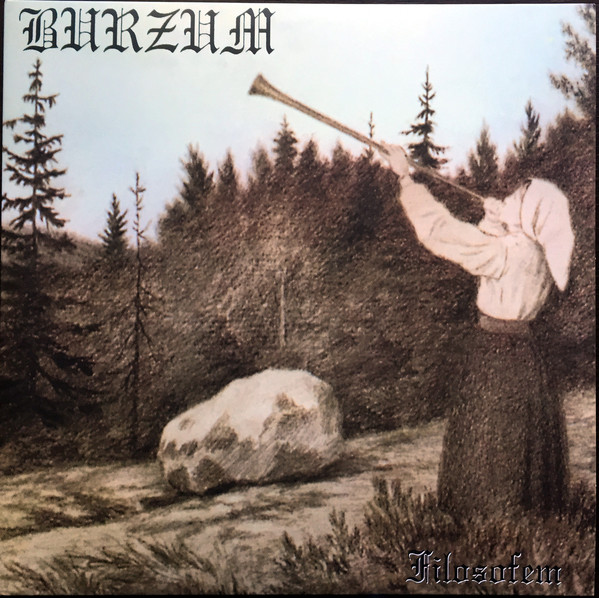
"The 1st 4 Burzum works, moving from the demos to Det Some Engang Var, Hvis Lyset Tar Oss, until the masterpiece Filosofem. That was a journey to a new dimension"
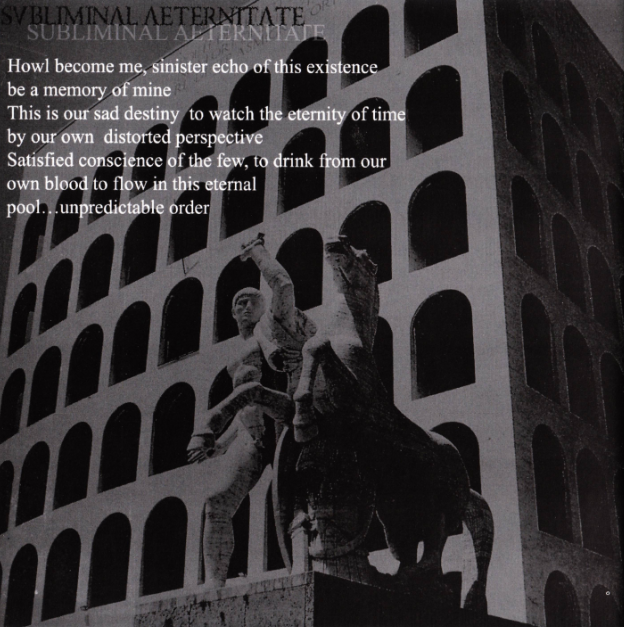
from the booklet of "In Vmbrarvm Imperii Gloria (2006)"

Vorwarts
(opening picture from Spirit of Metal site)
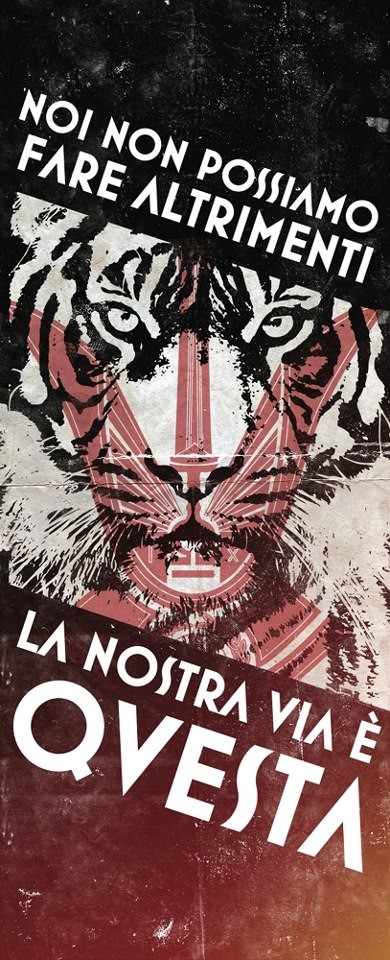
The caption reads: "we cannot do otherwise, this is our way"

March - 2011 (from the Bands Facebook Page)
סיפורה של ממלכת הצללים - חלק 1
סיפורה של ממלכת הצללים - חלק 1
רְשִׁימ֥וֹת־תֹּ֖הוּ | ראיון עם Joseph Vargo, האיש מאחורי הפרויקט Nox Arcana
ראיין ותרגם: יובל לוי
עריכה: נועה ארצי, יוסף בן עוז
5-11-18
𐌰•𐌸•𐌲•𐌳•𐌰•𐌸•𐌲•𐌳•𐌰•𐌸•𐌲•𐌳•𐌰•𐌸•𐌲•𐌳•𐌰•𐌸•𐌲•𐌳•𐌰•𐌸•𐌲•𐌳•𐌰•𐌸•𐌲•𐌳•𐌰•𐌸•𐌲•𐌳
אחת מהדמויות העומדות מאחורי מה שניתן לקרוא לו 'היופי שבאפלה' הוא ללא ספק – ג'וזף וארגו. ג'וזף וארגו הינו אחד משני חברי הפרויקט המוזיקלי Nox Arcana, ונכון להיום הוא החבר היחיד בפרויקט הזה, המוקדש למוזיקת Ambient אפלה ודמוית הפסקול שכל כולה סובבת סביב העולם הגותי, ממש כמו ג'וזף עצמו.
למרות הוותק של ההרכב והעומק החבוי ביצירותיו, נדמה כי המוזיקה של Nox Arcana הרבה פחות מוכרת בישראל, וכמוה גם שלל עיסוקיו האמנותיים הנוספים של אדון וארגו, שהמודעות לקיומם נמוכה אף יותר. וארגו הוא מעין רב אמן בתחום: מעבר למוזיקה הוא כותב גם שירים, סיפורים ואף מצייר ציורים.
Nox Arcana הייתה לי אהבת נעורים. אז, הייתה המוזיקה עבורי לא יותר מבריחה אל עולמות פנימיים, מקום-מפלט לנער מתבגר. היא דיברה אלי, על האפלה שבתוכה, למרות שמעולם לא החשבתי עצמי כאדם שידע סבל רב בנעוריו.
עם השנים, בין אם נרצה בכך ובין אם לאו, יחסינו כלפי האמנות משתנה. בזמן האחרון התחלתי להסתרקן כיצד תישמע אהבת הנעורים שלי ממרחק הזמן, ובעקבות כך חזרתי להקשיב ל-Nox Arcana, מחפש אחר מסרים ומשמעויות חבויות בכל תו ובכל משיכת מכחול. במובן זה לפחות – הריאיון הזה הוא סגירת מעגל עבורי. הוא נכתב כמעט מתוך צורך; צורך לרסק את התמימות של הנער שהייתי, אולי אף לרסק את המקלט, כדי להבין מה עלה בלב מחוויות ההאזנה ההן. מהי בבואתה של האפלה הזו המוצגת באופן כה רומנטי? כיצד משתקפת האחוזה הנטושה ורדופת הרוחות בחיי והאם אוכל שוב לראותה במציאות?
על אף הערכתי הרבה כלפי ג'וזף, בעיקר בזכות ציוריו, אני מודה שגם בתום הראיון הזה לא מצאתי את התשובות שחיפשתי. הבירור, כך נראה, עוד יתמשך. כך או כך: הראיון הזה הוא צוהר לא ל-Nox Arcana בלבד, כי אם גם אל מסריו האמנותיים של ג'וזף ואל הגותיקה בכללותה.
𐌰•𐌸•𐌲•𐌳•𐌰•𐌸•𐌲•𐌳•𐌰•𐌸•𐌲•𐌳•𐌰•𐌸•𐌲•𐌳•𐌰•𐌸•𐌲•𐌳•𐌰•𐌸•𐌲•𐌳•𐌰•𐌸•𐌲•𐌳•𐌰•𐌸•𐌲•𐌳
תורת הנסתר
1. ראשית, תודה לך ג'וזף שהסכמת להתראיין. אתחיל בשאלה קצת לא שגרתית לגבי ההתעניינות הנלהבת שלך בחידות ובפאזלים: אתה חד חידות במוזיקה שלך, מטמין פאזלים בקופסאות הדיסקים ואפילו מפיק משחק מחשב שכל כולו פאזלים גותיים. כיצד מתכתבת תשוקה זו עם התעניינותך בתורת הנסתר?
מאז ומתמיד התעניינתי עמוקות באימה, בקסם, בעל-טבעי ובעצם בכל דבר שהוא אפל ומסתורי. התשוקה הזו מתבטאת היטב בכל היבטי האומנות, המוזיקה והכתיבה שלי. אני יוצר פאזלים לאלבומיי כדי להוסיף עוד קצת ערפל, מסתוריות וכיף, וגם כדי לאתגר את המעריצים שלי. למרות שהפאזלים משלבים הרבה סימבוליקה נסתרת ואפלה, מדובר באלמנט אומנותי ולא יותר.
העניין הזה התחיל בשנת 2006 עם שחרור האלבום Blood of the Dragon. מאחר וקונספט האלבום עסק בחרבות וכישוף[1] והתמקד בהרפתקה רוויה במעשי גבורה, חשבתי שיהיה נחמד גם ממש להטמין חידות ופאזלים בעטיפת האלבום. בעידן הורדות המוזיקה, שיערתי שזה יוכל להיות בונוס לאנשים שבאמת קונים את העותק הפיזי. מעולם לא אמרנו על כך דבר, אך לאחר חודש – חודשיים מעריץ נבון אחד פתר את התעלומה והלהיב בכך את האחרים. מאז אני יוצר פאזלים לעותקים הפיזיים של כל אלבומי האימה.
בנוגע למשחק המחשב, The Cabinets of Doctor Arcana, הוא מבוסס על מעין מיתוס שהופיע באלבום Theater of Illusion. הרעיון המרכזי הינו אגודה עתיקה של קוסמים ששמרו את סודותיה המעורפלים של מלאכתם המיסטית הרחק משאר האנושות. על השחקנים לפתור סדרה של פאזלים מאתגרים שיבחנו את יכולותיהם, כך שרק הראויים יצליחו. זה במובן מסויים הביטוי לדרך בה אני רואה את קשיי החיים: סדרת פאזלים שעלינו לפתור ביצירתיות, ובפעולות נכונות.
2. המונח הכללי "תורת הנסתר" הוא מסועף ונתון לפרשנויות רבות. תהיתי מהי עמדתך לגביה ומה חלקך המעשי בתוכה, אם בכלל? האם העמקת במיוחד בתחום מסויים?
למרבית האנשים, המונח "תורת הנסתר" מצטייר כעניין הקשור לפגאניות. לרוב הוא מתאר דרכים אפלות ומסתוריות שבאמצעותן מתקשרים עם עולם הרוחות או לפולחן ישויות אזוטריות. יש לי חברים רבים העוסקים בשלל פולחנים פגאניים, אבל אני לא עוסק בשום פעילות "דתית" או "מאגית". לדעתי, כל הדתות הגדולות נרקחו לפני זמן רב על ידי מוחות פשוטים שהאמינו שכדור הארץ שטוח. אצל רובן המסר הליבי הוא של שלום ואהבה, אולם מרבית רעיונותיהן הושחתו במשך הזמן. כולן מטיפות לגרסאות שונות של אותה אמת מוחלטת מבחינתן, אך אף אחת מהדתות הגדולות לא הוכיחה את עצמה כאפקטיבית יותר מהשאר. זה מדהים אותי שאנשים שגדלו תחת דת אחת מאמינים שהדת שלהם קדושה יותר מהאחרות ושהשאר מרושעות. מעטים הם האנשים שבאמת חוקרים אמונות אחרות או מעלים תהיות על אמונתם שלהם. התפיסה שלי לגבי עניינים רוחניים היא פשוטה: אל תבזבז את חייך בחיפוש אחר תשובות שהן מעבר לתבונת אנוש. פשוט חיה את חייך במלואם, ללא חרטות. אני כן מאמין שיש קו משותף המחבר בין כל מה שחי, אך היקום הוא דבר כה עצום ומסתורי ומלא בפלאים שאנו בני התמותה לא באמת יכולים להבין. אין אדם שביכולתו לפענח את המסתוריות האין-סופית העוטפת אותנו. אני מאמין שלדמיין את חלומותינו בעיני רוחנו ולשלוח מסרים מנטאליים לכוחות יקומיים יכול ליצור אנרגיה חיובית, אבל אני גם מאמין ששומה עליך לפעול למען מטרותיך. לעיתים די במיקוד מחשבותיך ולעיתים נדרשת עבודה קשה על מנת להשיג את היעד הנחשק.
השקפת עולם ואומנות
3. לאורך ההיסטוריה, תנועות אמנותיות יצגו עמדות שהשפיעו על תפיסת העולם המקובלת. ה"גותי" הוא מונח רחב: החל מאמנות סוף ימי הביניים, עובר בספרות המאה ה-19 וכלה בתרבות ה"Goth" של סוף המאה ה-20. מה עומד לדעתך מאחורי ה'אמנות הגותית' ומהם השינויים שאליהן הובילה? באם יש לה מסר, האם לדעתך הוא מתבטא באופן ייחודי באמנות שלך?
במקור, תיארה המילה 'גותי' את הארכיטקטורה של קתדרלות ימי הביניים. הסגנון הגותי היה שונה למדי מהמבנה הארכיטקטוני המקובל באותה התקופה. מקור השם בשבטים הברברים שפלשו לשטחי האימפריה הרומית וכבשו אותה. היום המונח מתייחס לסגנון אפל ורומנטי באמנות, בספרות ובמוזיקה. הוא מושך אנשים המעזים לחקור את האפל; אלו המגלים עניין בסכנה, בתשוקה ובעל-טבעי. אישית, אני נוטה לתחום אותו בפירושו המסורתי. האסוציאציות המיידיות שלי הן גארגוילים (Gargoyles) המשקיפים ממרומי קתדרלות וארמונות, בתי קברות אפופי ערפל ומצבות מקושטות, יצירות הספרות של ברם סטוקר, אדגר אלן פו ודמויות אימה כרוחות וערפדים. אני חושב שהאומנות והמוזיקה שלי משקפים את כל פני 'הממלכה הגותית', מהיפה ועד המבעית, הגם שכתיבתי מתמקדת יותר באימה.
4. הצלב הנוצרי נוכח למדי בציוריך, שלא לדבר על האווירה המזכירה את אמנות הכנסייה קתולית. הקשר של כל אלו למורשת הגותית מובן, אך כיצד זה מבטא אצלך את השקפתך על הנצרות ועל הדת בככללותה?
אני משתמש בצלב הנוצרי כייצוג סימבולי למצבות גותיות, אך בסדרת הספרים שלי אני מציג אותו כקמע האור. כל מיתולוגיית הערפדים שאותה אני מציג מתבססת על ידיעותיי המיתולוגיות שנלקחו מהנצרות. השימוש בצלב כ'מגן מפני רוע' נולד בספרו של ברם סטוקר "דרקולה" ומאז הפך לסטנדרט בכל סיפורי הערפדים של ימינו. לבד מסימבוליקה בדויה, אין לצלב שום משמעות דתית בחיי או ביצירותיי. הרבה מציורי נובעים מסדרת הספרים שלי, 'המגדל האפל', המספרים את סיפורו של צלבן מימי הביניים שהפך לשומרה הנצחי של ממלכה אחוזת רוע נוראי. המיתוסים המלווים את המעשיות מתמקדים באלמנטים נוצריים, אך גם לא מעט אלמנטים פגאניים או המשוייכים ל-Wicca. בנוסף, אני משלב ביצירה את הפילוסופיה האישית שלי על דת, מיתולוגיה ותורת הנסתר.
בתחילת דרכי בשנות ה-80 עוד החזקתי בשיירי האמונה הנוצרית, אך לבסוף השלתי אותה מעלי כשהפכתי מודע יותר לאמונות אחרות ולפולחניהן. לראייתי, להיות אדם רוחני לא מחייב אמונה בדת מסוימת, אלא יותר את לייצג החיפוש אחר הקונספט הנוח ביותר למשמעות החיים ואת הבנת חשיבותך ביקום.
5. תמיד שילבת את תשוקותיך: אל הגותיקה ואל הפנטזיה. מהו הקשר בין השתיים? רק העל-טבעי, או שמא קיים דבר-מה עמוק יותר?
מלבד עניין הארכיטקטורה והספרות הגותית בכלל, ה'גותי' גם מתאר בעיני אווירה ודפוס חשיבה מסויים, קיומו הקבוע של מוטיב הסכנה האורבת בין הצללים. לתחושתי ה-"גותי" גם מתקשר עם עולם הישן וביתר עומק עם תורות מקאבריות. רוב ספרי וסרטי האימה של היום מכילים אלמנטים הנאמנים לגותי. ה-Goth הוא רחב הרבה יותר מה-Gothic: השני יותר מכוון לתקופה בהיסטוריה של אירופה על הארכיטקטורה והספרות העוסקת בה, בעוד שהראשון מייצג סגנון חיים מודרני, בד"כ של צעירים, המתעניינים במקאברי והחפצים להתחבר לאפלה הפנימית שלהם ולמרוד בנורמות.
כשיצרתי קלפי טארוט גותיים המבוססים על הטארוט המסורתי, השתמשתי בתמות היותר אפלות שבציוריי. יצרתי גם את חבילת קלפי המזל של Madame Endora יחד עם השותפה שלי Christine Filipak. הציורים בחבילת הקלפים הזו מתמקדים יותר בפנטזיה, אך עדיין משקפים את האסתטיקה האפלה שלי. חבילת קלפי מזל זו מעניקה חיזוקים חיוביים על ידי עצות מועילות. כמו בחיים, יש אלמנט של מזל בשליפה אקראית של קלף מסוים, אך ההנחיה המתקבלת בשליפת הקלף נובעת יותר מהתבוננות פנימית ולא מהתערבות על-טבעית.
6. תשוקתך לאפל החלה בגיל מאוד צעיר, מעטים מכירים זאת. האם אתה זוכר מדוע? האם אתה זוכר את חייך לפני הופעתה, או שתמיד היה זה חלק ממך?
מאז שאני זוכר את עצמי, נמשכתי לצד האפל. עם תחילת בגרותי חשתי שכל זה הוא לא יותר משטות ילדותית שעלי להתבגר ממנה אך ברגע שהשלמתי עם תשוקתי, התחלתי ליצור את יצירותיי העגמומיות המבוססות על הרעיונות האפלים האורבים בין צללי דמיוני. יש משהו מפתה בלילה ובכל האפוף צללים. רבים סבורים שאנשים המקיפים עצמם בקדרות הם עצובים או מדוכאים, אך למעשה האפלה מעצימה אותם. אינני שוכן בצללים כל הזמן, אך שם אני מרגיש הכי בנוח.
7. בעיניי, האפלה כוללת דברים מבעיתים שקשה להכילם, למשל כמו ביצירתך באלבום Zombie Influx, שהייתה די מטלטלת. הוכחת שאתה בהחלט יודע לזעזע את מאזיניך, אלא שלרוב אתה בוחר באפלה קלה לעיכול, אסתטית ורומנטית. מדוע?
יצירות אמנות רבות כגון דרקולה, פנטום האופרה והגיבן מנוטרדם, משלבות זוועה ואלמנטים רומנטיים. הנוסחה הזאת קוסמת לקהל מאחר והיא מרוממת שני רגשות קדמוניים: פחד ותשוקה. אף אני שואף ללכוד את המהות של שתי אלו בעבודותיי.
באלבום Zombie Influx וגם ב-Necronomicon אני עוסק באימה טהורה. קונספטואלית, הם תוכננו להיות חפים מכל אלמנט רומנטי. רבות מעבודותיי נוגעות בקרב הנצחי בין האור והחושך, הסדר והתוהו, הטוב והרע. כמובן שאם מישהו בוחר להסתכל רק על הזווית השלילית, אז זו בעיה שלו. אני אוהב לחקור את היופי שבאפלה, אך יש אנשים החוששים להעז ולהתקרב לצללים.
ברשותך, אני רוצה לצטט מ- Return to the Dark Tower:
"אין האפלה מקור לפחד. זוהי ממלכה עתיקה של צללים ולילה. היא מולידה חלומות ומעניקה מקלט בטוח לכל המחפש מחסה. היא מעצימה כל אדם המקבל אותה ומענגת אותו בטירוף החושים הנצחי שלה".
8. עד כמה חייך האישיים משפיעים על האומנות שלך? כמה מהרוגע או הכאב משתקפים בציורים ובמוזיקה?
מעט מאוד. הציורים והמוזיקה שלי הם בריחה מהמציאות. יצירותיי הן התגלמויות טהורות של דמיוני. רוב האמנים שואבים השראה מכמה מקורות. הדבר מאפשר להם להמשיך לעבוד גם בתקופות של טלטלה רגשית ולהיות פרודוקטיביים גם ברגעים הקשים בחייהם. כמובן שקיימת מידה כזו או אחרת של השפעה מגורמים חיצוניים על האומנות שלנו, אך אני משתדל שלא לתת לחיים האישיים להסיח אותי. דפוס החשיבה הזה מאפשר לי להישאר נאמן לחזון שלי. למשל כשאני עובד על אלבומי החורף שלי, אני בד"כ כותב את המוזיקה ומקליט אותה באמצע הקיץ החם. אפשר שיהיה שמשי וחם בחוץ בצורה בלתי נסבלת, אך אני בתוך ביתי, מלחין לחני חורף עגמומיים ואפלוליים. אם אתה מספיק שקוע בתוך העולם שיצרת, שום גורם חיצוני לא יכול לפרוץ דרך מחסומיו.
9. יצירותיך החזותיות מושפעות מאוד מאמן הפנטזיה פורץ הדרך Frank Frazetta. תיארת את עבודתיו כבעלות "איכות קדמונית אפלה". התואיל להסביר את חשיבות האנרגיה "הקדמונית" בעבודותיך ובהשקפת עולמך? מה דעתך על תנועות ניאו-פגאניות או פרימיטיביסטיות? האם הזאבים בציוריך מייצגים אנרגיה זו לדעתך?
עבודותיו של Frazetta הקסימו אותי עוד כנער. ציוריו המצמררים לוכדים רגש גולמי, המשלב את הפראי והחושני. מחשבות קמאיות נקשרות בחוזקה לרגשות הבסיסיים ביותר שלנו כפחד, אלימות ותאווה – החפים מכל העידון המצוי ברומנטיקה והתנהגות מתורבתת. אם אמן מצליח לגעת בקהל ברמה כזו, האומנות שלו מציתה את אותם רגשות בסיסיים ומהדהדת עמוק בפנים.
אני שואף להשריש את האנרגיה הקדמונית בעבודתי הגותיות בכך שאני יוצר רקעי תמונות המכוסים צמחיה פראית ומבנים בארכיטקטורה עתיקה בעוד שאני מציב את הדמויות תחת צללים כבדים וערפל. את הזכרים אני מתאר כדמויות מהורהרות בעלי עוצמה על-טבעית, בעוד שהנקבות ממעיטות בלבוש, חושפות עיקולים חושניים עם סקס-אפיל טבעי. בה בעת שהדמויות האנושיות אצלי נועדו להפיץ אווירה חושנית-אפלה, המפלצות נועדו להיראות כמו סיוטים מהלכים. הרבה מיצוריי המפלצתיים שריריים כבהמות ענק, ועם תכונות מוגזמות כמו עיניים אדומות זוהרות ושיניים או ציפורניים דמויי פגיונות.
זאבים מסמלים קדמוניות פראית. יש להם אינסטינקטים פראיים, אך הם גם חכמים מאוד ונאמנים, מה שמעורר בנו יראת כבוד. ברם סטוקר ביסס את דרקולה על אגדות מסורתיות ולכן נתן לו את היכולת לשנות צורה, בין השאר, לזאב. אגדות אנשי-זאב גם הן מוזנות מהפחדים הקדמוניים של האדם מפני זאבים ומפלצות אחרות האורבות בחשיכה. יצרתי כמה דמויות המושפעות מזאבים: החל מבעלי-חיים פשוטים ובהמות על-טבעיות וכלה בשילובים מפלצתיים בין זאבים ובני אדם. מאחר וזאבים הם ציידי לילה, הרבה אנשים האוהבים את האפלה מזדהים איתם.
>>כל הציורים והעיצובים הם של Joseph Vargo, .ונלקחו מהאתר שלו
*
[1] ב'כישוף' הכוונה לתת הז'אנר בספרות הפנטזיה המאופיין בסיפורים בעלי גוון אישי ואגריסיבי יותר.
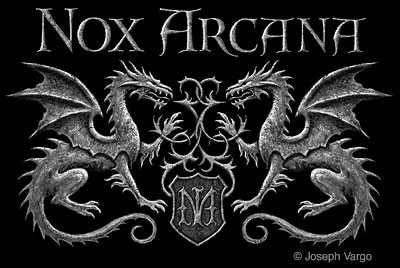
הפסקול החי של ממלכת הצללים
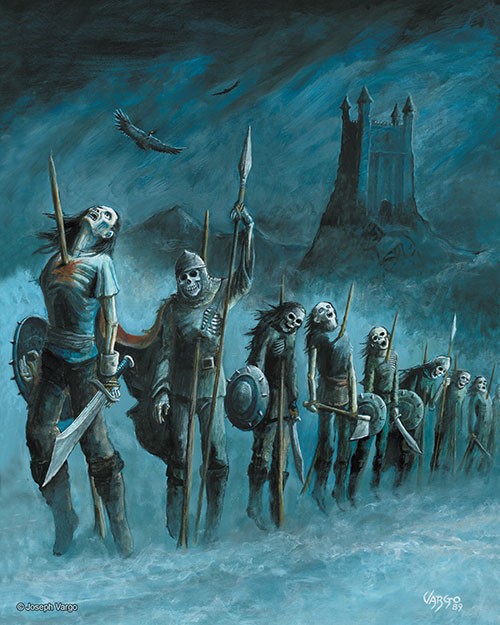
האומנות והמוזיקה שאני יוצר משקפים את כל הממלכה הגותית - מהיפהפה עד המבעית
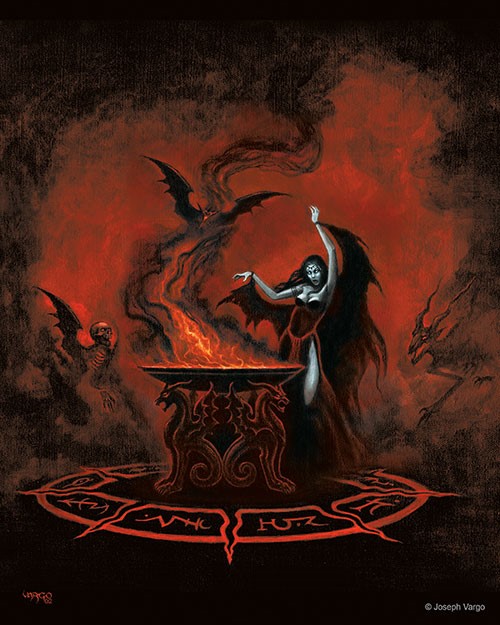
אני לא שוכן בצללים כל הזמן, אך שם אני מרגיש הכי בנוח
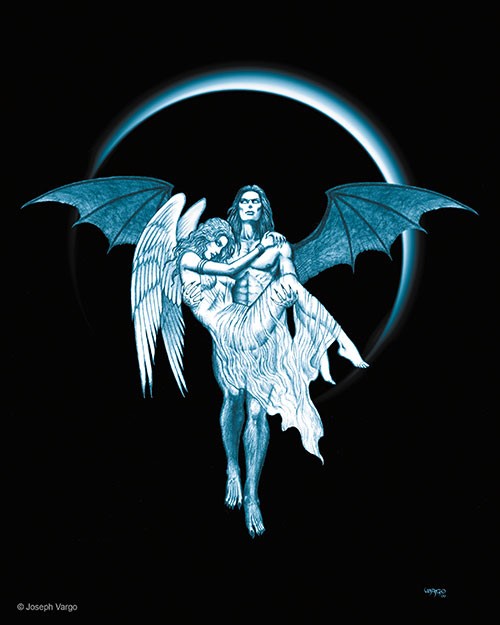
"אין האפלה מקור לפחד. זו ממלכה עתיקה של צללים ולילה. היא יולדת חלומות, ומעניקה מקלט בטוח לכל המחפש מחסה. היא מעצימה את כל מי אשר היא יקרה לליבו, ומאפשרת לו עונג רב בסערתה הנצחית". - מתוך ספרו "חזרה אל המגדל האפל"
סיפורה של ממלכת הצללים - חלק 2
סיפורה של ממלכת הצללים - חלק 2
רְשִׁימ֥וֹת־תֹּ֖הוּ | ראיון עם Joseph Vargo, האיש מאחורי הפרויקט Nox Arcana
ראיין ותרגם: יובל לוי
עריכה: נועה ארצי, יוסף בן עוז
23-11-18
𐌰•𐌸•𐌲•𐌳•𐌰•𐌸•𐌲•𐌳•𐌰•𐌸•𐌲•𐌳•𐌰•𐌸•𐌲•𐌳•𐌰•𐌸•𐌲•𐌳•𐌰•𐌸•𐌲•𐌳•𐌰•𐌸•𐌲•𐌳•𐌰•𐌸•𐌲•𐌳
זהו החלק השני של הראיון שקיים יובל לוי עם המקים והיוצר מאחורי הפרויקט הגותי - Nox Arcana.
1. המיינסטרים נותר אדיש לתשוקך כלפי פנטזיה גותית ובכל זאת, הצלחת: ספרים, ציורים ומוזיקה מפורסמים למדי, וכאמור – אפילו משחק מחשב. מהי לדעתך הדרך הטובה ביותר להתמודד עם הבעיות המלוות אותנו, האמנים, מעצם היותנו חלק מנישה קטנה ולעיתים אף דחויה? הקהל המצומצם, שיתופי הפעולה המוגבלים וחוסר המוטיבציה כתוצאה ממחסור באמנים אחרים החולקים את תשוקותיך הם רק כמה מהמכשולים בדרך. מהו הסוד ליכולת ההתמדה שלך וליכולתך להישאר נאמן לחזון?
אמנות גותית ומוזיקה אינסטרומנטלית אפלה אמנם לא נפוצות או פופולריות בתרבות המיינסטרים אך האמת היא שרבים נמשכים לאפל ולמפחיד. בפוגשנו אלמנטים ביצירה הפונים אל הצד האפל שבנו, אנו מקבלים אותם בתשוקה ותומכים ביוצרים. אישית, ציירתי מעל 100 ציורים לפני שהתחלתי ממש להרוויח מהם. גם עכשיו אני בקושי מוכר ציורים מקוריים. ציוריי הופיעו רק פעם אחת בתערוכה בגלריה ציבורית וגם אז אני הייתי זה שארגן אותה. הסוד הוא התמדה. היצירתיות גוזלת המון זמן. אם לא תשתמש בזמן הזה כדי לעשות משהו שמספק אותך, אתה מהר מאוד תאבד עניין.
עשיית דבר מה שאתה באמת אוהב, מתגמלת בדרכה. יכולת ההתמדה שלי בעבודתי מושפעת מתחושת ההישג האישית שלי. אני פשוט מקפיד להיות נאמן לעצמי בעודי מתדלק את האש האפלה הבוערת בלבי.
2. האם תוכל להרחיב מעט על משחק המחשב שאתה מפיק? לי נראה שמשחק-פאזלים אווירתי שנוצר ע"י אמן חובב תורת-הנסתר הוא משהו קסום ביותר.
המשחק שואב השראה ממשחקי מחשב ישנים המבוססים על פאזלים כמו The 7th Guest, ו-Shivers and Jewels of the Oracle. זה סוג משחקים שהשפיע עלי מאוד, והשתמשתי בהם כמקורות השראה לפרויקט. בימינו, נראה שמשחקי פאזל הפכו לנחלת העבר וחבל, כי הם כיפיים ומאתגרים. במובן מסויים חשתי מחוייב להחיות את הז'אנר הקלאסי הזה, אז התחברנו לרעיון של ליצור משחק פאזלים בסגנון ישן. עיצבנו את המשחק מתוך כוונה שיראה ויחווה מאוד 'Retro', עם תצוגה בסיסית ושליטת עכבר מינימלית. התוצאה הסופית היא חוויה אווירתית ומבדרת במשחק המעורר נוסטלגיה משמעותית.
הרעיון לקונספט של המשחק עלה בעקבות טור שיצרתי למגזין שלי Dark Realms Magazine בשנת 2000. שמו היה The Cabinet of Doctor Arcana, כמחווה לסרט האימה האילם The Cabinets of Doctor Calligari הקלאסי. פעמים רבות שדוקטור ארקנה היהיר היה מציג פאזלים לקוראי המגזין ואחר מפקפק בטוהר המידות של כל מי שהצליח לפתור אותם. ההומור הלגלגני ממשיך גם במשחק והשחקנים נחשפים להקנטותיו של הקוסם במשך כל ההרפתקה. המשכתי לפתח את הרעיון סביב דוקטור ארקנה באלבום Theater of Illusion של Nox Arcana. זהו משחק לאנשים המחפשים גירוי מנטאלי שונה ממה שבדרך כלל אפשר לקבל ממשחק Arcade או Quest רגילים.
יצורי הלילה
3. בציורך "The Dark Crusade" (הצלבן האפל), הדמות היפה והאפלה העוטה גלימות שחורות מתקשה לאחוז בחרבה: היא דקה וחלשה, אך מבטה עוצמתי ובטוח. מה הוא כוח החיים המניע את חזותה השברירית בעוצמה? מהו מסע הצלב בו הצלבן לוקח חלק, במי הוא נלחם ומדוע הוא לובש צלב-נוצרי סביב צווארו?
והאמת היא שככלל, אתה אוהב לצייר מלאכים-אפלים. הסיפור שהם מספרים לנו דרך האומנות שלך?
הציור מתאר את לורד בְּרוֹם, הדמות הראשית בספרי ה- The Dark Towerשלי. הוא רזה כי הוא ערפד המונע מעצמו דמם של אנשים, שהוא הרי מזונו, מחשש כי נשמתו תתרחק כך מן האנושיות. החרב ושרשרת הצלב ניתנו לו ע"י השומר לשעבר של המגדל האפל, אדם קדוש, אשר נפשו נפלה אל עבר האופל בעקבות תפקיד המשמר האיום שהוטל עליו. לסדרת הספרים יש טוויסט מקורי סביב הגורם האמתי לתופעת הערפדים. יש שייראו זאת כסוג של חילול הקודש, אך אני רואה בכך גילוי מרהיב.
בדרכי, אני בונה דמויות אלגנטיות בזדוניותן ומעורר אווירה גותית ע"י שילוב של אלמנטים ארכיטקטוניים שונים. הדמויות שאני יוצר מאוד חיוורות ורזות שכן הם מממלכתם של המתים המהלכים. מסורתית, כך תוארו ערפדים ורוחות, ויש בזה מסר תת-הכרתי העובר אל הקורא הנפגש עם דמות דקה בעלת עור חיוור: אנחנו מזהים מיד את המראה של יצור שלא אוכל או יצור שגופו התרוקן מדם. אך למרות שזהו המראה האינטואיטיבי של המת-החי, אני משתדל שהדמויות תיראנה סקסיות ומושכות במובן גותי. אישית, הייתי שמח לראות סגנונות מודרניים נוספים המושפעים מהסכנה והיופי שבגותיקה, המשלב את האלמנטים המסורתיים עם אלמנטים פנטסטיים מספרות האימה.
המלאכים האפלים שלי, למרות כוחותיהם העל-טבעיים והעובדה שהם חיים אלפי שנים, אינם בני-אלמוות. הם שומרים על 'הטובים', נלחמים למען הסדר ונגד הכאוס. המלאכים האפלים מבוססים על המיתוסים של Watcher המתארים יחסים אסורים בין בני אדם למלאכים.
רוחות הרפאים אצלי הן בד"כ נשמותיהן של נשים יפות והערפדים נעים על הטווח הרחב בין הרומנטיקה האפלה והמפלצתיות המבחילה. ה-Ghouls הם יצורים דוחים ומפחידים שאיבדו את אנושיותם והפכו לבעלי תאווה חייתית לבשר-אדם. לפני צאת ספרי הראשון שוחחתי עם סופר, חבר, שאמר לי שלדעתו כל הדמויות הגותיות בציוריי קשורות זו לזו דרך סיפור שטרם סופר. הבנתי שאני יוצר את ממלכת הצללים של דמיוני ושנדרש כאן הרחבה. כשהתחלתי לעבוד על סדרת ספרי The Dark Tower, כתבתי סיפורים קצרים וציירתי את הפרטים שימלאו את החסר. הטרילוגיה השלמה היא שילוב קלאסי של אימה, רומנטיקה, מסתורין והרפתקאות אפלות שביסודן המאבק בין הטוב והרע.
4. מה תוכל לספר על תושבי היערות העגמומיים שלך: אנשי-זאב פראיים, מכשפים ופיות אפלות, מלך-החורף של יער ה-Ebonshire?
גם בימינו שוכן המסתורין במעמקי היער. התרבות העממית עשירה ביצורים החיים בצללי אדמות יער ופולחנים על-טבעיים המתרחשים שם בשעות המתות של הלילה. היערות שלי מבשרי-רעות, בהם: מכשפות עורכות טקסים אסורים של זימון ופיוס אדוני היער העתיקים; אנשי זאב קמים משנתם בירח מלא, לארוב לטרף אנושי; שבילים נשכחים ביער מובילים לממלכות עתיקות, מקום הפיות והגובלינים. הפיות של הפולקלור הישן היו אפלות בהרבה מאלו שבאגדות הילדים של היום, והיו חוטפות ילדים ותובעות קורבנות מבני תמותה. פלאי היער רבים הם וגם האימה.
בסיפורי Ebonshire שלוש ישויות עיקריות המשגיחות על הממלכה: אביר החורף, מלכת החורף ומלך החורף. כל אחד מהם מייצג היבט אחר של החורף, בשלושה אלבומים נפרדים. מלך החורף מעטר את עטיפת האלבום Winter’s Majesty. הוא מייצג את התהילה והעוצמה של עונת החורף, שאין-בילתה, עת הוא פוקד על רוחות קרח קרות. מבחינה אמנותית הוא מוצג כדמות האב השולט העילאי המופיע במיתולוגיות רבות. הוא אדון נקשה ובעל זקן לבן כשלג, כמו אודין הנורדי או זאוס, היושב בכס מלכות גבוה ומשקיף על ממלכתו. אחרי שהשלמתי את טרילוגיית החורף התחלתי לפרסם קטעי מוזיקה נוספים העוסקים בקונספט ה-Ebonshire בכל חורף בשנים האחרונות. כעת, משצברתי 21 קטעי מוזיקה, בכוונתי לפרסם את כל האוסףבאלבום אחד כבר בחורף הקרב.
על הפרויקט Nox Arcana
5. מהו הקונספט מאחורי הפרויקט המוזיקלי Nox Arcana?
בצעירותי, הייתי חבר במספר להקות רוק אלא שתמיד אהבתי מוזיקה אינסטרומנטלית, בעיקר פסקולים של סרטי אימה. לאחר שהתפרסמתי מעט בזכות האמנות ובזכות שאר הפרויקטים המוזיקליים שלי, החלטתי ליצור סדרת אלבומי קונספט אווירתיים ומציפי-חושים עם מלודיות רודפות ואפקטים הסובבים סביב תמות גותיות. חברתי ל-William Piotorwski שהיה אז רק בן 15. מלבד יכולותיו המוזיקליות ניחן ויליאם בכישרון יוצא דופן בכל מה שקשור לטכנאות סאונד. בנינו אולפן ביתי משלנו, בו התחלנו לכתוב ולהקליט על בסיס יומי. תוך כמה חודשים, יצרנו את אלבומנו הראשון - Darklore Manor. המוזיקה סומפלה באפקטים שונים וקטעי קריינות של שירים מצמררים בקולות רפאים, שירי ילדים זדוניים ואפילו לחשי כישוף.
שנים מאוחר יותר, פרסמנו סדרת אלבומים המבוססת על שלל תמות אפלות שהלהיבו אותנו: אחוזות ויקטוריאניות רדופות, קרנבלים מוזרים, אגדות האחים גרים, שודדי-ים מהשאול וכישוף. בין היתר עשינו מחווה לסופרים גותיים קלאסיים כאדגר אלן פו וה.פ. לאבקראפט ואף הפקנו מספר אלבומים לכבוד חגי החורף. המוזיקה מורכבת מקטעים אינסטרומנטליים אווירתיים ומושפעת ממלחינים קלאסיים כמו בטהובן ומוצרט, ופסקולי מלחינים מודרניים כמו: Ennio Morricone, Wojciech Kilar, John Carpenter ו-Danny Elfman. וויליאם עזב ב-2009 ועבר ללוס אנג'לס כדי לפתח את הקריירה שלו כמלחין לסרטים, אך אני המשכתי את Nox Arcana כפרויקט סולו, והיום מאחורי עשרה אלבומים בעצמי. וויליאם ואני עדיין חברים קרובים והוא ממשיך להיות טכנאי המאסטרינג לאלבומים של Nox Arcana.
6. ספר לנו קצת על תהליך היצירה ועל האווירה שעוזרת לך להיכנס לראש הנכון. האם אלו תואמים את מה שאנו חווים כמאזינים?
כשאני כותב מוזיקה, אני תמיד לבד באולפן הביתי שלי. וחדרי מעוטר בגולגולות, חרבות, ציורים גותיים וכלי פולחן. מאחר וכל האלבומים של Nox Arcana הם אלבומי קונספט, אני מנסה להיכנס להלך הרוח והאווירה המתאימה למהות התמה שבחרתי. הרשמים הנוצרים מאפשרים לי להרגיש את נוף-השמע של הקונספט הנבחר.
7. אישית, אהבתי את ההפתעות הקטנות בסוף חלק מהאלבומים, כמו גרסת הרוק של "Spellbound", או גרסת האינדסטריאל-דאנס של "Hildren of Heaven". מה אתה צופה הלאה ל-Nox Arcana? אלבום מטאל גותי מלא? אולי אינדאסטריאל-דאנס?
הרעיון הזה תמיד ישב לי בראש. לפעמים, יש לי קטעים ממש טובים אבל הם פשוט לא מתאימים לאלבום הקונספט הספציפי שאני עובד עליו באותו הרגע. אולי מתישהו בהמשך אכתוב ליריקה ואפתח חלק מהקטעים לכדי רוק גותי או מטאל, זו לגמרי אפשרות סבירה. בעבר, לחצתי על כמה מחברי הטובים שהם גם מוזיקאים מוכשרים, להקליט גיטרה או שירה לכל מיני קטעים של Nox Arcana. גיסי, Jeff Endermann הקליט גיטרה לחלקם (Spellbound למשל) ועל השירה היה אמון Jim Hamar (מהרכבי המטאל Breaker ו-Nightcrawler).
8. באלבום "Blood of Angels" שיתפת פעולה עם הסופרת וחוקרת תורת-הנסתר Michelle Belanger (שירה). כיצד נוצר שיתוף הפעולה וכיצד התנהל תהליך ההקלטה? מה חיבר ביניכם?
מישל ואני חברים מזה זמן רב. גרנו באותו האזור, כך שדרכינו הצטלבו באירועים גותיים מקומיים בהזדמנויות שונות. מאחר והיו לנו תחומי עניין משותפים, התפתחה בינינו חברות במשך השנים. הרוב מכירים אותה דרך הכתיבה שלה, אך יש לה קול אופראי מדהים. היא שרה באלבום שלנו Winter's Knight, אבל רק בשיר אחד. תקופה ארוכה שוחחנו על האפשרות לעבוד ביחד על פרויקט משותף, אבל היינו מאוד עסוקים עם פרויקטים אחרים. יום אחד ב-2006, הבנתי שאנחנו פשוט צריכים לפנות זמן כדי לעשות את זה. וויליאם ואני בדיוק סיימנו את Carnival of Lost Souls והתחלנו לעבוד על Blood of the Dragon. התקשרתי למישל והצעתי ששנינו נפנה שבוע אחד לפרויקט. עבדנו שישה ימים רצופים והשקענו בין 11 ל-14 שעות בכל יום בעבודה באולפן, שבאותה התקופה היה גם חדר השינה של וויליאם. כולם הגיעו מוכנים לעבוד, מה שעזר לנו לתקשר ביעילות. אני כתבתי כמה מנגינות שהתבססו על סגנון שחשבתי שיתאים לה והיא כתבה את המילים, אבל כתבנו יחד גם המון מוזיקה ומילים במשך אותו השבוע בחדר הצפוף הזה. לא באמת חשבתי שנעשה אלבום מלא בזמן כה קצר, אבל נוכחנו עד להיכן ניתן להגיע כשהיצירתיות זורמת וכשמתמקדים בעניין ספציפי.
9. אם הייתי נותן לך לבחור אמן אחד ספציפי (חי או מת) איתו היית יכול לעבוד על יצירה חדשה, במי היית בוחר ומדוע?
שאלה קשה, אתה ממש גורם לי לעשות סדר עדיפויות בחלומות שלי. אין לי צורך מיוחד לשתף פעולה עם מישהו בפרויקט אומנותי או במוזיקה. שותף כזה, יצטרך להיות מישהו בעל יכולות וניסיון שחסרים אצלי. לכן, נראה לי שהייתי שמח לעבוד עם הבמאי ואמן האפקטים הקולנועיים Patrick Tatopoulos, שיעיר לחיים בתור סרט את סדרת The Dark Tower. הוא אמן נהדר ואני ממש אוהב את הסרטים שהוא ביים. למעשה, סרטו Underworld 3 Rise of the Lycans נראה בדיוק כמו החזון שלי לויזואליות של ספרי The Dark Tower. פעם, מעריץ שלי השתמש בסצנות מהסרט ליצירה סרטון לקטע המוסיקלי שלי ל-The Dark Tower.
החזון האמיתי שלי לגבי הויזואליות של The Dark Tower היא סדרת טלוויזיה אפית בסגנון של "משחקי הכס" או של "הויקינגים". התחלתי לעבוד מחדש על הספרים כדי להתאים את הסיפורים לתסריט, פה ושם הוספתי סצנות חדשות. אם הוא אי פעם יהפוך למציאות, זה יהיה אדיר.
מילים מסכמות
10. תודה רבה לך על שהקצית מזמנך למען הריאיון. מילים מסכמות?
תודה לך על ההזדמנות. נהניתי מאוד. אפרד מכם עם קצת פילוסופיה אישית: לעולם אל תחששו מהלא-נודע והאפל. היו קרובים תמיד לכל מה שבוער בלבכם. עשו את מה שעושה אתכם הכי מאושרים בעולם ועשו זאת כמו שצריך. זו, ההצלחה.

הפסקול החי של ממלכת הצללים
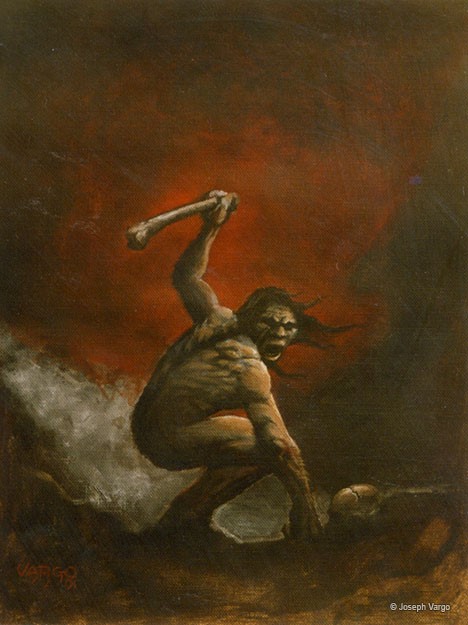
השילוב בין האינסטינקטים החייתיים ביותר שלנו כבני אדם, לבין רומנטיקה ורגשות חיוביים. אם אמן מצליח לגעת בקהל ברמה הזו, הרגשות הסודיים ההם מתעוררים ומהדהדים את הנפש.

זהו ציור המתאר את “הלורד ברום”, הערפד המונע את עצמו מדם האנשים שמא תתרחק נפשו מן האנושיות.
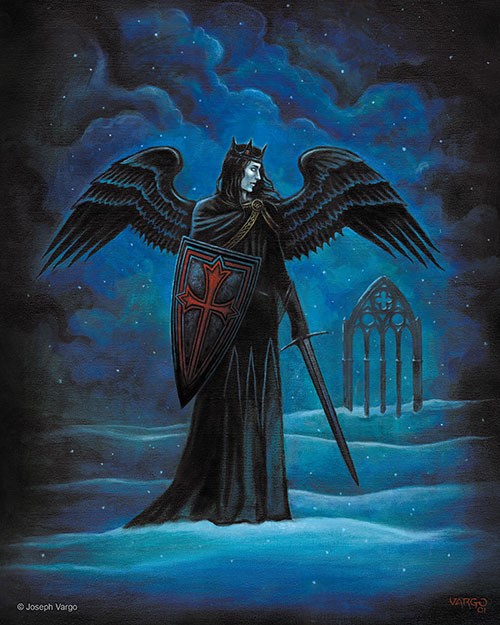
הדמויות שאני יוצר מאוד חיוורות ורזות שכן הם מממלכתם של המתים המהלכים
I have always appreciated the rivalry of tribes #1
I have always appreciated the rivalry of tribes – Part 1 >English
רְשִׁימ֥וֹת־תֹּ֖הוּ | An Interview with Werwolf >Satanic Warmaster
By: Yossi Ben-Oz, Noa Artzi, Tal Idan
10-5-19
The interview you are about to read, is for many people a taste of the world beyond.
But before we dive in, a short story:
About 3-4 months ago, three of us in the magazine started an on and off talk about the futile nature of what we might call a ‘tag-discourse’ - that is: the foolish and mind numbing tendency these days to talk to anyone with an opposing opinion via the need to constantly “tag” instead of confronting the harsh points they make, and try to actually cope with them. We have talks like these a lot by the way, and I have to say that despite the obvious abyss-deep differences between us, we find them truly engaging. well, most of the time. Somewhere along the way it sprung to me that it’s almost like to secure peace is to prepare for war: If you know you’re up to a talk with a worthy opponent & willingly step into the challenge, you might just have a chance to enrich yourself with insights that you’ll probably never understand otherwise, while also sharpening your mind with the exercise.
The next step was crystal clear: We want to interview. One with a worthy and interesting opponent of the far end of the Metal scene.
A couple of names came up. We quickly agreed about the one we want to talk to, contacted him & made the offer.
*
Werwolf, the man behind Satanic Warmaster and by all means a non-politically-correct figure (to say the least, some may add) is truly an interesting person, and perhaps even an adversary in many aspects. Exactly the reason why a good, honest and straight to the point interview was so intriguing to us that we just had to try and do it.
After a check on his side, he immediately replied with a yes. We asked a lot of questions. This added up into a long and and great interview so we’ve chopped it in half, but only for convenience.
*
This piece was made possible thanks to a third party (a dear friend) who wishes to remain anonymous.
Questions: Noa Artzi, Tal Idan & Yossi Ben Oz.
Edited & proofed by Noa Artzi & Yossi Ben Oz.
Preface: Yossi Ben Oz.
We are proud to present: An interview with Satanic Warmaster.
If you are fast to quiver, don’t carry on.
Keep it real. Keep it metal.
*
First off, thank you for agreeing to do this interview. I reckon this is no standard thing and I must add that we are pretty excited back here in Israel. Surprisingly (or not), Satanic Warmaster has quite a few fans over here.
Out of your many projects, it appears that only Satanic Warmaster has been growing big and making a difference. What do you think is the reason for this? Is it because you’re putting your heart and soul in SWM, whereas the rest of your stuff serves mostly as its growth stimulants?
-Satanic Warmaster is and has been my main musical project ever since it's inception. My impulsive creativity and the variety of other musical entities I have naturally created [might be the reasons why they] haven't gotten to a similar magnitude, so it is only natural that Satanic Warmaster shines and is the brightest beacon on the pyramid of skulls. I have always had the urge to create and destroy projects, and they serve as a fertilized soil for my imagination.
I am deeply curious: why Satanism? I mean - if spirituality is close to your heart, why not follow the path of your ancestral pagan culture? Isn’t Satanism merely playing a role in the Christian theater? Why play this part at all?
-Satanism, to a high degree, evolves from a dark pagan root. Despite the fact that to some it might hold some association to Christianity, it became clear to me at a very early age that what I felt, experienced and learned was not a part of any duality where Christianity would have any part in. Like most things, Christianity has assimilated Satan to be portrayed as it's opponent, when in reality Satan in all aspects (except of course it's most literal biblical form) is a much more ancient entity.
In one of your interviews, you have described the Satanist as “one who is meant to lead, not follow”. I assume this role holds true in regards to the Satanist’s relation to divinity, suggesting an active, “Spiritually Virile” position before the divine. Do you view Satanism as a path with a Spiritually Virile orientation?
-Satanism is a path for the strong, for those who walk as wolves among the sheep. Satan is not a deity to be followed, but to be lived for, channeled and weaponized. We could truly speak of something that is spiritually virile.
Perhaps not many are aware that you’ve had a genuine heavy metal band going on for a decade (2006-2016). Nowadays it seems as though metal music is on a constant search for the next extreme, sometimes sinking to a level of straight out noise. In my opinion, it only serves to show how Metallers have forgotten the fun element that accompanied Metal from its beginning back in the 70’s, when this genre was first concocted. How does this act fit with the harshness of SWM? What has it fulfilled for you artistically?
-Heavy Metal music has been an integral part [of me] for most of my life, and part of the appeal towards Black Metal came naturally from [my connection to] Heavy Metal music. As with everything I create, a certain sense of fulfillment is reached, even though in this case the fulfillment came from a more musical, nostalgic and carnal angle. It didn't have to fit with any aspects of any other creation of mine, it just reflects a slightly different side of my personality and sense of aesthetics. Yet, in the long run I must point out that even though the realization of being able to venture into more traditional Heavy Metal was interesting and gratifying in many ways, it can never compare to the personal connection I have with more extreme forms of expression.
Watching a couple of your interviews, one can’t help but notice you keep getting asked about your political opinions - A LOT. However, since what you primarily create is music (not political dogmas), I want to address this topic, but from a different angle: From your point of view, is there any kind of inherent value to Europeanism at all? If so, what is it? What makes the tribal European culture so intrinsically valuable that you see as currently being threatened by the “Semitic Religions”, as it is custom to call them?
-I have always found this amusing and frustrating, as I am indeed an artist, and my interest in politics is basically nonexistent. Of course, shitty humans take things that have some kind of a historical charge like politics at their most simplified face value without even the slightest understanding or interest in things I am trying to portray. I feel no oneness to Europeanism as a general thought. It seems whatever pride or wisdom there [once] was, has been crushed, corrupted and sold, generations ago. As I've said before, if European people at this day and age still let religions fuck them, so be it and good riddance.
You consistently denounce any relation of SWM to National Socialism as a political dogma. However, your early lyrics did include phrases such as “Enthroned Aryan spirit the resurrection of our reich”, “Sieg Heil” and “The rite of white man reborn”. What drives these lyrical themes that fuel SWM? What kind of meaning do you, as a Black Metal artist, see in them?
-I do believe that our blood dictates who we are to a high degree, and no demonization caused by historical events can ever change that. I still see the shadow side of the "blood cult" as a gruesome and powerful concept. The ambition for your own throne, the glorification of triumph and the ritualized justification of your own existence are concepts that surpass any political or collective beliefs. As someone who has created his own destiny and forged his life's work from nothing, those are extremely high values that I will always present from a totally individual and spiritual perspective. Expressing them in the most cruel and vilified words is only appropriate and I would never apologize that.
Did your personal perception of Black Metal evolve during the years that you have been active as an artist and a musician? If so, in what ways does this evolution reflect itself in SWM’s music?
-The major evolution I’ve had with my perception towards Black Metal was that I just let go of the the minimal illusions I used to hold towards it when I was younger, and rather focused on myself. As music and aesthetics Black Metal is at its best, and is magnificent as it was in 1993, but the truths and deeper meanings have crystallized into a completely personal understanding rather than an attempt to reflect some kind of truth from the words of others.
Regarding the previous question, your latest full-length, Fimbulwinter, was a much more “cleanly produced” album which stood out in comparison to the raw, more “primitive” production which characterized SWM’s previous works (though I must say that it didn’t compromise the dark, intense energies of the music whatsoever). What stood behind the choice to use a different production approach with this one? Does it mark any future direction that you have in mind for SWM’s next releases?
-Like it has been with all the previous Satanic Warmaster albums, I’ve create them without taking any burden from previous albums and made them as separate creations, tied to their predecessors only in an abstract and aeonic way. I am currently working on the new album, and in many ways I am sure that the production will be, once again, different, as it has been on all my albums.
Amongst your many releases with SWM, you have one mysterious offshoot with titles in Chinese. Can you please elaborate a little bit more on this one?
-It's a reissue of the "Gas Chamber" demo with a bonus track taken from the lost "Black Carelian Metal" album recording. The titles are in Chinese, because that's what we wanted to do with the label who released it.
*
--For the 2nd part of this interview click this.

Werwolf. An interview with one of the more prominent Black-Metal artists to arise from the underground.

SWM is & has been my main musical project.
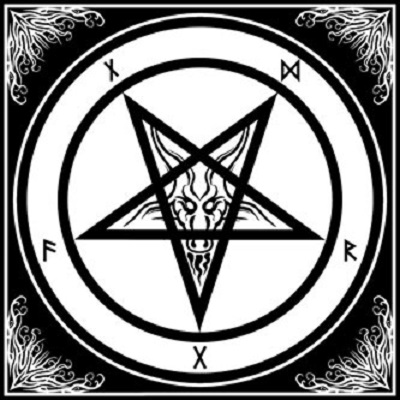
A path for the strong, for those who walk as wolves among the sheep.

Armour - a HM band by werwolf (2006-2016): “Heavy Metal (was) part of the appeal towards Black Metal..."
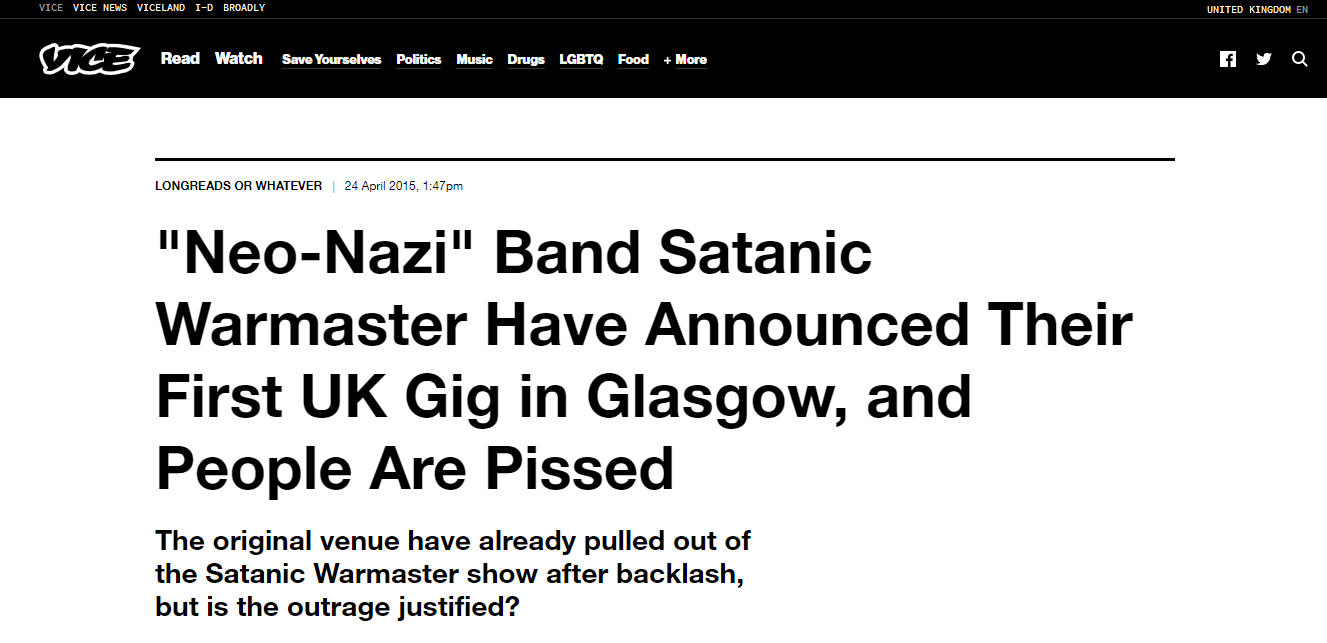
(Article-Title taken from ‘Vice’)
Talk about tag-dicourse: Canceling Black-Metal shows because not coping with an opposition will surely make it go away. NOT.
“I have always found this amusing and frustrating, as I am indeed an artist, and my interest in politics is basically nonexistent."
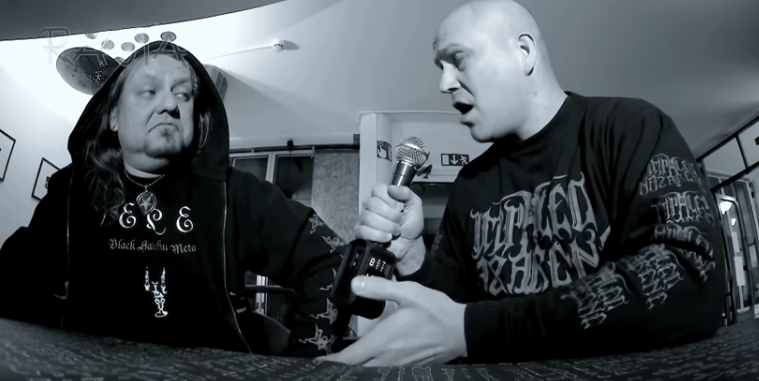
Getting asked a lot about his political views - Werwolf in interviews
Picture taken from Rauta Facebook page
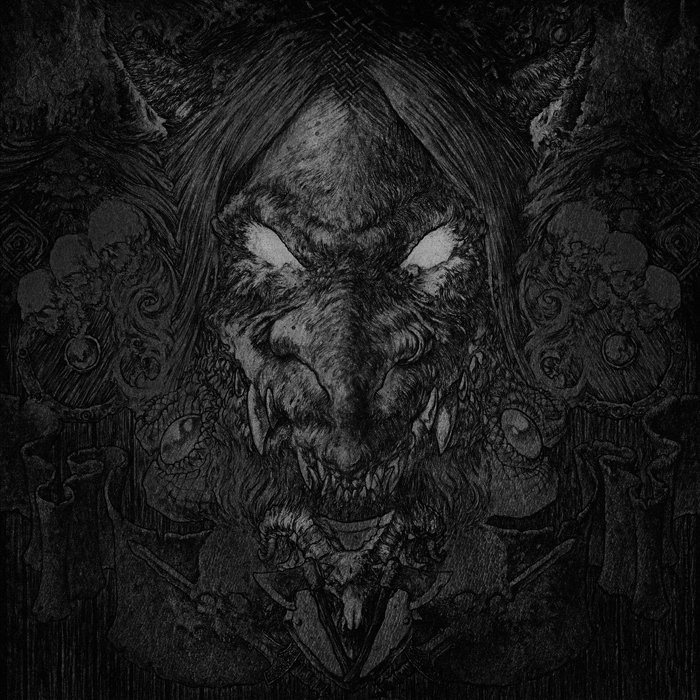
Not only primitive productions can express Black-Metal art.
I have always appreciated the rivalry of tribes #2
I have always appreciated the rivalry of tribes – Part 2 >English
רְשִׁימ֥וֹת־תֹּ֖הוּ | An Interview with Werwolf >Satanic Warmaster
By: Yossi Ben-Oz, Noa Artzi, Tal Idan
17-5-19
Since the previous part was already preface, we will not tire you all with another one.
So, this is the 2nd part of the interview with Werwolf of Satanic Warmaster. in this part we dived more into the spiritual & thought that stand behind SWMs art and werwolf himself.
For the 1st part of this interview - click this.
*
This piece was made possible thanks to a third party (a dear friend) who wishes to remain anonymous.
Questions: Noa Artzi, Tal Idan & Yossi Ben Oz.
Edited & proofed by Noa Artzi & Yossi Ben Oz.
Preface: Yossi Ben Oz.
We are proud to present: The 2nd part of the interview with Satanic Warmaster.
Take a deep breath. Don’t fear the ride.
*
In one of your interviews you have made a pretty puzzling claim – something about science being a “new God”. One can see where it’s coming from, as one can claim for example, that science masks the true spiritual nature of things by portraying them as if they are all but material, hence serving as a gateway to an “enslaving materialism”. I am interested to hear your take on this subject.
-As religion has lost a lot of its influence (Finland as a prime example), people clearly need a new institution to follow. The amount of blind following of scientific explanations of things and academized justification of things that are mostly based on feelings (like sociology) is in many cases horrific. Just like the people who were never able to grasp the actual spiritual side of religion, they will never truly understand the complexity of research, and those who wield the power of bringing the ideas to them know it. With the hedonistic and materialist nature of the western world, this is the new way to control the masses.
Do you really think science isolates us from a meaningful contemplation and confrontation with death and thus with existence itself?
- Yes.
One of my favorite poets is Uri Zvi Greenberg. UZG was a traditionalistic-nationalistic Hebrew poet, that wrote a great deal of his writings in the first few years that followed the Holocaust & the 2nd world war. He is very interesting for he sets ablaze a new Hebrew spirit; One of freedom, Warriors, Kings & the strive for the renewal of times immemorial. At times I think his writings can really be great if were composed into a black metal musical structure. I want to run through you a taste of his work, ask you for your thoughts about it:
*
Your Rabbis have taught you: There is one truth for nations:
Blood for Blood - and it is not the Jews-Truth.
And I sayeth: One truth and not two of them.
As one sun and just as there is no two Jerusalem.
Written in the lore of conquest of Moses and Yehoshua
And to the last of my kings & wounded lions,
Truth, canines of exiles and traitors have eaten.
And that beeth a day and from Egypts river to Euphrates
And from sea to passage of Moab will my lads rise
And calleth my foes and my haters to the last of battles.
And the blood, only it shall say: Who is the sole ruler here.
*
(One truth and not two of them | by: Uri Zvi Greenberg, Translation: Yossi Ben-Oz)
-Well written indeed. As I have always said, concepts such as these have no boundaries of race or nation, and I have always appreciated the rivalry of tribes, no matter where or on what scale. I am sure that to some, these powerful words resonate on a very personal level.
Does spirituality serve as your guide in your music? Your later albums are very powerful, yet unlike your “filthier” and earlier efforts, these seem to incorporate an element of order and even beauty. Combined with the visuals, these albums remind me of looming gothic cathedrals and bombastic Wagnerian pieces, and the experience of a higher, bigger presence brought forth by these. It has already been suggested that beauty is appealing to man, since it offers him a sneak peek to the Absolute. Do you think music is a way for touching the transcendent? If so, how does this get along with your proclaimed Nihilism & Anarchism? Moreover: what is spirituality to you?
-Yes, the whirlwind of my beliefs and spiritual rebellion swirling hand in hand still guide my creations. In that sense I continuously transcend this world, and what is left behind is my earthly fortress of nihilism, anarchism, destruction and hate.
Your musical engagements are quite widespread and varied in genre. How do you combine it all? Especially Punk-Hardcore & Black Metal... I admit that this combination sounds odd to begin with.
-I have never limited myself into any particular way of expression. Only to those who think of music genres and styles as "scenes" and "lifestyles" in themselves find it odd. Those who truly experience things, don't.
Do you think Black Metal can inspire the birth of a new spiritual elite? If so, how exactly?
-In a way it has been already happening. Yet I am not the one to talk about it.
You’ve once said: “It is Europe's fault it had let all the Jews, the Christians and the Muslims in”. I’ve always wandered: How can one explain then, the tendency of Europeans to EMBRACE Christianity so wholeheartedly and for so long? And also (and that’s a harsh one): If Meritocracy is the path of the glorious, then how come the Aryan race is still considered supreme after losing its battle to the Hebrew race? Doesn’t this mean that an Israelite elite should be the true hero of reality?
-It was a long process to have Europeans adapt to Christianity, and it was also a good tool for those who wielded the crucifix so naturally they held onto it. As far as I know, the Hebrew race didn't exactly win anything? Wasn't it more like a country as a consolation prize for the atrocities Nazi Germany committed?
At times I ponder: if Germania & Israelia are two opposites, this intrinsically means they are two sides of the same essence since collision is possible only if the two are moving on the same axis. What are your thoughts regarding this notion?
-Correct me if I am wrong, but as far as I have understood, Nazi Germany wanted to get rid of their Jewish population. There were no two nations that could be compared from the last century. Israel resumed existence only after Germany was nothing but an apologizing, crawling joke, so neither side of this supposed polarity hasn't even existed simultaneously, but of course if you are talking of both nations executing similar policies in many ways, that is of course a known fact.
To conclude - a suggestion: What would you say if I was to invite you to come and play a live show in Tel Aviv? I know for a fact there are quite some fans here in Israel for SWM. This suggestion is actually official, made by a local production group that has brought us some great underground metal acts over the past few years, that when heard about this interview said they would be delighted to arrange this.
-I would be more than honored to perform to the Satanic Warmaster fans in Israel.
*
I want to thank you very much for this opportunity. This is really a unique and intriguing adventure. Keep the spirit of Metal alive! \m/
-Thank you for the interview. LUX EX TENEBRIS - HEIL LUZIFER.
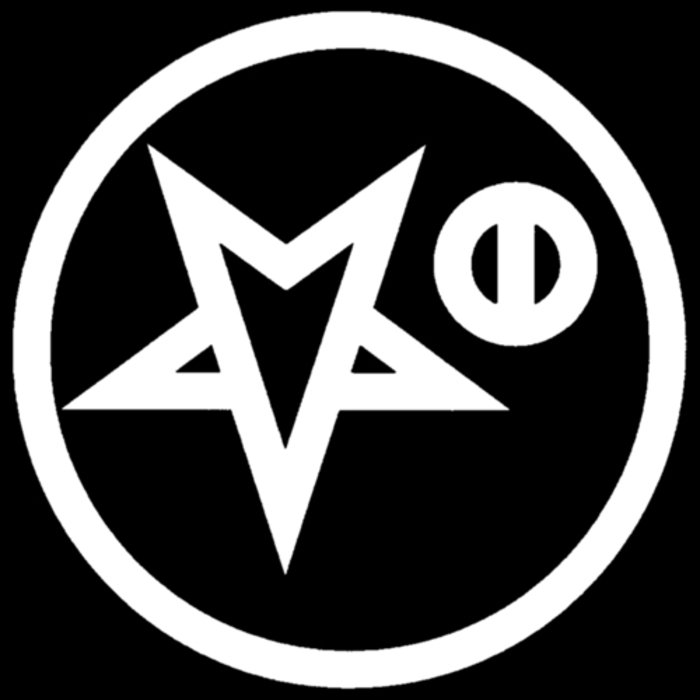
The 2nd part of the interview with Werwolf of SWM. A foe to drink beer with.

But is it also masking the fundamental spiritual structure of things?
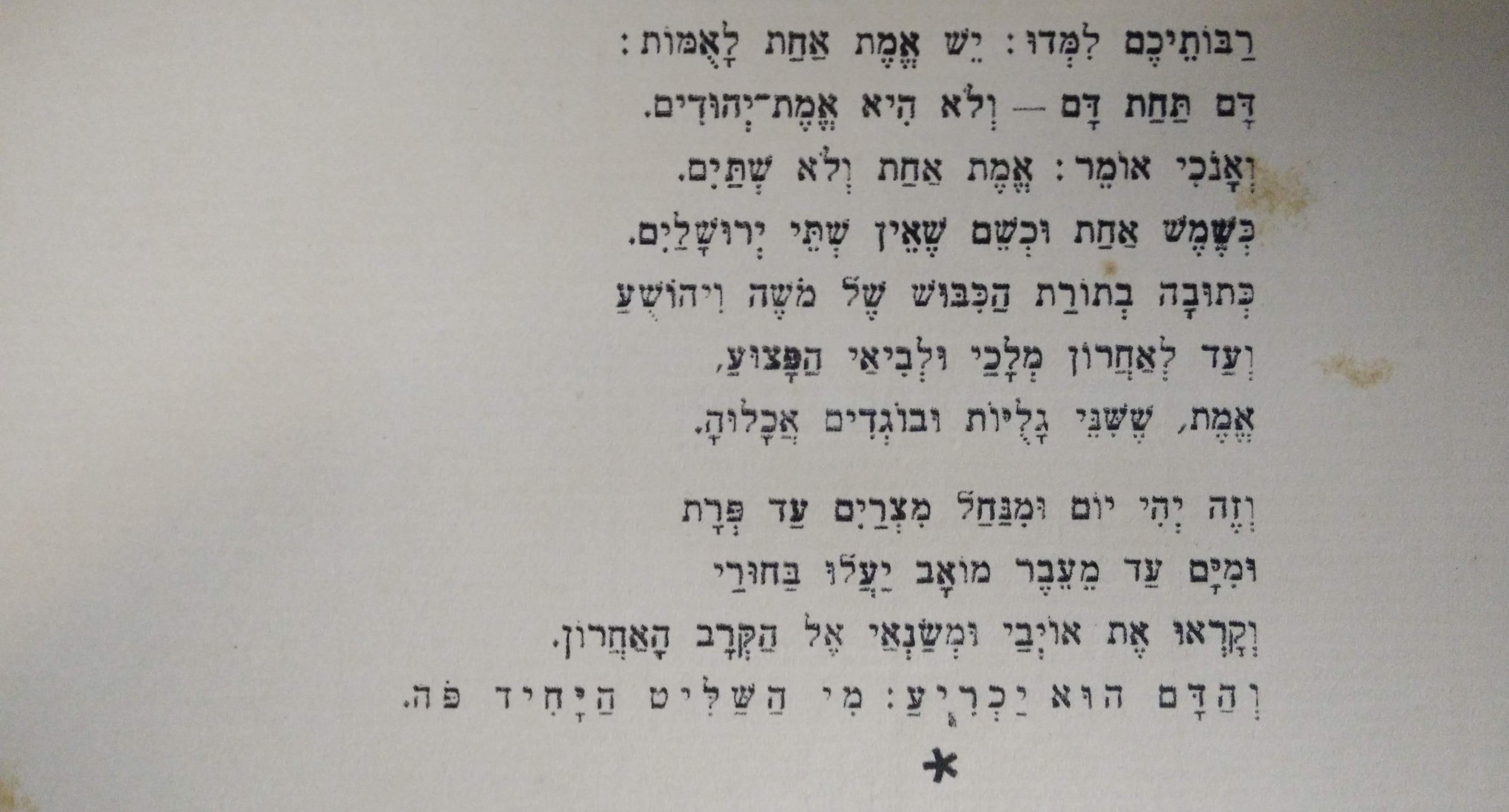
—By Uri Zvi Greenberg
“concepts such as these have no boundaries of race or nation, and I have always appreciated the rivalry of tribes"
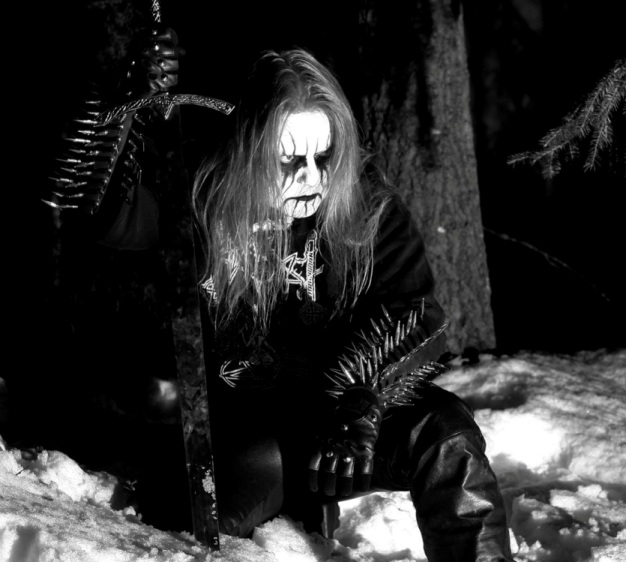
Is transcending me, left behind is my earthly fortress of nihilism, anarchism, destruction and hate.

“I do believe that our blood dictates who we are to a high degree, and no demonization caused by historical events can ever change that."
*
The relation to Blood is common in pagan cultures, and: Yes, the Nazis also embraced it.
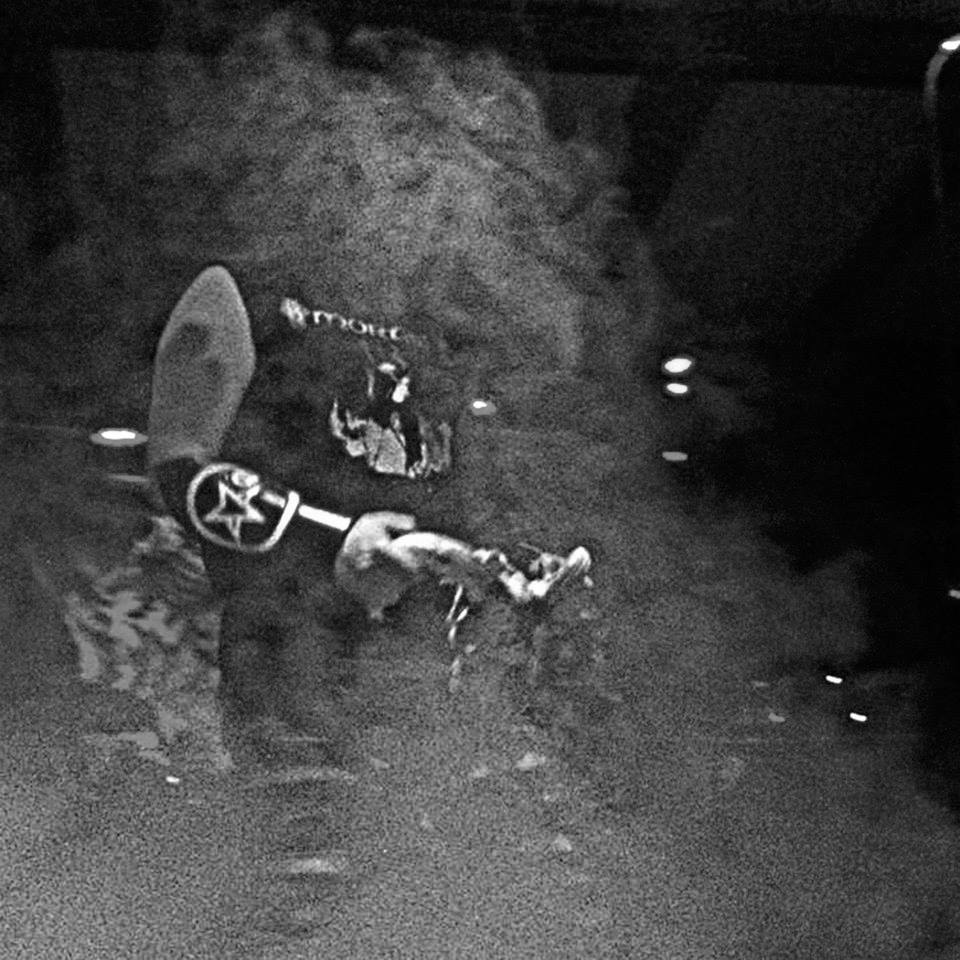
Magics, do happen some say.
*
Picture for SWM Facebook







